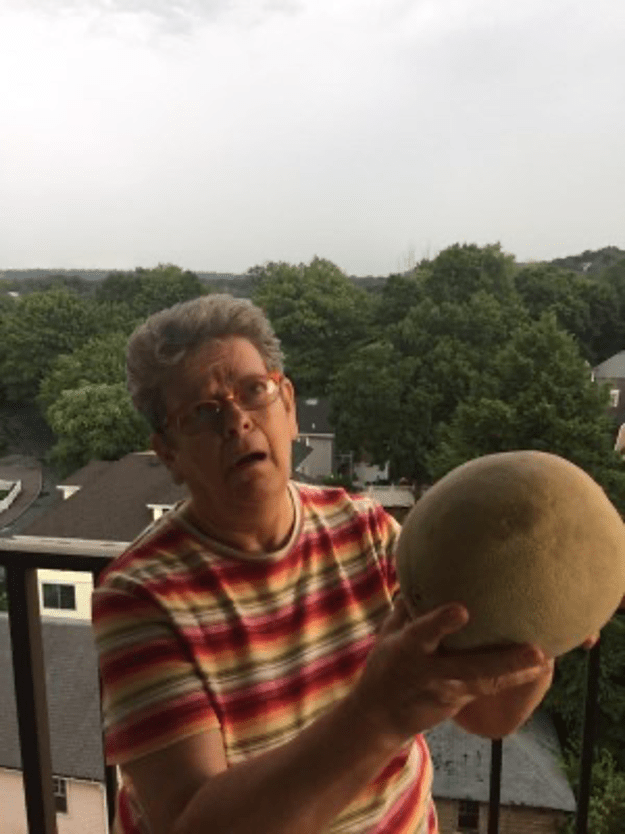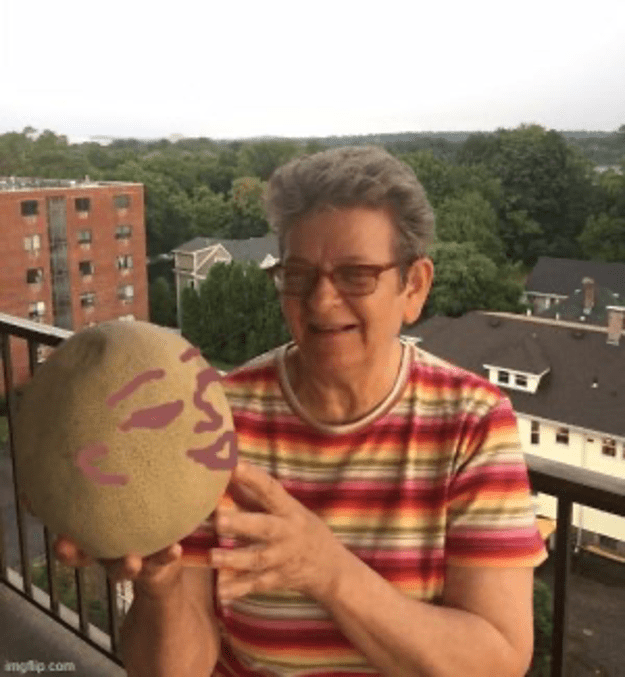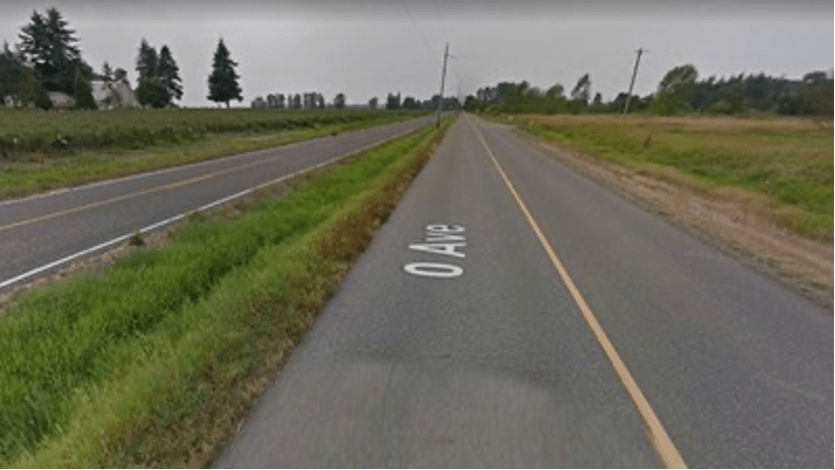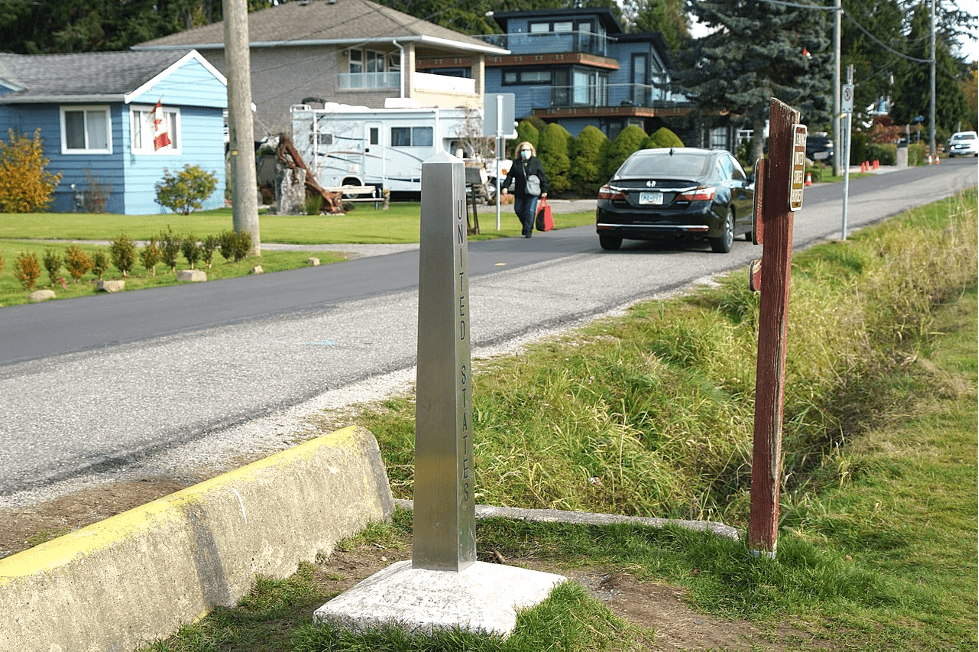
The Pandemic Diaries began in March, 2020, when the United States “shut down” and all but essential workers were confined to “shelter in place.” We collectively closed our doors, watched and read the news, and worried about our loved ones, ourselves, and, frankly, everyone everywhere. At Passager, we were surprised that people around the world — from Australia, India, Germany, France, Canada, Iran, Belgium, Ireland, Switzerland, and across the United States started writing to us, telling us their stories and wanting to feel connected. The Passager community became global, and each piece of correspondence added a new and important moment to the record. We decided that one thing we could do was to publish as many of these pieces as possible.
We are no longer accepting new entries to this series.
Noreen Oesterlein, Woodbury, Minnesota
Journal entry, July 4, 2022
My husband and I made it through the worst of the pandemic without getting sick. Yesterday he tested positive for Covid, but thankfully is not very ill. And I began the day today, Independence Day, feeling sorry for myself as we had plans to celebrate with family and friends. I did today what I did on a sullen, cold, end-of-winter day in March of 2020 and walked the Mississippi River trails in Saint Paul to recenter myself. In 2020 my whole being was on tumble dry high with fear of all the unknowns then; sad for all of the very sick and the dying, the families who lost beloved members, those who abruptly lost jobs, teachers and students who were in turmoil and all of the hurt in our global community. As I walked the paths back then I came upon a homeless encampment and wondered how the residents stayed warm in the freezing temperatures, how did they get food and how could they stay safe in that environment. And felt shame for my lack of gratitude for our snug and secure life. We have a warm home, we are retired so no jobs to lose and have resources for food and medical care. I made a promise to myself that day to never forget to be grateful for our good fortune. I almost broke that oath until I walked the river paths this morning and remembered.
Joanie HF Zosike, New Jersey
Journal entry, July 1, 2022
My mother Gloria passed away on January 6 at the age of 95, after a long journey with Alzheimer’s and congestive heart failure. It was devastating to lose her.
She never got COVID. That would have been too much.
Our brother Carl flew to NJ from his home in Switzerland. He is a singer with the Zurich Opera company. Apparently, little care was given for safety. In his dressing room, nine out of eleven people had come down with the virus. Despite a negative test, Carl didn’t feel well when he got on the plane. By the time he landed, he felt vile. When he arrived at our house, he retested and got a strong positive result.
All three of us had to go into quarantine and plans for the live commemoration had to be canceled. However, we held a well-attended celebration of her life on ZOOM and are now moving toward the actual burial in Los Angeles to be held in August.
People keep saying, “You guys just can’t catch a break.” But I think about all the people who, at the beginning of the pandemic, were unable to see their loved ones when they were dying and were never able to bury them. Even though we were in quarantine on the morning Mom died, the hospital allowed us to be with her during her last hours. That was a blessing for which we are deeply grateful.
Shirley Nelson, Florence, Oregon
Journal Entry, July 1, 2022
It’s back. At the Senior Retirement residence where my husband and I live, we are tested often. Earlier this week we were told a staff member had the disease and was recuperating at home. Testing resulted in 3 cases among residents. They are confined to their rooms for now; all have been completely vaccinated so should not have severe symptoms.
The rest of us are able to come and go, eat in the dining room, etc. Group social gatherings in the building are mostly canceled and we are asked to wear masks when not in our apartments. The best laid plans . . .
Nancy Buck, Chester Springs, Pennsylvania
Journal entry, November 23, 2021
I’m a 7th grade English teacher who taught in-person during the pandemic, while navigating numerous quarantines, family illnesses, a broken foot, and the death of an aging parent. This entry is from the family’s first pandemic vacation, a year to the day after the death of my father.
Waiter, there’s a mermaid in my drink. Oh, wait, I think it’s me. And look, I’m starting to swim.
I am out. Out of school. Out of my burst bubble. Out of my pandemic mindset, I think. I am dining out, literally, on Duval Street. The Key West breeze gently carries the scents of salt air and grilled fish to our streetside table at Lucy’s Retired Surfers Bar. It lifts my hair as I lean in for a family selfie. Together at last – our first family vacation since the pandemic, since the “kids’” bouts of Covid, since the loss of my father a year ago today, and the countless quarantines. My first masked airplane ride brought us to this – my most memorable dinner.
It’s not the balsamic reduction tuna lingering in my memory, nor the cocorita, garnished with perfectly toasted coconut. It’s the little plastic mermaid poised on the rim, reminding me of what I need.
My family bobs to a girl strumming and singing “Goodbye Earl.” A crowd gathers. I am surrounded by strangers, riding the same wave. I am not afraid. I sing along, far away from standing double-masked in front of my class, straining my voice to teach, knowing I am lucky, moving simultaneously from online to in-person students, wondering how many more waves we will see this school year.
With a flick of my finger, the mermaid dives in. And for the moment, she’s free. Just like me.
Mary Ellen Talley, Seattle, Washington
Journal entry, June 24, 2022
All but the youngest of our grandchildren have been vaccinated, all resumed school, and largely dropped mask wearing in classrooms, but receive notices when a student in a class has Covid. Sometimes my second-grade granddaughter will announce that she can’t play with a friend at school because someone is positive and they keep the classrooms separated during recesses. Our daughter is good about warning us when someone in her family has a known exposure in case we want to avoid a visit. Sadly, we all tend to be less “huggy.” We realize every contact includes an element of risk.
It has been our annual summer delight to take our grandchildren to see outdoor musicals at the Kitsap Forest Theater in Bremerton, Washington. This year, we took the five, eight, and thirteen-year-old to see Beauty and the Beast. We all had masks in our pockets, but didn’t wear them. We are emerging gradually and gratefully.
Kirsten Morgan, Golden, Colorado
Journal entry, May 3, 2022
For a long time, I didn’t admit it but wondered why the life I used to navigate with ease had become not only distant but also more confusing. Was it age, my first assumption? Was it the world’s increasingly erratic behavior? For the last several months, I’ve been unable to organize my existence around activities and expectations that keep me grounded. I forget obligations, I can’t recall what my calendar says, I agree to do things and then wander away from remembering. These are surely descriptors of the aging mind, but this feels different somehow — and many people of all ages are noticing the same behaviors. It’s apparently a subliminal coping mechanism that the brain, that devious organ, has developed around our protection. When we feel overwhelmed, we just shut down, and the result is that not only the big things lose their impact but the smaller things also fall victim to erratic consciousness. It’s always been known that people under stress forget things so they can focus on the task at hand — caring for a sick relative, giving attention to a newborn, fending off an abusive spouse. Survival requires prioritization, and if we won’t do it consciously, our lizard brain shoves us aside and takes over. COVID, added to already existing anxieties, opened this bag of Aeolian winds and now they can’t be stuffed back inside. We’re ever drifting farther from home and there’s always a storm coming in.
Antoinette Kennedy, Hillsboro, Oregon
Journal entry, June 8, 2022
Teach us to care and not to care. Teach us to sit still, was my poem line (Eliot’s) for the day. The bunny, cowering in the bushes, was small enough to hold in my hand. “Poor thing. That cat toyed with it,” the young woman said, and gently stroked the rabbit. Teach me to care and curse the black cat that prowls free around our apartment complex, the cat no one claims. Teach me not to care and I walked away from my anger and brought carrot and apple bits, an old towel. The woman, Lindsay, carried the wounded creature away. Teach me to care and sorrow for the besieged in Sievierodonetsk, Buffalo, and Uvalde folded into the torn body of a tiny rabbit. An hour later Lindsay texted me to say that the bunny died. Teach us not to care, so the two of us set aside our mourning and wrapped the tiny, stiff form in flowers and a cloth. Teach us to sit still. Sun warmed our bench and in passing, wind let the leaves shimmer green.
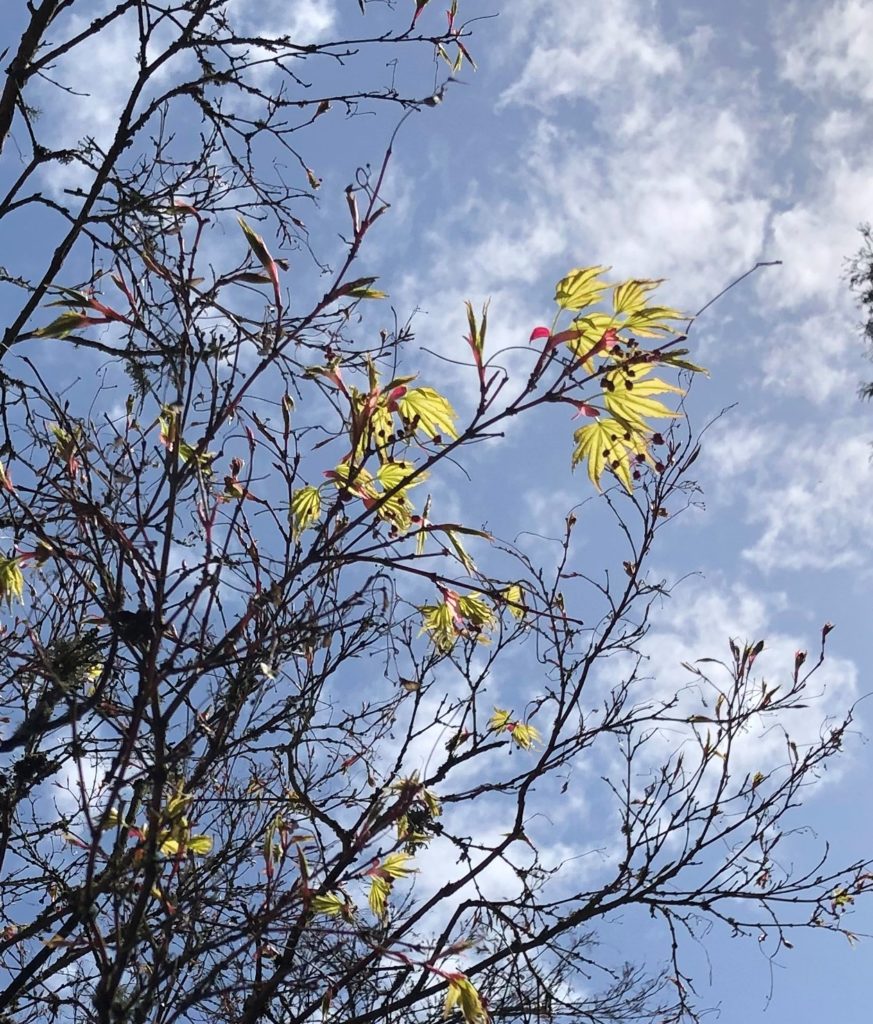
David Massey, Decatur, Georgia
Journal entry, June 19, 2022
This pandemic has increased my isolation. I am almost completely deaf, although there are some people whose voices I hear well, and this divorces me from family and friends when there is a gathering, either at our house or elsewhere. As people converse fervently on all sides of me, I hear only a great tumult, an echo chamber of disorder and cognitive impairment. I cannot participate, can only pick up one word in twenty, so I sit silently, dumb and idiotic. I feel wretched and get weary, worn out after a half-hour of this torture, but of course, it goes on for hours, not minutes. By the time a visit is over, I am wrung out. My consolation is my books and the love of my wife, children, and grandchildren. At home I can withdraw into the world of literature, and I can participate in the contemporary world through my love of baseball and by exercising my voting rights. This is what I am reduced to by the COVID-19 pandemic and my hearing impairment: an attenuated life of incomprehensible noise and social isolation.
Julia C. Spring, New York City, New York
Journal entry, May 10, 2022
I didn’t miss museums, concerts, plays during the first pandemic year and a half. I don’t really know why not — maybe it was like Stockholm syndrome, identifying with Captor Covid and forgetting that I used to be out in the world. Or maybe I reactivated an old defense and didn’t let myself want what I couldn’t have.
But now that I’ve started doing things, my heart is hungry.
Last Saturday it was pouring and I decided to see an exhibit, someone I hadn’t heard of before, Hilary Pecis, whose works looked to be big, bright and detailed, just what I needed.
I got drenched on the way to the car then drove to the gallery — there 45 minutes (yes, big, bright and detailed) keeping my distance from the few other people — soaked again walking back to the car, drove home — changed out of my cold wet clothes and stayed inside for the rest of the gloomy day.
I felt radiant from my adventure, as though I were the sun and it was soaking into me.
Mark Tochen, Camas, Washington
Journal Entry, June 7, 2022
The Fourth of July, 2022 approaches. Let’s contemplate the Fourth of July celebration we might enjoy if Covid truly eases in our lives. We could then shout with joy, here comes the Fourth! All through the land there will be a Fourth of Joy as well as a Fourth of July. We’ll go to the park on the lake near our home for day-long picnics and play. We’ll preen and pose for pictures, kayak and paddle board and go fishing in the little lake, and take an easy two-mile walk around its rounded contours. It’s not really a swimmable lake — algae count is too high — but it’s very pretty with green trees all around, their reflections shimmering in the water. We’ll be like Bilbo and Frodo playing in the Shire, and the sun will rise high over our pleasure. Every face will be unmasked so we can delight in all the smiles of happiness and relief at our freedom. No more sheltering in place, and little kids will race around finally free to move and dance and mingle. We won’t even need fireworks, we’ll be safe and our joy will provide fireworks sufficient to gladden our hearts. It will be the Fourth.
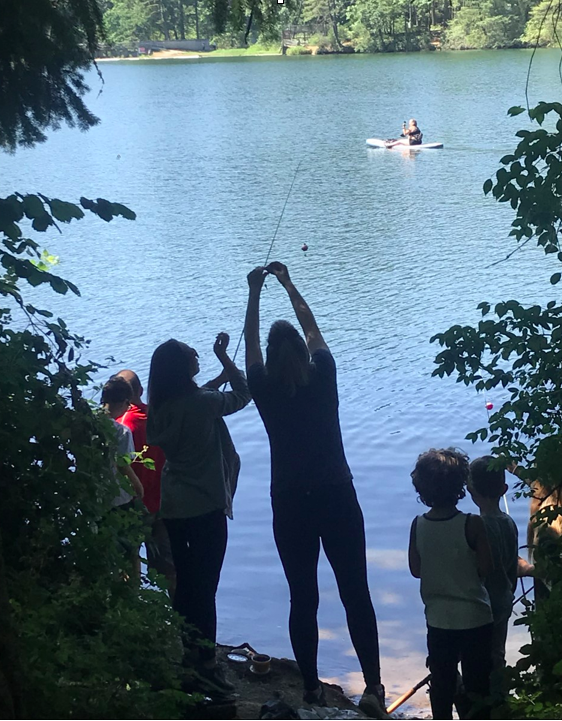
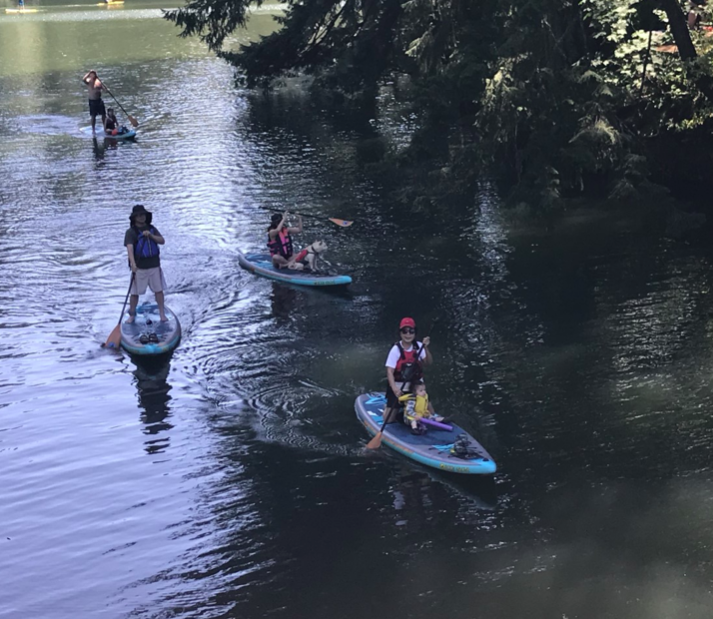
Isabel Soto-Garcia, Madrid, Spain
Journal entry, June 7, 2022
I have a life-long passion for pre-used stuff. Pandemic restrictions have limited my rummaging for recycled treasures in second-hand stores. And yet I’ve taken a quantum leap towards conservation: I’ve installed solar panels on my roof. Or rather, several young men, sweating heavily, did.
A two-day job, the company said, and the installation would be “external” as a mobile platform charmingly called a cherry picker would lift workers and panels onto my roof.
I felt righteous.
Frustration replaced the righteousness. Five workers, strangers to my personal pandemic bubble, entered my house on day one and walked up the three floors to access the loft and my roof via a small window. Maskless. I guess “external installation” was poetic license.
I’m a cancer patient, always masked up in indoor spaces and in the company of strangers, however kind. I politely asked them to mask up.
“We have no masks,” they said.
“I’ll give you some,” I said.
Day two. Three workers today. Maskless.
“Stay in your office,” says my (masked-up) husband.
My confinement lasts twenty-seven minutes.
“I’m about to explode,” I text my husband.
“I’ll email the company,” he answers.
The company’s apology is lukewarm: anti-covid measures have been eased, guidelines are confusing . . . My husband asks the guys to don the masks I’d laid out for them the day before. They comply.
My solar panels are now in place. We draw energy from the sun.
Covid is still here.
Ageism and sexism are still here.
I am still here.
Judith Shapiro, Washington, DC
Journal entry, June 3, 2022
Mother’s Day this year was amazing. Several months ago, I couldn’t have imagined life outside my cocoon. Then, I was dealing with long-Covid. I had a false sense of functionality that served me well. Maybe not well, but good enough. Most mornings I put on the same clothes, went directly to the computer to join zoom groups throughout the day. On good days I walked on the beach. Also, on good days I forgot that good days were scarce. My daughter, Julia, said I had the memory of a goldfish.
Then, there we were, Mother’s Day, Kristara, Jerzy and I, out in public. We got lattes. We strolled on the common. We went to the movies. The first time in over two years! Later that night Jerzy started feeling sick. The next morning, still not well, she tested positive. My heart sunk. Surely I didn’t catch it again. Five days later I pulled out a test kit, reminiscent of at-home pregnancy tests I used years ago. I watched apprehensively as the control line became solid red, the test line thankfully blank, the opposite of my hopes from those other tests in the past. Gradually the line morphed into a faint, ghostlike grey. I called Julia to let her know. “So sorry,” she said, “but on the bright side, you’re in good company. I bet a lot of moms got it for Mother’s Day this year.” The bright side indeed.
Stephen Kingsnorth, Coedpoeth, Wales
Journal entry, May 25, 2022
Each Friday is my dancing day. Who could have imagined, the diagnosis, a flyer passed, then weekly Zoom, “Parkinson’s Dance,” alongside twenty others, with English National Ballet? We follow moves seated or standing, prance classical, contemporary, in fusion choreography. I pas de chat, plié, rise, hold armchair wing, and arabesque in overweight. I even write a verse for print at seventy, as ‘body movement’ is the theme, with photograph, screen, my balanced belly hanging there. We break out, reminiscence time, and share our wonder, what we have achieved.
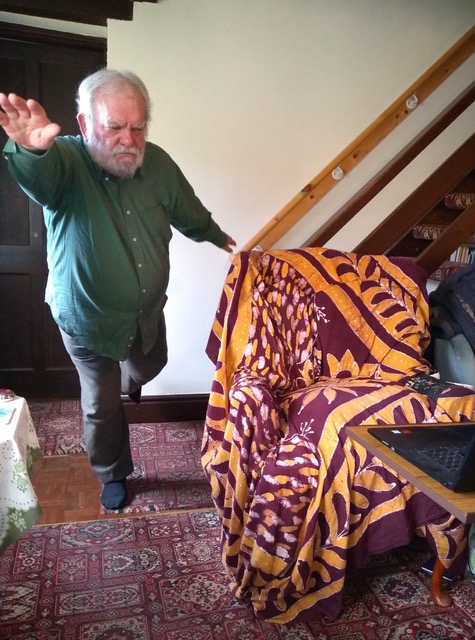
Patricia Cannon, Novato, California
Journal entry, October 20, 2021
“Great necessities call out great virtues. When a mind is raised and animated by scenes that engage the heart, then those qualities which would otherwise lay dormant, wake into life . . .” Abigail Adams’ words are fulfilled every day by my therapist and those like her — the brave-hearted who work behind closed doors. Therapy supported my ability to function as a nurse during the pandemic. Lack of sleep and the increased demands on my mental, spiritual and emotional reserves hurled me into the survival mode of “fight or flight.” Even though I appeared calm: I had some form of PTSD. My hands couldn’t stop shaking. During this time, I had to reassure my patients that another nurse would insert their intravenous access. My therapist used visualization and cognitive behavior techniques to assist me through the workday. My hands are now steady, and although I wouldn’t say I am a “vein whisperer” like my boss, I can hold my own again. Sadly, many seasoned counselors and therapists have left their professions due to unprecedented stress. Thankfully, my therapist is holding fast. I think of all her clients and the “worlds” she inhabits each hour. The living condition on each varies with each client, yet she keeps showing up for us despite the climate.
Jennifer Schneider, Dresher, Pennsylvania
Journal entry, May 28, 2022
on shedding, molting, and re-engaging :: observations on the maskless
some mammals shed fur. other animals, reptiles such as snakes and lizards, shed skin. growth a life-long process, typically one of renewal even while simultaneously unsettling. snakes and lizards experience diminished appetites. molting processes equally meandering. anthropods such as crabs, lobsters, insects, and krill transform. growth always pressing. time always splitting.
homosapiens shed, too. two times twelve plus two — no, three — months into the covid-19 pandemic and masks are starting to shed. sporadic, increasingly present, moments of exposed flesh. skin as viral as tweets. flashes, of sorts. amidst blinding light of camera clicks and warmth of crescent-moon smiles, a list of unexpected encounters. handkerchiefs both ready and revealing. less a time of renewal than renewed anxiety. similar to the anthropod. a time of vulnerability. plus a sprinkle of unmissed/can’t miss traits.trials.tribulations.
1. Jawlines sag as COVID rates ricochet.
2. Aging operates differently above and below lip lines.
3. Lips thin as waistlines expand.
4. Masks protect against multiple transmissions.
5. Unwelcome pecks on cheeks wage new wars.
6. Grins reaffirm gripes with tooth-filled greens.
7. Viruses rebound on the week’s starting line-ups.
8. As COVID rates fall, social awkwardness rates continue to rise.
9. While Cupid’s bow is a sign of beauty and delight, some bows (and bad breath) bite.
10. Soft whispers ebb & flow with new waves. Souls struggle to ride them to shore while labs run trials, squash loops, and lob lifeboats.
Ellen Campbell, State College, Pennsylvania
Journal entry, May 14, 2022
I have long been a knitter – making socks, sweaters, shawls, mittens, gloves, hats and more for family and friends. The rhythmic cadence of my needles helps me unwind each night, offering the calm needed to end even the most stressful day. But during these past pandemic winter months, my knitting needles no longer call me. Something seems out of kilter inside me that even knitting can’t make right. One day last month, I picked up a needle of a different kind.
Thread of a different kind. I cut up cast-off fabric and orphaned quilt blocks and just started stitching simple lines, squares and circles. These little thread doodles are turning into soft books filled with writing of a different kind, creating a new way to shape an ever shape-shifting world. One stitch at a time.
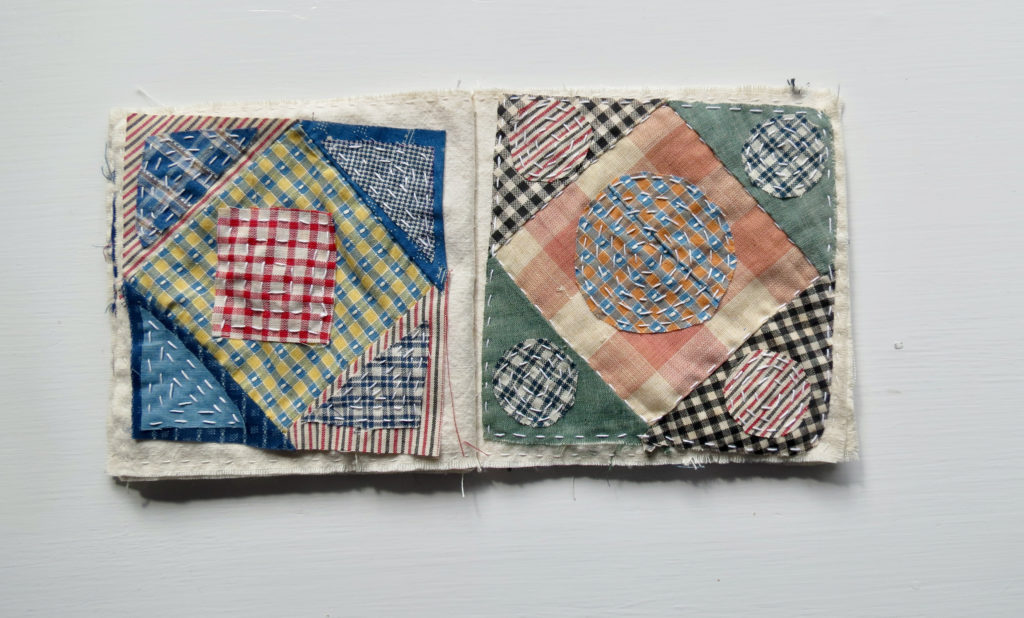
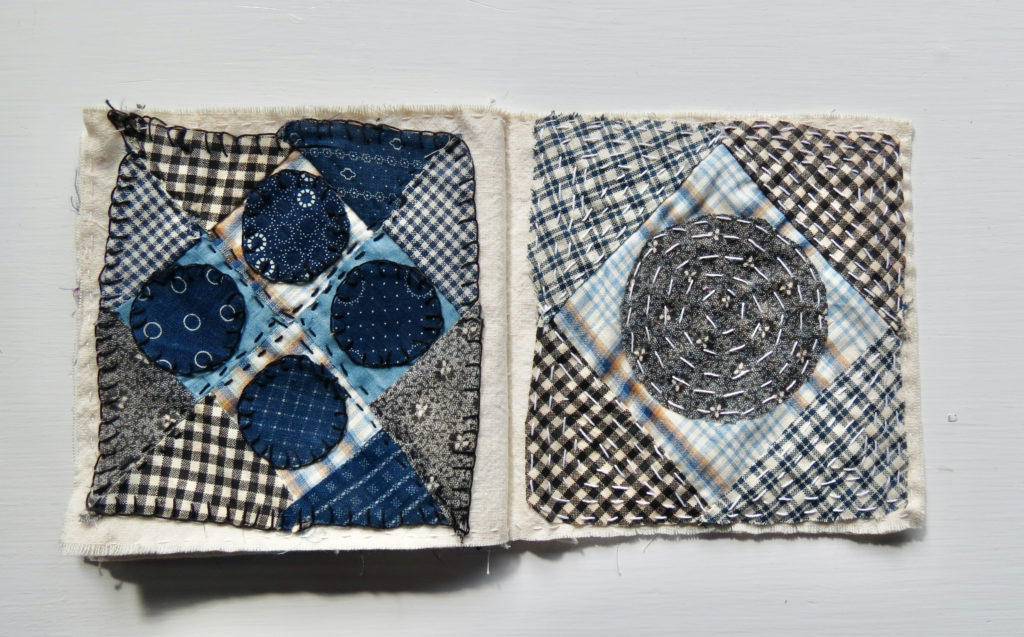
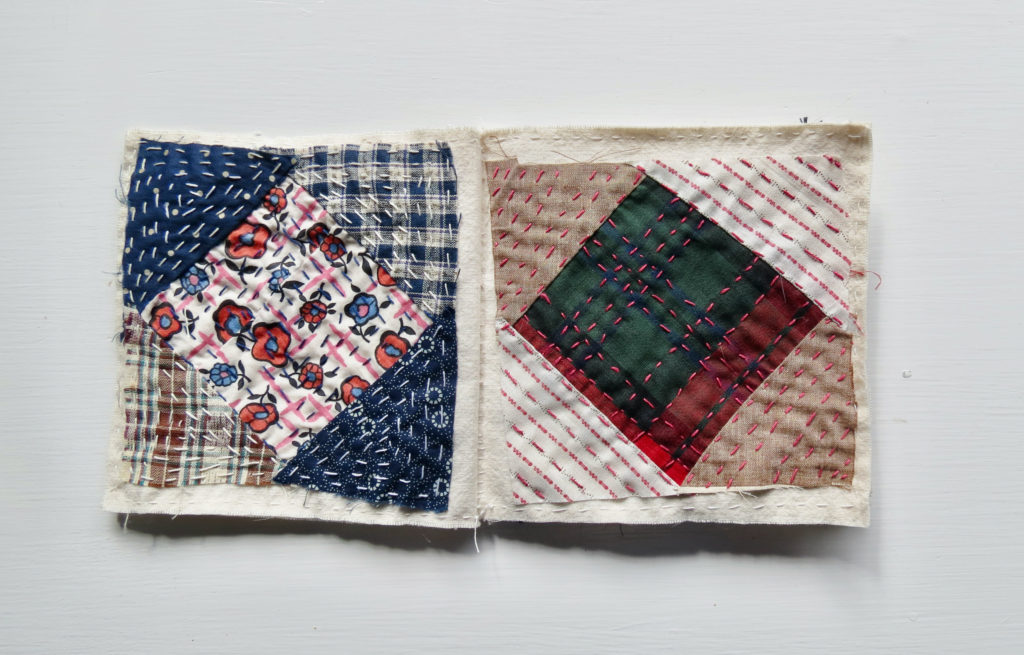
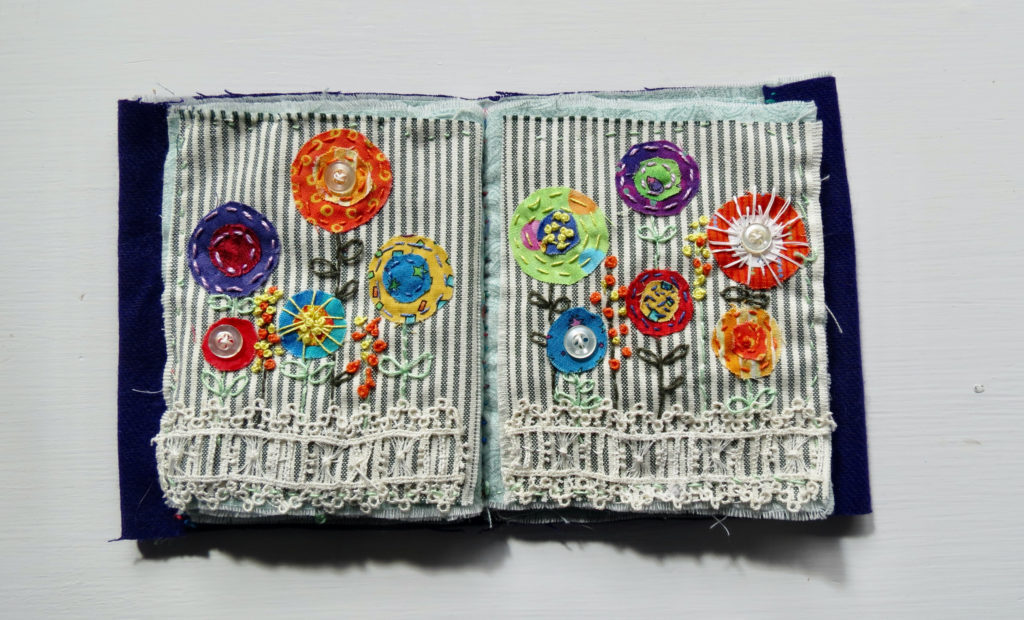
MaureenTeresa McCarthy, Canandaigua, New York
Journal entry, April 28, 2022
An Island Garden, by Celia Thaxter, is my respite in this never-ending pandemic. I have read it, paged through it, lingered over illustrations. My copy is a reissue of the 1894 edition with color lithographs by Childe Hassam, who was foremost book artist of the time. The book, the paintings, the garden, Thaxter’s life, her writing, all give me deep comfort.
The garden is the focus of the book, a colorful living tapestry Celia Thaxter designed and brought alive every summer. She writes of deep pleasure in the flowers and wildlife of her island home. She writes too of loss as storms ravaged flower beds, destroying her work. She planted, pruned, transplanted, over and over, but she was well aware that nature is capricious. Winds, waves, rains are far more powerful than a gardener. Viruses are too.
Her life’s work reminds me that this split world we live in now will heal, as nature does. Our lives will change, but we can restore, redesign, replant, as Thaxter did, many times.
Elaine Logan, Baltimore, Maryland
Journal entry, April 21, 2022
While dusting my small collection of art books, I noticed one in particular: The Girard Collection at the Museum of International Folk Art. I laid it on the buffet. It fell open to a two-page spread of tiny, unglazed-ceramic figures of a crèche. But it was a whole village, perhaps 24 figures and even more animals, paying homage to Mary, Joseph and baby Jesus. I must have studied it for many minutes and decided I’d study each page one a day – until I had gone through the whole book.
That led to making a thing-to-do of all the art books I had. Books that were treasured but seldom brought out simply to enjoy. The posters of Hockney and Klimt, the architecture of Frank Lloyd Wright, the designs of Cranbrook and Charles Rennie McIntosh, the paintings of Carl Larsson – each had their day – actually, it was more like a month.
Finally, I took out a historical atlas that I needed to see where in Europe the Czech Republic was before the First World War. That led to finding A to Z maps from England, and eventually a more contemporary world atlas so I could figure out exactly which countries of Europe abut Ukraine. And where is Mariupol, and why is that seaport so critical to Russia?
All this gave me a way to use huge blocks of time, and the peace and calmness that comes with looking at long-lost treasures, understanding them with eyes of age, and appreciating them anew.
Ronald W. Berninger, Baltimore, Maryland
Journal entry, April 21, 2022
When my wife and I retired to Roland Park Place, we brought many books we had not had time to read when we were so busy with our jobs. During the pandemic we read most of these books. We also spent time listening to all the music we had collected over the 50+ years Ginger and I have been married; we played the VHS tapes, vinyl albums, CDs, and DVDs again.
When residents could finally leave Roland Park Place if they wore masks and practiced social distancing, I made a big effort to start and drive my 2014 Ford Fusion Hybrid at least once a week for 30 minutes or more on the interstate at 55 mph. This was done to keep the battery charged up completely and have all the vehicle fluids get up to operating temperature. Also, it was therapeutic to get out of the apartment, and we enjoyed the scenic trips along routes 83 and 695 and side roads.
Martha Strom, Brooklyn, New York
Journal entry, April 24, 2022
These are the first flowers I have bought myself since COVID began – it was a sheer joy to try to paint them. I do love to write, but painting flowers fresh from Trader Joe’s filled me with incomparable bliss.
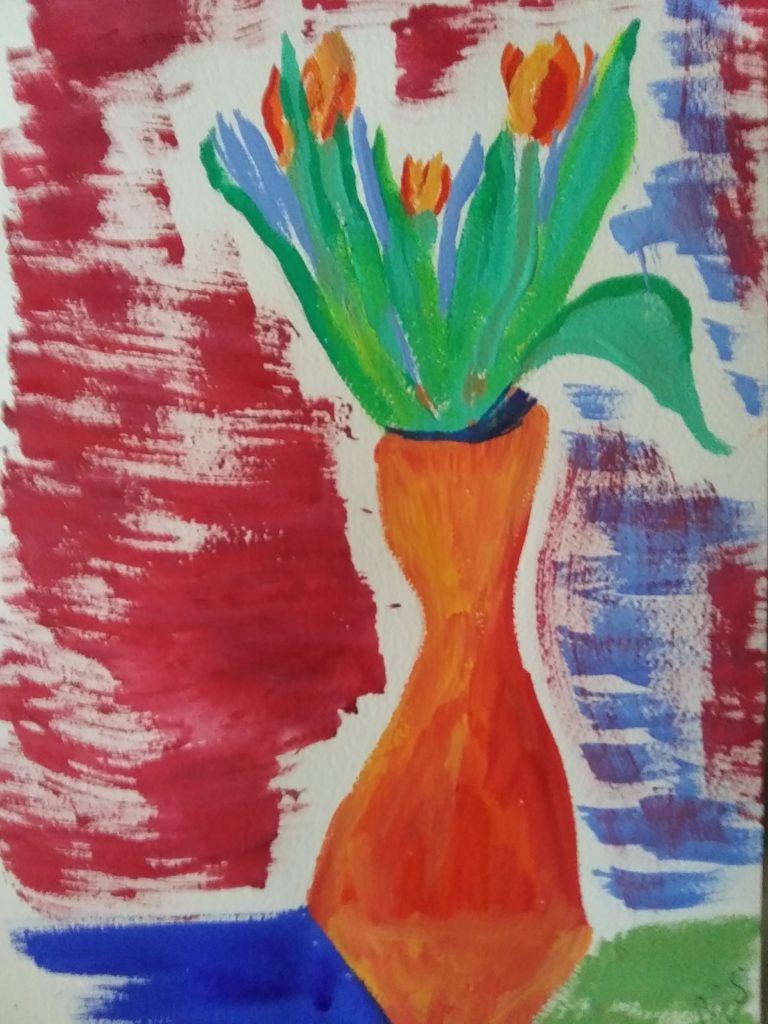
Diane Payne, Holland, Michigan
Journal entry, January 2022
My first winter back living in my hometown after four decades, our country ends up in a lengthy pandemic, and I didn’t remember the winters being so long, so dark, especially with our state in a long lockdown. The house is just my cat, dog, and I, and all my plans of potlucks and happy hours squished inside my small house have transformed into sitting outside by a fire with a few loyal friends who are now a “pandemic pod.” My days are filled with long walks through the dunes and along the lake, waiting for the icebergs to form and this damn pandemic to end.
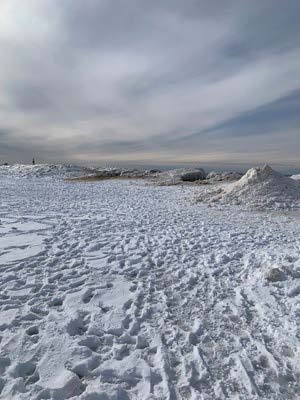
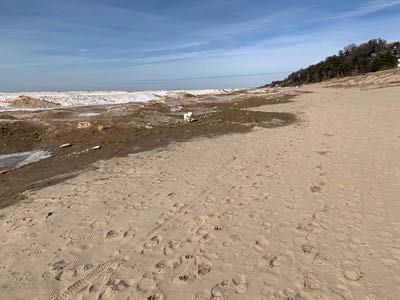
Lois Villemaire, Annapolis, Maryland
Journal entry, December 1, 2021
This has been a stressful two weeks. Paul has improved greatly, thank goodness. Was it the monoclonal antibodies treatment or the normal relenting of the virus? We don’t know but no matter, he is doing better. And so far I have remained unscathed. When my PCR test came back negative I was amazed and relieved.
We are wearing masks and have not been sleeping together. During the day we operate in different parts of the house. Today is Saturday. What difference does it make what day it is?
Yesterday I cleared out all of the fallen leaves in the backyard. Some had gotten into crevices and piled up deep against the house and fence. The wind was to blame. The yard is small with many pesky dead leaves and looking it in that condition was depressing. Filled with nervous energy, I armed myself with a blower, rake, and snow shovel. Yes, a snow shovel helped with getting the huge pile of leaves into the woods. I spend so much time writing at the kitchen table these days and the yard is my view. Improving my view was the impetus behind taking on this dirty job. It looks so much better. I still have to get rid of dead plants to ready the yard for winter.
Roberta Schine, New York, New York
Journal entries, March 2020 and March 2022
Rosie and I call each other a lot. It’s been that way for the fifty-plus years we’ve been friends. I almost know the sound of her ring. “Hey Rosie, what’s up?” I ask. “I just got back from the store,” she says. “I burned my clothes, took a Silkwood shower, threw the bag of groceries down the incinerator and douched with Clorox. I’m good.” We laugh, each knowing the other is scared shitless.
The next morning, we meet at the usual place to walk. The corner of East 14th Street and First Avenue is exactly mid-way between our apartments. We don’t make changes because of our memory issues. Rosie immediately takes a 6’ piece of string out of her backpack and explains that she brought it to help maintain social distance. She tells me I’m a “drifter.” So, we hold the string taut between us and begin walking towards the East River.
Having a conversation is difficult. For one thing, we’ve both noticed some hearing loss – mostly, each other’s. Masks don’t help; we sound muddled. And then there’s the ambient noise. Empty buses clang past and there are a few screaming babies on the street.
I ask Rosie to speak up. She yells, “I’VE BEEN CONSTIPASTED ALL WEEK. NERVES.” I say, “Look, maybe we should just think of these walks as a Zen meditation. How about if we’re quiet together and then call each other when we get home?” We try but that doesn’t work; we’re both pretty chatty. Then, I remember my brother’s suggestion to use our phones. It’s a struggle to dial Rosie’s number without removing my surgical gloves. After a few mistakes, it rings and she answers from across the sidewalk. “Hi Rosie,” I say.
March 2022
Last week a sprig of green peeked through the snow at Tompkins Square Park. Now, Red-Tailed Hawks congregate and tend to their enormous nests. Rosie and I have our N-95s on under our chins. Rosie looks good. I realize I haven’t seen her smile much since her brother’s death last summer. We gaze at two headlines on the front page of the newspaper she just bought: “Covid cases down in New York City” followed by, “New Omicron subvariant, BA.2, is circulating in the US.” We try to process these two disparate facts. Finally, I say, “I think the daffodils are coming up. Shall we find out?” We link arms, pull our masks up and go in search of the pretty blossoms.
Mary Wasacz, Scarsdale, New York
Journal entry, March 18, 2022
During the Covid-19 lockdown, high tension abounded in our home between my husband, John, and Gracie, my umbrella cockatoo, who squawks in ear-piercing sounds. Gracie is all white except for the undersides of her wings and tail which are yellow. When happy, sad, or scared her crest opens up like an umbrella.
John is writing a book from home while on sabbatical. “I can’t concentrate with all her noise,” he says. After a few days of this, John exclaims, “If Gracie doesn’t stop, she’s got to go. I have a deadline to meet.”
I slam my book on the table. “That bird isn’t going anywhere.”
The next time she squawks, John goes over to her. “What’s your problem?” Gracie quickly goes to the other side of her cage, looks at John and then slowly comes towards him, throwing him kisses.
“You calmed her down, John.” He smiles, beaming with pride.
“I’m a good girl,” says Gracie.
She gives him more kisses and does her tumbling on her rings. John gives her a pine nut. Later when John walks into the room, Gracie says, “Hello John.”
Pia Wood, Henderson, Nevada
Journal entry, March 19, 2022
Home from the first concert in two years. In bed humming that tune from years ago. I can’t sleep. I just think: We have escaped from the quiet of the Pandemic. We have arrived from the Pandemic shedding our mourning dark blue, black and gray moods. We have pierced the shield of the Pandemic while moving fast, running hard, and jumping over new hurdles on a dare of finding joy. We have danced away from the Pandemic leaving the slow drag behind. We have twirled away from quarantined corners. We have shifted gears to speeds that affirm: life is short. The lifting of the mask mandate offered new color in a world we thought black and white. Yet, our hearts know that at any moment the universe can install barriers that reveal themselves in slow motion. Tonight at the concert bold and muted colors floated around me as I shimmied and bounced like I did at my high school prom. Tonight, I double-clapped my hands like a genie granting the world’s wish to make the sorrowful Pandemic memories disappear into the boogie of the music.
Maureen Murphy Woodcock, Cathedral City, California
Journal entry, March 18, 2022
It’s been over 45 years and I believed I’d successfully banished a repeated nightmare that haunted and tortured me for weeks. But it’s back again – resurrected with this war in the Ukraine. Social media and the news networks have posted stories and pictures of young mothers – like I once was – with their handicapped children. Some of the kids have multiple, severe disabilities; meaning they are non-ambulatory, unable to feed themselves, or unable to talk.
In the mid-1970’s, an older woman from Poland lived next door to us. She told me about how she’d fled Warsaw when it was under siege during WW II. She looked at my three children and said how lucky I was to have never been forced to escape an invading army. “You wouldn’t have made it with her,” she said, nodding at my 7-year-old daughter, Erika, who had multiple handicaps. The woman patted Erika’s wheelchair handles. “This thing is worthless. You can’t push it over rubble, up mountain paths, or across rivers with no bridges.” My neighbor sighed. “War means you’d have to make terrible life and death decisions. Go or stay? Would you abandon Erika? Just take only your other two children who would have a better chance of surviving?”
But I didn’t feel lucky. Her words crept into my sleep. And I wondered if my neighbor was telling me her story. I didn’t have the nerve to ask her. Night after night I worried about what I would do if my world was suddenly bombarded. It never was and, eventually, I felt fortunate and blessed.
Since then, Erika has passed, and her older brother and sister have safely reached middle-age.
For years, my terror of how to flee a war was forgotten. Until Ukraine happened. Once again, I didn’t sleep well. Still didn’t know what to do, how to help, or how to make the world we live in feel safe. But today I woke up, ready to pitch in. I won’t let nightmares paralyze me. If I inhale slowly, take deep calming breaths, there are many things I can do; contact agencies like UNICEF, Doctors Without Borders, The Ukrainian Red Cross, Nova Ukraine, Project HOPE, Save the Children. I can contribute my air miles to refugees.
This morning, I phoned friends in Poland and told them how proud I am of them. I asked them if there’s anything I can do to help. These wonderful friends have given some Ukrainian mothers and children the unlimited use of their vacation home outside of Warsaw.
Taking action, even tiny steps of action, has infused me with hope.
James Higgins, Eugene, Oregon
Journal entry, March 1, 2022
My state of Oregon will lift its mask mandate at 11:59 PM on March 11th. The only places then requiring masks will be in health care settings, public transit and airports.
I am 81; my wife, Anne, is 77 and spent the last year being treated for an aggressive form of breast cancer. The treatment involved surgery, 15 weekdays of chemo therapy, oral medications and a number of infusions. Now, she is cancer-free, we are told, but will continue taking an oral medication, getting frequent mammograms and visiting the cancer clinic every month or two. Of course, her immunity system is still compromised. I am mostly healthy, only one prescription needed.
Our dilemma then is this: It seems to me that we should continue to wear masks for at least the immediate future. How long? That is the question we will be asking her Oncologist. I will continue to do most of the grocery shopping and prescription pickups and I will wear a mask to protect Anne.
Elaine Lambert, Montoursville, Pennsylvania
Journal entry, February 22, 2022
2-22-22. Twos in sequence. Angel numbers, signifying an awakening. Expect messages on this day, February 22, 2022.
Yesterday, I went into a store without a mask for the first time in two years. It was a rare sunny day. I wanted to breathe the warm air, wear lipstick, see facial expressions. I wanted to feel connected. Going mask-less felt like a risk I needed to take.
In the early months of isolation, keeping busy was how I distracted myself from loneliness. In this period of hyperactivity, I constructed a complex little quilt based on a pattern by Cheyenne Goh: Ring of Roses Mandala. Winding long, cut strips of fabric into tight circles assembled into larger rings, I formed a three-dimensional, 20-inch circle unlike any other quilt I’d ever made.
My quilt mandala reminds me of “Ring Around the Roses,” a song once claimed to be a historical remnant from London’s Great Plague of 1665. Experts say that is false; the story is meta folklore (folklore about folklore). In fact, it is just a dancing game traced back only as far as the late 19th century. The “ashes, ashes” do not describe mass cremations (illegal in 1665). When the dancers “all fall down,” they are not recreating black death scenes from any century. They are bowing to one another to mark the end of the dance.
Could the end of the Covid dance be the blessed revelation of 2-22-22? I remove my mask and bow.
Susan Fealy, Melbourne, Australia
Journal entry, January 30, 2022
When is a sunset the beginning of a story? In writing this, I suspect that I have my answer. You see, the sunset was so vivid, its feathers were made for a bird not yet invented. But even a potential bird needs a cage. I rushed out into the side street with my camera, and there were two young people up on their roof in glorious silhouette. I felt like shouting out to them ‘touch the sky for me’. I settled on a wave. The young woman waved back, then turned to the young man by her side. So I caught them instead. A great snap of roofline, young lovers, and that bird. I left them a note asking if they would like my snap of the sunset: them in silhouette. Silence for five days. Then an email. She had just got my note. They had been isolating. Her flat mate has COVID. I sent them the snap, offered to shop. Now I have an invitation to partake of their greens. The pandemic has broken some boundaries. And some birds have not yet been invented.
Alan Bern, Berkeley, California
Journal entry, February 10, 2022
Under and pressure fit together, good mates, perhaps even mating, although, when apart, each flees in many directions. Under pressure, the phrase itself is. Deep anger here and abroad, and our job is to remain tactical, compassionate, brilliantly under pressure. There is fear abroad and beside us. Some pronouncers speak with deep compassion challenging the deceivers and the viruses themselves. “Wash your hands.” Perhaps instead of singing “Happy Birthday,” songs of fearlessness.
Inevitably some sicken and will need treatments: when they arrive in responsive hospitals, they may be greeted by the tongue depressor, miraculous instrument, probably first used during our first U.S. Civil War. The modern one, perfected by Jerome H. Lemelson, 1923-1997, who first conceived of a tool to hold down the tongue to examine both tongue and throat: he made a metal one for his physician father. Because metal ones are so difficult to clean, better a simple wooden one, disposable. Work, flat wooden flap! Now you are needed more than ever before.
Under pressure from this fine tool, tongue depressor, much revealed. Some patients may gag, but do not worry about gagging: inspections are brief — all will surpass, whether our exact world ends now or in 10,000 years. There will be suffering and suffering. Only vast compassion can alleviate some suffering.
Cynthia Dorfman, Rockville, Maryland
Journal entry, February 20, 2022
The roundness of sand grains, the round of snowflakes in the rounding of time: history repeats itself with the same symbols, but in different ways. I counted snowflakes instead of sand while waiting. This is how I felt then and now feel again after 60 years — points of transition. Coming home from a long-postponed visit with my daughter in San Diego, I brushed sand from my coat and cleared snow from the car at BWI Marshall Airport in Baltimore. The pandemic has lingered, and all I can think of is the waiting. At first, I thought the shutdown was like a school closing after a blizzard with anticipation of a sledding holiday. Instead, the pandemic has lingered, cabin-fevered for two years. How can I cope with this waiting?
The only memory I have of such a lengthy time span was over the two years anticipating my father’s return from a tour of duty in Okinawa with the Marines. It was the dawn of the 1960s and the beginning of my teen years. We had been forced to move from Camp Pendleton’s sandy hills to my grandmother’s icicled Victorian house at the foothills of the Adirondacks.
Waiting during those two years taught me patience in the fog of fear — fear for my father’s life and safety. Now, over two years of the Covid pandemic, I have sat in fear for my children and grandchildren’s lives and safety. Once again, as I experience my seventh decade, it has been a time of counting snowflakes instead of sand. I am waiting for the snow of the virus to lift so that I can once again feel the sand slipping freely through my hands.
Jennifer Pratt-Walter, Vancouver, Washington
Art entry, February 18, 2022
The images are based on a deep sense of hope that is embodied in delicate living beings. The hope ringing in my heart is both for healing and recovery through the pandemic and for spring opening its very welcome door.

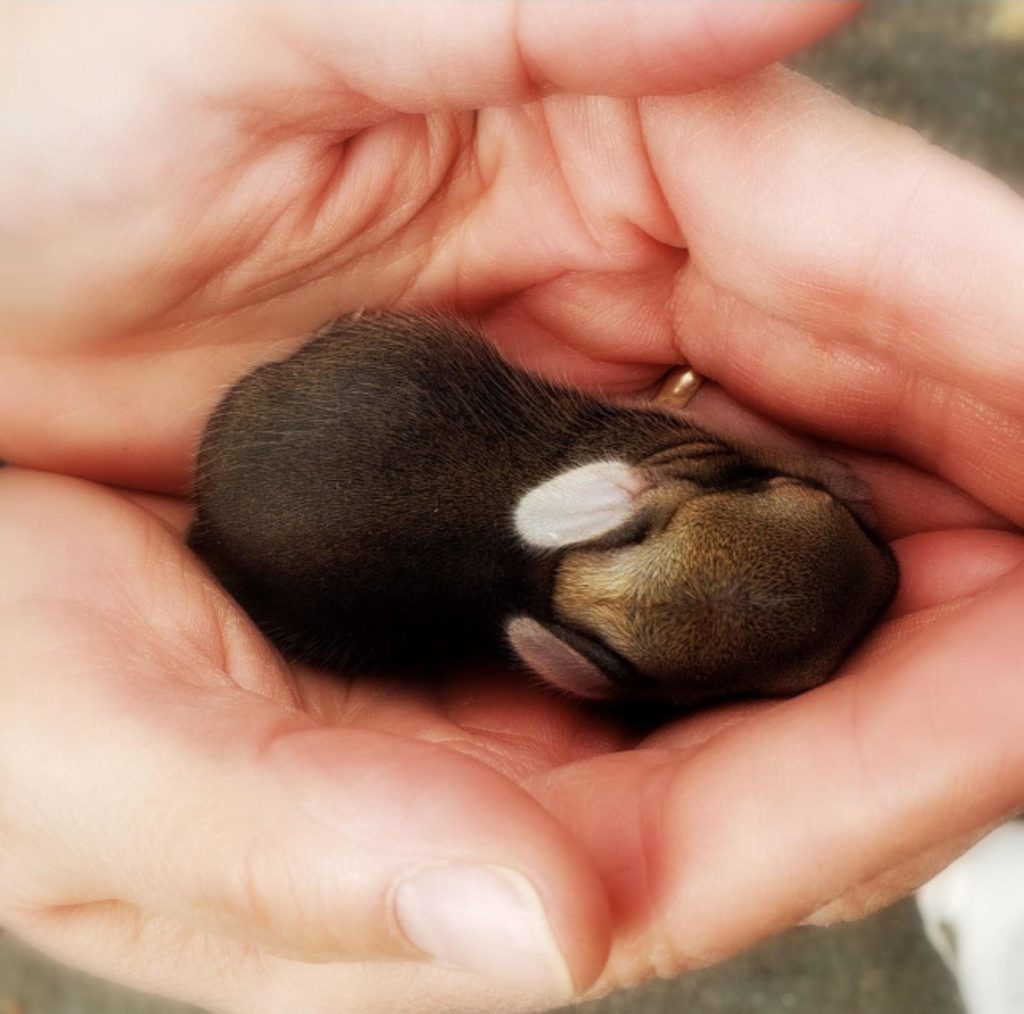
Joel Savishinsky, Seattle, Washington
Journal entry, February 16, 2022
Today would have been my parents’ 81st anniversary, and while gazing at their World War WII-era wedding picture, I look to the right at the photos of five people they never got to meet . . . their great-grandchildren. Thinking about those generations in our third winter of Covid, I wonder about the medical crises that have marked their time in history. When my parents were children, they lived through the 1918 flu epidemic. Yet I never heard a word from them, or their parents, about that world-shattering illness. Their reticence, if that’s what it was, has always mystified me. Yet it is of a piece with the silence of our culture at large, whose literature, films and art have rarely dwelt on that traumatic, frightening period. It has taken Covid-19 — the great-grandchild of the 1918 virus — to remind us of that time and urge us to try to re-learn some of its lost lessons.
Looking at my parents’ faces, I ask myself: what were the fears they lived with as young parents. In the 1940s and 50s of my own childhood, my mother and father had experienced the defining pandemic of their adulthood: Polio. Born in 1944, I would develop mild symptoms at age 10; my older cousin David was stricken with a serious case of polio just a week before his Bar Mitzvah; and my wife Susan, born in 1945, would — as a four-year-old — end up in a special hospital ward, lying in a bed just feet away from children with iron lungs and paralyses that would soon end some of their lives.
Today, although I live in a country and world besieged by conflict and Covid-19, I still feel blessed by this anniversary’s mixing of memory and medicine. Their combined prognosis is, perhaps surprisingly, one of hope and gratitude.
Mark Tochen, Camas, Washington
Journal entry, February 13, 2022
Thank you for asking for favorite pieces of music or art — what a wonderful request! Right away I settled on music because we respond so quickly to music. Art takes more time — the art studying technique called slow looking even expects that you take the time to really get to know an artwork. It’s remarkable, but not like being transported to pleasure in five seconds by a bar of music!
I chose from the Baroque Henry Purcell’s seventeenth century trumpet voluntary. Played with organ and trumpet, this piece ignited my sleepy self on a Sunday morning many years ago. The lilt of the trumpet conversing with the majesty of the organ greets the day with a call to joy — surely a song of morning, of a new day and new beginnings, of waking and dancing around the living room with your child in your arms!
Leane Cornwell, Mill City, Oregon
Journal entry, February 13, 2022
Any mid-February sunny day in the Pacific Northwest requires the doing of outdoor chores. Steve and I went to Bi-Mart for a few supplies to do ours. Found quickly, we headed towards the check-out counter. My thought of ‘It’s Sunday; we’ll be in and out in no time’ was very wrong.
As we rounded an aisle it was brutally obvious there would be a long wait in line. Only one register was open. I felt pity for the young man manning it.
We located the end of the line and were relieved to see a friend in line in front of the young man in front of us. Conversation ensued. Fishing was the subject and before I knew it, all three men were swapping fish tales.
Our words and laughter snatched up the young woman behind us. She was buying archery supplies and a target. Her children wanting to practice before competing at the camp bow range during their summer vacation. As we visited and the line forwarded, we passed the candy shelves. I couldn’t not pick up that Hershey dark chocolate bar.
Time passed quickly and our friend checked out.
Now it was the young man’s turn. He was returning an item for $31.99. Nolan, (we knew his name by now) the cashier, asked if he had a penny, he would give him $32. The young man didn’t. I said I did and offered it up.
Apparently, he had noticed me add the chocolate bar to the supplies I held. As he left, he gave the two dollars back to Nolan telling him it was for my bar.
Life is sweet.
Darci Wolcott, Indialantic, Florida
Journal entry, February 4, 2022
Today is Friday. We just finished playing Brahms’ Piano Trio in B major in my living room. We plan to play string quartets on Monday. I’ve been playing chamber music with dedicated amateurs for forty years. For many years, I was the pianist. I took up the cello in my fifties, and even now, after nearly 30 years, I still have to practice a lot to keep up with these dear friends who have been playing since childhood.
It’s worth it: our twice weekly sessions have kept us sane — at least, saner — throughout the pandemic. We open the windows, run the A/C and air purifier. We’ve masked, and vaxxed. Our “bubble” made it through until last month, when one of us had a brief bout with Omicron. The music is a respite from sadness and fear. We are totally engrossed as we try to translate black lines and dots on a white page to the language of beautiful sounds, let alone synchronizing the rhythms and dynamics of the masterpieces forwarded to us by the great classical composers.
We are not like the skilled professionals who share their talents with others. But today, we did our best for Brahms. It’s very complicated music, full of emotion. We are exhausted and thrilled, and the sublime music will continue in our heads for days.
Stephen Kingsnorth, Wrexham, Wales
Journal entry, February 1, 2022
In response to Passager’s call for members of the community to share what art, music or literature inspires them these days, I would have to say the composer Edward Elgar. Pandemic or not, he always works for me.
Because he wears the looks of an Edwardian English gentleman and reminds me of my great-grandfather.
Because he takes me to the Malvern Hills in Worcestershire fifty years ago, and I am drawing strings on the Christmas-gift kite on Boxing Day, battling the wind as I overlook three English counties — not in a vast panorama of global note, but in an ‘area of outstanding natural beauty’, the comforting understatement of a green and pleasant land. Because I can hear the swells and crescendos of ‘Nimrod’ from ‘Enigma Variations’ played at my funeral, as encapsulating the sheer joy of freedom.
*Elgar was best known for his Pomp and Circumstance marches.
Lucy Iscaro, White Plains, New York
Journal entry, December 26, 2022
Usually when we would celebrate our interfaith, blended family, celebration the hardest part would be getting the latkes just right and making sure all the gifts were wrapped. This year has a new addition to the preparations. The Covid rapid tests. A friend of mine celebrated with her children last week and half of them came down with the Omicron variant. We can’t risk the children’s health. Nor can we risk our own. We are, no matter how well we feel, in our vulnerable seventies.
It was uncomfortable, or to quote one of the grandkids, gross. But we all did it and thank goodness we were all safe to be together. And it was exciting to be setting the Brunch table with the extra leaf in it for the first time in two years.
I offered to make eggs to order. Then our oldest grandson, just a week out of his own Covid quarantine said he would be the egg chef. I didn’t even know he could make food! He proceeded to execute perfect egg dishes for himself and several of his cousins. I was touched and proud. I saw this 25-year-old man at my stove but at the same time I saw him as the tiny toddler who rattled my pots and chanted, “Cook, cook.”
Antoinette Kennedy, Hillsboro, Oregon
Journal entry, February 7, 2022
My mother’s spirit leaps from her drawing of the hunting dogs. Born in 1909, she was a teenager or maybe young adult when she created this, framing the piece in beige matting. The pen-and-ink has hung in our family homes for ninety years. It is mine now. Friends ask, “Were these your dogs?” I laugh. Growing up we had dogs, but they were part mutt, part spaniel. They romped in the neighborhood, splattered mud on the linoleum, and gave us litters with unknown blood lines. No, this painting is all of my mother, the artist of noble head and fine bones. My mother, doubled in elegance, who, even now, lifts her head, stares toward far horizons, and bounds toward beauty.

Teresa Elguézabal, Baltimore, Maryland
Journal entry, February 2, 2022
In the parking lot, a woman sits on the curb near the library door, looking forlorn. It dawns on me that, under the pandemic schedule, I’ve arrived early. Through my passenger window, I tell the woman, “The library doesn’t open until noon.”
“What?” she asks.
We have to repeat ourselves until she asks, “¿Ha-bla es-pa-ñol?”
Something about my speech, my hair and eye color — I assume — led her to guess right. “Sí, también ingles,” I say (English also).
“Está muy linda,” (pretty) she says, and I smile: “Gracias.”
From her cautious pronunciation, I figure she’s not a native Spanish speaker. Yet she knows that pronouns are integrated in verbs. I compliment her Spanish. She gives me a thumbs-up, and I return the gesture from inside my car. If not for the modified library hours, we wouldn’t have had this time to become buddies. We protect ourselves from infection with separation, yet Corona virus brought us together.
“My name is Rhonda,” she says.
The security guard tells her the library will open soon. “Move away from the door.”
“I’m talking to a nice lady in Spanish,” she says, but he insists, “Move along.”
I don’t know how long Rhonda sat on that curb, but she appeared content leaving. She and I had, separately, escaped the quarantine of home and ended up chatting in Spanish. By daring to speak each language and meet others wherever they sit, we can mend what rips us apart.
Romana Capek-Habekovic, Grand Rapids, Michigan
Journal entry, January 27, 2022
The winter of 2021 was almost over when I decided to go for an early walk. The last snow melted exposing rotting leaves laid next to the asphalted path. The temperature was in low digits but above freezing. I put on my fleece-lined windbreaker, thick tights, earmuffs, and woolen gloves. Halfway through my route, I noticed that my usual maskless elderly strollers, my contemporaries, were missing. I attributed that to their waiting for the afternoon sun that the forecast had predicted. Instead of my usual focus on the rapid pace I try to keep, I slowed and observed the surroundings. Suddenly, I noticed a slight commotion on the thin layer of leaves. Out of it sprang a small bright yellow butterfly that proceeded to fly in front of me. I ran to follow it. I felt that wherever the butterfly took me there would be a new beginning. He was a messenger of hope, that phoenix is still possible. My chase ended when the butterfly soared above my head and disappeared into the woods. I resumed my walk at a slower pace and smiled as if trying to make the whole world smile with me.
Miriam Karmel, Minneapolis, Minnesota
Journal entry, January 30, 2022
We’re hunkered down. Again. Temperature hovers in negative territory. Omicron tears through the country. Restaurants, airlines, theaters, subways are cutting back because too many workers are sick.
This morning, at the start of yoga class (Zoom! Zoom!), Guru Nancy remarked on people saying they can’t wait to get back to the way things were. “I think what they mean is, they want to be free.” She said that even before the pandemic, Buddhists spoke of finding freedom in each moment. “You can have freedom now.”
Later, I told B, “We have to step up our game. At dinner, we will dress up. Not top hats and tails; high heels and chiffon. But we have to do better.” B has taken to wearing saggy pants around the house, and a trio of untucked shirts wool plaid, tee, pinstripe. The layered-look run amok.
I’m thinking back to a summer in Italy when all the writers in our workshop dressed up for dinner, on a terrace overlooking the valley. We wore treasures gleaned from local markets — silk shawls, embroidered blouses, amber beads. We wore lipstick.
Now I remember Susie saying, “Put on some lipstick, you’ll feel better.” Tonight, I’ll take my sister’s advice and color my lips a shade aptly called, Brave Red. I’ll wear a necklace and pretty shawl. I don’t expect B to put on lipstick, but he will tuck in a fresh shirt, and shave. Together we’ll reclaim a bit of the way things were.
Judith Krummeck, Maryland, USA/South Africa/Zimbabwe
Journal entry, January 26, 2022
As I write this, Sasha is chowing down on her breakfast from a bowl that has a matching black kitty at the bottom of it. Thelma has spent another night firmly locked against my hip in bed. They missed me, and I them. Against all odds, including four touch-and-go COVID-19 tests, I’m just back from that other place I call home.
Was it reckless to go? Yes. Was it worth it? Yes, and yes. The omicron variant, identified by my astute scientific compatriots in South Africa, has peaked there and, being summer, we could all gather outside. First touchdown in Cape Town, my soul city, catching up with Erica and Peter; a quick run-up to remote Koringberg for afternoon tea with Hillary and Trevor; then to Hermanus to overnight with them in a family home overlooking the Indian Ocean. On Friday, a flight to Johannesburg, and a drive east to Millstream in Mpumalanga, with the welcome committee being a group of zebras. Where we were married. Twenty-five years ago. On January 18th. How could we not hold fast onto the dream of celebrating our silver wedding anniversary there, COVID-19 notwithstanding? And to be there with Jan and Julia, who celebrated with us all those years ago. The added bonus — a flight to Victoria Falls for me to see this indescribable Wonder of the World for the first time in my life.
So now, jetlagged and replete with memories, I remember the smells, the warmth, the unique beauty, the honking calls of hadedas, the irreplaceable friends. I think of having been home, from the place I now call home.
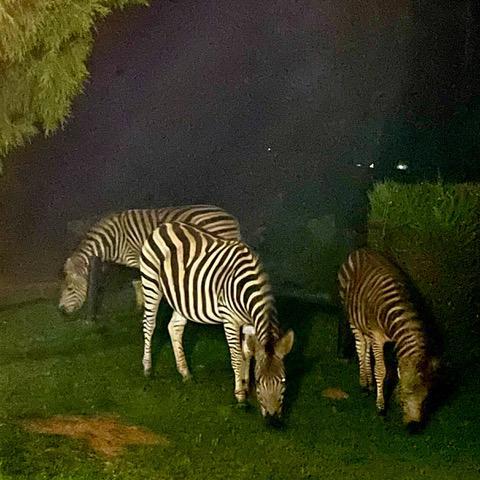
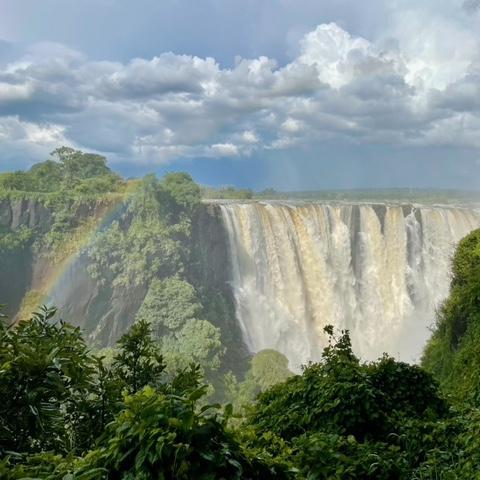
Marjorie Stuckle, New York, New York
Journal entry, January 18, 2022
I am sitting in my apartment, watching your funeral on my iPad. I am writing to you in this journal entry but you cannot hear me. I am thinking that the pandemic has intruded again, and this time it is robbing your friends of the intimacy, the comfort, of friends in mourning. We need each other. We would have gathered at a meaningful service, to say goodbye to you, finding a place to share our memories and drink a vodka toast to you. We had plenty of memories after all. I recall all those years, working together. So, while I could hate this distance from you and our friends today, I am grateful for this screen, for this funeral by iPad.
Because I feel the need to be quiet, to think and to remember your fun-loving, energetic, singing beautifully, life. And of course I will toast you, old friend, in my apartment tonight. You were a character!
Barbara Buettner, Fanwood, New Jersey
Journal entry, January 16, 2022
Today, a miracle of sorts: I hear my aunt’s voice. At 10:30 the temperature has reached 14 degrees and, possibly because of the cold, I decide to call my aunt Georgette who lives in Montreal. It must be even colder there. Sunday mornings was when I called her for over 18 years, since my mother died. But for about a year, her aides have forbidden her the phone, knowing that with her lapsed memory, she often calls her children up to 20 times a day.
On the other end of the line, her voice appears. I conjure up her face with ease. She is 102 years old now and we have had a long relationship. I remind her carefully who I am, whom I married, and the names of my child and grandchildren, and of course, my mother’s name. She doesn’t remember clearly but she works at it nonetheless. She wonders why I’m not there and I remind her that I live in New Jersey and won’t be able to visit until virus restrictions lift at the Canadian border. I remind her that I sent a picture a month ago and she is blank, saying she never received it. The aide shouts out that she did and says she’ll show her later.
It’s hard for her until we turn to lighthearted things — the weather, her latest activities, her recent birthday party. She doesn’t feel 102, she tells me. I ask her how old she feels. 24? I suggest. “Now don’t exaggerate,” she says, laughing. “Maybe 40” she insists. We joke a little in the here and now, she throwing in French words that come from deep in her unremembered world.
No matter that she doesn’t conjure up my face or who I am. I can see hers as if she is in front of me. I can conjure up the years of love in her presence, the feeling of belonging in her life the minute I crossed the threshold to her house and sat at her kitchen table with tea served in fancy porcelain cups. I feel her arms around me as I leave to return to “The States,” see the tears in her eyes and hear her injunction for us to hurry back. See her joking with my husband, whom she also loved but no longer remembers. I think of the summers she so generously took care of my younger sisters in the shadow of my young father’s death. I don’t mention their names, though she loved them. This conversation is enough now. I don’t want to cause some pain deep inside a brain that has begun to change.
So she doesn’t remember me, and maybe she doesn’t even remember my mother, her favorite sibling, whom she adored. I’m afraid to ask. I keep the conversation light and cool for this woman whose fading memory is something she’s entitled to at 102. I am so grateful to have unexpectedly heard her voice today. Even if I never talk to her again, today was like a Sunday miracle.
Fred Karlip, Baltimore, Maryland
Journal entry, January 24, 2022
Despite having gotten the vaccines, a medical condition has left me highly susceptible to COVID. Consequently, I’ve been stuck at home for a long time. And the question is always . . . what to do?
As I stare out the living room window it occurs to me that maybe I should do something nice like feed the crows. It’s so cold and nasty outside, I think the crows could use a little love in the form of food.
According to the Internet, since they’re scavengers, they eat almost everything. I did get some suggestions on some of their favorite foods, and I happen to have some real crow goodies, including raw peanuts, bits of cut up apple, broken pieces of matzoh, dog kibble, cut up chicken hotdogs, and Rice Chex.
Crows can produce intelligence equal to that of a seven-year-old. They can problem solve using multiple steps and tools (see examples on YouTube!). They can remember thousands of places where they have stored and hidden food.
I also learned that because they’re cautious, you need to conform to their expectations if you want them to trust you. They recognize faces and will categorize you as neutral, a friend who regularly feeds them, or an enemy who has threatened them. If they learn to trust you, not only might they eat your food but they may leave you gifts: some type of shiny object they found or maybe even a dead mouse. However, if you have offended them, you could very well be dive bombed.
Learning about, observing, and interacting with them has become my new hobby.
Rosanne Singer, Baltimore, Maryland
Journal entry, January 16, 2022
On December 27th, I got one of those reminders that life can change in an instant. I slipped on a rain-slicked mat outside an Airbnb, fell to the ground, wrenched my right ankle and frightened the upstairs tenants and my family with my hair-raising screams. The six steps up to street level were the last steps I’d climb for a while. An emergency room visit and x-rays showed a bad sprain. I left the hospital several hours later with crutches, an air-cast and my husband and daughter on either arm.
A few days later back home in Baltimore, I started coughing and noticed that my husband’s morning coffee smelled foul. On January 3rd, I tested positive for COVID (despite being vaxed and boosted) and have spent two weeks cycling through an array of symptoms from congestion to chest tightness to coughing to low fever. I’ve left our apartment just once, to get fitted for a CAM boot for my ankle. My husband and I have lived like masked strangers, never touching, keeping distance.
I’ve also cycled through an array of emotions in these past three weeks. I’ve cried out in pain and self-pity; I’ve been short-tempered with my husband and beyond grateful; I’ve made jokes and been humorless; I’ve felt connected to friends and family through phone, text and email, and at the same time felt mightily bored, alone and lonely.
The world is going through some tough gyrations, but I can’t wait to rejoin it. I’m looking out the apartment windows a lot and longing to walk our dog, return to the Saturday farmers market and taste the snow I can see coating the tree branches.
Jane Seskin, New York City, New York
Journal entry, January 16, 2022
Frigid winter day. No plans. Went down to the lobby of my apartment house, mask in place and sat on the tweed sofa off to the side. Watched my neighbors enter and leave while I happily stayed put. Saw some nice puffer coats.
People paused in their day to stop and talk. There was a spirit of catch-up. I witnessed conversations and learned of some who’d been broken by the losses of the year. Some of these people I’d grown old with, watched their children grow up and out. With a few I laughed, how good that felt and with others sighed over changes in the neighborhood. The lobby time was connection. It was community.
Gathering together was an elevator ride away. Easy. I need to remember to be among the voices, because that’s what contributes to my humanity and gratitude.
Lev Raphael, Okemos, Michigan
Journal entry, January 3, 2022
I wake up every morning feeling like David Byrne in a classic Talking Heads song as he laments, “How did I get here?” Because as the song says, this is not my beautiful life. That disappeared two years when I stopped traveling in the U.S. and abroad, stopped seeing friends for lunch or dinner, stopped feeling safe in the world. Yes, I wear a mask when needed and have had my vaccinations and booster shot, but at 67, I feel endangered and besieged.
In the beginning I almost had panic attacks leaving the house to go on a simple shopping run. I’ve calmed down over these long months, but any news flash about rising infections or the new variant coming across my screen pushes a button I wish wasn’t there.
My professional life has been damaged: as a writer I haven’t been able to do the workshops I was scheduled to do because they were cancelled. When my 27th book came out, the mystery Department of Death, public readings were off-limits.
I’ve learned how to enjoy near-solitude with my spouse of many years. And caring for two West Highland White Terriers has been an anchor because they need to be walked, fed, groomed, played with and loved as if nothing has changed.
Yet two years have been stolen from me and all I can do is write about the loss.
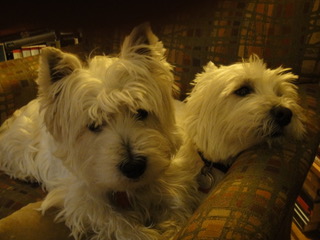
Dina Sokal, Baltimore, Maryland
Journal entry, January 10, 2022
Despite Covid 19 and fears of flying during the pandemic, we flew from Baltimore to Los Angeles to see our first grandchild, Elisheva. She was born on April 8th, 2020 after our family Passover seder conducted on Zoom. We didn’t see her until two and a half months later. We fell in love with her on the spot. She has wide blue-gray eyes that stare at you with a focused intensity, a dedication to learning all about the world. She raises one eyebrow in a quizzical look. She widens her mouth to smile and then the corners of it will go down in a cry. Her parents think she’s embarrassed. She looks at you with a feeling of love shouting at you and flowing through your heart. She cranks her arms and legs up and down in bent poses doing her own dance, a dance of being alive and alert. Her smiles lead to crinkling of her eyes and a way upturned mouth, bubbling with fun and amusement. She is now almost two — an advanced two-year-old beauty — a big personality. I fall into the trap of gender stereotypes and call her a sweet little girl, a sweet pea, our granddaughter, our gift!!

Mark Tochen, Camas, Washington
Journal entry, December 29, 2021
Passager’s Pandemic Diaries are a brilliant concept beautifully carried out — I love these journal entries! But there’s a ginormous elephant in the Pandemic room, and I can’t tiptoe around it any longer — the antivaxxers.
They include neighbors, friends, and family I love, but I don’t want to love them to death. As an old pediatrician, I’ve seen a few things — a roomful of young children lying on cots in a conference room become an improvised hospital ward, 40 children dying of measles encephalitis, surrounded by grieving, sobbing family members. And yet a year later an improved measles vaccine was saving lives leading eventually to measles’ eradication —
I remember seeing an old farmer spasming all over his hospital bed in a Virginia hospital, dying of tetanus, “never had a shot in my life,” his proud boast ringing hollow through the room —
And a British medical report detailed the sequelae of the British decision to take the “P,” pertussis, out of children’s DPT shots, and 5000 children unnecessarily died in the UK that year of whooping cough —
800,000 Americans dying of a wild animal virus from China despite amazingly quick vaccine development, most deaths occurring in the unvaccinated, reservoirs of potential disease mostly missing the vaccinated —
The word “science” comes from the Latin word scio, meaning “I know.” There’s no conspiracy against the unvaccinated, only researchers finding a way to protect us all, and in the arms of the willing we find safety.
Vaccines work!
Sandra Rivers-Gil, Toledo, Ohio
Journal entry, December 22, 2021
I don’t rush to hear the world news tonight because news has a way of writing itself perpetually into our culture . . . I see masked people disconnected from smiles, handshakes washed secretly with sterilizing gel, while national uprisings leave us shaking our heads. We are overkilled with numbness. I have been boxed in on Zoom and asked to stand on floor stickers six feet apart. But who follows directions anymore? To close the perceived gap, I found that extending grace, a simple hello or How are you? to a stranger standing in front or behind me in a Krogers or Walmart line makes a difference to someone that day. It seems that the distance placed between us has made us long distance runners trying to catch our breaths. Lately, when I’m driving, there is that one car flying past me, attempting to get somewhere fast, only to be stopped at a red light. Before the pandemic spread itself like a widespread blanket of disease and dislike, I believe we were being pushed toward the threshold of doing something collectively different.
Martha Patterson, Boston, Massachusetts
Journal entry, December 7, 2021
I went out to get the mail today and my neighbor Herc was getting into his car. I hadn’t spoken to him in two months. He was going grocery shopping. He’s a retired music teacher and enjoys gardening in the spring and summer. On the small plot of land in front of his house he grows daisies, lilies, and iris.
“How are you holding up?” he asked and shook my hand.
“Covid’s hardly affected me,” I said. “I never go out except to the bodega.”
“It’s the best thing that ever happened to our economy,” Herc said. “People won’t
be wasting their money going out so much. I’m a Socialist. I don’t believe in throwing money around.”
I turned away as Herc got ready to drive off. When I went back into my apartment after shaking hands with him, I washed my hands with lavender soap. It smells floral and English and ladylike. And in washing my hands I wanted to be careful — you don’t want to argue too much with good health.
Maureen Murphy Woodcock, Cathedral City, California
Journal entry, December 18, 2021
Today, almost everything I needed to remember dodged me as if I was a dogcatcher after a feral cat. The first escapee was the recipe I know by heart. It isn’t written down because I’ve been baking those same damn Christmas cookies for half a century. After taking a few calming breaths, I told myself it didn’t matter. People were probably sick of getting my Jeweled Fruit Cake bites. Soon as I dismissed the memory loss, voila, the recipe came back to me. But I’m still going to bake something different this year.
Then there were those multiple trips halfway down the hall when I lost “what” was it I was going after. Finally, I commanded myself to metaphorically put on my sister Colleen’s orange helmet filled with brain glue. Like magic, it worked. And like always, I laughed at myself. Who cared if it took another trip to reload the toilet paper in the guest bath?
Forty-five years ago, when Colleen was in her early 20’s, Colleen told me she was going to draw a picture of all the things that kept falling out of her head. She decided to design an orange helmet to drip brain glue into her head to plug the up the holes. As she headed for the honey in my larder to mix up her glue, I suggested she paint a picture instead.
Which she did. I now have her genius on my wall. Looking at it soothes and tickles me.
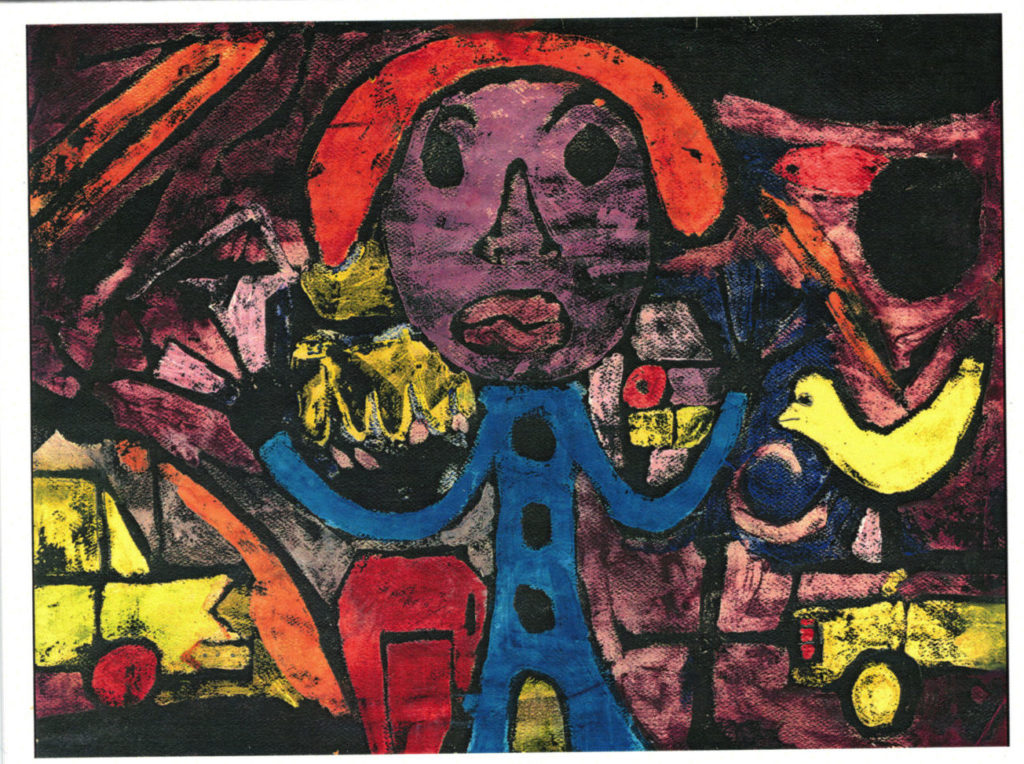
Mark Tochen, Camas, Washington
Journal entry, October 16, 2021
I am now a connoisseur of walks, our main activity during pandemic times. Our basic walk a two-miler with courteous neighbors crossing the street to let us seniors pass, many sidewalk chats — “Jim, garden’s beautiful”, “Christine, glad real estate gave you a break.”
Our neighbors are gardeners and storytellers. Brian the retired cop visited our spring garden with his granddaughters, taking home flower photos and a bucket of flowers for their mom. Brian later called out as we walked by, “Helen, Mark, wait up! I have fresh-baked baklava for you.” I said, “Brian, no one has ever come running to hand us baklava!” We walked away munching baklava warm from the oven.
We walked white Pacific Ocean sands at Seaside, kids hung their sandals on a driftwood snag. We walked a lakeside path with runners, families, bikers, and moms pushing strollers passing politely, almost apologetic — “on your left — sorry!” One guy broke the tranquility, pumping hard on a mountain bike in mid-path, shouting “hoy” at every curve. I shook my head in concert with another pair of seniors, who said, “he’s sure in a hurry.”
Walking along the Columbia River, we saw barges and sailboats mingling in mid-river and a stern-wheeler churning upstream. Another couple took our picture, framed between beachgrass swaying above our heads and abandoned pilings now claimed by osprey nests. Glorious walks — metaphors of delight, defiance, and defeating this pandemic!
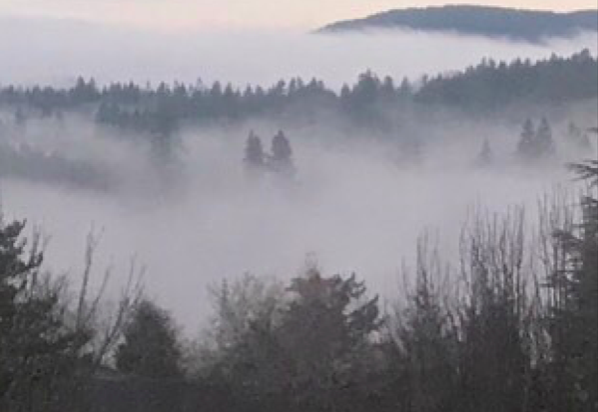
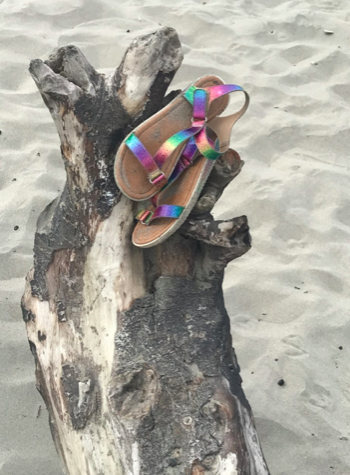
Cathy Lipski, Port Crane, New York
Journal entry, November 28, 2021
Almost two years have passed since the pandemic began. Since I have more years behind me than in front of me, I have focused on finding happiness, and have found it in an unsuspecting place; my swing that hangs from my tree.
The pandemic winter was long and a snow covered swing can be a challenge. It can also bring happiness and humor.
In the spring, I sit on my swing and watch sunsets. There’s strange contentment in being alone. As seasons change, so does my tree. Caterpillars crawl on branches and insects scuttle about. When I swing, I pretend life is normal. As summer fades, familiar birds are replaced by unfamiliar visitors. The leaves on my tree change color, texture and shape. I am changing, too, just like the leaves.
One afternoon, I left my swing and tree. A friend and I hiked a trail with views of gorges, golden leaves, meandering rivers and waterfalls. We weren’t the only ones trying to escape, find peace or find clarity. There were smiles on maskless faces. Photographers stood motionless trying to stop time. The pandemic seems to have both stopped time and made time pass quickly.
We feel vulnerable, unlike the gorges, trees, rivers and waterfalls. They remain constant and steadfast. Perhaps we can be hopeful by following their example.
Maybe the next pandemic winter won’t be so long if I brush the snow from my swing.
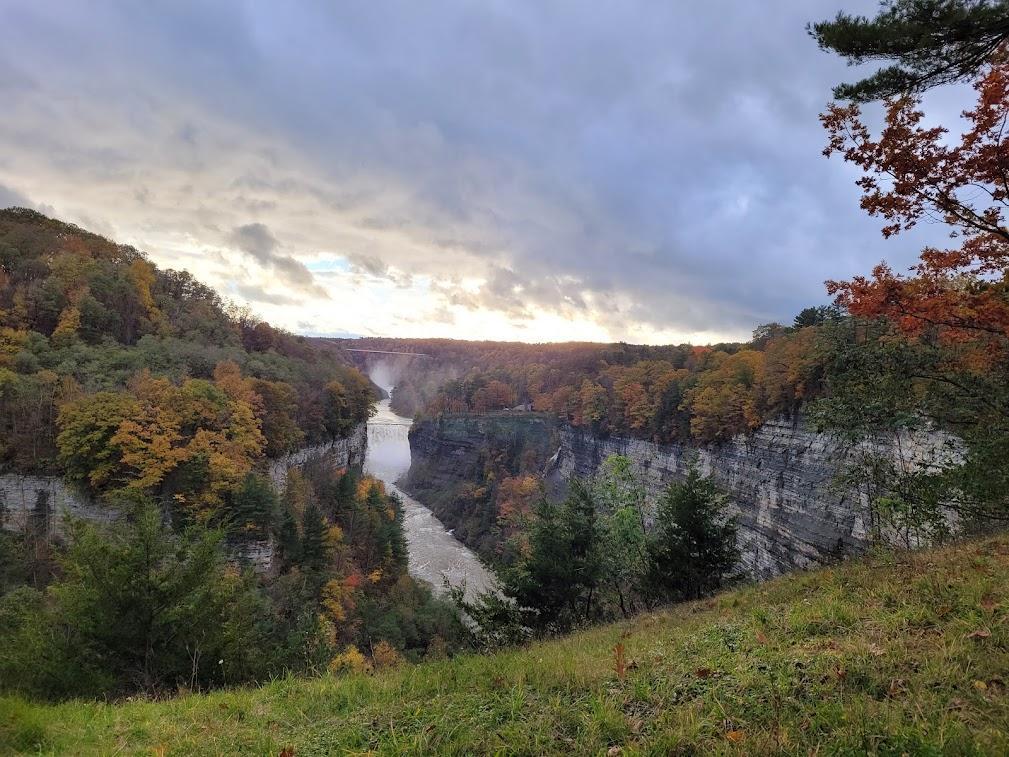
Leiah Bowden, Rohnert Park, California
Journal entry, November 16, 2021
When the pandemic closed down our worlds, I started walking along a creek near my home. I walked from three to six miles every day.
In August of 2020, the heat rose, so I stopped walking every day and walked less when I did venture out. When fire season came soon after, the smoke in the air kept me inside.
When the weather cooled and the smoke cleared, I started walking again but pain in my left hip and in my lower back stopped me in my tracks. I began a round of visits to physical therapists, chiropractors and massage therapists. The treatments mostly worked, but my left hip is still stiff and walking isn’t comfortable.
Last week I had the great good fortune to visit Sedona, where those magnificent red rocks pulled me out onto trails every day. The last day we were there, we hiked Fay Canyon, a mostly gentle, red-dust trail. There’s a side trail up to a shallow cave (the Arch, it’s called) that required some serious rock-scrambling. I made it halfway up and then honored my legs’ jellied demand that I stop.
As my friends and I walked back to the parking lot, I was in the lead, striding. Striding! No pain! No stiffness! I now know that while it may take a half mile to limber up, what my body needs is the good stretch of walking.
Onward!
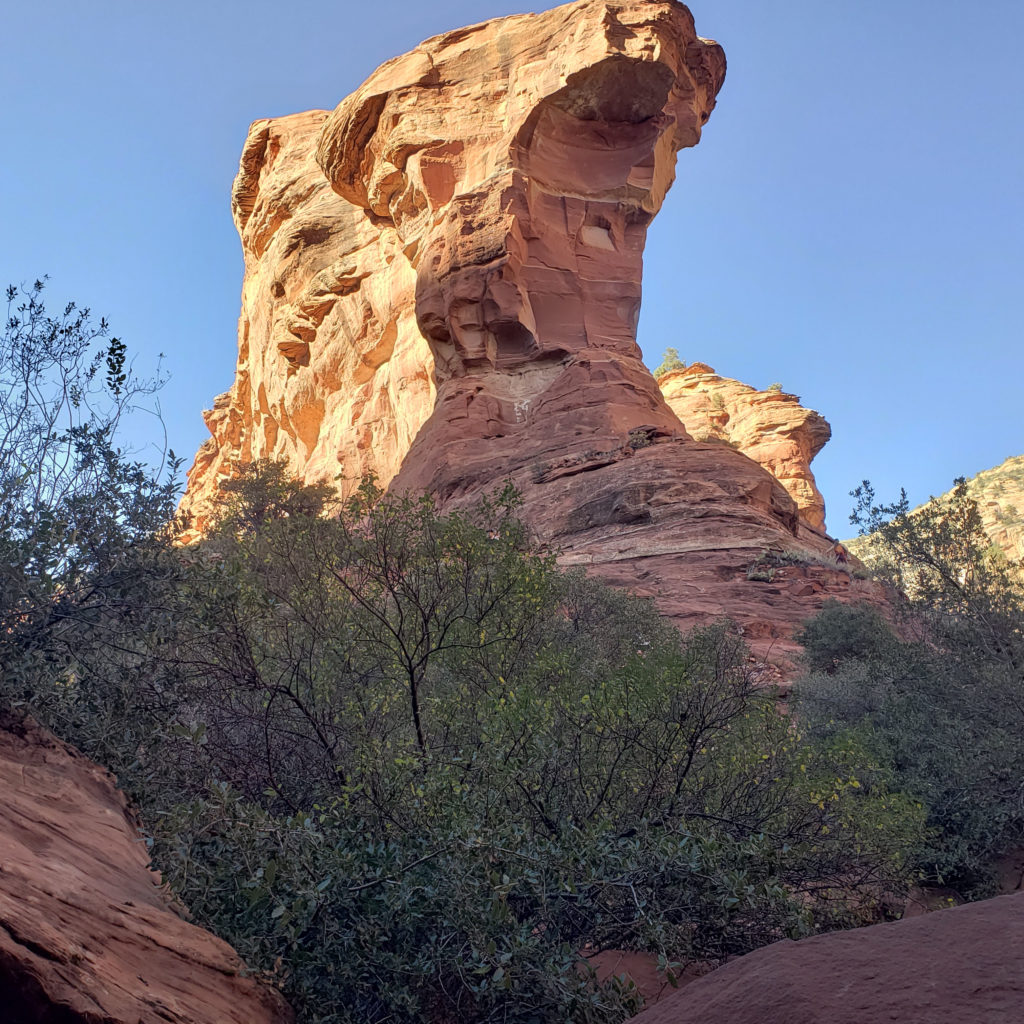
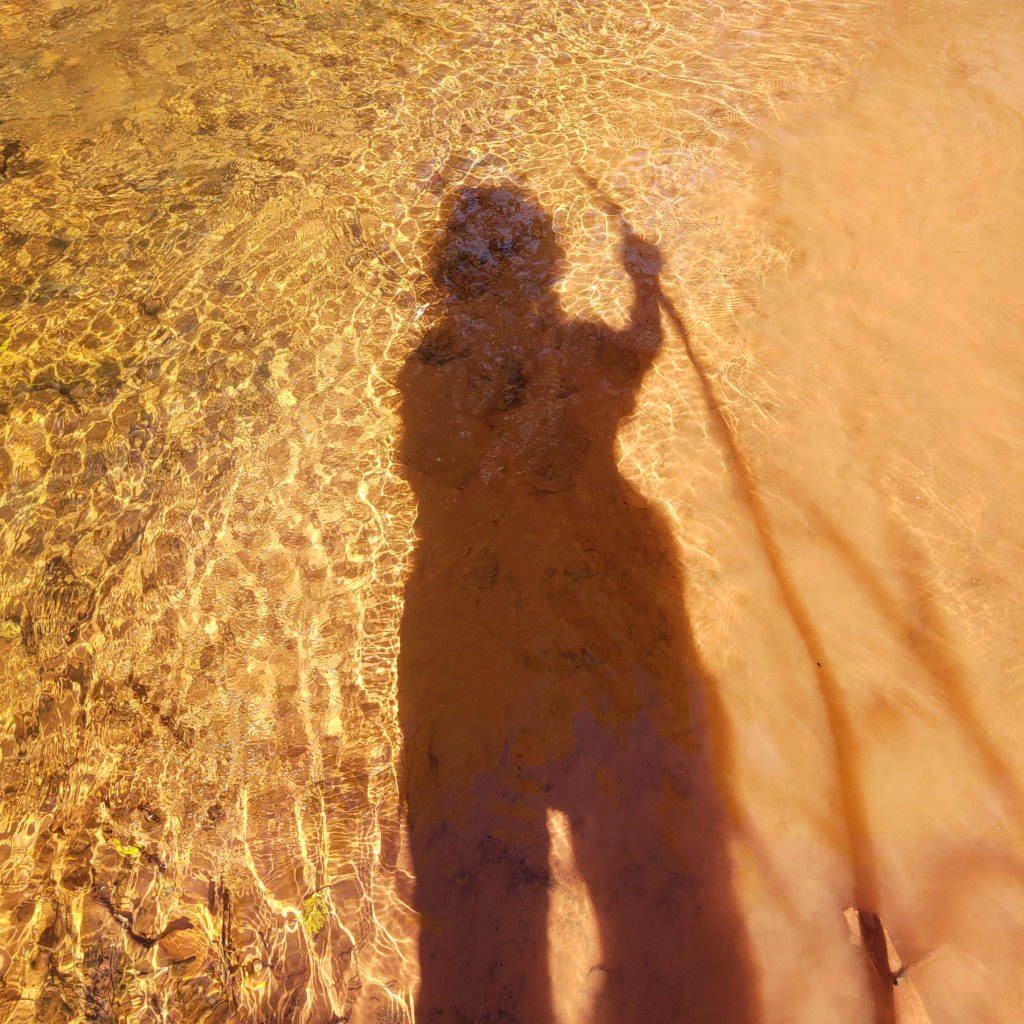
Debra N. Diener, Arlington, Virginia
Journal entry, November 21, 2021
This Sunday I’m busily building my “to take/don’t forget” list. I realize I’m feeling rusty doing so. I used to write out these lists on autopilot. But I haven’t done since 2019 — the last time we got together with family for Thanksgiving. But now that everyone’s vaccinated my family can be together.
In past years, I often felt stressed writing out these lists, fretting over what I might have forgotten or feeling rushed. So much to do to get ready and then facing that drive! Not today, not this year. Today I keep smiling and feeling happier with each item I’m adding. What a joy it is . . .
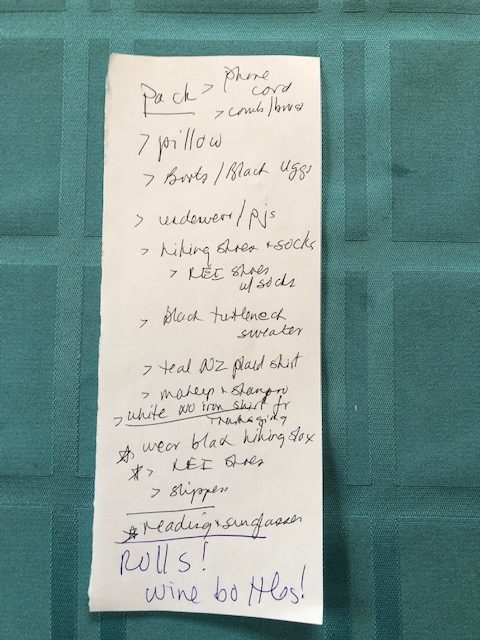
Beverly Boyd, San Luis Obispo County, California
Journal entry, November 6, 2021
For more than a year and a half I’ve grocery-shopped once a week at 6:30 am on Sundays when only a handful of people, other than the devoted employees, roam the aisles. I began this routine in May 2020 after encountering hostile, unmasked shoppers, aggressive in their efforts to come too near, daring me with hostile eyes to object, turning shopping into a nightmare.
A struggle at first, I eventually learned to enjoy the dark silence and empty roads, the morning mist, the lights already lit in the house of friends, the almost-empty parking lot. After friendly chats with the produce men, who arrive two hours earlier, I am ready to hunt and gather food for the week.
Leaving the store, I am welcomed by a glorious sunrise or the hint of one, depending on the season. Since my home faces west, I’ve become a connoisseur of sunsets. These shopping mornings, though, have allowed me to revel in morning skies, whether laced with clouds, dripping with fog, or radiating light from a peeping sun. Sometimes gulls hover on light posts. Other days crows circle, also looking for bits of food. I park far from the entrance to extend these moments of joy as I push my cart eastward across the lot.
Without the pandemic, these mornings would not have been a part of my life. And tomorrow is another Sunday.
Mark Tochen, Camas, Washington
Journal entry, November 4, 2021
I am the cook in our Pacific Northwest household, with a cooking partner 3000 miles away named Elsje, a Dutchwoman who lives with her spouse in upstate New York. We cook for our households, which for me began precipitously with the birth of a grandson, my wife saying, “You’re the cook now! I have to help with the baby.” I’ve become a decent cook and Elsje a creative cook whose dishes are visual and culinary poetry. We’ve kept each other afloat in these pandemic times. Her side job – attorney mediator/arbitrator and a four-term magistrate in her county; mine – 40 years as a pediatrician; our main occupation is as cooks and companions for our spouses.
We started with food photos – my previous food photography was the occasional family-around-the-Thanksgiving-Turkey picture, but Elsje LOVES food shots: “Here’s dinner: Norwegian salmon, steamed broccolini, and rice.” In self-defense I began to snap food shots with commentary. Thus began a dialogue of texting, photos and notes. We also traded information – “Wegman’s is the most amazing grocery store; we couldn’t live anywhere without a Wegman’s” or “Great oriental foods in the freezer section at Costco, soba noodles, vegan spring rolls, and potstickers.” We’ve learned from each other, and just completed a food journal, a two-volume set of kitchen wisdom, 60 pages with hundreds of photos, titled, as one might guess, “Cooking in Pandemic Times.”
Antoinette Kennedy, Hillsboro, Oregon
Journal entry, November 1, 2021
Michael,
I thought I had written my last letter to you in September. Sadness was wearing me down and anyway there were only a few notebook pages left. But here I am again. The University Hospital body donor letter came – asking for a photo for their video presentation. Remember when you said, “Maybe they can use this old carcass of mine”? I found the photo of you outside Amsterdam. You always did love all things Rembrandt. I sent them that one. Gold-orange leaves scurry outside my bedroom window. The sun juggles color, but the wind is cold. Did I tell you I wear your old cap? At night your plaid throw keeps me warm. Almost a year now. COVID at its height couldn’t touch you, but that other C sure did. At least, dearest brother, we did get to hunker down with PBS, and peanut butter and crackers. The other day I played your World’s Greatest Arias CD and listened to Nessun dorma and sat looking out at autumn, and cried, overwhelmed once more with missing you. I need to be done with mourning and would be if weren’t November again. Too much time. Never enough.
Miriam Karmel, Minneapolis, Minnesota
Journal entry, September 30, 2021
We got our boosters yesterday. No tears of joy this time around, not with some 70 million willfully unvaccinated, unmasked people running amok, inhaling hydrogen peroxide, taking horse de-wormer, fueling the delta variant, which is spreading like the wildfires out west. Later I bought B two masks from the woman who sold me one in May when I’d wondered if I really needed it . . . I suspect there will be no WAR OVER! headlines, no single moment when we collectively breathe in each other’s breath and celebrate.
Carol D. called. A friend’s son is getting married soon. Sixty people are flying in from all over, all supposedly vaccinated. Still, she fears attending. Her niece, a physician, tells her the virus is here to stay. In other words, deal with it. Carol plans to attend the outdoor wedding reception, but skip the indoor ceremony.
So this is how we live with a virus that’s here to stay. We pick and choose; we buy new masks.
There are bright spots, signs of hope. Two theaters in town are reopening. One is presenting a road show production of Frozen, which feels apt after nearly two years of being stuck in place.
Raphael Badagliacca, Mattituck, New York
Journal entry, October 15, 2021
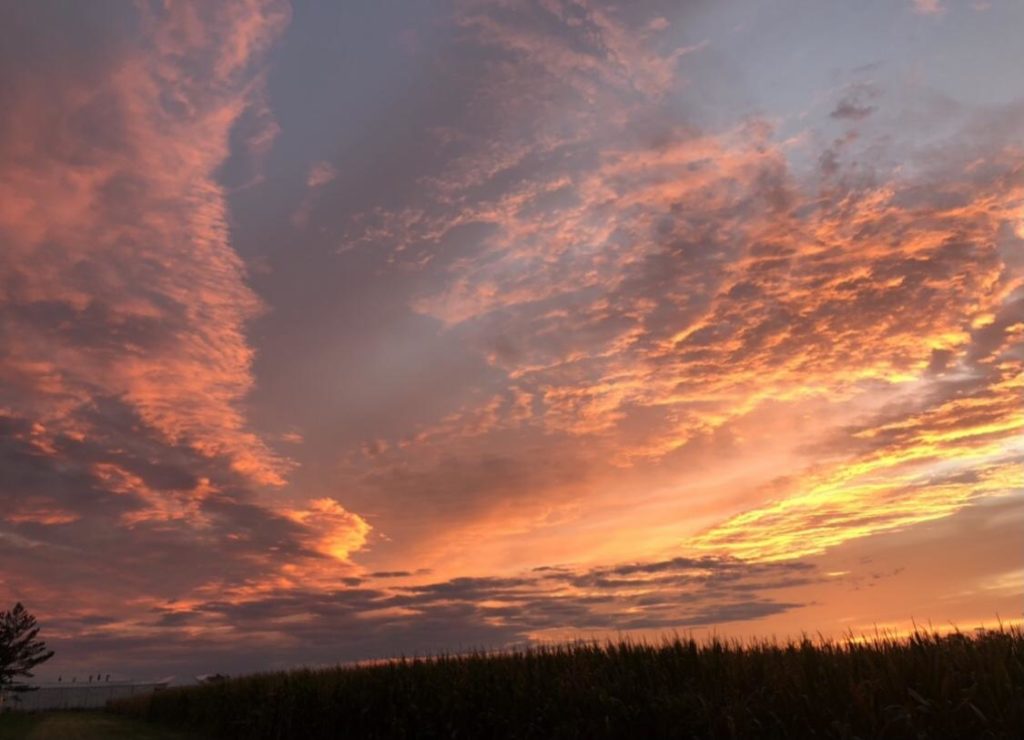
I’ve been taking walks before sunrise and at sunset. We’ve been living in the country since the pandemic. I could have walked like this in the city, but I was not moved to do so, as I am by the size of the sky above endless fields of corn and grapes on the vine.
The sky is not bigger here than there, but that’s the point. This strange time has caused much suffering, but it has also been a source of discovery.
Walking gives us time to discover the world around us. In that way, walking is like writing. It invites you into a rhythm that takes you surprising places.
Before these walks I knew that the sun rises and sets at different times in different places in the sky as the seasons change, but I did not know it in my senses and my heart as I now do. I knew “first light” precedes the sun’s appearance and that the sunset’s afterglow reflects off the clouds, but I did not know these things in all their beauty as I do now.
In the long history of the earth have there ever been two displays across the infinite canvas of the sky identical in all their colorations and particulars? And in the long history of the earth has there ever been a likeness with the uniqueness of you taking this exact step on this exact walk?
Try it.
Victoria Smith, Superior, Wisconsin
Journal entry, July 30, 2021, after taking a trip to my mother’s home in Petoskey, Michigan
I told a man in a white chef’s coat that I’d come for dessert. I made an effort to speak to him and not the stunning mural to my right. If the desserts were half as delectable as the mural, I’d be happy. At 2:30 in the afternoon, the dessert trays were mostly bare. But the man pointed to a brownie the size of Rhode Island and told me it was the best.
Even though indoor dining was open, I sat outside in their eating area and enjoyed the brownie. I went back in the café and told the man that it was the best. I asked if I could take a picture of the mural, and he said I could.
I aimed my phone at the mural, but stopped. A German shepherd lay on the black-and-white tiled floor. I moved my phone to look at him. But the dog wasn’t real — he was part of the painting, yet apart from the painting. He reminded me of myself during my trip in the pandemic — a part of the world, yet apart from the world.
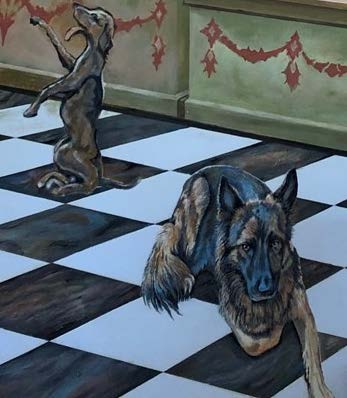
Judith Zelis, Chagrin Falls, Ohio
Journal entry, October 10, 2021
This morning is cloudy Autumn. All changing temperatures, sky, and landscape. I am unsettled. So, for a minute, I rest my heart in the promise of Winter Solstice. The light will linger, then, and if I squint my eyes just so, like a child pretending to be asleep, perhaps I’ll see past this persistent, pandemic darkness.
Until then, I’ll use my hands as they are meant, makers of comfort in the wild. Today, I’ll swaddle the side garden with fallen leaves, sprinkle morning glory seeds in bare patches of soil, wrap the lone rose against bitter winds. These may be acts of prevention. Or flickers of hope, soaring.
Isabel Soto, Madrid, Spain
Journal entry, October 7, 2021
I rode the Madrid metro today. The last time I rode the metro was February 2020. I was already wearing a face mask and carrying hand sanitizer. I remember I turned away, deliberately and ostentatiously, from a man in the next seat who was coughing loudly and unguardedly. Today I moved away when a young couple sat next to me. My nerves were stretched. Before I left the house, I rehearsed in my mind what I needed to ride the metro into town: house keys, cash, credit cards, metro card, two face masks, reading glasses, sunglasses. I was meeting colleagues at a sidewalk café in the university district, chosen because I could take a direct line from home. No changing stations, no waiting on platforms with other passengers. I got off a station early to reduce my time underground, breathing other people’s air. Yes, my nerves were stretched. I was hypervigilant of everything and everyone around me, gave passersby on the street a wide berth. Finally I made it. There they were: Eva, María, Dídac. I allowed (masked up) hugs. We spent two hours drinking tea and catching up. It felt good. The ride home was smoother if more crowded. I took it in my stride. I silently hailed once familiar train stops: Alonso Martínez, Bilbao . . . Prosperidad, Alfonso XIII . . . all the way to Esperanza. My stop. I emerged into the street. The sun was shining. It felt good. I rode the Madrid metro today.
Patricia Cannon, Novato, California
Journal entry, October 14, 2021
Pulling down my mask briefly while outside walking to smile at a neighbor from a distance and they responding is like giving and receiving a gift. It reminds me of something I read in a sociology textbook: smiling is the “universal language for kindness.” And I do feel happy to “speak” this language even if only momentarily!
I recall a time when I passed an acquaintance while I was walking downtown. His face was blank like the “flat affect” I would later see in some stroke patients. I wondered if he noticed me. But I smiled and although he seemed startled, he smiled back. His face lit up, if only briefly. Sadly, I learned later that he had taken his own life.
Perhaps for some people a small gesture of kindness may help them take a few steps back from some dark precipice and rethink their direction. What we may consider a “little thing” may relieve a person’s burden and briefly light up their life like luminaries that brighten the sky.
Patricia Cannon is an RN. During the pandemic, she was redeployed for six months to the CATCH team (Covid, Assessment, Testing, Coordination Hub) to help patients get much needed procedures and surgeries.
Elizabeth Devecchi, McKinney, Texas
Journal entry, October 13, 2021
Texas is our home now. We moved here recently for my husband’s job, but this wasn’t our first move. A friend of mine from two moves ago once asked if we were part of the Witness Protection Program . . . joking, of course, but I thought I caught a but really, you can tell me look in her eye before she chuckled.
I thought I mastered the art of moving. Moving in a somewhat ambiguous phase of this Covid-19 pandemic, however, is a new and unpleasant experience. The choreography is off. Meeting new people feels like asking someone to dance without knowing whether you should be on your toes pirouetting, strutting out a tango, or busting out some hip hop moves. I am vaccinated. Are they? I wear a mask. Will they? My kids have genetic lung disease. I can’t afford to bungle this dance. I can’t afford to worry about my precautions offending others.
Still, I am lonely. Isolation is not an option.
Sue Lick, South Beach, Oregon
Journal entry, October 10, 2021
We have been wearing masks in public for a long time now. I don’t go out much, just to doctors, groceries, and St. Anthony’s Church, where I play piano and lead the choir. I have a mask with music notes on it and a growing collection of “singing masks,” which are pooched out with plastic to make more room for air. But it’s still not enough air, and they muffle our voices. Choir directors usually count, mouth the words or give verbal instructions. I catch myself still doing it sometimes, then realize the choir can’t see it. I’m learning to wave or nod my head. Of course, there are fewer singers now. Some of our best are afraid to come to church.
The masks give me a headache. My glasses fog up. If I suck a throat lozenge under the mask, the minty vapors make my eyes water. By the middle of Mass, I’m pulling the mask down for a second to gulp air like a dying fish. I look around at worried-looking eyes. It’s getting hard to remember when we could see lips . . .
Leane Cornwell, Mill City, Oregon
Journal entry, October 2, 2021
Over the past eighteen months, on those rare occasions my family has donned masks and gathered, conversation always gets heated. Everyone spouting logical reasons. We of the aging years fall decidedly on the side of getting vaccinated. Several of the under fifty age group refuse to put anything “unproven” in their bodies. Some even speculate of government conspiracy.
For me, conspiracy theories do not fall into a logical category, but I’ve been willing to listen to their opinions. I just had one of those phone conversations with an adult granddaughter. The need to defend my reasons for getting two doses of an “un-proven” vaccine makes me tired. I know I’m what some in our family would call “over-the-hill” but I still believe in trust and basic human goodness.
The only question I see is, do I want to do my part to keep this virus from spreading? My answer will always be yes.
The gaps between generations continue to grow. This is another rupture.
Anthony J. Mohr, Sherman Oaks, California
Journal entry, October 3, 2021
Before March 2020, my calendar brimmed with words like lunch and meeting and reception. Then the cancelations flowed in, rendering my datebook a mass of strikeouts. Soon, other than the word Zoom, its pages became blank. The world collapsed into routines, habits stripped of thought. Masks on. Hands washed raw. Emails ending with, “stay safe,” which I did. Beyond my neighborhood, I never ventured. The past replaced the future as a place I wanted to go.
October 3, 2021. Three jabs later, and I feel safer, but not safe enough to go anywhere. The news features scenes of fights on jets. The CalTrans sign, which used to say, “12 minutes to downtown,” has ticked up to thirty, on its way to forty. More time to risk getting shot, which happened in Los Angeles, on the 60 to be exact.
It took guts to drive on a freeway again. My next project: brave an airport. It’s been seventeen months since I’ve left the ground. But in two weeks, I have to go to Boston.
Lisa Rigge, Pleasanton, California
Journal entry, September 27, 2021
We scattered their ashes on Lake Tahoe this weekend. There were 9 of us — Olga’s friends from all areas of her life. Kirk had to be disinterred and cremated before we could do so (he had died decades earlier). Olga had wanted them to be together in this manner.
One friend wanted photographs of the ashes as we tossed them into the lake and we threw flowers on them. I was queasy about this, as I’d never scattered ashes before nor took photographs of this ritual, but I figured I had the best eye and timing for doing so.
Who knew that two tones of ashes (Kirk’s ashes were darker than Olga’s) could make such intricate patterns on the water? The others said my photographs were “beautiful.” I use that word a lot in my diary, and I still haven’t gotten to the bottom of what it actually means.
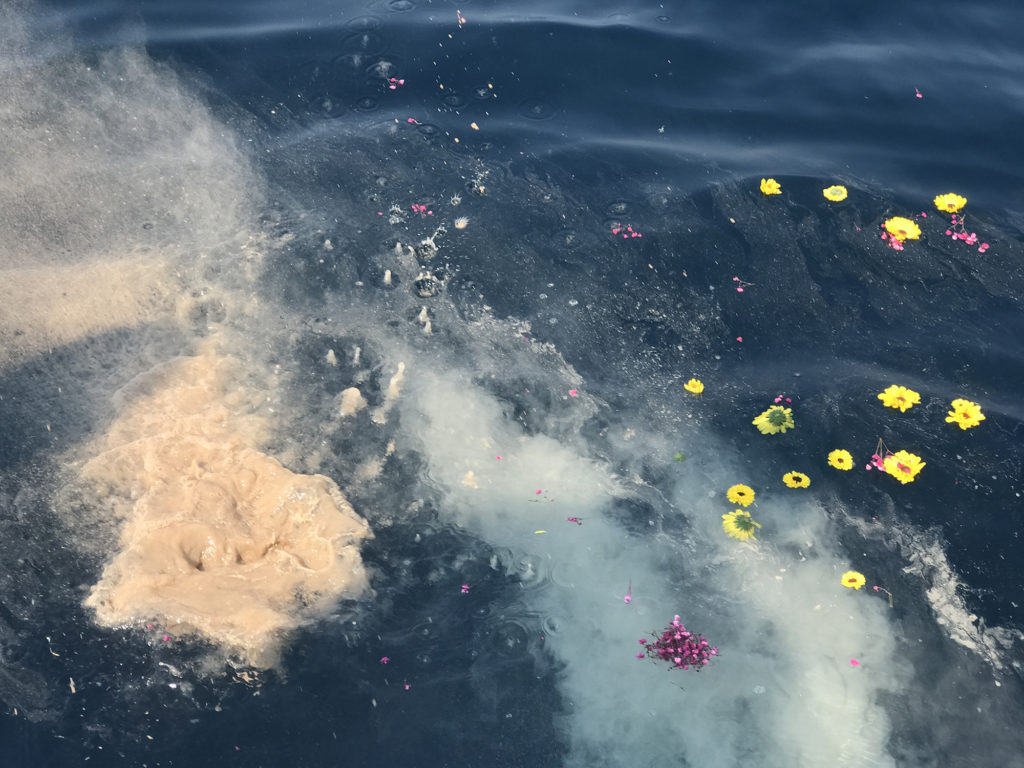
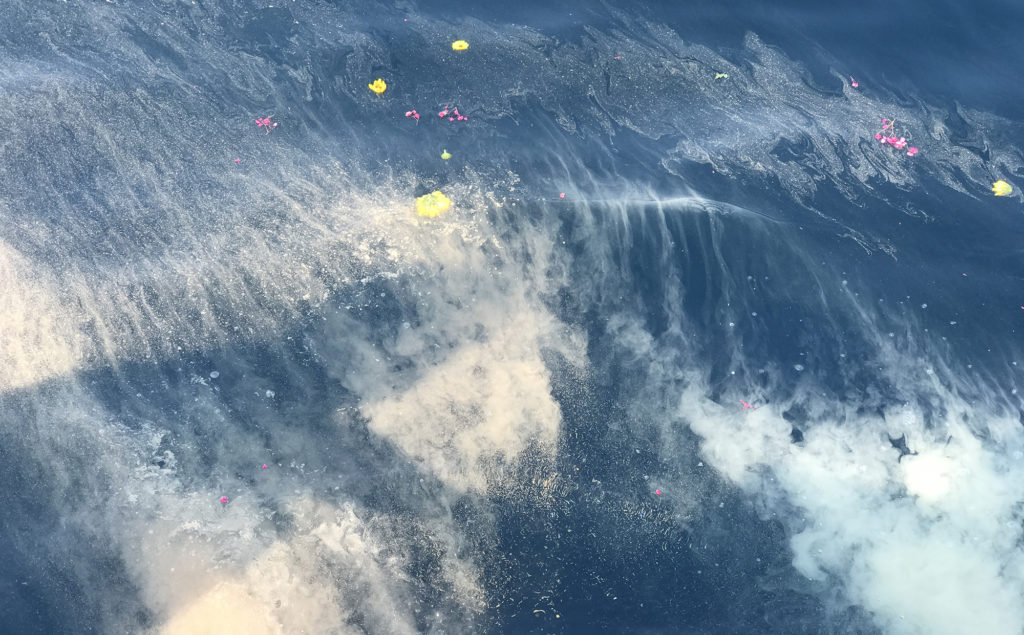
Fredricka Maister, Philadelphia, Pennsylvania
Journal entry, July 27, 2021
Today I went back to the gym for the first time in almost a year and a half. When our gym finally emerged from lockdown and reopened, I, a corona-phobe over the age of 65, opted to exercise at home via Zoom, barefoot and in my PJ’s.
Even after I was fully vaxxed and could have enjoyed some in-person socializing, I zoomed — just to feel 100% safe. Besides, who needed people when I could exercise solo?
So what dragged me back to the gym? My iPad conked out. Just like that, the black screen of death appeared. Even the “Genius Bar-tender” at the Apple Store couldn’t revive it.
Because of my sedentary pandemic existence — I only ventured outside to buy groceries, bank and walk to the occasional medical appointment — I gained 16 pounds!
Most of my fellow gym-goers, who had been MIA’s or Zoomers, returned post-vaccination months ago. So, emboldened, I double masked and prayed before nervously entering the gym. Touched that everyone remembered and said they missed me, especially our instructor Annie, I relaxed.
I forgot what it was like to chat with folks before and after class and feel our collective pain and hear our grunts in unison during endless reps of arm raises, squats and leg lifts. Exercising with others made it easier to embrace the workout’s intensity.
Dayana Moreno, Romeoville, Illinois
Journal entry, May 26, 2020
The pandemic has done something horrible, stripping all of the beauty in the world and sucking the joy out of everything I was ever in love with, including myself. That meant there were no more parties, no more masses, no more singing.
But I am singing. Where I once sang the beauty of a girl’s quinceañera, I now sing the most depressing moment in a person’s life: the loss of a loved one. The funerals increase, the festivities decrease, and COVID-19 claims more lives. I first started singing to witness the beauty of a new chapter. But now I sing and share in the sorrow of the loss of lives. Death never chased me before, funerals were for strangers most of the time; the people who passed away remained nameless to me.
But now, I see the sweet lady who made cakes for every church bake sale and called me mi’ja.
I see the old man who I helped up the ramp one summer when his family left him at church.
I see the lady who hugged me so close once when I was sad my own grandmother was in Mexico.
My life has been a collection of memories that revolve around the people around me. Now, I remember every mass as a name I say in my prayers every night, hoping they’re resting in peace.
William Harvey, Brooklyn, New York
Journal entry May 25, 2021
I am an artist, musician and writer. I got COVID in March 2020 while playing a rock concert in a packed Manhattan dive bar with a bunch of Brit post-punkers. I survived and spent the year in my studio intensely working on writing, new art and music.
Last night in the room at the top of the stairs I heard the soft singing of a womanly soprano. As I have done many times I stood the dark taking it in, swimming in the sound of a voice that fills space and time. Eyes closed, my heart filled with melancholic joy, I tried to embed the sound in memory so it might be called up when once again there is only silence.
The desperate silence of this pandemic interlude — when an adult woman returned to valiantly live in her childhood bedroom — has been chased away by the ever-joyful voice.
A new apartment is found and waits to be filled with the voice. It is a beginning and more profoundly an ending than drop-offs at camp, or college, or first apartments. Soon the room at the top of the stairs will once again be as it was — a silent repository. Returns will be fleeting.
Outside my studio this morning a city is straining and stuttering into its post-pandemic iteration. It’s not going to be like it was.
I’ll stand in the dark longing for the voice at the top of the stairs.
Jan Schmidt, Hudson Valley, New York
Journal entry January 2, 2021
Why didn’t I ever notice the chickadees flitting from branch to branch in winter, their wings invisible in the knobbed boughs of the weeping cherry. Why didn’t I imagine the flapping of wings or the chirping of baby birds long gone?
Why didn’t I notice the redbird’s flash of scarlet in the bare azalea bush, snow white in summer, or the twig-thatched nest in the quince when the bush was bursting in bloom, a pink dazzling profusion, and you heard the humming of a thousand honeybees?
Why didn’t I savor, breath caught in my chest, the way spotted fawns skittered across fields in twilight, flashes of white tails against deepening dark night?
Why didn’t I relish the upside-down reflections in the river of twined branches,
a webbed world like the roots of aspen, extending on thin ripples, curving like elephant skin?
Or peer with dizzying gasps at the clear night sky dotted with constellations?
Now awakenings come: a whirlwind of pleasure. At dusk puffed clouds thin to streaks of white, pastel pink and powder blue. And I yield to the shifting winds, to the bend in the river, to the bend in time bringing me to my last words before sleep — the whiteness of snow, cracked ice like broken glass or mirrors, glaring in late afternoon light, stemming the river’s flow.
Deborah Arnold, Elkton, Maryland
Journal entry May 2, 2021
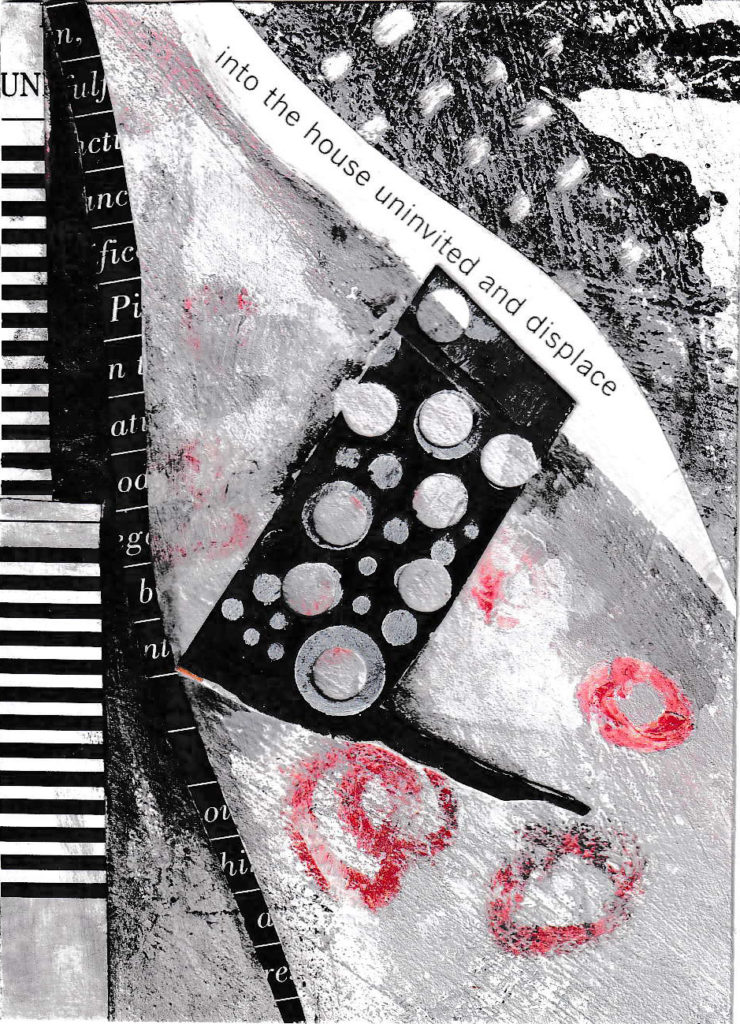
Poetry became impossible to write, with racial and social injustice relentlessly unfolding. Without words, I turned to visual poetry with a limited palette of black and white paint, and an occasional fragile line of red for outrage.
Lynn M. Knapp, Walla Walla, Washington
Journal entry April 7, 2020
COVID has found us in this quiet corner of Washington State. Our county announces the ninth confirmed case, and the CDC calls for masks in public.
My husband and I go to the basement to find my grandmother’s ninety-year-old Singer, the dream machine she bought new on contract, the machine she used to craft dresses for herself and her girls in the 1930s. We find it where we left it nearly forty years before. We dust it off, clean and oil it.
The old machine balks. I move the needle up and down by hand with a spin of the wheel. It works barely, miserably, chugging along, the tension too loose, bunching in spots, but I nearly have the first mask done, trimmed with fabric from a dress made on this same machine. I finish the second mask, and the old Singer finally begins to hum.
As I work, I think of my grandmother feeding fabric through this machine. She faced a pandemic, and worse. She lost her 24-year-old husband in November, 1918 to the Spanish flu in boot camp, one of many young men who never lived to see the trenches of World War I.
But my grandmother was afraid of nothing, not closing the eyes of a neighbor who died in her sleep, not her own failing heart. I can only hope my small portion of that courage will carry me through this, the pandemic of my life.
Judy Wachler, Pleasant Ridge, Michigan
Vaccinated in February 2021
Journal entry June 1, 2020
Here’s a whimsical thought I had on my walk this morning. Maybe my great-grandchildren will enjoy this vignette in years to come . . .
Walking through your neighborhood will help you escape the confinement of your living room walls, but doing so will require you to master a few simple dance steps. As another walker approaches you from the opposite direction you will learn to weave a circle together, you moving in a wide arc to the left while she glides with unspoken agreement to the right. As you approach the mid-point of your arc you will meet each other’s glance and nod briefly. At this point the dance master suggests a brief smile and a murmured “thanks,” before you finish tracing your half of the circle and return to the sidewalk. You may feel a random impulse to bow or perhaps curtsy once the circle is complete. All over the town, walkers are performing this circle dance gracefully, graciously, except for the one guy who yelled “fuck you!” to my husband who hadn’t realized he was blocking the man’s path.
Tina Marie Coley, Penllyn, Pennsylvania
Journal entry April 1, 2020
This Coronavirus thing is extremely exhausting. My alarm went off at 5:30 a.m. for grocery shopping. Seniors shop 6:00 a.m. Prepared last night to get out quickly. I armed myself with mask, gloves, wipes, paper towels with alcohol and I even used the wipes from the store. I wiped the entire cart and everything I put in it. I shopped for my sister and my daughter. There are limits on many items. I divided the order and explained why. Manager approval was needed. They said they would do it this time. Unloaded at my sister’s and then at my house. I washed my hands and wiped each item again. I cleaned the counter once the food was put away and washed my hands again. About 1:30 p.m., it hit me like a brick, I was so fatigued. I was on the bed watching television and my husband said I was snoring. I did not rest the evening before anticipating getting up early. I woke at 2:50 a.m. and heard 3:00 and then 4, and then it was 5:30 a.m. I am so sleepy.
Betty J. Cotter, Charlestown, Rhode Island
Journal entry August 8, 2020
Because I could not write at my favorite coffeehouse, my husband and I created a café in our meadow — a small table with two chairs — where I worked on two novels:
The field is looking woe-be-gone. The bee balm is going to seed. Even the wild asters are dead. The black-eyed Susans and their striped and pink cousins soldier on. Still, there is something so soothing about being in a field, even when most of the sounds I hear are roaring motorcycles and the low whine of automobiles. The trees are talking to the wind. It sounds like a small waterfall, like Stepstone Falls or Wyoming Dam. Why do wind and water sound so much alike? Movement — flow — two elements are in a dance: water over rock, wind moving leaves. The wind visits first one tree, then another, and another, in the way that water tumbles from rock to rock. In a couple of hours the cafe will be in the shade. Now I’m right in the sun. But I don’t want to stop writing.
Patricia Stierna, East Ivanhoe, Australia
Journal entry May 20, 2021
Next week I take the scary steps onto a plane to fly back home to the USA. I’ve been in Fortress Australia for 15 months. Covid here is controlled by borders closed, and everyone wearing masks so there are zero community contact cases. No Australian is allowed to leave the country.
Delta Airlines has been very patient with me. I’ve changed my ticket home seven times. The first ticket home was for May 2020. In February when most tourists rushed to fly home, I‘d just arrived. “Surely this will be over by May.” I told my friend and ignored the rush.
In April my daughter called from Texas saying, “I think you should stay there; it isn’t safe to travel.” My flight was cancelled anyway, so I extended my visa for a year. I changed my flight to September, but cancelled that, changed it again to Christmas. “No, it is still not safe.”
In January I tried to extend my visa again. Since I was staying longer than a year the Australian government wanted $1,000 and a police check. I gave them the money, they gave me a bridging visa, so I’m legal. I’ve been working on the police check. It is very frustrating.
I changed the ticket to February, and then to March, and finally the end of May.
I got one shot. I can’t wait till July to get the second AstraZeneca shot. I’m missing summer. I’ve got masks, I’ve got sanitizer. Fingers crossed I’m going home next week.
LynneAnne Forest, Santa Rosa, California
Journal entry May 16, 2021
I realize I’ve been discouraged. For months, to do anything has seemed dangerous and risky. A few days ago, it was on the news that today, May 16, would be the first day people could stop wearing masks in more and more situations. Our Director, of course, quickly sent out a memo saying senior living residences will be the last to reduce such precautions inside the buildings. The car trunk has been full of donations I’ve gathered over these last months. I’ve wanted so much to get them out of the car and to a thrift store. This morning I thought I’ll just go. I need to do things now that it’s less risky.
It felt good to dress in something other than my muumuu. I wore my mask to walk through the hallways, feeling the usual sense of confinement, but as soon as they took my temperature at the reception desk, I went outside and took off my mask. I felt fresh air on my face unhampered by something covering it. It felt so good. When I got to the thrift store a young man came to get the donations out of the car. I was amazed. We could actually see each other’s smiles. It was a treat and a relief to see someone’s facial expressions. I didn’t have to guess what a person was feeling by only being able to see their eyes. I want to have more of these experiences.
Megha Anne Wilson, New Delhi, India
Journal entry April 25, 2021
My city has been devastated by the pandemic. The lockdown was nothing as compared to the deaths that this city has witnessed, that I have witnessed. I will never be able to forget the night my neighbour passed away. It is on that night that I wrote this diary entry.
Death is something I still cannot write about. But it is not death that terrorizes me. It is the terror of it — in another’s eyes, the cries, the wail of the ambulance, the plea of friends — terrorizes me.
I am afraid. The fear is strong. Fear is strong! It is crippling and it changes us, withers our lives into becoming paper-like. Raspy. It freezes the ink of the pen and deliberately forgets the language of the written word or the spoken word for that matter.
There is a difference in being afraid and being fearful just like there is a difference in being alone and being lonely. One makes us stronger, the other weaker. That choice, today, is not a choice at all. It is an acceptance.
With all my exertions of being with fear, last year and this, I’ve understood that silence is never good.
What we need is to believe in something other than fear. I believed in writing. The belief was temporary but it gave me something to do each day. Just picking up the pen to write on the blank sheet, a few words settled me for a few seconds, pushed me to distract myself.
Fear will not go, it never does, but yes writing did diminish and salve the aching spirit temporarily and right now, it is the best I can do. The poems are of trees, birds, butterflies and blue skies. I watched them from windows, half closed doors, meshes and balconies. I wrote poems to tell myself again and again, that the world is still a wonderful place and I believe it is.
Debra Dean, Miami, Florida
Journal entry May 11, 2020 (one year ago this month)
It’s quarter to three, just as in the lyrics that Frank Sinatra sang so plaintively, and I’m wide awake. Probably the coffee ice cream I ate earlier. I turn on the light and read Adam Gopnik for a while. Nearly a month later I’m still making my occasional way through those pages. You’d think, given nothing but time, I’d have read more, but somehow the days fill up with less now.
We’re settled into what everyone persists in calling “the new normal.” The initial panic has subsided and been replaced by a steady low hum of anxiety. The bad news every day is more of the same predictable evil and incompetence from the administration, things that would have been unthinkable a mere few years ago. Trump visits a Honeywell plant that has been given over to making N95 masks, but he alone is not wearing a mask because he fears it will make him look silly. Instead of a mask, inexplicably he wears goggles. The James Bond song “Live and Let Die” blares over the factory floor.
That is out in the world. But we’re not out in the world. Here, the streets are nearly empty, except for the Amazon vans and garbage trucks, and though we hear rumors that people are drag racing up I-95, they are unconfirmed. We are each of us confined to quarters, inhabiting our discrete little worlds. And we’ve gotten used to these smaller spaces, the way prisoners adapt to the size of their cells.
Tom Petersen, Appleton, Wisconsin*
Journal entry April 20, 2021
Here’s an email I received from a student, maybe my favorite excuse of all time:
Hi. Sorry I can’t make it to class again. My mom has taken the modem due to my little brother’s insistence that he should be able to play video games as long as he wants, whenever he wants. Jared.
*Passager editors changed the teacher’s and student’s names.
Trisha Harney, Belmont, Massachusetts
Journal entry April 15, 2020
The nest was empty for nearly five months but now both of my college-age sons are back home. DJ reads all day. Dal struggles to follow his online lectures. I hope Dal’s next decade is happier than his last. He struggled mightily throughout high school. I try to distill the strands of his distress, wondering how I contributed to his difficulties and how I could help now. A few days ago, he melted down.
“I hate being stuck at home!! High school sucked, then I went to college where I could start over and make friends. Now it’s fucked because of the pandemic! I have no one to talk to you except you! I have all this work to do that I don’t understand! Zoom school isn’t a university! I’m the least stable person in this household yet I have the most work to do!”
That last line made me laugh.
“Well, you’re a lot more stable than you used to be.”
“That’s true,” he said. I couldn’t believe that calmed him down.
Sue Katz, Arlington, Massachusetts
Journal entry August 31, 2020
Since March 11, I have not gone inside any store. Because of my hypertension, I’m extremely cautious. I pay a shopper named Amy to get my groceries. She is a sweetheart and shops for about 25 customers each week. She calls us, “My shut-ins.”
Amy is efficient, flexible, reliable, and conscientious, but we don’t really see eye to eye on fruit. Last week I asked for a cantaloupe. The one she picked for me was the size of a basketball. The minute I saw it and struggled to lift the thing out of the bag, I texted her: “What?! I live alone. This cantaloupe could feed an affinity group for a week.” One friend suggested that I make a friend out of my melon ala Tom Hanks in Cast Away with his volleyball friend Wilson.
It is now 10 days later and I’m still consuming the cantaloupe. I wonder if it will outlast the pandemic.
http://www.suekatz.com
Maureen Woodcock, Cathedral City, California
Journal entry May 1, 2021
Tonight, another faux reunion on Zoom. Our clan’s still divided by the 49th Parallel, “The ‘Vid”, with its vicious variants — plus the vacillating international vaccine deliveries — has kept the Canadian and American cousins, the aunties and uncles, and grandparents apart.
We’ve been lucky. This pandemic has only bruised our family. Still, we miss our first-hand verbal brawling. Disguised, of course, as “good-natured family repartee.” The jokes and gentle jabs fall flat on screens and monitors. If we see a birthday cake, we can’t smell it, or taste it, or drop a dollop of ice cream on it.
But things are going to change. We’ve made a date for a real reunion, agreed to meet this August for a family picnic. Time and address? Noon on Zero Avenue, a rural stretch of the U.S-Canadian borderline between B.C. and Washington State.
The Canadians will sit on the northern ditch’s slope and the Americans will spread their blankets on the southern bank. As we dangle our feet in the shallow, narrow, furrow, we’ll be three meters apart. Some of us are going to bring planks so we can use garden rakes to slide food and drink back and forth on.
Mask-less, we’ll sing Irish shanties while drinking a lemon shandy. We’ll blow kisses, retell whopping tales, and recount family adventures. We’ll take photos and make video recordings.
And a hundred years from now, our descendants will have proof of their ancestors’ cheerful indomitability.
Marie Cahalane, Medford, Massachusetts
Journal entry May 8, 2021
Looking back on the past year, I marvel at how well I tolerated the stresses of sheltering-in-place. During the lockdown, I wrote a draft of a memoir, experimented with new recipes, organized drawers, and watched way too many home improvement shows. I discovered the joys of my backyard, spending most sunny days on my lounge chair with a book. By keeping busy, I missed life on the outside far less than I would have expected.
Now vaccinated and eager, the time has come to resume some measure of pre-pandemic life. It puzzles me just how scary the prospect of rejoining society is but I know I’m not alone. While I am ready to test out the ‘new normal,’ I hesitate to dine indoors at restaurants and shop in crowded stores. On my walks outdoors, I anticipate an oncoming walker and adjust my route. Getting prepared for any outing requires planning: a clean mask, a bottle of sanitizer, and a dose of courage. Normal never looked so abnormal.
I imagine, in the next few months, I will think more about the things that, a little over a year ago, I took for granted. I sense something magical in rediscovering the everyday activities I quickly abandoned in the interest of staying healthy. I welcome a bit of magic as I figure out my new, less isolated life.
Diane Sahms, Philadephia, Pennsylvania
Journal entry May 1, 2020
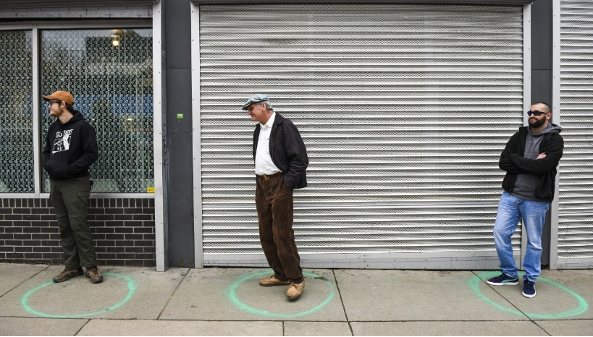
Bullseye’s definition: “shot that hits the mark” & these Kandinsky-like lime green “Concentric Circles” spray-painted inside square sidewalk panels for each human target to stand-inside their respective bullseye.
In this photograph, three ringed humans are barely six feet apart & are not wearing face masks. Storefronts behind them either pulled shut with garage doors of gunmetal grey or barred-window glass.
The youngest has hands in hoody’s front waist pocket, wears baseball cap & is standing with one foot towing the line, the other sneaker’s heel is joined. So, he is standing in “first position” though his toes are not completely turned outward. Glasses point forward. He sports a beard.
The oldest has his hands in dark brown corduroy pockets. Wears a button-down shirt and bomber’s jacket. Jeff cap over gray hair starting to creep down the back of his neck. No glasses. Cleanly shaven. Shoulders pitched forward & one might imagine him rocking back & forth, but in this captured moment, he is dead center with all his weight on his right leg. Wears orthopedic shoes.
The last in line is a man, mid 30s. Cleanly shaven head & full black beard that matches his “Matrix” sunglasses, though they are not the cultish iconic “Blinde” label. Relaxed blue jeans; designer sneakers & hoody with a jacket worn over it. Left leg supports most of his weight, as he tilts left, with arms crossed at mid-chest. Looks off into the unknown.
These three could be anyone’s neighbors, abstract as modern art.
Betty Levitov, Lincoln, Nebraska
Journal entry April 22, 2021
During pandemic stay-at-home, 13-year-old granddaughter Vivian has felt isolated, yet she continues to surprise and to stage.
She redecorated her bedroom according to holiday and season, designing her outfits to suit the occasions. A Chanukah shelf with menorah, candles, dreidels, and gold foil coins — her Chanukah gelt; a miniature Christmas tree gathering for her American Girl dolls, with tiny, wrapped gifts, and dolls attending in face masks.
She embarked on theatrical cake baking: an imaginary trip to Paris with a packed suitcase and celebratory Eiffel Tower cake, for one. For her dad’s birthday, she created a mermaid cake, Ariel’s Grotto, from The Little Mermaid. For the first day of Spring, a powdery blue Wedgewood china cake. A recent recipe for a coconut cream cake suggested by a friend, a former restaurateur, was so complicated that when she completed it, she flopped flat on her back on the kitchen floor, arms spread like a champion tennis player.
For my birthday, my daughter and son-in-law created montages of Vivian’s cakes, one, an imitation of a painting by Wayne Thiebaud.
Vivian inspires me to bake with images of my own. My recent efforts have been a blueberry clafoutis and a key lime pie. This has been fun and a very unusual grandma communication, without hugs and kisses. A limited kind of bliss and not even a taste.
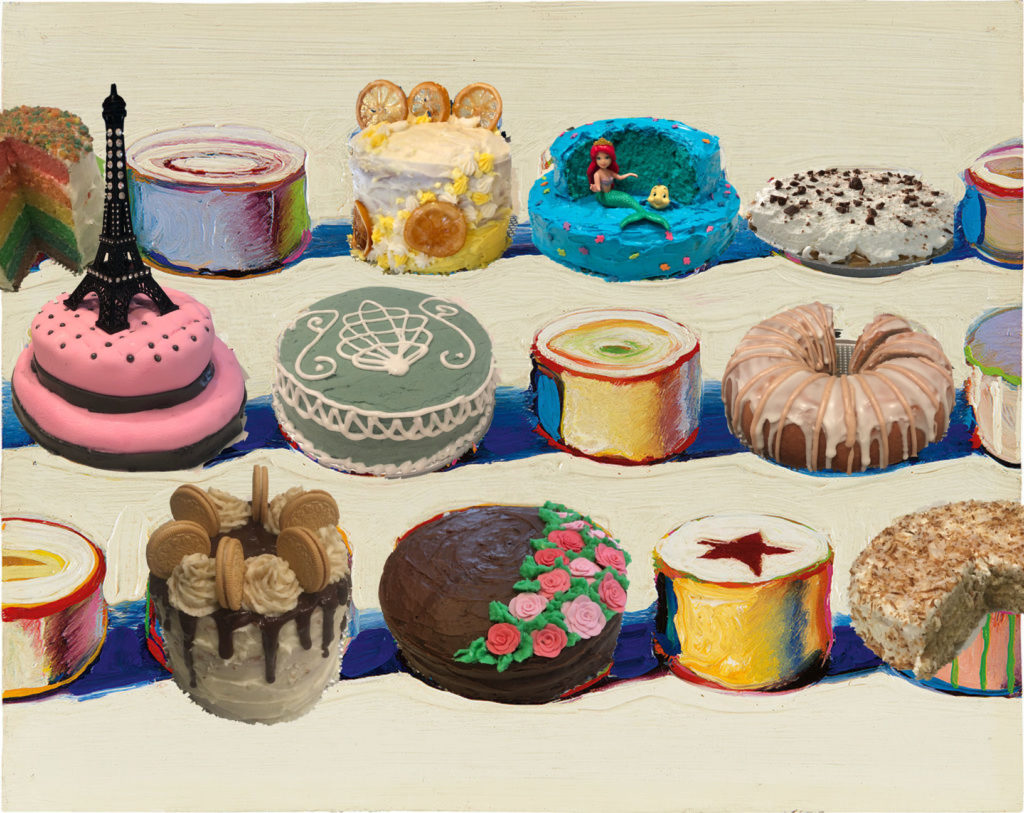
Mary Clements Fisher, Cupertino, California
Journal entry April 16, 2021
The postman didn’t see my tears. He disappeared before I opened the door. Deliveries constitute the unexpected in endless humdrum days. A new catalog, a birthday card, a wine delivery. A box with three red labels, Cremated Remains, arrived today. Phyllis’ ninety-nine years reduced to an 8.5 x 6.5 x 4.5-inch box of ground bones. I sunk into my wingback chair and stared at the box on my coffee table. She’d trusted me with her hopeful and hellish moments over the past fifty years and deserved a eulogy.
College beauty queen and part-time model, she never lost her flair for florescent pinks and frosty tangerines, for frilly blouses and form-fitting slacks. When shopping, she caressed the fabrics and cooed, “Feel this,” and “This would bring out the blue in your eyes, Mary.” Once, she played me a recording of her radio show tryout from the early 40’s. “I’m gonna love you, like no one loves you . . .” The producer’s improper proposition scared her, and she abandoned her smoky contralto dreams of singing with a big band. On the eve of WWII, she married Bill, a Clark Gable-type. Post-war, she inherited her father’s hatchery and settled into hatching and selling chickens and raising three children. She quit singing altogether and gave me her piano because Bill acted jealous and petulant about her love of music, like she was the unfaithful one. Her dashed dreams delivered my good fortune — I married her beloved son who serenades me every day.

April 17
I counted eight babies at Barrone’s Café this morning. Above her mask, one beaming woman gazed at the bundle in her arms, a newborn ignorant of disease and death. The mother’s milky scent, soft breast, and warm breath soothed and lulled the babe to sleep.
What fears did that mother face when she got the news “Pregnant Positive?” How many times did she cringe when someone coughed in the grocery line? How fast did her heart beat when contractions started and her water broke? I read this morning that with rising cases and deaths, births plunged in the same period. Isolation and uncertainty didn’t breed passion for parenting.

Golnaz Montagne, Marseille, France
Journal entry April 10, 2021
Today I walked under a tunnel of wisteria in the park in Marseille, and tried to smell them, putting my nose deep in. Something from faraway said, I am wisteria. There was a couple sitting on a bench close to the wisteria tunnel. I could tell courtship was new. I asked them if they could smell the wisteria from the bench. They needed to be French to smile at me for that question without wearing a mask. But I was not scared, I had been vaccinated and I had had COVID. I am a superwoman who survived this. I asked the good looking guy if he could stand up, go to the wisteria, smell it for me, and tell me how strong the scent was. He smiled at the young woman who encouraged him to do so. He knew he could score high with her if he did the right thing with the old woman, me. He smelled the flowers awkwardly and blushed. “It is a very delicate scent, but it is strong,” he said. I thanked them, laughed, and told them I had lost the sense of smell. We said goodbye and I turned away, weeping. I cry all the time, it is not a big deal, but this time it was so romantic! I guess I would have changed the loss of smell, if I could change one thing in 2020, but then, how would I justify bothering a burgeoning love story with my strange question?
Edward Supranowicz, Lancaster, Ohio
Art entry April 12, 2021
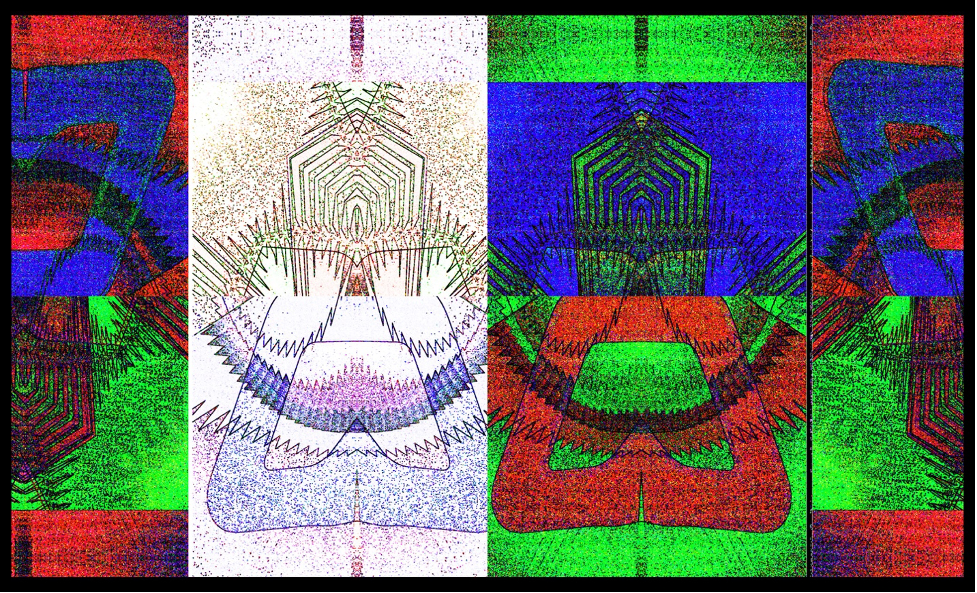
Robin Horst, Cincinnati, Ohio
Journal entry, April 10, 2021
Over the past year, many of us Boomers have become Zoomers. And for me, at least, Zoom magnifies the awkward, as well as the isolation!
I have a weekly Zoom meeting with my business partner whom I have known for 25 years. It’s the time to talk and also to meet with clients. Except for our mutual love and respect, however, we have nothing in common:
I’m a Democrat; she’s a Republican.
I’m a writer; she’s prone to language blunders.
I barely wear makeup; she’s dressed up with jewelry, accessories and full make up for our Zoom calls. I know she’s quietly judging me for looking so unbusinesslike, while I’m thinking “WTF” every time she mangles a phrase.
Before Zoom, I could nudge her or exchange a secret, knowing look with the other people at the meeting when she’d say . . .
“It really resignates with me.”
“That’s not chunk change.”
“We can’t stop on our laurels.”
“Neatless to say . . .”
And when the discussion feels unmoored, she says: “We can’t go at this free willy!”
Now that we’re tied to Zoom, though, that’s no longer an option. I have to work extra hard to keep a straight face.
Miriam Karmel, Minneapolis, Minnesota
Journal entry March 26, 2021
Fully vaccinated, I stepped out into the world yesterday. First stop, the hardware store, for a mousetrap. With some trepidation, I crossed the threshold after months of curbside delivery. What a relief to see everyone masked, except for Munster, the old shop dog, who nuzzled and sniffed with pleasure at my return. Next stop: the library, which reopened for minimal service last Tuesday. A masked librarian greeted me from behind plexiglass and laid out the rules. No settling down to read, though browsing the stacks was okay, and of course, checking out books. No problem, as I’d come to Grab and Go an online order. On to the bakery, where in my absence, the bread had migrated from a rack near the door to a shelf behind the counter. I paid by credit card, though I could have set my money in a basket with a hand-printed CASH sign nesting on a gingham napkin. This brought to mind the convent in Madrid where I never saw the nuns who sold garapiñadas. Instead, I would put my money on a lazy Susan, watch it revolve out of sight, then wait as a packet of candied almonds slowly circled into view. It felt something like that, circling back into the material world, after a year of virtual living. I returned to the car, under a blue sky, with the feeling we Minnesotans get in early spring, knowing that tomorrow it may snow, but yes, we’ve just about made it through winter.
Karen Peacock, Frederick, Maryland
Art entry April 13, 2021
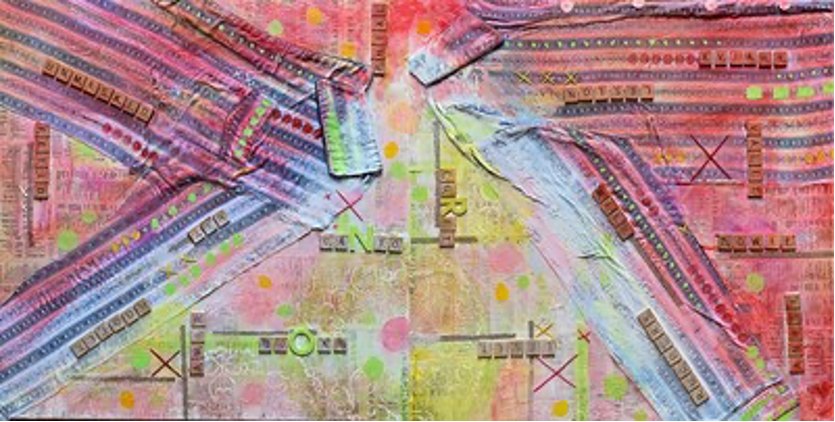
“Game Night: Unmasked and Antsy,” a mixed-media diptych on canvas, is made up of paint, vintage sleepwear, pages from a well-used Scrabble dictionary, and an assortment of discarded Scrabble tiles. This piece is part of 16 modular works featuring 16 pairs of vintage pajamas. It was fun coming up with random words with the tiles on hand. The words “unmasked” and “antsy” were certainly on my mind during a challenging winter.
Eswen Alison Hart, Portland, Oregon
Journal entry April 2, 2021
I had a sort of disastrous phone conversation with Thea last night. She asked why we weren’t vaccinated yet and I told her we’re not eligible: we’re too healthy, just a bit too young (born in 1965 makes us Gen X, not Baby Boomers), not living in congregate housing, not houseless, not dislocated by wildfires, not pregnant, not obese, don’t work in healthcare or education or food service, and so on and so on — there is a huge list of groups that are now eligible and we don’t fall into anything in “Phase 1.” getvaccinated.oregon has a screening questionnaire that I take every time they send me another automated message: ‘Vaccine eligibility has now expanded; check to see whether you now qualify!’ We continue to be Not Eligible; we won’t be eligible until “Phase 2” — i.e., “everyone else.”
Thea thought I sounded hostile. I told her I’m not angry, just frustrated and disappointed. At this point, so many people are eligible and getting vaccinated — and so many other people aren’t exactly eligible but have been able to get vaccinated anyway — that they should just open it wide up. Anyone can become infected and get sick; anyone can die, even if people in some groups (already eligible) have a higher a rate of complications. It’s the lack of fairness that troubles me.
I talked to Thea again on the phone this morning and she said she understands the anxiety of waiting, especially when it seems like everyone else is getting vaccinated. Being left behind is harder than when nobody was vaccinated. I resent confronting my spot in the hierarchy, too. Expendable, that’s what I seem to be. Remember, at the beginning, all the signs that said We’re in this Together? The war has ended for some people. For the rest of us, it’s still black-out curtains and ration books. If You’re over 70, It’s Party Time, a headline read. What time is it for the rest of us?
Lynn Bechtel, Amherst, Massachusetts
Journal entry March 22, 2021
Yesterday two friends and I drove for twenty-five minutes to Turners Falls to walk on the canal path. We rode in one car, something that has rarely happened in this past germy year. They’re fully vaccinated; I’m getting my second shot in two days. We wore masks and opened windows. We felt safe.
Before the trip, as I cleaned my car of the mess that had accumulated through months with no passengers, I thought about the last time we traveled together, early March 2020, a Sunday afternoon trip to buy apples before the orchard closed for the season. We were just beginning to realize the danger heading our way. We didn’t wear masks or open windows, but I remember how I mentally measured the distance between the seats and reassured myself that we were probably far enough apart to be safe, and I remember that moment when my friend leaned in close to show me something on her iPad and we breathed on each other and I wanted to pull away.
That trip marked the end of casual, close contact and the beginning of these long cautious months. But recently, with shots in arms, we’ve started to edge closer, walk on a path with shoulders almost touching, sit at a small picnic table to eat ice cream cones, talking and laughing and savoring each sweet bite.
Mary Ellen Talley, Seattle, Washington
Journal entry April 4, 2021
Bless me Martha Stewart (or Dear Abby or Heloise or Erma Bombeck or Oprah) but it has been one Covid lockdown year since my last company. I washed windows once and they are dirty again. I scrubbed the kitchen and bathroom floors finally w/all the elbow grease I could muster and I finally don’t see ground in soil in the grooves. I confess I used a smidgen of Dawn so the deck railing is now free of moss, although now that I’ve seen all the peeling, I realize the deck really needs to be painted. I didn’t go to virtual Good Friday services today and I can’t identify w/any crucifixion, but my hands are rough, I have heartburn from bending over after a tuna fish sandwich dinner, I’m kind of exhausted, plastic eggs are filled w/candy for big grandkids to hide for the littles to find, and I am looking forward to rising from my bed Sunday morning to roll away the seclusion stone that has been blocking the front door.
Golnaz Montagne, Marseille, France
Journal entry March 29, 2021
Yesterday, I got my first vaccine shot in Marseille. This morning, I woke up from a dream. I was with my sister, mom and grandma, seated and leaning against large cushions on a Persian rug. The rug covered a wooden bed, set up across a narrow mountain torrent in the north of Tehran. There was tea steaming on a samovar, and white fresh walnuts, along with slices of watermelon on a tray on the bed. Suddenly I felt I went to Isfahan, in the Chehel Sotoon palace. There was a long water basin in front of the palace, long like my Persian hair. Its numerous fountain water jets shuddered like my abundant curls. The water was soft and clean, I could wade in it when it was hot. It was refreshing. An alien animal showed up, a cross from the character and aspect of a female cat, dog and horse with the head of a magic taurus like the ones on top of Persepolis columns. She brought me unconditional love, freedom, suppleness, sweetness, closeness and melancholy. She said, “My dear daughter, your tears are like spring rain. They pour out. They protect you from keeping sorrow inside you and stopping your little heart. Enjoy them, let them run.” Since then, I am not afraid of weeping anymore.
Julia Park Tracey, Green Valley, California
Journal entry March 22, 2021
I got my first vaccination today. I showered and dressed in real clothes and drove up the ridgeline to the clinic, a white tent outside the doctors’ offices.
As I waited my turn, I remembered my little brother, a few months old, lying on his belly naked on the examining table, getting his first shot, screaming. I was 4. I remember the sugar cube with drops of polio vaccine in it, that we took gladly, greedy for the sugar, in 1968. When I was a baby, before memory, I received my smallpox shot in the chest, and all my life I’ve had this blurry circle with tiny teeth marks on my left breast. Most kids got the vax on their arms, but our doctor thought the rough scars were disfiguring, so for girls, he jabbed them in the chest. No one will see it there, he told my mother. I think about that and count the many biases and assumptions inherent in that decision. But ultimately, I am free from smallpox and polio, never got diphtheria, managed to evade the mumps and measles my brother and sister got. Chickenpox we all got together. Tetanus I have avoided.
It’s a tiny shot, a hair-thin needle coming back out of the arm as fast as it went in. I waited the requisite 15 minutes afterward, with no reaction. The coffee was still hot when I arrived home.

David Massey, Decatur, Georgia
Journal entry March 23, 2021
I am 81. I am so glad I lived this long because if I had not, I would never have known
what it is to be truly happy. I have five great kids and seven wonderful grandchildren, and my wife of 49 years has ensconced me in a chair of contentment. I have lived through many vicissitudes but here at terminus have emerged victorious over time. The catalyst for this change has been the COVID-19 pandemic.
I was emerging from the malaise of life in which I was a misfit even before the pandemic, but the pandemic hastened the transformation. It enveloped me in the bosom of family, where I was permitted to flourish without lets. I live in a big house with my wife and my youngest daughter and her husband and child and am visited often by two of my other daughters who live here in Atlanta. My daughter in New Jersey sends me her regards when she talks with my wife by cellphone, and my son (who lives in North Augusta, S.C.) is a writer himself and stays in touch.
For many Americans, the pandemic has produced anxiety and near psychosis. But it has nestled me in ultimate concord.
Tricia Knoll, Williston, Vermont
Journal entry March 23, 2021
This pandemic seemed to simplify many things: nowhere to go, no one to talk to live, no hanging out at a coffee shop. Complications in making sense of the onslaught of news — national, local, and personal. I just finished writing a poem titled, “The Shelf Life of Worthlessness.” Sounds bad, doesn’t it? Too many hours with only two dogs to talk to and too much snow on the Vermont landscape. Went to bed last night with the shooting in Boulder in my head and wrote a poem titled “Flimsy” to send to New Verse News for possible posting. Flimsy as in expectations of safety.
Nothing stands still. I just learned my daughter and her husband are going to have a baby in late September. A grandson I may be able to hold month after month without having to let go for a year. Tomorrow I get my second Pfizer shot. I had a bad headache after the first shot. Today the temperature is in the 60’s; snow is melting. Blue sky. The frog pond is almost ice-clear. I took some pruners to the wild roses bushes and hung up my ergonomic snow shovel. My first husband’s birthday is tomorrow, and now he is a woman I’ve adopted as a sister this and another grandmother. The Canada geese are coming back. I’m shocked that it doesn’t seem that long since they were going the other way.
Julene Tripp Weaver, Seattle, Washington
Journal entry February 13, 2021
I forgot my mask in the car last night. Only realizing the requirement as we entered civilization. In the icy preoccupation of weather, getting take-out before the snow grew too bad to drive. My heart strings pulled walking fast, jacket zippered, gloved and hatted, past the homeless tents covered in snow, the short distance from our car. My partner ordered at the window. We returned to wait for our food. How many will die these next two days? Emergency shelters opened for the storm, with not nearly enough beds. The number in the notice said fifty-six open, but the last night count was well over three thousand.
Whatever will we do to fix our world? Homelessness built into a business that must be supported. Housing now a bureaucracy with high paid executives who live in gated cities with lost perspective. Meanwhile yearly volunteers comb homeless camps deep in parks in the middle of the night to count, to keep track of our lost citizens who fell out of society. Some hang on, make it to a job, live in their car, engine running for heat till they run out of gas. Now so many tents in every neighborhood in every city I know. And every night on Instagram, ads for the movie Nomadland, words of praise for Frances McDormand.
Michael Salcman, Baltimore, Maryland
Journal entry March 14, 2021
It is now one year since my wife and I last hugged our grandchildren in California. Like me the suffering of many people caught up in the quarantine depends to a certain degree on their past. Even though I have written any number of Plague Poems since March 15, 2020 they aren’t special enough to make up for what I have lost. I was born in Pilsen Czechoslovakia, a child of the Holocaust and a survivor of the last great American epidemic, the polio outbreak of 1952. As a result, we have a vanishingly small family and I have a shrunken left leg that’s not aging well. For more than forty years, however, I performed brain surgery on that leg, danced the Lindy with my wife, went diving with an aqualung and sailing on the Chesapeake.
I was fortunate in some ways to have closed my medical practice on September 30, 2019 after fifty years, just a few months before the virus struck but had terrible timing in regard to my new poetry collection which came out in June of 2020. I have never had a chance to perform the poems from this book in a fully interactive way with a “live” audience. I sit down to the computer every day in order to create files from new handwritten first drafts, I revise poems, and carry out the ordinary “po-Biz” of noting rejections, making new submissions, and editing book manuscripts. I also take care of my correspondence with writer-friends, journals, and invitations to give readings. I spend no time on so-called social platforms. In other words, I am fully committed to the seclusion and ordinary life of most writers, an experience that is completely novel to me.
James McGrath, Santa Fe, New Mexico
Journal entry March 2, 2021
The most positive part of my safety net as a writer during this virus-time is to write with fellow poets via the telephone. At a scheduled time, I telephone my poet friend. We check-in, share poem we wrote the past quiet week. We may read a poem of a poet we like, Neruda, Nye, Harjo, etc. and will write from the inspiration that poet/poem gives us. OR we may wish to write from a writing we wish to continue to explore. We hang up, write for 20-25 minutes, telephone, share what we have written with little or no appraisal or commentary. We continue this process for a s long as we have scheduled it. With Morgan Farley, our time on Thursday is 2 hours. With Cynthia West, our time on Tuesday is 3 hours. With Catherine Ferguson, our time on Saturday is 6 hours. This is how we share our social writing time without a mask.
Stephen Kingsnorth, Wrexham, Wales
Journal entry March 15, 2021
The threat feels nearer, on the verge, the doorstep, down an icy slope; the signs of spring come anyway, bird feeder and the window box. Released from lock-up, custody, long prison term beyond remand, I’m unsure should the door unlock. This cell had been a comfort zone, sealed against infection’s float, and I have not had to engage, smile, respond with courtesy and tact, or justify, defend, attack. If tongue’s caused rudderless offence, to her, alone, apologies. I’ve not enjoyed the telephone or Zoom — dug ribs have shut my mouth. I’ll blabber on, a year of words, enquire the health of someone dead. Manoeuvre trolley, errant wheel, pick the wrong queue, fear credit card, when van has come with all pre-packed? I have become a hermit crab, with no one else to bear my grumps. Recluse, each day brings no demands. For holidays I watch the box, exotic scenes I’d never reach — the trains and ferries, airport hours, and costs beyond the licence fee. Though poetry has ruled my day and now I cannot think without the rhythms flowing through my mind. Iambic an invasion force, pentameters here, stalking close; maybe it’s compensation for the loss of daily diary checks? Blank verse to fill these long blank days, a substitute, more active ways. Pandemic tinnitus holds sway.
David Hiple, Paris
Journal entry March 22, 2021
Last week was the one-year anniversary of the imposition of the 2020 confinement, our initial lockdown. After two tough months, a gradual “liberation” began in May, cafés reopened in June, and when summer set in, Parisians went off as they do every year on les grands vacances, returning en masse for the traditional fall rentrée (re-entry). Paris came alive after the summer pause, but as the weather turned, la grisaille settled in; when the seasonal grayness descended on Paris, people migrated indoors, and with prolonged, close physical contact, the virus roared back — déjà vu all over again. A 6 pm curfew or couvre-feu (cover fire) was put in place, suspending the beloved ritual of the apéritif or apéro as everyone says with friends and neighbors at the local café before the dinner hour. People worked and went home, or worked at home and stayed at home. Dog ownership went up, since dog walking was one of the few permissible excuses to be out after curfew while we non-dog owners remained hunkered down inside. But the curfew wasn’t enough; it wasn’t working, so on Friday a new confinement was declared. After the long, hard winter, people are now getting vaccinated, and spring is in the air, but we’ve come full circle. We’re all inside waiting to be liberated again . . .
Gloria Kropf Nafziger, Collingwood, Ontario
Journal entry March 20, 2021
Yes, she says, your mother was four years old and she had diptheria. There was a big sign on the door that the health unit put there it said no entry. It said Quarantine. No one was allowed on the farm. Your grandpa, she said, had to sleep in the barn. We did not want to give the disease to the cows or the milk would not be good. He would not be able to sell the milk or the butter or the cheese. We took his food to him at the post between the house and the barn. He would get it there and eat. It was 1934.
Oh, yes, she said I do get lonely, stuck here in my apartment. I do have someone who comes in and brings me my lunch. No, no we did not eat in the dining room. It is too dangerous. I am so glad for Karen, she is my PSW she helps me with my bath, with my hair. It is so nice to be touched by someone.
My 99-year-old aunt has been sheltering in place since April 2020 when the first outbreak took place in the long-term care community she is a part of.
Maureen Woodcock, Cathedral City, California
Journal entry March 17, 2021
I’ve always had a curiosity about the 1918 pandemic. As a kid, I read articles, and thumbed through magazines and books looking at photographs of men and women wearing masks. The men were often in uniform and the women wore long skirts and straw hats. Sometimes posies were tucked into their hatband ribbons. Since I couldn’t tell if any of them were smiling or frowning, I wanted to know what they felt, what they suffered, who they lost in the misnamed “Spanish” flu. Did any of these people in the photos die from it?
I always suspected the world would one day experience another plague. I was right, of course. Then recently I found archival military documents about my grandmother, Theresa Davis, who was a Canadian nurse in France during The Great War. I read for the first time about her pandemic experiences. Now, over a hundred years later, I’m able to connect her 1918 to my 2021.
Grandmother was a hero. She contracted the flu in Europe while nursing the wounded and — she survived. Today, if she and I could sit down, have a cup of tea and talk, would she approve of how I have behaved during this Covid 19 crisis?
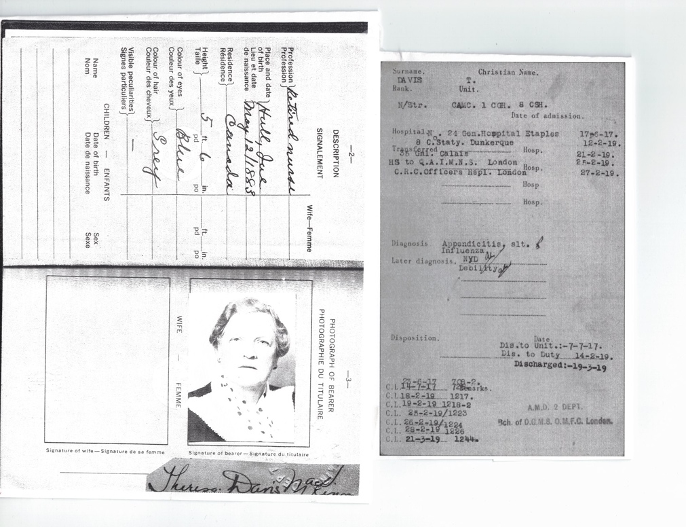
Patricia Garrison, Lewes, Delaware
Journal entry March 19, 2021
Waiting for the light to change, my daydream pulls me into the enveloping calm of my pink and purple yoga studio, and towards the weight, the damp, the chatter of other humans with me and around me in that tiny space. Sitting cross-legged, I anticipate the contortions that the teacher’s breathy whisper predicts will wrap us all in a blissful cocoon of peace and stillness. I move and breathe and gag ever so slightly from the too-sweet incense, and the sweat from the man with the hairy back giving off that soupy aroma that repulses me on the steaming subway platforms of summer, but connects me during the asanas, smelling of shared virtue. We are doing right by our aging bodies; we are stretching, and sweating, and pushing beyond our limits. We are really something, my hirsute friend and me.
In a recent article in The New York Times, psychologists opined that “we are subtly but inexorably losing our facility and agility in social situations — whether we are aware of it or not . . . longing for, but then not really enjoying contact with others.”
Due respect, but I’m not worried. My skills will be rusty, and I may bungle my way through the small talk, but my corporeal longings will override the awkwardness, sending me headlong into the jumbled joy of the ordinary, reveling in the sensory overload, the sounds, the nervous pauses, the noise and yes, the bodies, that find their way back into my sphere, clumsy and fragrant, together.
Ellen Reichman, Kirkland, Washington
Journal entry March 15, 2021
I’ve learned for the most part, we are all doing the best we can. Those that go over and beyond to help others are my heroes.
I’ve learned that friendships and relationships change. Due to distance, fear, time, attitudes. I’ve learned about letting go. Nothing is forever.
I’ve learned that Rabbi Hillel’s words mean more to me now than ever: “If I am only for myself, who will be for me? If I am not for others, what am I? And if not now, when?”
Cheryl Rubino, Greeley, Colorado
Pandemic Anniversary, March 11, 2021
My first memorable image of the recent papal visit to Iraq was of a dark-featured young man with anguished eyes, wearing a light blue face mask like my own, straining for a glimpse of the Holy Father; one of my last was of an aged Chaldean archbishop in embroidered robes, standing on stage at the stadium in the ancient city of Urbil, thanking the pontiff for coming during the pandemic.
The highly publicized trip, largely seen as an outreach to Islam, was the Pope’s first travel destination since the pandemic began, and the greatest security risk he’s ever undertaken, due to sectarian violence in the region. Putting two and two together, I came up with: “first and most dangerous destination,” plus “most ancient and threatened Christian civilization,” equals a lesson in how the convulsive human suffering wrought by the pandemic can break new ground for Peace.
Mary Alice Dixon, Charlotte, North Carolina
Sheltering in place since March 7, 2020
Journal entry March 10, 2021
Since isolation began, my torn retina took me to the eye doctor six times.
Worries about my vision woke me before dawn today. Checking my eyes for dangerous floaters, I saw, instead, the remembered face of a grandmother I interviewed thirty-five years ago when I was doing fieldwork in Yunnan Province, China.
The grandmother was a Naxi, a member of a proud, ancient matriarchy. I remember the story she told of her traditional Naxi cape — the Firmament Cape. Worn only on the backs of women, the cape was made of dark sheepskin embroidered with stars and moon.
“She carries the stars and the moon on her back,” is a saying, I learned, that describes both the cape and the women who wore it, women who rose by starlight to toil by moonlight — women who worked in fields so dark they could hardly see their hands. Their labor made life possible. Their capes were reminders that they carried both the burden and the glory of heaven’s work on their backs. These women believed that just as they could not see the stars and the moon they wore on their backs, so too, the night sky always carried light, even if hidden behind clouds.
Covid-19 has made everyone, women and men, “star-and-moon carriers.” Recalling the Naxi grandmother’s story, I realized I may have scars in my eyes but when I remember the Firmament Cape, my vision is 20/20. As the sun rose this morning, I knew it would be a heavenly day.
Art Cohen, Baltimore, Maryland
Journal entry March 10, 2021
Remember the times we took for granted over a year ago when it was routine
to see lips and teeth situated between nose and chin on the faces of everyone we met?
In these days of masking it seems only yesterday, or rather maybe long long ago
before this Virus which now remains a part of our daily existence.
A new awareness of eyes and foreheads has come instead, insisting that we look for unique signs there which will guide us to know who we now see.
And we need to listen better to any person we may encounter as they talk to us
muffled from behind their mask and help us to know who they and we are.
Mariah Burton Nelson, Arlington, Virginia
Journal entry March 15, 2021
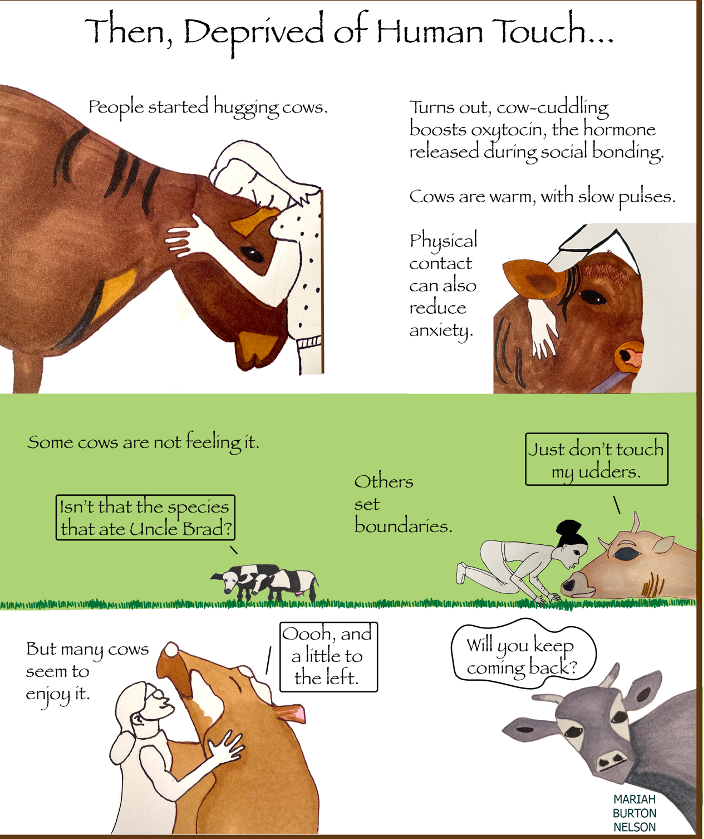
Infographic reads: Then, deprived of human touch . . . people started hugging cows. Turns out, cow-cuddling boosts oxytocin, the hormone released during social bonding. Cows are warm, with slow pulses. Physical contact can also reduce anxiety. Some cows are not feeling it. [A drawing of one cow to another says, “Isn’t that the species that ate Uncle Brad?”] Others set boundaries. [Drawing of a person kissing a cow, who says, “Just don’t touch my udders.”] But many cows seem to enjoy it. [Drawing of a person petting a cow, who says, “Oooh, and a little to the left.”] [Final drawing is of a thought bubble above a cow, which reads, “Will you keep coming back?”]
Cow-cuddling began in the Netherlands pre-pandemic, but has been spreading worldwide this year as hug-starved humans gravitate toward the warm, comforting bodies of cows. Farmers charge human visitors about $75 per person. Watching unmarried friends suffer from a year without hugs, I am fascinated by this phenomenon — and wonder how the cows feel about it.
Cynthia Somin, Los Angeles, California
Journal entry September 26, 2020
First visit with Mom. The director told me to wait at least two weeks, but after eleven days without her, I could not bear it. Bright yellow signs at entrance: MASK REQUIRED. KNOCK. Followed directions to Mom’s window and peered in, my first look inside since the virtual tour. There she sat. I felt my chin drop when I saw how changed she is. Her eyes have become sunken, and her mouth chatters rapidly. I stood paralyzed, trying to make the changes in her make sense. Were they mistreating her? She looked more neat and clean than I could ever keep her, and they hadn’t expected me. A caregiver came to the window. “Who’s Cynthia? She keeps calling for Cynthia.” My God. I said it was me. She told Mom that Cynthia was at the window. Mom glanced my way, smiled, but did not know me. Eleven days ago she was my mother, reciting the poem I wrote for her. Now the strain of unfamiliar surroundings has actually changed her face and mind. Not since she fled the Nazis has she lived away from her own home, but then she was young and with her family. Not now. Maybe she would rally if I could sit with her, play her favorite music, talk face to face. But I put my mother away from me during a pandemic, because I was desperate for sleep, because she would not stop calling my name.
Katherine Williams, Washington, DC
Sheltering in place since March 13, 2020
Journal entry March 6, 2021
It’s been almost a year since the masked nurse took my temperature on that downtown sidewalk before shepherding me in to be tested for sequelae of the symptoms that had quarantined me several weeks before. Looking back, I see that even though results were negative, Covid’s presence had taken up residence in my house.
My rooms were full of the absence of touch — no arms of my elusive family, no possibility of a between-session hug from a colleague, or light press of a stranger’s shoulder as the theater lights went down. Down the hall, behind another door of memory, I’d lie cupped in the hollow of my late husband’s body, milky babies soft on our damp sheets.
Yet somehow the days bleed into each other — time measured in empty bottles, dust on dressers. Trees drop their wasted leaves. Groceries arrive and arrive.
Weekdays I pull my aunt’s old straight-backed chair to the desk and visit my distant patients on a blue screen. Meeting their pets, or seeing them in their bedrooms or cars is unexpectedly intimate.
One evening, the word crepuscular floats through my mind when I creep to bed just as the light fades. No one needs to know my schedule.
For Valentine’s Day I make a card and send it to my friends:


Today, waiting for my second shot — four empty chairs on each side — I wonder if I’ll remember how to cope with a crowded calendar, cook for more than one, be with other humans.
Christine Baumis, Goose Creek, South Carolina
Journal entry March 8, 2021
I worked remotely in March to May of 2020 but returned to work as part of a skeleton crew in education since I am the student records clerk and compile state reporting for our school. My younger son is an ICU pediatric travel nurse working with Covid-19 patients across the country. In his words, mutations in children have been dreadful and this is “no joke.” We fear many health providers may have PTSD but they fight on daily and offer surrogate compassion to patients whose families need to work or cannot visit. My older son is a butterfly curator/educator who has noted the difference in our wildlife and ecosystems as the pandemic has lingered into 2021; the traffic silenced and the animals emerged into neighborhoods. Our family phone calls are much more meaningful and mature as the pandemic has shaped our lives to cherish today.

This heap of scrap aluminum caught my eye with the prominent “C.” To the right is a damaged ladder and to the left a stop sign with an arrow rising upward which is being swallowed up. I felt the stop sign signified the lives lost, the “C” stood for the Coronavirus, the ladder for broken dreams and livelihoods, and the heap is all of our time burdened by the pandemic as March 6, 2021 when the photo was taken.
Misha Herwin, Stoke-on-Trent, England
Journal entry March 4, 2021
Today is World Book Day all lessons were suspended, at least I think they were. I didn’t bother to check the school website. Without the deadening constraints of the National Curriculum, Maddy and I were free to do our own thing.
Dressing up was compulsory. Maddy was Minnie the Minx, red and black stripy top, short skirt, knee-length socks, and hair painted orange with special hair crayons. Who knew they even existed?
Maddy challenged me to choose a character from one of my books and I decided on Aunt Beulah a prim Victorian spinster, who does her best to keep her wayward niece under control. It was a scramble to get ready, but finally hair pulled back, gold rimmed glasses perched on my nose, high necked blouse choking my throat I was in role — with seconds to spare before our Skype call. And that’s when the books took over and the fun began. Maddy had to find a funny and a scary piece, a spell and a favourite poem. Once she’d found them, it was into the den in her cupboard and with the light turned low the reading began.
We were so engrossed in “George’s Marvellous Medicine” followed by the Beano that we didn’t want to stop.
There were no learning objectives, no plenaries, no fronted adverbials, or expanded noun clauses, just a child and her grandmother sharing a love for and a delight in books. It’s been the best day of home schooling since lockdown began.

Roberta Staat, Brookeville, Maryland
Sheltering in place since March 2020
Journal entry February 11, 2021
This morning I sat with my grandsons during virtual school while mom and dad went to dental appointments. Bence, fourth grade, had art class first off. Last week Mrs. Henderson had introduced gesture drawing, and this morning she showed how to sculpt using aluminum foil and assigned the class to create gestural sculptures. Bence got right to it. Working on his sculptures, he was immersed, intense – yet the figures are open, full of energy. Bence has taken Tae Kwan Doe since he was five, and I wonder if he was actually feeling those gestures in his body’s muscle memory as he worked.

Watching Bence, I thought about my own painting process during this sensory-deprived time. I’m making paintings of a pond across the road from the hospital where my husband spent too much time last year. The pond offers respite; being there is an out-of-time, whole-body sensory experience. I’ve taken photographs there in every season, all kinds of weather, different times of day. Painting from them now in my studio, I am immersed in the mood, how it feels to be there. I’m telling a story through a series of paintings, trying to embody the sensory experience. I’m calling it Being There.

Miriam Karmel, Minneapolis, Minnesota
Sheltering in place since March 17, 2020
Journal entry January 5, 2021
My 2021 desk calendar is stuck at a mail sorting center somewhere between there and here. For now, I write appointments on plain paper, though my Pandemic Diary reveals there’s not much to record. Each diary entry begins, On Today’s Calendar. Occasionally, I write: Zoom yoga, Zoom happy hour, curbside grocery pickup. Most days, though, I write Nothing or some variant: zip, nada, rien.
Yet even Nothing Days are filled with something. Yesterday, Sarah phoned. She’d been organizing her recipe files. “If I don’t do it now, I never will,” she said. Ditto her photo albums. I offered that I’m trying to finish knitting an afghan abandoned three years ago in favor of newer projects. If I don’t finish now, sheltering at home, in January, in Minnesota, I never will.
I share Sarah’s desire to attend to matters that we’d let slide in our “normal” lives, too busy running hither and thither. Busy doing what? Starting a new project when you grow bored with the one at hand?
I’m reminded of The Sound of a Wild Snail Eating, a memoir of a bedridden woman. The eponymous snail had hopped aboard a plant given to her by a friend. From her singular, narrow vantage point, the author drilled deeper into all matter of snails and her small world flourished. Hers is a lesson in the rewards of stillness.
And yet running hither and thither has its appeal. As I write, a train whistle sounds in the distance. It’s a haunting sound, triggering a yearning as the train passes through, leaving me behind. It calls to me. I want to call back. When this is over, I’m going to hop aboard to somewhere thither! For now, I’m learning the power of stillness, of focusing on the thing at hand: recipes, photos, forsaken knitting projects. Snails.
David Etheridge, Sofia, Bulgaria
Journal entry January 15, 2021
What’s going on in Bulgaria? Have a look:
The share of teachers in educational institutions who have expressed a desire to be vaccinated at this stage against COVID-19 is 21 per cent, said the Health Ministry press centre.
My wife says (1) It’s a big pharma scam; (2) government tries to control lives; (3) nobody knows about vaccine side effects; (4) her GP has offered me his vaccine . . . cynical folks over here.
And this is the Cambodia I left:
Cambodia is a safe tourist destination with the Kingdom ranked by the World Health Organization (WHO) as among the top nations in the world with the best COVID-19 containment and impact management . . . Cambodia was also praised by WHO for avoiding a large-scale outbreak.
**
Twice a week I’m prepping my son for his Cambridge Certificate of Proficiency in English (CPE) C2 advanced exam. We’re planning for a May exam. It’s more difficult than IELTS or TOEFL — heavier vocabulary and grammar focus. Also, part 2 of the speaking exam is absurd — 2 unwilling candidates must converse with each other in their broken English. When my son did this for his C1 test, his partner wept because she couldn’t continue.
**
So . . . here we are . . . a new year in a new place where people are dying of Covid at a rate of 50 a day. It’s cold, damp, gray. Bulgaria’s charm evaporated years ago when my wife said in her broken English, “Go ‘way . . . we never is a real family.”
**
Currently . . . I’m in space.
Lisa Rigge, Pleasanton, California
Journal entry January 28, 2021
Two nights ago I went to the Emergency Room for chest pains. A pain that pulsated from the center of my chest up through my throat and ending with a painful jaw. I was googling these symptoms when one site strongly stated, “Now is not the time to do research on what this might be. Call an ambulance right now.” My husband drove me to the ER instead. Now, two days later, I sit in my living room, watching rain pelt the pavement and windows. It’s the storm of the year, bringing snow to low elevations, rains to the parched earth. Rains have always been the harbinger of change for me. I thought this new administration would dissipate my 4-year angst from the horror of the last administration. Each day is still packed with surprises, but surprises I can easily live with. What breaks my heart and fuels my fear is the threat of Domestic Terrorists. Fear of our own citizens. It wasn’t my heart after all, but neither were any causes suggested. Nor was there a plan for follow-up or to mitigate any future pain. My friend, a nurse, suggests I follow up with my doctor about these pains. She told me, “Don’t use the word ‘anxiety’ when talking to your doctor about this. She will hang her coat on that one, and not go any further in determining what the cause of your pain might have been.” Perhaps she’s right.

I find I can only make small pieces of art these days. I tear up old collages which no longer have life for me and work them into original greeting cards to send to family and friends. There’s something about reworking art that corresponds to the changes occurring in my psyche. “Out of chaos comes order,” or something like that.
Ann Michael, Emmaus, Pennsylvania
Journal entry November 15
I’d planned to visit Mom on Tuesday, but my sister texted me Thursday evening with news of the impending lockdown and asked if I could change plans. I dithered a bit, but after checking Pennsylvania’s coronavirus numbers, I got the sense this may be another lengthy lockdown and mom’s campus may be closed even into — or past — Christmas. Thus, I cancelled my afternoon appointments for Friday, sent apologies to my students, and arranged to visit Mom . . . each time I see her, I feel connected — yet also aware of how her brain is coming unmoored from, what do we call it? Everyday life? Standard cognition? The chronology of time that helps us function in “the real world”? I ache for her. But she does not seem unhappy. She told me, “We’re pretty good here.” Recently I learned that the way she uses third person when referring to herself has a term: nosism. It is one of the tics of her dementia, just as she now always refers to my brother as Tom, and my dad as “that guy.” I wonder whether habituating to widowhood under lockdown has, in some way, been easier due to her cognitive losses. Hard to imagine. We walked outside in the interior garden area, very slowly. She loves to be in the sun even when the air’s cold . . . when will I hold her hand again?
Julie A. McCracken, Chicago, Illinois
Journal entry February 19, 2021
It has snowed for over fourteen days with below freezing temperatures. Nothing has melted and the debris of the city — the lost face masks, mittens, tiny hats, tiny socks — appear on wrought iron fence posts. Most are snow-buried, and I am glad about that. I find tiny black facemasks disturbing. I pass a couple speculating if the abandoned masks represent the COVID dead. I shudder and move with my Border Collie Arthur beside me. The careless ice melting grit has not grabbed his feet yet, so we keep moving. While he is tall and lean, he cannot see over the forty-inch drifts he regards with great suspicion. Suddenly he abandons all reason and leaps into forty inches of snow to relieve himself just beyond my arms’ reach. I always pick up after him, but the snow defeats me. My boots are too short. My arms unable to stretch across the yards of snow and ice. He comes back to me and shakes snow on the sweatpants and boots. He no longer walks with proud assurance. The grit has grabbed his feet and I tell him we are going home. We move quickly past an adult-sized blue facemask, a frozen water bottle, a discarded red stocking cap, and a Wall Street Journal stuffed into plastic, securely frozen into a drift. An apt summary of this COVID winter, I think.
Maureen Woodcock, Cathedral City, California
Sheltering in place since March with her 54-year-old daughter
Journal entry February 19, 2021
It took Tiffany four decades to tell me this secret. If it hadn’t been for us sheltering together for months, I might not have learned how much she loves me.
Last night she said, “Mom, remember when I was a kid and you’d send me to the grocery store to buy milk or something else you needed?”
“Of course. I was too lazy to load up Erika and her wheelchair into the car for a few small things.”
“Well, I was embarrassed to go because the clerk . . . Andy? You remember him, don’t you?”
Tiffany’s heart and soul have remained as unwrinkled as her skin. Her perpetual naivete, her childlike innocence, makes her unique and beloved. “How did Andy embarrass you?”
“Every time I went, he said he wouldn’t give me the groceries until I sang him a song. It was the same song every time, Mississippi Mud. You know, the routine my fifth grade class did for the school talent show? The solo where I sang and sank to my knees as the mud sucked me down?”
“What the devil! Why did you let him do that to you?”
“I had, too. How else would you have gotten your groceries?”
Fifty years plus, she’s still taking care of me.
Larry Hofmeister, Baltimore, Maryland
Journal entry February 16, 2021
I have New Orleans down in my soul, this is a Yardis Gras tribute to the unseasonably cold temperature in weather and spirit of this year’s Carnival. Long may she live, no matter what! “Throw me sumpin’ Mistah”
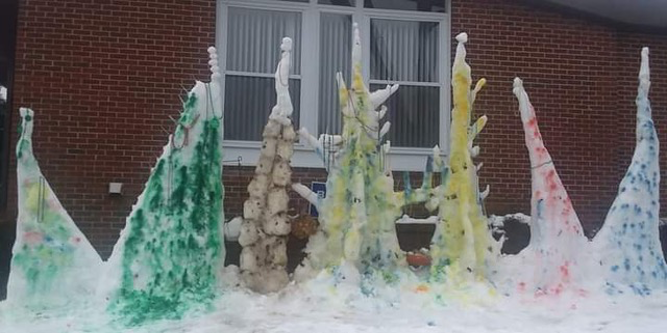
Wendy Watson, Laramie, Wyoming
Working from home as a teacher/counselor since March 13, 2020
Journal entry February 18, 2021
Staring out my home office window to the gypsum-plagued field across the street, I watch off-leash dogs yo-yo about their human companions and remember days as a kid when I took off past the housing development to the open prairie studded with sagebrush to explore pronghorn playgrounds with my Springer Spaniel. After six years in a windowless school counseling office staring into the sad eyes of children, I now sit beside a large window, soaking in the sunlight, noting the sparrows twittering in the dormant honeysuckle bush, the plump mourning doves perched in the towering cottonwood, the rotation of squirrel families visiting the feeder, and the acrobatic nuthatches clinging upside down to steal peanuts. The engines of various vehicles grumbling on the street mark the days and trigger a chorus of barking dogs: the mail lady, random FedEx and UPS deliveries, trash and recycling on Mondays, fresh groceries on Wednesdays, and frozen food on alternating Thursdays. A last lift of the tired garage door opener signals my “essential” husband returning from work. Between stolen moments of watching the world outside, I gaze into dark Zoom frames of kids’ lives, and I smile when they turn on their video cameras. Their hair is much longer than in last year’s school photo. Their faces more serious. We compare notes on whose family members are now vaccinated, who’s sick, who’s survived, who’s passed on, and who turned a year older, grounded for a year without friends or parties. And we laugh and sigh.
Sara Salvi, Portland, Oregon
Journal entry January 21, 2021
Our son has been gone for six months now. Today on a walk with a younger friend, we ended at the playground of her daughter’s grade school, the same school our children attended. Suddenly I saw the first grade teacher, a gifted soul who had taught our son. I had seen her from a distance at the end of the funeral. A Covid funeral, no more than 25 people in the church. She rushed over to give me a hug, no matter the rules. Thank you, I said. Thank you.
I got an email, she explained. Others heard by phone. One person told another I suppose. Still, I know people who didn’t get the message and were sad. It all came together quickly. We met in the parking lot during Mass, forming a still, human necklace at a distance from the church. We gathered quietly, some with white, summer flowers, others with handmade signs. What else could we do?
People kept arriving, flowers accumulating in large buckets. We heard the last strains of piano music, then silence. It was surreal. It was as if summer held its breath. You and your family emerged from the back of the church slowly, wiping tears as you saw us, your many friends. It was easily more than a hundred of us lining that lot. I can’t explain it but something sacred hovered there. Even the birds stopped singing.
Yes, I remember, I said. Even the birds.
Stephen Kingsnorth, Wrexham, Wales
Journal entry February 21, 2021
The anniversary approaches; much has changed. It is Sunday. We no longer take the hour roundtrip to the church building. Instead we Zoom five minutes before worship begins, without wearing Sunday best. We are a community whose strapline is ‘a place to be, belong, believe’, it’s tough when ‘the place’ is a screen! Devices are poorly positioned, directed, but I learn much of friends — their taste in art, hanging from ubiquitous magnolia walls — or as silhouettes against bright windows. We sing in our living room, accompanying recordings of variable quality transmission, though, muted, no one knows that we are out of tune. Seated by the laptop prevents the scaling of high notes. Sometimes folk forget to mute; prayers are overlaid with comments on the minister’s rare haircut event! We share the Lord’s Prayer in Makaton, led by a signer; our speed has increased markedly. I have a theological problem with the sign for glory — raised fluttering hands, while my understanding is that Christ’s glory is seen in the powerless self-sacrifice of crucifixion, not razmataz in heavenly splendour. Some forget they can be seen, wander off, boil the kettle, drink coffee during the sermon. This experience has taught us to redefine what are the essential characteristics of the church. We have not been able to embody our social outreach programmes in the city centre, have been confronted with financial commitments without a weekly collection, fear the consequences for our locked down young people . . .
D continues sewing for the Congo charity!
Denise Rue, Treasure Beach, Jamaica
Journal entry February 10, 2021
Sometimes I pass the time by reminiscing about the years I was held in human hands, comforted. When people I barely knew, the outer circle of acquaintances, mirrored me back, helped me remember I exist. I remember when I felt safe, when everyone I loved was near me. When even a trip to the dry cleaner could spark a brief, coruscating joy. They always seemed so happy to see me and if I was blue, I plucked a pineapple sucker from the faux-crystal bowl on the counter. I remember learning the attendant’s name at the gas station and when I was closing out my office and had a box of plants in the passenger seat, he commented on one and said it reminded him of his country — Trinidad. So, of course I gave it to him. Even back then I knew that things would fall through my hands. I remember making cookies for the mail carrier and all the little shops I frequented, and how that little gesture meant so much to one of the shop owners, she talked about it for years, until I moved away. I wonder if any of those stores are still there, have they survived? I remember that man in the produce department at Whole Foods with whom I chatted. Once he cut open a blood orange and handed me a juicy segment. Thoughts of these small kindnesses buckle my knees now. We were awash in all these rich, life-giving relationships, and took them for granted. Now, there is no one to smile at, share a pleasantry, nowhere to go but inward.
(I am a 61-year-old social worker living and working in Jamaica since 2019. At 60, I quit my job at a community mental health center, packed up my home in suburban NJ, and moved to a remote village in Jamaica to work as a therapist at a legal psilocybin retreat. I chose to remain in Jamaica at the advent of COVID and, unless there is a retreat going, I am fairly isolated. I have used this time to go inward, to work on my poems and a memoir, as well as go deeper into my spiritual life.)
Isabel Soto, Madrid, Spain
Journal entry February 12, 2021
Yesterday I yelled at a woman: “Mascarilla!” She was sitting at a table outside a small bar on Calle Arturo Soria in north eastern Madrid. Most bars and cafés spill out onto the sidewalks in Spain. It’s the culture, it’s the weather, even in northern parts where rain and harsh temperatures prevail. Face coverings — mascarillas — are mandatory in public spaces. Most people comply, this woman didn’t and I lost it.
As a cancer patient, I’ve been wearing a mascarilla since February 2020, not taking public transport, and essentially placing my life on hold. Last spring, Spain imposed one of the most draconian lockdowns in the world. People observed the rules, made sacrifices in the name of the common good. Politics and a tanking economy, especially the tourism sector, drove a short-sighted easing of lockdown. The refuseniks and pandemic fatigue have raised contagion rates to some of the highest in Europe. We’re now emerging from a third spike and bracing for a fourth. Spain has seventeen autonomous regions, each responsible for their own health policies. This fragmentation and uneven pandemic management has done the rest.
As a European Union member state, we’re at the mercy of the EU vaccine programme. Currently there are not enough vaccines for everyone. Tranches and cohorts have been prioritised. Despite my clinical profile, I’m not considered a priority and will have to wait my turn. Meanwhile, I mask up, maintain social distance, try not to go crazy and yell at persons who flout the rules.
Leila Gastil, Brooklyn, New York
Journal entry January 5, 2021
I caught COVID from my neighbors. Oh well. Masks and long walks. Then COVID.
After the fever, came a severe case of vertigo. The ER had prescribed medicine for nausea. Good stuff but didn’t even touch this dizziness. The spinning started every time I stood upright. I was losing weight and couldn’t eat.
I didn’t want to die, but I didn’t know how to stay alive. My insides were shuddering so hard that the shaking took over. My insides were shuddering hard and then the shaking took over. Then I cried.
I had a history of heart surgery and my heart had been hurting. Clare said, “Call your cardiologist.” I did. The answering service picked up. “She’ll call you right back.” She did. In simple short phrases, she asked me what was wrong. I calmed down and told her about the virus and the vertigo.
“Get some salty chicken broth. Start sipping it now and keep it up as long as you can. I’m going to give you some medicine for the vertigo. I don’t know why it works but it does. Take 2 a day.”
She gave me a simple plan and a bucket of hope. I was eating by the next day and my strength came back. The dizziness left — vertigo gone. Thing is — I would have never met my cardiologist if I hadn’t had that leaky valve and I never would have dreamed that would be a lucky coincidence. That day she saved my life for a second time. For these angels that show up just in time and these everyday miracles — “Thank you, thank you . . .”
Susan Felt, Maricopa Country, Arizona
Journal entry February 12, 2021

Antoinette Kennedy, Hillsboro, Oregon
Journal entry March 4, 2020
My dream: The underground room had a marvelous view, but an unmade bed and also dirty plates. I thought how lovely it was to be hidden underground and have such a lovely landscape to look upon: trees, flowers, the sky, and clouds. There were homes, too, a suburban life, people walking about, peaceful. Then I became angry with the mess inside. What lazy, entitled person left this stuff around?
Is the dream me? Then I am the unmade bed and the unwashed dishes, the lazy one, but I’m also the BIG space, the underground room, the large window, the view, the community. Note: take time today with this dream. What revelations is it making about who I am? What healing is happening while I sleep?
Erich Weiss, Frankfurt am Main, Germany
Journal entry February 8, 2021
In August, cinemas, concert halls, and theaters re-opened, with small audiences. When the rate of infections climbed quickly to unexpected levels, politicians reacted by closing things down again. Then I started hearing about colleagues who had gotten very mild cases of the virus. When the high infection rates did not go down, restrictions tightened even more. In downtown Frankfurt, we were required to wear masks, even outdoors. About half of the public complied. In shops medical-grade masks were required, which started a debate about whether poorer people could afford such masks. In response, the government supplied them for free to certain segments of the population.
My partner, Barbara, and I haven’t used public transportation since March of last year. To run errands or visit Barbara’s 93-year-old mother, we’ve rented a car. I’m hoping that, like last year when infection rates went down with the warmer weather, life will get a little easier in the spring.
Meanwhile, vaccinations have begun in Germany. The process is very slow. At the end of last year politicians led us to hope it would move along quickly. But there were too few vaccines until recently when they became more widely available. It would be a great relief to us if we and Barbara’s mother could be vaccinated and be safer. But that probably won’t happen until April or May. We’re hoping to stay well until then. And hoping the mutations of the virus don’t throw a wrench in these plans!
Elizabeth Toman, Albuquerque, New Mexico
Journal entry January 18, 2021
Cranes feed in the field outside my window. A roadrunner works our compost pile. The sky is a deep and cloudless blue, typical for January. When it warms up, I’ll walk to the river to look for eagles. First, I’ll drink from the pot of tea steaming on my desk and watch the flickering pine- scented candle next to it. This is the scene of perfect serenity I envisioned when I left my job fourteen months ago, so weary of the demands, the soul-deadening drudgery, that I struggled to get through even those final few weeks. My patients and staff, their kindness and well wishes, helped me through that time. I wondered then if I would ever practice medicine again. Officially, I had retired. I would have the time I always dreamed of for reading, writing, reflection.
Now I find myself working intermittently, filling in at clinics around the state, answering the demand wrought by the pandemic. Somehow, the work is no longer burdensome. My gripes from the past seem trivial. Everyone I work with seems stronger, better, and mindful of the shared mission to get through this perilous time. Even the patients, usually so alert to imperfections in the system, do not complain. I find gratitude and hope everywhere.
I pour more tea and answer the email sitting open on my computer. “Yes, I can cover next month.” My roadrunner friend bops his tail and circles the compost pile. Today I will enjoy retirement.
Paul Cassidy, Yonkers, New York
Journal entry November 3
I spent my fiftieth birthday in Quarantine because I was exposed to a student at school. I’ll never forget the timing: I was at school on Monday, Election day was Tuesday, and Wednesday was when things started to feel wrong. My chest got tighter every time I took a breath. My heart rate was going up, as was my temperature. It hurt to swallow. My moment had finally come, with a politically dramatic backdrop to give it climax: my plight would be measured with the fate of the nation. I locked myself up in the attic with a few bottles of Gatorade, several masks, water, Tylenol, Nyquil and some saltines.
My wife would have to deal with our sons, and the note on the door. She’d have to have nothing to do with me, but that wasn’t anything new. She and I rarely spoke, and a summer in quarantine just drove us further apart. I turned on the TV to keep me distracted, but a moment later I turned it off: CNN was busy tabulating every vote that came into every state too early to call, but I couldn’t be on the edge of my seat with the rest of the nation; I needed to sleep. It was 10 AM and I chugged some Nyquil. Happy birthday to me. Where would I be when I woke on the other side?
I awoke a few hours later — not because my fever broke but because that first week in November was still warm, and I was bundled up like I was in Antarctica. I opened one of the two small windows in our attic room and breathed. It tasted like Fall.
I heard my wife’s car pull into the driveway, I heard the boys get out of the car, I heard her yelling at them to STOP in their tracks. A moment later her ID lit up my phone, but I didn’t pick up. Then a moment later a buzz from voice mail. And in another moment, a text. Then another text. And another. I guess the note made her stop in her tracks, and I’d have to answer for it, and maybe for the last five years. What would you do if you came home to a sign that said, “I have COVID”?
Marianne Smith, Oakland, California
Sheltering in place since March 2020
Journal entry December 26
Everyone on our block tries to look out for one another.
I’ve been to a Zoom wedding and a funeral. My husband and I celebrate Hanukkah and Christmas a few miles away with two granddaughters and their parents.
This afternoon we heard B, our neighbor across the street, has gone missing since Xmas eve. Surrounded by a big, extended family, he’s been high, drunk or both for the decades we have lived here. Three cardiac arrests but he won’t quit drugs or booze, sitting in a plastic lawn chair, tall, rail-thin in jeans and a sweatshirt, chatting up whoever walks or drives by. Or fighting with his girlfriend, a brother or a cousin, in the front yard. We hear them yelling bitter F-curses at each other, as if needing a stage to release their rage. Upstairs, his father lies in pain.
Fire truck, then police show up in the early darkness. Girlfriend starts shrieking. I spot a guy standing on the front sidewalk.
“What’s going on?”
They found B in the back yard.
“I don’t know why I didn’t go look back there,” the man says. “I touched him — rigor mortis. Been dead for two days.”
“It’s so difficult to be a human being,” said writer Barry Lopez, who also died recently. “There are so many reasons to give up . . . retreat into cynicism or despair. I hate to see that . . . I want to do something that makes people feel safe and loved and capable.”
Lynn Kopelke, Enumclaw, Washington
Journal entry January 15, 2021
The current situation should not have a great deal of effect on me. I did not get around a whole lot prior to the pandemic yet I find myself experiencing a, near, bi-polar reaction to the circumstances. As a painter, I feel like I should be able to be productive and take advantage of the isolation. It allows even more time to focus on creating. And I do . . . half the time. However, after I finish a project, like now, I face a period of “pandemic paralysis.” Motivation and the positivity that comes with the creative process dissolve into a world filled with television, facebook, snacks and naps. To make matters worse, I seem to be, fairly, comfortable during these “valleys.” I suppose to some extent, comfortable and healthy is the endgame. Wish me luck as I try to move on to the next good thing.
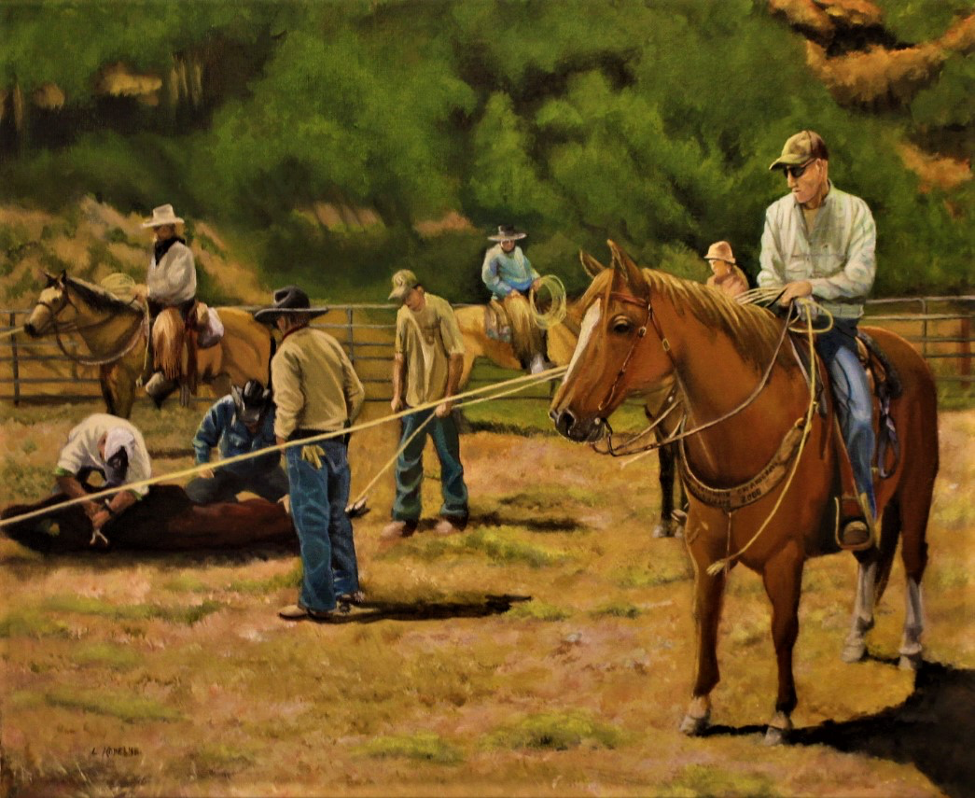
David Kopelke, Australia
Journal entry December 24
As foreigners, I and many of my friends cannot comprehend how a country’s leader and political party can be so disdainful of caring for the population. We fail to understand how a president cannot care that over 3000 of the country’s citizens are dying each day from a disease and not do anything. One state here had 80 cases recently and has implemented harsh measures to restrict the disease. My own state has not had any local cases for over 100 days (any cases have been people returning to Australia from overseas) and it has been April since we have had any restrictions.
People here take the disease seriously (although we have had a few rat bags who have taken up the call that it is all fake or a plot by Bill Gates); and other than hygiene standards being raised with hand wash everywhere and social distancing (which has meant fewer numbers in restaurants and bars) there has been no real impact. Unfortunately, our federal government has restricted overseas travel but given what is happening in the US, UK and Europe who really wants to travel anyhow.
Paul Kopelke, Hampden, Maryland
Journal entry January 7, 2021
My wife Cindy teaches 6-year-old ESOL students on Zoom.
Today’s “Paragraph Day” in the living room. I love the idea of “Paragraph Day”; controlling ideas; a group of sentences that form a coherent whole. And I love the sounds of Paragraph Day. The digital feedback. The endless, necessary technical instruction. I feel like George Sand under Chopin’s piano. Pure joy.
“Mute, Sophia, I can hear your family,” Cindy says.
It’s “Paragraph Day” because the city school curriculum says it is. A couple of the children can master two sentences in response to pictures and sample sentences that Cindy provides. Alejandro’s sentences are both too good and too neatly written, Cindy texts me. He didn’t have paper until yesterday and only after calling his father at work using the school systems Interpreter Phone service. The sentences clearly are not his.
There will be no paragraphs as it turns out. Today they need work on the “G” versus the “J” sounds.
“You’re not a jirl, Samora, are you?”
The students show their work by holding it up to their computer camera. From where I sit, quizzes are the most fun.
“Great answer, Steven! Now hide it!”
Months into the on-line school year the children (just here from Honduras, Serbia, Sudan) have to open a “video response platform”; after minimizing their Zoom link. Overhearing them do this step successfully brings tears to my eyes.
Ann Weber, Betterton, Maryland
Journal entry January 5, 2021
As I sit here looking out the window of my cottage at the beautiful white gold winter light, made brighter by slanting through the bare trees, I remember childhood winters in Betterton, this town on the Chesapeake Bay that I have come back to after 62 years – walking to school dragging my sled for recess, trudging out to see the ice breakers opening the channel, taking part in snow ball battles against the 7 children who lived across the street. I feel a sense of peace even though I know the world is in terrible shape and I am here in this small, nearly empty summer resort town to get away from COVID danger. I feel a sense of powerlessness when I think of all the human suffering, but after 84 years, I understand what I have control over and what I don’t. So that means I can, with semi clear conscience, take my dog for a walk and marvel at the expanse of the Bay as I stroll along the cliff overlooking the water. Maybe I will see a ship making its way from the Chesapeake and Delaware Canal to Baltimore on the inland water way. I might see the family of bald eagles that often populates a bare tree leaning out over the water. I will come in out of the cold, give my dog the biscuit she expects after her walk, sit down for a cup of tea and again look out the window at the winter light. I am in my own, lovely, bubble.
Lilly Roberts, North Vancouver, BC, Canada
Self-Isolation, Day 301
January 1, 2021
Today we Skyped with my mom for the first time. I don’t know how my sister can do this with her all the time, while she’s cooking dinner or whatever. I feel seasick from her iPad bobbing up and down, and I have a weird kink in my neck from trying to look away because she seems to only point it at her bosom. I want to throw up. Skype feels like a mother’s tool, like an invasion, I can’t get out of visits anymore. I am trying to enjoy it, because I know I will miss this, and none of us are safe, plus she is 81 so I can’t say no. I still feel like I have to dress up and fix my hair, the same prep ritual as for an in-person meeting, you even have to clean house in case she wants to see something in another room. Even at my age, I still feel awkward and now I don’t know how to end the call, she can see that I have no excuse. Even though I hate the phone, I prefer it now. It’s more private. I’m a terrible person.
My sister is a better daughter than me.

This is me, keeping my social distance. I have four legs, because I am stubborn in my attempts . . .
Gary Kubina, Semmes, Alabama
Journal entry January 12, 2021
I am an optimist. I try to live each day with hope and an expectation of good, but some anxiety creeps in. This pandemic is real. Why do some people still deny it or refuse to wear a mask? At the gas station, I counted 8 people. I was the only one wearing a mask. Two young ladies were making sandwiches for customers, but no masks. I wanted to yell at them all and explain the seriousness, but I quietly returned to my car. I’ve rehearsed the speech many times in my head, but in Alabama it is Trump country and for some strange reason that means don’t wear a mask. I also want to tell them, “Love thy neighbor, wear a mask. Protect your fellow Americans.” Last night the Alabama Crimson Tide won the national championship. I was happy until I saw thousands crowded in downtown Tuscaloosa shoulder to shoulder with few masks in sight.
I think about our 89-year-old uncle, our church members and close friends that have COVID-19. There seems to be so little that I can do, but I pray, I call, and I offer to leave food on their doorstep. Each week I read the Pandemic Diaries. It makes me feel connected. The variety of submissions reminds me of all the places we have traveled (25 states, Canada and Japan) mostly presenting math workshops and doing math demos for teachers and always vacationing a few extra days. Only memories now. My wife and I sit and reminisce. We now travel in our minds sharing special moments. Smiling, remembering the silly details and making travel plans for the distant, uncertain future. Trying not to dwell on what the virus can do; I keep reminding myself that this will not last forever. A vaccine is coming. In the meantime, I count my many blessings and wear my mask.
Amy Cotler, Mexico
Journal entry January 10, 2021
When this is over, I will finally fly, not just fly, but fly holding a giant bowl of popcorn in each hand, well-buttered and with just a hint of fresh garlic.
When this is over you will be over too. No more casually draped arm over my shoulder that makes my skin crawl, nor your left-handed smirk.
When this is over I’ll fly over my house, the house of my new life. In it there will be pink walls and a closet full of hat boxes with nothing in them but stuffed squirrels and love letters in tiny envelopes.
When this is over my voice will be silken, not silken tofu, but silken that’s silkier than cream of mushroom soup on a cold day. Not the canned stuff, but heavy with full fat cream and dotted with mushrooms that taste of the woods.
When this is over, my new house will welcome strangers who will sit round my table, the table my new love will craft from barn wood, and we’ll all toast my dog Sarah, who will howl in celebration.
When this is over I won’t be scared of heights, nor of misspellings, nor of nada, except for food so spicy I have to scrape it off my tongue.
When this is over, after I fly over my new house, I’ll land gracefully, feet first in a field of soft grain, and lay there on my back looking up at clouds the shape of chocolate chip cookies, the soft kind, and each chip will shout hello.
Janice Hamer, Rockville, Maryland
Journal entry January 12
Can it be the same guy? After fifty years, the “dorm father” from my college days has reappeared in my life as a new resident at Mom’s retirement community. Becoming reacquainted, I discovered something I didn’t know back then: he sings! Around 80, with a large dramatic tenor voice, rusty from lack of recent use, he wondered if I, a professional musician, might be willing to teach him. It seemed appealing, especially to provide Mom, once a fine singer, with a chance to participate.
But I hesitated – he has Alzheimer’s. Would the material be instantly forgotten? Would he get lost on the way to the lesson? I decided to take a chance, several years later we’re still making progress. The dementia hasn’t affected his physical memory; he retains the knowledge of raising the soft palate to project the sound, breathing from the diaphragm. He places his high notes perfectly, a basketball player effortlessly dunking the ball every time. He practices daily, feels fulfilled.
“There is nothing more healthy than singing, for our entire being,” a distinguished singer writes to me. But in these days of threatened health, we have to obey protocols, masking and distancing ourselves at our lessons, which must be held in a large, chilly hall. Not exactly conducive to fine singing, even at the best of times. Yet our masked Heldentenor with fogged-up glasses and some cognitive impairment still shakes the rafters: “All’alba vincerò! Vincerò! Vincerò!”
William Anthony, Damariscotta, Maine
Journal entry January 10, 2021
A few days until Joe Biden is inaugurated. Dare one hope again, in these days of pestilence? In our early 70’s, my wife and I opted to hunker down on the Maine coast, as if in Boccaccio’s Decameron. Our cottage is in a forest on the bank of the tidal Damariscotta River at the end of a long gravel road that ices easily in winter. We’ve been here since June and will not return to Chicago until we have the vaccine. We talk routinely with our daughters, who live there with their families. Our grandkids laugh when we FaceTime, but our older granddaughter seems aware these times are serious. I am mindful of their youth and our aging mortality.
I have seen two flags in Damariscotta this week. Five days ago, I emerged from a grocery store to watch a pickup truck drive past, a gigantic TRUMP flag rippling in its wake promising “No More Bullshit!” An hour earlier, the assault on our Capitol had commenced. One truck, one driver, I reassured myself. Yesterday, a quiet Sunday, I saw a man standing near the bridge into Damariscotta. With one hand he waved a large American flag and in the other he held a painted sign: “Save our Democracy! Impeach Trump Again!” it pleaded. Passing cars honked in approval.
As I write now, I see the morning sun emerge through the trees on the opposite riverbank, as though into a watercolor painting, orange, yellow, then golden. It seems a hopeful sign.
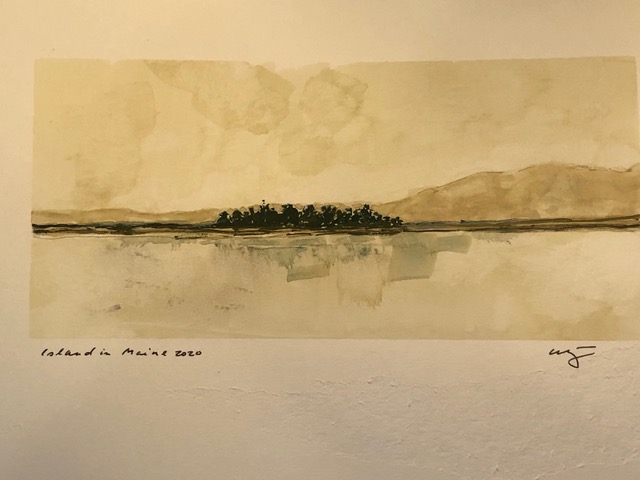
Paula Sergi, Fond du Lac, Wisconsin
Sheltering in place since March
Journal entry December 22
Some changes come subtly, as with a new awareness slowly sinking in (maybe I am in love . . . or we need to paint the kitchen). Some come with great shifts, like with the glaciers that formed Wisconsin. Now, the situation of the last year has brought our 35-year-old son home to live with us again. My husband and I have cleaned closets and generally shifted spaces to accommodate him.
This is the son who gave up nursing at 6 months because he was distracted, finding great interest in all that glittered beyond me, turning his head to study windows, shadow and light. At a garage sale when he was five, he passed up toy cars and trucks for two hand-carved figures of Don Quixote and Sancho Panchez. I should’ve known he’d wander far away. His travel lust took him from the middle of the middle of the country, first from one coast to the other, then abroad. He’s lived as a goat herder in Italy and a teacher in Shanghai, with stopovers in Minneapolis and Chicago, before settling in a small Guatemalan village for eight years to study Taoism.
Meanwhile, I’m waiting for more clues about this son, waiting for long heart-to-hearts during which he explains what took him so dramatically away. He’ll reveal such details as his first love, and what he did when he became lonely for us. By then, the pandemic will be just a memory.
Cathy Beres, Evanston, Illinois
Journal entry January 5, 2021
I know this feeling. This need to burrow deep into my blankets, to curl up, cover my
head, to hide from this day that does not dawn but seeps darkly instead. This feeling that if I stay here, in this bed, in this room, that I will be safe. That nothing will reach me, touch me, harm me.
It has been several years since this feeling ruled my life, since my husband’s death.
Now it has returned. For ten months, I’ve faced each pandemic day with some semblance of strength, hope, and sheer determination not to let it bring me down. Compared to so many, too many, I have no reason not to greet each day as best I can. I am blessed with a loving partner, friends and family, health and home. But today is different. Today brings a larger sense of unraveling than all the previous. England is in total lockdown. California cannot keep up. The vaccinations are stuck in limbo, not in the millions of arms that anxiously await. The new strain spreads rapidly.
I know from the past that this feeling will not last. I will rally. But it is winter
and I worry that I won’t.
Ashley Owens, Richmond, Kentucky
Journal entry January 1, 2021
To make digital paintings, I combine parts of photos with parts of illustrations to make images. I source material from the public domain. I then alter the images to ‘blend’ them into a coherent image with an ‘actor’ in a setting, hoping to spark a story in the viewer’s mind.

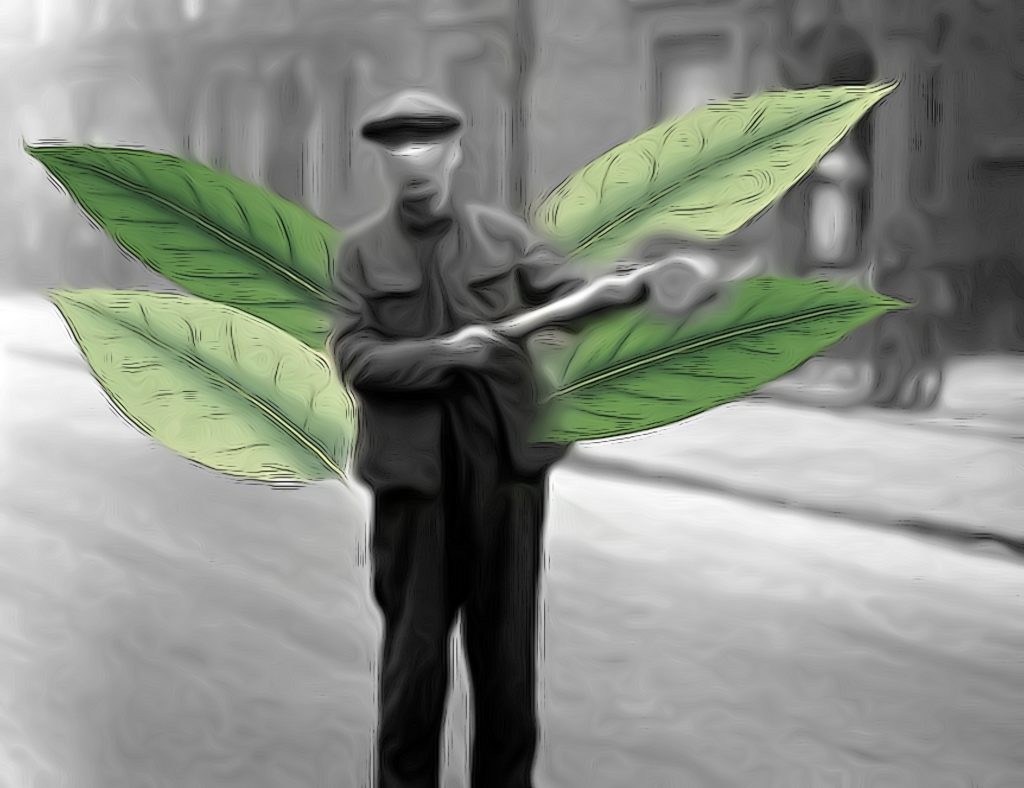
Marc Frazier, Oak Park, Illinois
Mostly at home since March 16
Journal entry December 29
I vent on Facebook. I got punished for one of my posts, banned by the Facebook censors for twenty-four hours. Feelings are running high. I felt like I’d been sent to my room at the age of sixty-something.
I’ve had groceries delivered for months now. These are my memories of shopping at the start of the pandemic: In and out is the goal. I tighten my mask over my nose. No pausing over whether to buy generic or the real brand. Grab at what strikes me first. No pausing in the pet supplies aisle where I want to linger because I’ve had my cat put down after eighteen years. I must focus. I’m on a mission even as I tear up at the thought of the needle in her leg’s vein that ended it all. My petting her with gloves on, how I wanted to really feel her soft, furry head as I said, “It’s okay, Maggie.” If only I could see someone smile at some small kindness. I would feel buoyed. Do I need mouthwash? Who would notice if I have bad breath? I want my life back.
I drive through Dunkin Donuts and get an oat milk iced latte before I cruise around town in my new red Volvo with the moon roof open, the radio loud. A new pandemic ritual. I’m a teenager again with no particular place to go.
Martha Graham-Waldon, Santa Cruz Mountains of California
Journal entry December 30
Last night my floodgates broke through, releasing a torrent of tears. This was a relief because part of the time I think I have become callous, so used to bad news that it no longer moves me. Things seem to get worse and worse each day, especially in my home state of California although we are blessedly sequestered from city life by a veil of tree-covered mountains.
But something was triggered in me by a news alert about the 41-year-old congressman elect dying of Covid before he could be sworn in. Then I watched an ABC special reflecting on 2020 with a eulogy at the end for all those who have died. So, so many people! Mothers, fathers, children . . . Suddenly my heart was breaking apart in sobs and my tears flowed down with healing droplets that afterward brought me peace.
And this is what I am thinking now:
We will never take for granted the sacred social gatherings we used to revel in for the holidays and during the summer.
We will never take for granted the simple pleasure of sitting in a restaurant, enjoying a meal that we do not have to cook.
We will never take for granted hugging a friend in greeting or while saying good-bye.
We will never take for granted going to the movies or to a live show.
We will never take for granted being alive without the constant threat of death stalking us in the air.
Bill Durden, Baltimore, Maryland
Journal entry December 28
The pandemic enhanced my daily walks with an intentionality of seeing that escaped me previously. Rather than just walk quickly and ignore much that was about, I began to look at what was before my eyes and register objects as fully present. I captured mentally stop-motion snapshots and carried them about with me, viewing them as if an object in a museum, but then I used my iPhone to take photos, for example, of the sidewalk from directly above. And there was delightful discovery. I remember an exhibition at the Met Breuer in New York City that focused on unfinished, imperfect art as objects of aesthetic accomplishment. My photos were of imperfections, to be sure — that which I merely trod upon pre-pandemic — and yet now, when seen intently, they possessed a coherence and rough beauty. While we often judge artistic abstraction as removed from reality, what I saw beneath my feet was reality as abstraction. I concur with the artist, Mark Bradford, who when speaking of the inspiration for his work in the recent Baltimore Museum of Art exhibition, “Generations: A History of Black Abstract Art, said that he absorbed scattered remnants of a Los Angeles neighborhood — unraveling, discarded posters and billboards — and the streets that bear them, considering them, in fact, “abstraction . . . an invitation for interrogating . . . dismantling . . . moving things around a bit.”
Below is an example of one of my Baltimore sidewalk photos mid-pandemic. Post-pandemic I look forward to a world far larger and more aesthetic than pre-pandemic — all because of wandering about seeing more intently and “moving things around a bit.”
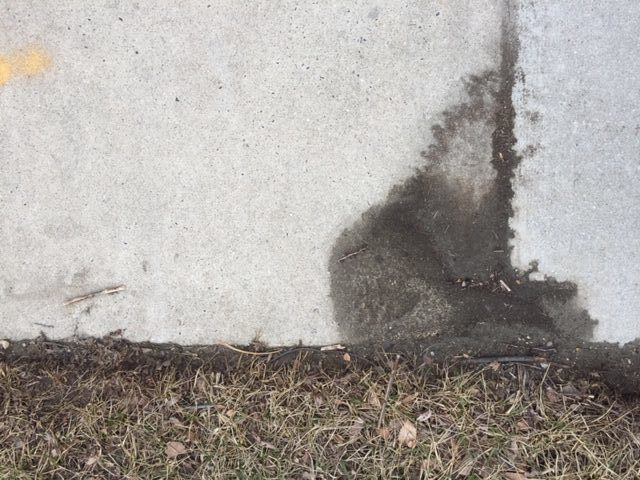
David Etheridge, Sofia, Bulgaria
Journal entry November 15
Left Phnom Penh on the 15th, and arrived in Sofia on the 16th — almost 24 hours of travel and time changes. Traveled Business class for Covid safety reasons. I’d lots of space as Business was not fully booked. The Phnom Penh to Seoul and the Frankfurt to Sofia Economy classes were full. The Seoul to Frankfurt Airbus A359 with 350+ seats had just 23 passengers in total — like renting the plane for myself. How does Asiana Airlines operate on that number?
Between Phnom Penh and Seoul, I’d filled out paperwork. Even though I was only transiting, medical staff and police checked my docs when I landed. The Koreans were careful although I didn’t need a pre-flight PCR test. I transited into Germany on my UK passport and there was no health check, just a passport and hand luggage scan — 7 people working the scanners and me the one passenger in a dystopian grey airport.
My son had said there would be paperwork flying into Sofia and told me to say I was arriving from Frankfurt, not Cambodia. As we were descending, I asked the flight attendant if there were any health forms to complete . . . nope. So, I walked into Bulgaria. No testing, no tracing, no temp check, no isolating, no quarantine.
It’s astonishing how cultures respond: SE and East Asia are strict; Europe is slack — no temp checks at supermarkets or banks, sanitizers in some shops. Bulgarians are good with masks in the mall but rip them off once outside. Few wear them over their nose. One man says, “We’re not like the Chinese or Taiwanese.” I don’t know what that means here. Too much like disrespect. “Bulgarians don’t believe in masks,” says the pharmacist. I’ve developed SE Asian habits and hopefully they’ll keep me healthy because I don’t feel safe here.
And I need something for the cold.
Mary K. O’Melveny, Woodstock, New York
Journal entry October 26
Workers are dragging debris from our attic. This is what pandemic life engenders. Look inward, dig deeper, reach back, clear out. Our hopes for permanence all wishful thinking. Everything heads toward an orange dumpster lodged like a Stegosaurus on wooden planks at the driveway’s edge. Centuries from now, if our planet still rotates, who will sift through our faded artifacts, ask what they meant?
A hand-stitched sampler rests in an old frame behind half-broken glass. It is filled with rose bouquets, beehives, bordered in green ivy, strawberries. Random alphabet letters form two lines across the top. At bottom, a name — M R Keeny — a place — Carlisle — a date — 1852. I don’t know who this is. My siblings tell me that these cross-stitches were made by my great-grandmother, Matilda Ridley Keeny, aged twelve. Grown up, she married, birthed eight children, outlived four. Died at thirty-eight, perhaps of grief.
In an old daguerreotype, Matilda’s hair falls in ringlets. Stone earrings dangle. Her dark satin dress has a lace collar, ruffled bodice, a pearl pin. Her smile is a suggestion. Her older husband, James Masonheimer, fought at Antietam, outlived her by many years.
Matilda’s spired gravestone, embellished with carved flowers, still stands in a Carlisle cemetery.
Few records of her life remain. Yet today, a strip of linen revealed she could sew. Perhaps her daughter also learned to stitch flowers on cloth as prelude to a life in bloom. In our solitude, imagination embroiders our stories.
Mary Rowen, Arlington, Massachusetts
Journal entry December 17
The guidelines for the 2020 holidays are overwhelming me, especially in regard to my elderly mom and in-laws. Which is funny-peculiar because when I was younger, I longed for the entire season to be downscaled. A lot. Once, I actually wept in the supermarket when the song, “Have Yourself a Merry Little Christmas” played over the speakers because it conjured up images of simpler times. It’s embarrassing to admit now, but I’d often start calculating how soon I could leave a party just moments after arriving.
That changed in 2001, the year my dad died suddenly and 9/11 happened. I developed a new appreciation for family and holiday tradition. My family even started a new Christmas Eve tradition that year: a Yankee Swap, with an emphasis on silly presents. Finding a bit of humor felt essential for us all.
But 2001 was no match for the monster that is 2020. Our family got some practice for Christmas Eve on Thanksgiving, when we celebrated with a Zoom call that spanned six households. My mom was alone, as was my son, my niece, and one of my brothers. Christmas Eve will feature a similar configuration, so this year, we’ll start another new tradition: Secret Santa. Because how do you do a Yankee Swap on Zoom? Once again, we’ll strive to accentuate the positive, and look for the humor and light. Hey, at least no one will have to drive home.
Jan and Mickey Hamer, Rockville, Maryland
Journal entry December 21
Our painter friend called with a novel invitation: would Mom and I like to accompany her to the art studio at Mom’s retirement community and try our hand at watercolor? She’d supply the paper, paints and a bit of guidance.
There was a simple obstacle: Mom is 101, and her macular degeneration and recent stroke have pretty much wrecked her vision. She’d never tried watercolor before, though she’d had success at drawing, earlier in life. I was afraid this might only add to her sense of discouragement. But we decided to give it a shot. The pandemic seems to have cut off normal activities, so perhaps a new one would be just the thing.
Our friend suggested doing some pencil outlines to begin, then gave us a palette, water and some brushes. “I can’t see the colors!” Mom quickly objected. “Tell me what color you’d like, and I’ll put it on your brush,” I offered. I managed a few unexciting painting experiments myself, while periodically dipping a brush into whatever color Mom requested. She worked fiercely, all despair on hold. This is the result of this collaboration.
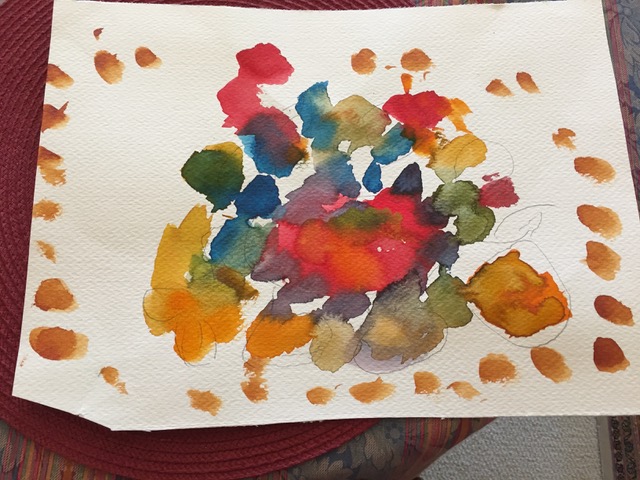
Shakti Pada Mukhopadhyay, Kolkata, India
Journal entry July 19
Yesterday around 2 p.m., over the phone, cried a female voice. “Uncle, please rush to Mr. Sahoo. It seems he has become senseless, stopping our telephonic conversations. You know, he is not well. Please save him. I am his fiancée, staying in a distant town.” She was crying. Mr. Sahoo, staying alone, was unwell & his Covid report was due. Immediately, I ran down, without any formal dress and mask, to save time. My wife chased me with a shirt and a mask in hand. A painter, working yesterday in my house, also followed me, hearing the hue and cry. I saw that, Mr. Sahoo, lying on his side, with hands folded beneath his breast, was breathing with a rattling sound. The painter, leapt out of the room, shouting, “Corona, Corona, I am leaving.” But, I sprinkled lemon water on his closed eyes and shouted, calling his name. He opened his eyes and turned aside as per my instructions, for ease of breathing. He also sipped a glass of warm water, offered by me. With proper dress and masks, I was eager to accompany him to the hospital, but was prevented by all. Last night I could not sleep, without knowing his condition. This afternoon, his fiancée informed that he is out of danger now, although he became senseless again last night. She profusely thanked me for my timely actions to save his life.
Miriam Karmel, Minneapolis, Minnesota
Sheltering in place since early March
Journal entry November 1
Jessica reports watching Gilmore Girls reruns. She lives alone, in a studio high-rise overlooking NYC. If she’s lonely, she never lets on. She doesn’t have to. A mother knows: Watching reruns of a sappy, fast-talking show set in a picture-perfect New England village is a symptom of loneliness, as much as loss of taste and smell signals Covid-19.
B and I watch reruns, too. Every night, hoping that laughter at bedtime will improve our sleep, we tune into Seinfeld. I laugh. Sometimes, though, mid-laugh, I’m overcome by an unsettling sense of displacement.
Here I am, quarantined for what feels like forever, seeing friends on Zoom, making end-runs around strangers, doing curbside pickup for everything. And there they are, those merry pranksters, talking, bickering, kvetching — in the same room. No masks. No way are they six feet apart, not in Jerry’s cramped apartment, not in that booth at the diner. The diner is open!
Did we ever live like that? That, as in, roaming free without fear of contagion, fear of the other. And will we ever do that again? Dr. Fauci assures us that we will. For now, we escape into reruns.
When the all clear signal sounds and we emerge from our cocoons, I don’t want to forget the loneliness, sleeplessness, fear. I want to remember how extraordinary it is to talk, bicker, kvetch together, unmasked, up close and in person. Those TV characters who dulled our loneliness or lulled us to sleep didn’t know how good they had it.
Arleen Williams, Seattle, Washington
Journal entry November 17
Your mom and I spent weeks toying with options. She longed for the sense of normalcy that holiday traditions give us and worried that at five months you still have few people in your life. We came up with a plan for an outdoor afternoon buffet. Grandpa and I bought a large white tent for the backyard and a fire pit for the front. We kept our number to ten — not counting you!
Then the predicted COVID spike began. When cases and deaths in King County as well as across the country began to rise, Governor Inslee issued new guidelines. Your grandpa didn’t believe socializing was worth the risk and favored immediate cancellation, but I waited until Monday to talk with your mother. Together we agreed Grandpa was right, but still, cancelling was hard. When my older sister assured me I’d made the right decision, I found myself crying.
You, little Jack, are the light in this darkness for our small pod. You give us laughter and joy with neither awareness nor intention. By your very existence, you offer lessons on being present, without past or future. So, despite cancelling our traditional Thanksgiving plans, I cannot complain. We will have our own small gathering. Your dad will smoke a turkey and your grandpa will make pecan pie — not that you will get to eat any of it! We will eat and laugh and be grateful together. Perhaps a quiet celebration is best for a little guy like you anyway.
Andrew Shattuck McBride, Bellingham, Washington
Sheltering in place most days
Journal entry November 17
I listened for the Northern flicker, didn’t hear anything. The woodpecker took up residence recently beneath the eaves, over a window of the apartment above mine. I won’t tell maintenance; generations of starlings have nested in a building near the manager’s office.
On the trail, I acknowledge fellow mask-wearers. Two women walked side by side toward me. After I saw they weren’t wearing masks, I kept to the edge of the trail.
Yesterday, I walked to the bus stop, rode the bus downtown, and got necessary errands done. There are more unsheltered people. I worry about them as fall deepens, as a bitter winter approaches. Coronavirus cases spike throughout the country. On my way home it rained. I got soaked. A friend, Seren, faces eviction.
I turned 60 recently. How did that happen?
It’s blustery this morning. Wind howls against the building. Nothing from the flicker today. Is it foraging? Sheltering?
The Governor extended the eviction moratorium through December 31st. Seren has a reprieve.
I’m older, not much wiser. I do know everyone needs a home.
Kirsty MacKay, San Jose, California
Sheltering in place since March
Journal entry November 21
In May I lowered my Prozac without my doctor’s oversight and now I have to fess up to her online. I wanted to see if I could lose weight. I was feeling so bogged down. I thought, why do I need all this medication if there’s next to no pressure in my life? Take out the garbage, clean, grocery store — but everything just stopped with COVID-19 so my dosage seemed like overkill. Anyway, she’ll probably tell me to comply with my prescription. I’m doing great on no face picking. I used fidget toys and gloves. I stood in front of packaged tweezers for 30 seconds in Whole Foods without buying them. The hardest part of the day is between 3 p.m. and 5 p.m. when I get bored and lonely. I’m excited about the OCD Workbook I ordered. I’m going to complete it just as though I were taking a class. My remote boyfriend is grumpy because Manchester City lost. I’m worried he’s about to break up because he usually is in constant communication but not today. He was busy. It would be an adjustment to lose him and I would be sad. I harbor a belief that I’ll always be alone anyway, so I’m getting pretty good at rejections. We’re coming up on a month of trying this out, so it seems right on time for doubts. It feels like 80 degrees in here. I’m dripping sweat.
Joan Potter, Mount Kisco, New York
Journal entry November 27
My Thanksgiving Day began at seven in the morning. I looked out my apartment window at the grey, rainy morning, then settled in the recliner with a mug of coffee and my iPhone. After reading the bad news of the day, I had a breakfast of multigrain Cheerios, followed by two blood pressure pills.
I read a book and fooled around on my computer until noon, when I had a bowl of my own red lentil soup and a slice of buttered white bread. A little later, my son Stephen came for a masked and distanced visit, bringing me a box of chocolate-covered strawberries.
At about four, my other son, Jonathan, arrived. I made coffee and, sitting across the room, he ate Mallomars and a chocolate-covered strawberry. My daughter texted that she couldn’t visit because a close neighbor had just tested positive for Covid.
My other daughter, who lives in Iowa, promised an after-dinner phone call. I ate Stouffer’s lasagna followed by a chocolate-covered strawberry, a mini Mounds bar, and a small dish of Haagen-Dazs dulce de leche ice cream. After my daughter’s call, I nibbled at the remains of a Lindt Intense Orange Dark Chocolate bar, the finale of my Thanksgiving feasting.
Mary O’Melveny, Washington DC
Sheltering in place since March 11, retreated with my wife to our home in Woodstock, New York
Journal entry November 26, Thanksgiving
The cloth napkins are out. And the silver. I have placed it next to my great-grandmother’s Haviland china with its dainty painted leaves and floral garlands. Our walnut dining table glows, recently refreshed by lemon-hinted wax. Candles await flame.
As our apple-stuffed chicken roasts, we warm the potato kugel we made this morning. My wife remembers her mother Rose standing in their kitchen, grating pounds of russet potatoes. Finally, when she had finished, calling her father Martin to the task of mincing onions. I have made cornbread stuffing with sausage and almonds and green beans drenched in mushroom sauce which will be crowned with fried onions. These graced the tablecloths of my youth.
Still sitting unused on a shelf — my grandmother Bess’s scalloped condiment dish. It was always home to celery sticks, carrot strips and ripe black olives in the Thanksgiving celebrations of our past. We have none this time. Hors d’oeuvres seemed a useless frill for dinner with two. The wine is poured. Dinner is served. The din of absent guests infuses the room as sunlight fades.
This year arrived with sorrow’s weight. The news is filled with need. Depression-era bread lines stretching for blocks. Near-drowned migrants still being pulled from leaking rafts. Coronavirus graphs groaning with red and purple splotches as health care workers beg us to keep our distance. Our meal for two could feed six.
Leane Cornwell, Mill City, Oregon
Journal entry Sept 8
After six long months of barely seeing another person being welcomed into a large gathering of people seemed surreal. The fire evacuation center in Salem, Oregon had been hastily put together yet they were ready for us.
Last night speeding west through flames bordering both sides of the road I wasn’t sure of anything. As gusty winds pushed the Beachie Creek fire down the canyon, eating up beloved small towns of home I wasn’t scared of a virus.
In shock, Steve and I moved around setting up the camper as two volunteers pulling a child’s wagon greeted us.
“Hi folks. We have water and hot burritos.”
They didn’t wait for our answer, just handed us food and drink. Before continuing their rounds to other displaced tent, RV and camper evacuees they said, “If you need anything just go inside the Jackman-Long Building. Donations will be coming in all day. Just be sure to wear your mask. Gotta stay safe, right?”
This morning Covid masks did double duty protecting us from germs as well as falling ash. There was no visible sun; just thick smoke, heat and a constant drizzle of ash.
Safe? I couldn’t help but cry. Their concern was genuine and heartfelt but . . . safe? When would I ever feel safe again?
David Etheridge, Phnom Penh, Cambodia
Journal entry October 15
My son asks me to live closer to him. Can’t say “No”; don’t have many years left. But flying into Europe is a Covid jump — four airports and three flights. Daily check with the travel agent about cancellation, PCR test, and quarantine requirements. Have collected masks, gloves, sanitizer, face shields, and a hazmat suit but what happens after? Different climate, food, water, bacteria, viruses, people . . . I’m scared. He says, “Don’t worry.” I’ve spent 202 days since March creating a safe lifestyle and healthy habits and I’m throwing that away by going into the unknown and uncontrolled. Wish I were braver.
**
Dear teacher,
In class when you speak you make me laugh. I like to listen to you and would like to listen to you all day. Maybe not all day because I like to speak too. I hope someday you come back to Cambodia because I know I can learn a lot from you and you can learn something from me too.
Your student Sokly
**
On 6Z the kindergarten children have arrived and our old woman hawker wheels her noodle cart into the alley and feeds them smoky wok fry. It’s as much about service and care as it is about money.
Grandma and Grandpa have returned from their medicals. Grandma taps her head and says, “No good.” Grandpa points to his eyes and says, “No good . . . no good.” Then he smiles and says, “You sir, . . . good.” That summarizes the health situation on 6Z.
You don’t describe Phnom Penh . . . you live it and it’s not been great, but that’s my own doing as I have only colleagues and students. My friends are online; my neighbors imaginary; my enemy, myself. And Jim Morrison’s in my head going: “This is the end, my only friend/ The end . . .”
Sor arrives at the gate. He loads the bags. It’s early morning — the Pakistani diplomat has finished his prayers. The Chinese are sleeping. And I won’t miss the feral cats.
Susan Landgraf, Auburn, Washington
Journal entry September 7
I was a young mother when Star Trek was born. An older student going to class one night a week. The weight of doctor visits, bills, tests — and I had it easy. I was married to you, a man who loved me. A man who measured every cut twice or even three times, who cut the potatoes and carrots and meat for the beef stew into the same size.
Yes, we argued about money and who should clean the toilets, but we mismatched ourselves, didn’t we, into a team.
Today you would be 85. I try to sense your take on the pandemic and how to shelter in place without losing faith. I believe the scientists: no energy is lost. But I feel lost.
I go through a box of old files – find notes you sent me a long time ago. I’m learning how to Zoom, to connect to the world. I feel young and old, lost and found. I’m feeling that “Beam me up Scotty has failed.”
With mask and sanitizer, I hold a new grandchild today.
John Wilson, Baltimore, Maryland
Journal entry November 15
I seldom remember my dreams, but I wrote this one down since it was so memorable. In this dream I’m observing as if it is a news story on television. I’m not in the dream scenario myself.
The segment features a man — who looks a lot like John Ossoff, Senate candidate in GA — who’s recently inherited a run-down property in Montana or North Dakota. It’s out where there are wide open spaces and few people, a good place to quarantine. There is an old house without plumbing, electrical, or any modern amenities. He decides this is the perfect place to isolate during the pandemic.
The winter is tough. Since he’s not much of a cook, before he settles in he stocks up on canned fruits and vegetables. He thinks he may be able to hunt or trap animals to get some protein, but the gun that’s in the house doesn’t work. And he’s not a skilled trapper or outdoorsman.
When spring comes, he’s got a wild mane of hair and a huge beard. It looks extra huge on his small frame. His eyes are glazed from malnutrition. He’s heard no news, so doesn’t know if it is safe to emerge yet or not.
A reporter comes to interview him amidst the mountain of empty tin cans, and he asks if the pandemic is over.
The reporter asks him how he survived this ordeal. The guy says that he brought one book that really saved his life, “I Cannabis.” The reporter asked if he meant “I Cannibal.” The fellow responds, “You mean I brought the wrong book?”
Maureen Murphy Woodcock, Cathedral City, California
Sheltering in place since March 10
Journal entry November 21
For 10 years, I’ve been writing furious, angry, poetry about Bill’s dying. I’ve swung to and fro from fury to sorrow, made a U-turn headed towards rage and self-pity. Without him during this epidemic, I’ve been wondering if I ever loved him.
Until last night. Two older men on television asked each other if they remembered the moment they met their wives. I knew exactly what I’d say if asked; I met Bill on February 2 (Groundhog Day), 1962 at 5 p.m. Pacific Standard Time. I could even quote the latitude and longitude if pressed.
Gail Folkins, Snoqualmie Washington
April 3
John’s out of breath. We drive to the hospital at midnight, a coyote loping across the
road. “Drive faster,” John says, and I race through a light. Used to handling everything ourselves, we freeze outside the ER like awkward guests. “My husband’s short of breath,” I tell an attendant. “I might’ve had the virus.” The stricken-looking man hands me a mask and takes John in for treatment, me waiting behind floor-to-ceiling plastic until John is tested and released at 3 a.m.
April 4
John’s days mirror my malaise, although his temperature stretches higher and he has a cough. I sleep in a spare bedroom so he has the comfy bed, but if I gave him the virus, does it matter? We dig in and channel a COVID hotline nurse who’d described the virus as a turd, me insisting on Tylenol, John calling the virus names.
April 14
John improves, recovers. He calls the hospital and learns he tested negative for the seasonal flu, negative for coronavirus. Though test accuracy varies, it’s an unsettling outcome, as if our lethargy was an email suggestion, the coyote a fever dream.
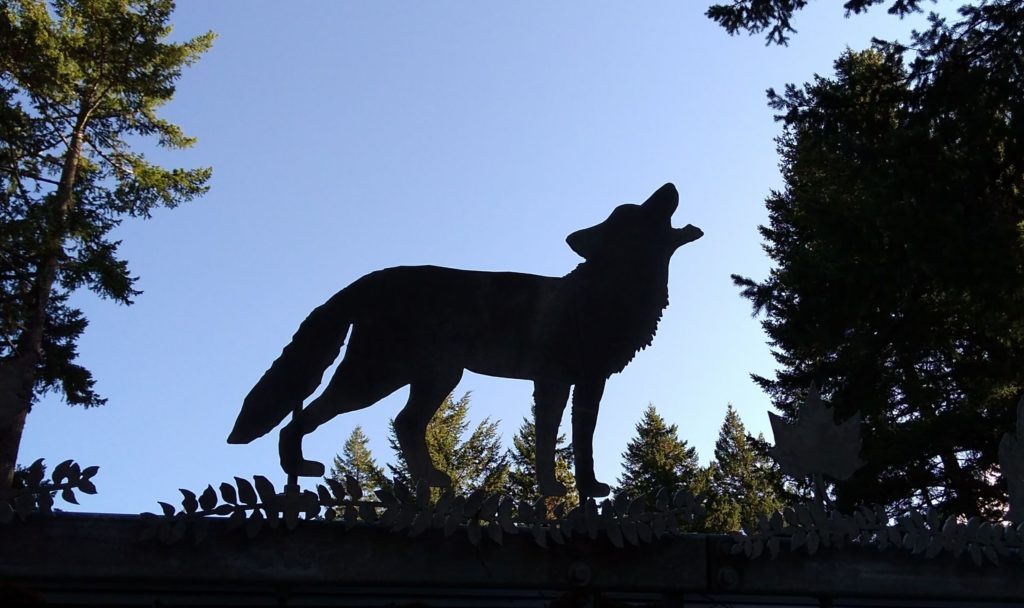
Martha Strom, Brooklyn, New York
Sheltering alone since March 20
Art entry November 10
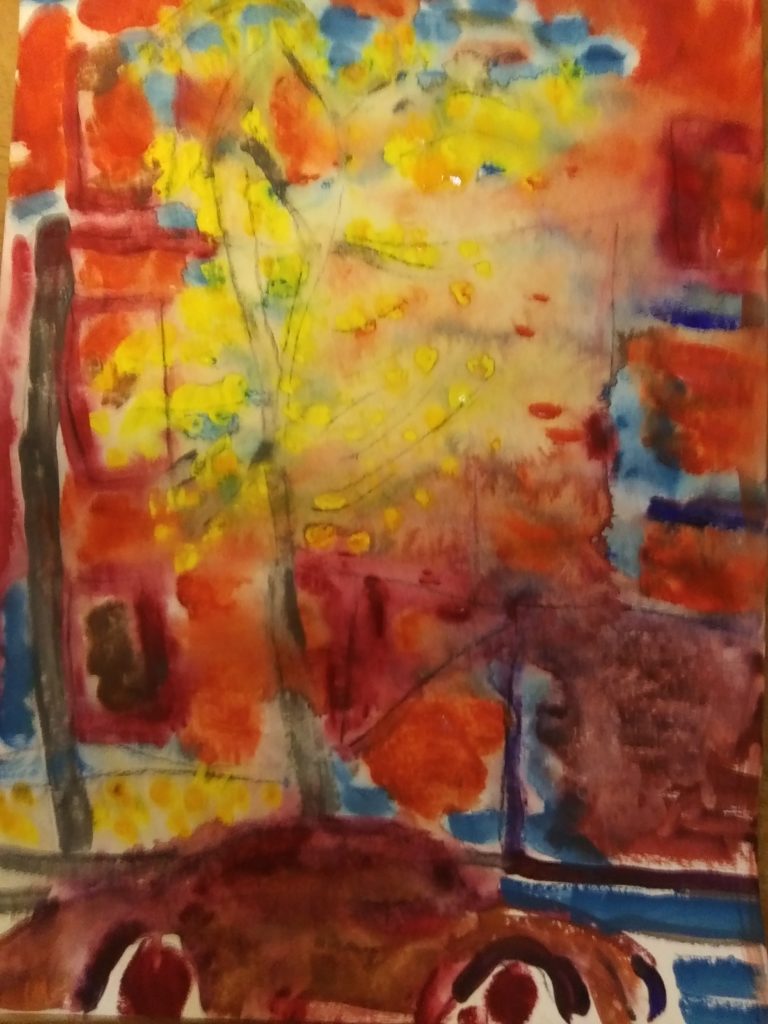
Oh Covid, without you I might never have noticed this tree across the way. So many sights and sounds, tastes and terrors I might have missed! This is a view I have while doing my daily yoga.
Maureen Teresa McCarthy, Skaneateles, New York
Sheltering alone since March 20
Journal entry October 28
Today is cold, gray, damp, what the Irish call a soft day, a day that calls for comfort. It is early morning, plenty of time to bake. There is always time now, though I still forget that. I mix flour, yeast, milk, salt, sugar, the same as my grandmother did, and then I knead it as she taught me. She taught patience as well, what I surely need now. This is slow rising bread, made with very little yeast, a touch of sugar. It takes all day to rise. I may have warm fresh bread for dinner, or not. It’s up to the yeast, but I know I am not in charge. The yeast is.
Miriam Karmel, Minneapolis, Minnesota
Sheltering in place since March 17
Journal entry November 8
Nate stopped by for his bicycle yesterday. He can’t enter the house because he’s been hither and thither on airplanes. His bicycle lives here.
We spoke through masks as he pumped air in the tires. When he was ready to take off, I asked if he was going to wear his glasses. He looked at me as if to say: Have you lost it? You know I wear contacts. Of course, I do. But he was helmeted and masked. I could only see his eyes, naked, crying out for protection, for spectacles.
Now, I’m fretting. Is this lapse like the forgotten-name moment that I fear signals a slide into dementia, then quickly excuse as a result of information overload? This time, I’ll blame the mask.
I am not an anti-masker. I am afraid of Covid-19. If I weren’t so fearful, if age didn’t place me at high risk, would I shun the mask, dismiss it as a hoax? I would not. I trust science. Still.
The mask muffles my voice, clouds my vision. In a mask, I feel less than myself. When I’m out walking, I smile extra hard at passersby, as if a smile will appear in the corners of my eyes. This is not unlike the way I speak to non-English speakers, stilted and loud, small compensation for our language barrier. Now I smile loudly. And I tell Nate to put on glasses he doesn’t wear, because in my mask fog I have forgotten the particulars of my son’s face.
Cheryl Rubino, Greeley, Colorado
Sheltering in place since March 26
Journal entry October 12
Season of mists and mellow fruitfulness . . . I like to read Keats’s “To Autumn” every fall, but this year I’m not sure what I’m seeing. There’s a lane nearby, aglow with lemony leaves, all faintly veiled — either by moisture, or smoke from forest fires. The lake’s reflected cottonwood crowns have the luster of an antique mirror.
Later on, the surface clears. A patch of dry grass edging a still-verdant bank meets the water, and doubles into the image of an amber diamond set on a velvet pillow of green.
I grapple with it as a paradox — or an encryption of the Zen concept that softness eventually overcomes hardness — like water wears away rock.
This afternoon my shopper brings me three red pears. One has dappled shafts of yellow and green, charting its gradual ripening in the sun. Another’s rouge skin is more subtly mottled. My favorite is a uniform dark pink, except for a stripe of green flowing down one side, like a tear line down the face of a cheetah.
I arrange the pears in a wooden bowl, where they wobble like eggs before nestling together like sleeping puppies. When I place my favorite upright, it resembles a portly figure meditating, maroon robes parted to reveal a lime-green gown.
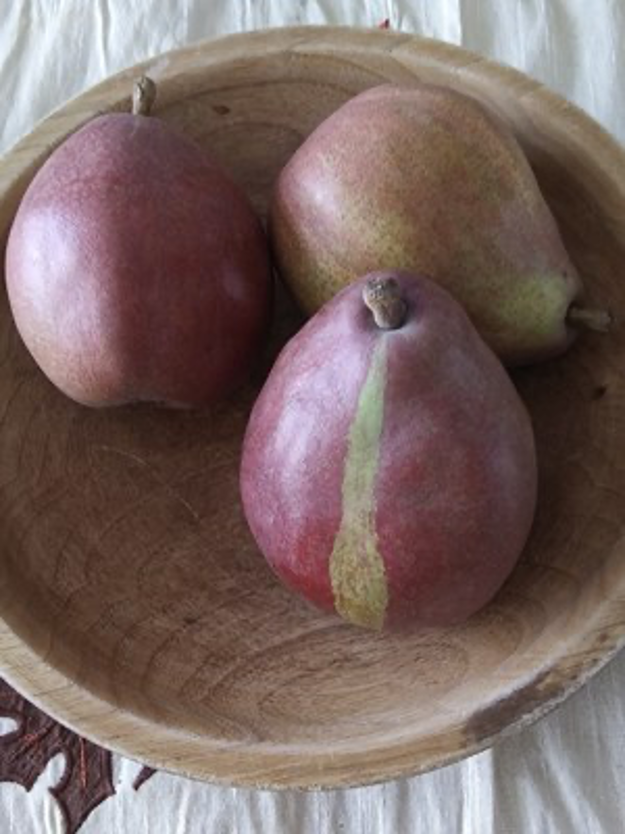
Harriet Riley, New Orleans, Louisiana
Journal entry November 11
When my daughters were growing up, we had a family tradition. Each evening we would each share our highs and lows of the day as we had our dinner around the table in our little cottage in Pensacola. I was a single parent and they had my undivided attention at the meal. Sometimes a “high” from one of my girls would be that she made 100% on her spelling test. A “low” would be that her friend Dorie was mad at her. Or I would share that my headache went away for a high and my gas gauge was on empty for a low. Mundane everyday events stood out as we thought about where we found joy and where we were challenged each day.
Now twenty years later, my girls are grown. One lives in Seattle and the other in Austin. I live in New Orleans. The distance has felt even greater in this pandemic. We know we can’t see each other. So from day two of being under lockdown, we re-instituted our old tradition on a daily Facetime call.
My older daughter, Riley, had the idea. “Let’s do highs and lows,” she said. Tears came to my eyes. A lot has happened in our lives since it was just the three of us. Those days in our little cottage seem so long ago.
Hannah, the younger, jumped in and said, “I have mine.” Her low was waking up and feeling overwhelmed for the first time. That day, the pandemic effects and the toll of working from home really hit her. Then she shared her high — it was dressing up her dog Leo in her company logo shirt and taking his photo on her balcony. Riley’s low was getting the news that her campus was shutting down and her high was walking with her friend Katty. My low was saying goodbye to my husband’s nephew who was moving back to Australia and my high was seeing friends at the park during our afternoon bike ride.
Since then, we have shared our highs and lows most days. We find strength and solace from each other’s moments of vulnerability and our shared resilience. Our connections as mother and daughters and theirs as sisters have become stronger in this time apart. That is a high in the midst of a lot of lows.
Ann Hedreen, Seattle, Washington
Journal entry November 9, 6:40 a.m.
The eastern and southern skies are peeking from under a dark blue-gray lid of clouds, flirty orange wisps floating where the sun will rise; Mt. Rainier like the mother goddess, watching over the rising. The edge of the cloud-lid lightening. An almost-frosty 34 degrees. I wonder if the lettuces are crisping.
Eight months ago, I debated whether to go to my sister Caroline’s on her birthday. I had just been skiing, that one beautiful day. Something was happening that none of us quite understood yet, but sure enough, within days everything was happening. Canceled events and work screeching to a halt. Maryjane’s (my stepmom) surgery, postponed. Dad marooned in Arizona. And then, the worst, David (my nephew, who died of a drug overdose on April 6). And meanwhile Nick (my son, 28) was sick, and Claire (my daughter, 31) was suddenly home because her campus closed, and I started scribbling numbers in my journal every day.
And now, those numbers are huge and bad, and the headline this morning is that Pfizer has a 90 percent effective vaccine.
The cloud-lid is now pink, purple, blue, and quilted.
That one tree, right where the sun will soon appear — it looks African, like a baobab.
A vaccine?
Thank you, God. Thank you.
Here comes the sun, right up from the heart of that big tree. I think it’s an old red oak.
The cloud-lid is dissolving into blue sky.
C. Christine Fair, Alexandria, Virginia
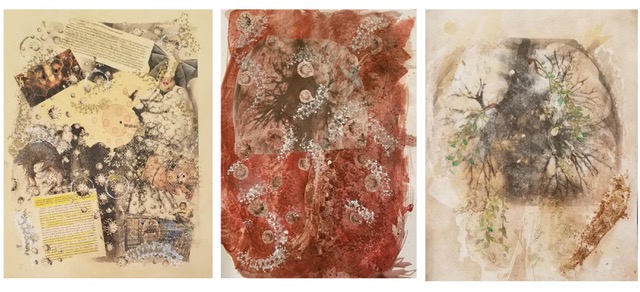
This is a COVID-motivated, mixed-media triptych. The left image depicts the brewing storm driven by China’s wet-market where trafficked animals are kept in conditions of bio-insecurity, ripe for zoonotic events. It details 2007 scientific findings that SARS emerged from these conditions and predict that the next pandemic will as well. The middle image depicts the brutal reckoning of this disease and the concomitant haphazard way in which countries like the United States (mis)managed it. To the right, is an imagined post-pandemic future of renewal. Running across all three pieces is the image of the damaged lung, COVID’s most gruesome signature.
Laura Culberg, Seattle, Washington
Sheltering in place since March 16
Journal entry October 20
Exactly a year ago I sold my business. I owned and operated a yoga studio in one of Seattle’s busiest neighborhoods for close to twenty years. But, as I rounded the corner past fifty, I wanted to try something new.
A few months after I sold my studio, Coronavirus swept down upon us like a big, dirty blanket. Now, with time on my hands, I decided my next move would be to work as a contact tracer. I wanted to understand more about this virus; I wanted to help. As a serial entrepreneur, I hadn’t created a resume or applied for a job in a quarter of a century. The process was challenging and humbling, but I succeeded in getting a contact tracing job.
In the four months since I’ve been contact tracing, I’ve felt simultaneously enlivened with hope and deeply despairing. People are confused and frustrated. I’ve worked with a nursing home where both staff and residents have been infected so there are not enough caregivers nor are there enough rooms to isolate those who are infected. I’ve talked to families of seven who watch the virus latch onto one person and completely skip another. People have horrendous symptoms or none at all. Everyone has a different idea about what to do and almost no one knows how or where they contracted the virus. I’m learning a lot from this new job, but I don’t have any more clarity about how this pandemic is going to play out.
Virginia Cranch Teichmann, Weingarten, Baden, Germany
Journal entry October 28
I realize what a gift it is that the pandemic has connected me to people all over Europe, many of whom I will never see in real life, who have interests similar to mine and want to exchange ideas in real time. Online I listened to an Italian author in Rome reading from his novel and discussing it with a moderator in Frankfurt, streamed because the Frankfurt Book Fair cannot take place this year. I took part in German Quaker Yearly Meeting for three days with 140 people carefully feeling our way, observing people’s faces and listening to the nuances of their voices, to decisions about how to use our resources. Twice a week I meditate online with a group of German-speaking people, some very widely read, all very thoughtful, on a spiritual journey and willing to share their experiences. I don’t know (yet) what it is, but the emotions that are released and come into play online are different and more positive for me than the ones in real life. It is a combination of a different kind of distance and closeness, I think.
Ellen K. Reichman, Kirkland, Washington
Sheltering in place for 240 days
Journal entry October 26
Yesterday was a bad day. My anxiety was so high. I felt it crescendo into a raging inferno. I couldn’t breathe.
Today I feel a bit better.
I see my old life and my new life before my eyes as if they are two different eras.
In my old life, I didn’t feel that old. Felt vital. But, in my new life, I feel old. I am now considered elderly. I shop with the old folks.
In my old life, I was an extrovert through and through. Loved my interactions with others. We ate out often, traveled, visited my family, went to the theater.
But now, in my new life, that’s all history.
I see my grandchildren through a screen. My arms literally ache to hold them and hug them.
In my old life, I was not happy about our political situation, but now, in my new life, I am obsessed and devastated about our political, racial and unjust society. I can’t sleep at night thinking about the lives lost and the families left behind.
In my old life, my husband and I went grocery shopping whenever we felt like it. We took our time strolling down the aisles. But now, we go, masked, gloved, and aim for record breaking time to get in and out.
Part of my old self has died. I pray for a rebirth.
Karen Egee, Brunswick, Maine
My husband and I moved to Maine from Boston suddenly, to help out my 85–year–old father when the pandemic hit
Journal entry early April
I dream of a damp trail through the woods. It is one of those dreams that seems totally real. I can see puddles of water pooling over pebbles. Through the water, I see a layer of brown pine needles covering dead leaves, covering dark earth, the edges dotted with piles of melting snow.
“This,” I tell myself in my dream, dreaming that I woke up, “This trail, these woods no longer exist. Remember? Coronavirus. Remember? It’s all gone.”
Then I start waking up for real, slowly, in layers. It’s still dark. It’s true. It’s not true. Pandemic. Big red numbers on the news, unfathomable numbers, more dead every night. That map on the front of the newspaper with our city and cities everywhere covered in overlapping blood red circles. Hospitals overflowing, people dying without loved ones there, doctors, nurses, others, risking their own lives to help. It is all true.
But the path in the woods where the dog and I walk every morning does still exist. Later, when it’s light, after I feed him and let him out, after I check the paper, before I digest it, before I scramble eggs and fry bacon for my husband and father, we will walk along that path in the woods, he wagging, sniffing, trotting ahead, me breathing in cool air, my feet maybe getting wet through my sneakers, where the snow is mostly melted, in the puddles of my dream.
We are lucky, our little family, lucky for now at least.
Elaine Nussbaum, Scappoose, Oregon
September 10
Gabrielle Trumbly, a videographer and Jennifer Paulson drive from Portland to Paulson’s childhood home of Molalla, fifty miles southwest of Estacada, to record the fire surrounding the town. Paulson and Trumbly leave when it becomes too dangerous, but locals post on Facebook: they are members of Antifa and have come to commit arson. This is not true, but rumors rage like wildfire, and are almost as hard to squelch.
September 12
In his book Rage, Bob Woodward reveals that Trump knew how bad Covid-19 was, back in the beginning of February, but told the public, “. . . like a miracle it will disappear.” Almost 200,000 people have died of Covid-19. There are 2,236 active fires in the Western United States, and Portland’s air quality is the worst of any major city in the world.
September 13
It seems like a pleasant fall day with fog caught between the branches of scraggly firs, and the smell of wood smoke in the air, but the Air Quality Index is 422. When I deliver supplies to the Fire Evacuation Center at the fairgrounds, a Country Western band plays to empty chairs set up in a field. The song they play is “This World Will Never Be the Same Again.”
Miriam Karmel, Minneapolis, Minnesota
Sheltering in place since early March without visitors
Journal entry September 6
I plan to make pasta with pesto for lunch, as if I were matriarch of a large family that gathers on Sundays. Alas, it is only B & moi. I am grateful for his presence. Still. He is on the front deck reading a book about Frederick Douglass, a birthday gift from Jessica. I’m upstairs, making entries in my morning notebooks.
I contemplate a glass of wine with our lunch, as if we are Paola and Guido Brunetti, at our fictional flat in Venice, he back from a morning of sleuthing, me having finished grading papers. Oh, to be in Venice! But I am trying, oh am I trying, to be here, in the now. Why is it so hard?
We have a late lunch. Pasta with pesto made with basil I picked from the pot on the back deck, part of my make-shift container garden that has given me solace during this unsettling time. Leftover salad. Wine. Pellegrino. I set the table in the dining room. I set out a small vase of zinnias (picked from another pot on the deck). Cloth napkins. White dishes. We sit down, unfold our napkins with a flourish, toast each other. We pretend the family is gathered around us. Everybody is laughing. Chattering. Telling stories. The grandkids are well behaved. B and I are so happy! We invent conversations with them. When we finish eating, I turn to B and say, “They left so early. I miss them already.”
Elaine Nussbaum, Scappoose, Oregon
September 7
While we pick grapes in the backyard, the sky turns milky white. Blasts of hot air stir the leaves — still green — to a frenzy. There is a strong smell of smoke. I find Fires Near You on-line but can’t load the app. David drives up the road for a better view. I call our neighbor who thinks it’s blowing up from fires in Southern Oregon and California, which could be true. The internet reveals that a Gender Reveal Party Goes Wrong in Yucaipa, California. Gender reveal parties often involve fireworks. Thirty major fires burn in California, but the wind is blowing from the east.
September 8
The sun rises, a dull orange orb in the gray sky. Yesterday, an east wind event blew up a human-caused fire near Estacada, a suburb southeast of Portland. Started in dry grass, it soon spread to timber and rough terrain. In Detroit, Oregon, fifty miles — as the crow flies — south of Estacada, fire SURROUNDS the town. A volunteer fire-fighter films as he drives his family out through the dense smoke, fire licking at the edges of the frame. Is this normal? his son asks. No, son. It is anything, but normal.
September 9
Where I live in Scappoose, the Air Quality Index is 375. Anything over 300 is considered Hazardous. A young woman rides her bike down a quiet side-street. The sky is gray. She does not wear a helmet. She is not wearing a mask. She smokes a cigarette.

Rosanne Singer, Baltimore, Maryland
Journal entry October 2
Like so many of us I have been keeping social distance from people throughout the day, every day—on my daily dog walks, as I maneuver past fellow customers in grocery stores, when I spend a rare visit with a friend outdoors and even when I see family. I’ve been learning over Zoom, attending events on Zoom and sadly had to say goodbye to a loved one on Zoom. So it has been a remarkable treat to teach a memoir workshop in person at a senior residence in Baltimore. Of course, every precaution is taken—I use hand sanitizer, fill out a health questionnaire, have my temperature taken, wear a face shield and stand alone on an auditorium stage while masked participants work at socially distanced individual tables in the audience area. But together we have found a way to make this an emotional, intimate experience that bridges the physical distance. Each week participants bring in a written piece that is part of their life story. They share it out loud and listeners gently ask questions or comment. Even without a microphone or shouting we are able to hear each other. One week a woman read us a remembrance of September 11th when she worked close to the World Trade Center and experienced the shock and trauma of that morning but also the humanity and kindness of those around her. She wasn’t sure she would have the courage to read her story out loud, but she did and received what felt like an emotional embrace from all of us in the room. I took this photo from the stage on August 27th.
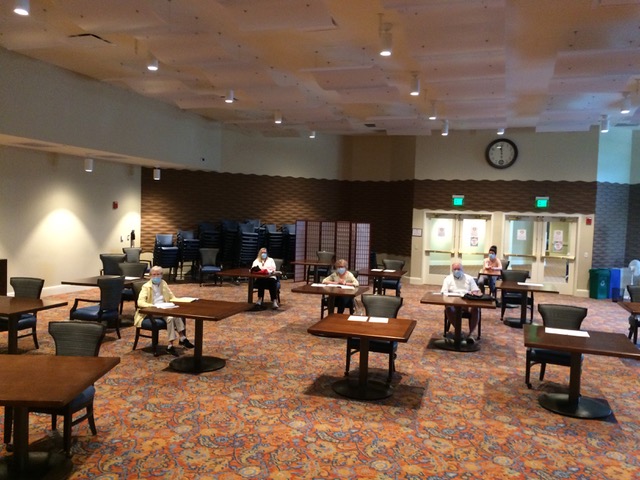
Kim Klugh, Lancaster, Pennsylvania
Journal entry September 19
Woke up to a beautiful day for our son’s small, backyard wedding at his fiancée’s
home. This mini-wedding became plan B since the gala event scheduled for October had to be postponed until 2021. This day has been marked on my wall calendar only since mid-summer. It’s the only box on this month of 30 days with an actual scheduled event. Two weeks ago, I bought my garden party dress and shoes without being able to try them on at the store.
We’re part of a twelve-person guest list. Small hand sanitizer bottles sporting the catchy phrase “Spread love not germs” and hand-made masks are the new backyard wedding favors.
The bride and groom wrote their own vows, an aunt shared a reading written by my son, I read a poem, the bride’s mother shared a reflection, my husband coordinated the ceremony, and the bride’s sister was the wedding official who signed the marriage license. Even the bride’s horse cooperated and stood by the fence during the ceremony, wearing his new, rose-bedecked halter.
The wedding cake was a cinnamon roll cake baked by the aunt; trays of assorted whoopie pies rounded out the dessert table. An uncle delivered the toast, and we drank to the couple with Prosecco served in plastic champagne flutes. It was intimate, surprisingly elegant, and oh so joyful. Best day of 2020!
David Etheridge, Phnom Penh, Cambodia
Journal entry August 10
Online is fine for Phnom Penh students with good wifi, but outside the city the service is poor or non-existent. And students from the provinces don’t have the hardware. “At home, I share smartphone with my younger sister and mother,” pings Linna. Ratanak in Kampot runs his laptop off his phone hotspot which for several courses a week is expensive . . . and these days who’s still working in Kampot? Have a 9-student roster — 5 turn up and another 3 check in but have wifi problems and leave; 1 is absent.
I hear wind blowing. Kimchen’s gone to a riverside restaurant where the wifi is better than at home. “My internet interrupt now,” pings Sreyleap. Linna chats that she can’t talk during class because she’s at Cafe Joma. Ratanak’s microphone icon bobs:
“Ratanak, why are we listening to your rock ’n roll?”
“Sorry, teacher.”
“Please … or I mute you. Now . . . Does everyone understand the hypothesis?”
You ask the question and get nothing:
“Does silence mean ‘Yes, I get it.’ ‘No, I don’t.’ Or ‘I don’t care.’”?
Silences are exhausting. In the classroom, you read a weak smile or a face, and reformulate. But zooming, students don’t show themselves, so silences are inscrutable, almost always empty.
“Today my internet is so super slow,” says Sreyleap.
“Stay with me, please.”
“Okay, teacher.”
“And we’ll finish early.”
*
Telegram pings: “Please remind ur students to pay tuition fees.” Sreymom.
We’re not state funded, so we take the future on faith. Haven’t seen a pay check in three months. Sreymom asks if I’m stressed. “Only when I think about it.” It’s my Covid gift to the developing world: Work in the air, get paid by the wind. . . it’s all right here, right now in the tropical heat with lousy wifi.
“Stay w/ us, teachers,” pings Sreymom.
George Bandy, Alexandria, Virginia
Journal entry August 31
Woke up with a dream of me laughing.
In the dream, Freda and I are in our bedroom but we’re much younger—maybe thirty.
Two beds: one in the closet & the one we were using by the window.
A male friend is there & some unknown young woman is sitting on an old couch I got rid of fifteen years ago. My friend goes in front of her and turns the TV down without comment, then goes back to the bedroom.
Why, I do not know.
I apologize and tell her my friend must think he’s in his own apartment. She ignores me, caught up in I Love Lucy on the TV. I get my friend. He says somebody’s left us a Mac.
I laughed throughout the dream, so much that I woke up, wide awake laughing and felt great. First time I’d ever done that. VERY GOOD!
My vacation from the pandemic!
Amy Louise Rubin, Baltimore, Maryland
Journal entries May and June
The mandalas came out of my survival instinct, along with my desire to create.
They also came from feelings that I could not express and the need to see and create beauty in a tragic time.
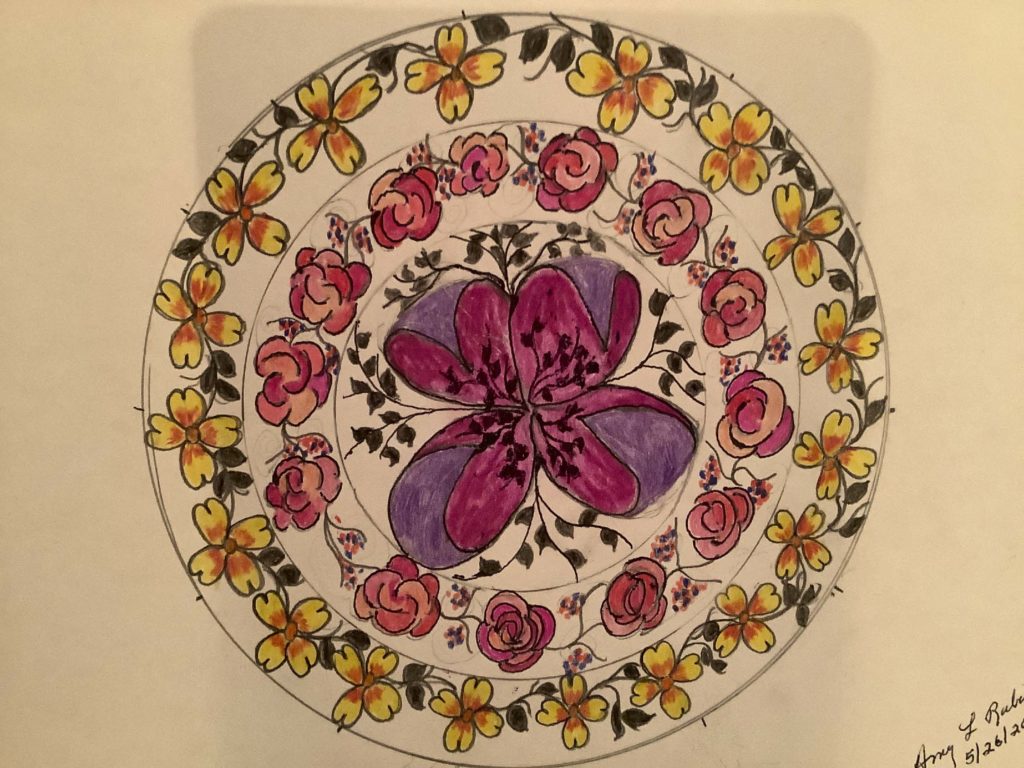
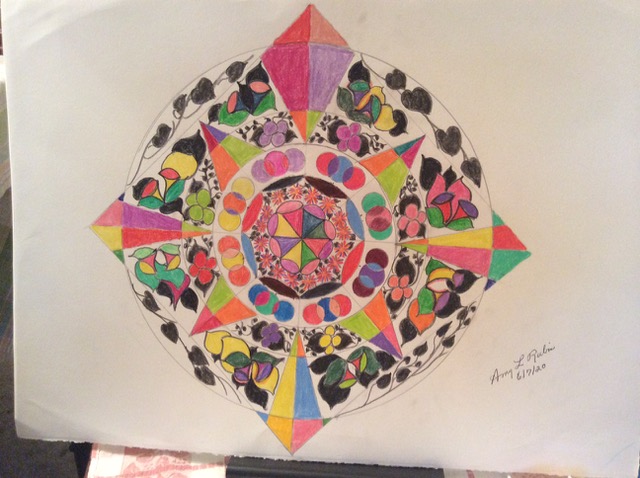
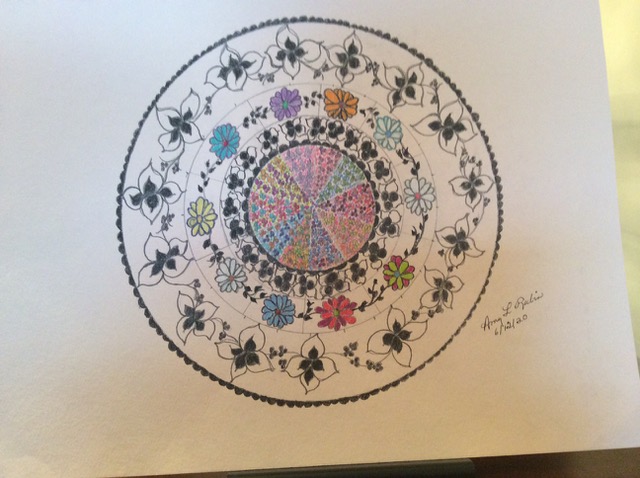
Nesta Hatendi, divides her time between Zimbabwe and Australia
Journal entry September 21
Morning! Phase Four Melbourne style. We have not yet approached the intended targets, so we can all go about our business. People are getting restless, complaining about loss of personal liberties. But the restrictions are working and numbers are going down—for now. Daniel Andrews has just held his 81st consecutive press conference and announced two deaths and 11 new cases. We are living macabre lives when we are fixated by the yo-yoing of daily life and death figures of anonymous people who we are further dehumanizing as statistics.
Before leaving the house earlier, I heard heavy footsteps on the wooden floor of someone coming to boil the kettle for their early morning tea. Monday morning, ready for working from home. I left all that and walked around the block, round the playing field where early morning dog walkers congregate and their pets ignore social distancing. Down the sloping pavements and then I took a new route. I started to feel disoriented, only to discover I was on a street near home. How did I manage that? The longer I stay here the more I realize that this will always be a foreign land. I dream of home where my only current connection is WhatsApp group messages from distant people living their lives in the new normal. Covid-19 should never be allowed to determine my life, living with me like an uninvited houseguest.
Johnny Stone, Raleigh, North Carolina
I am a 93-year-old widower. I live alone. I love to write and draw. I have 5 grown children and have been sheltering in place since May.
Journal entry May 31
At 9:46 a.m. My oldest son Junior called to check on me. Phone call was short and brief. Just wanted to know if I slept well and what I ate for breakfast. Remember Dad, don’t go outside. Okay. Love you.
At 11:33 a.m. Tracy my youngest son called to check on me. He thinks he is my father. Loves to give advice and counsel. But in a loving way. Dad, you need to start taking vitamins. Dad, you can get exercise if you walk from room to room for 15 minutes a day. I told him I would feel like a mouse in a maze. He laughed and encouraged me to stay limber. Don’t get stuck on the couch watching those cowboy movies all day. Alright. Love you.
At 3:15 p.m. Lisa called. My youngest and only girl. What’s up, Dad? Have you been drinking enough water? She knows I hate drinking water so she promises to drop off some flavored water and also a gift. After badgering her, she told me gift would be my new companion. A Betta fish. See you soon, Dad. Love you too.
At 7:12 p.m. I received a call from Kevin. Just called to see how you doing, Dad. He was in a terrible car accident a couple of years ago and had to learn how to walk again. I asked more questions about him than he did me. Just hearing his voice and knowing he’s doing much better was good enough for me.
At 9:48 p.m. Soon as I heard Hey Daddy-O, I knew it was son Stan. He calls me Daddy-O because he says I’m a cool dad. He lives in San Francisco. He told me a client of his died from Corona. It started with blood clots in the legs. So most of our phone call was questions about how I was feeling. Any unusual pains, Dad? No sniffles or headaches?
At 11:58 p.m. Going to bed after watching news and eating a nice piece of NY strip. Best part of my day was all the check-ups from my kids. This corona thing has really increased their communication with me. I love it.
Ilene Millman, Hillsborough, New Jersey
Journal entry August 6
Today was Shlomo’s Bar Mitzvah, the day the family was scheduled to stand together, her siblings’ feet for the first time on the continent where Melissa has lived for ten years, the day for the coveted picture — all our children and grandchildren encircling us. Instead, the wonders of technology delivered the event to us, sort of and for a while.
Via live stream we were able to view, see and hear Shlomo give his speech (in Hebrew so his friends could understand. We’ll wait for an emailed English translation.) Marty gave his Poppy speech via Zoom (wearing white dress shirt, jacket and tie above, shorts below).
Binny ran around pointing his cellphone video, so we could get a feel for the excitement of the dancing, the celebration, while the photographer moved around snapping photos. He instructed us to hold our iPad in a particular direction, placed a smiling Shlomo in front of the screen. Like moving props around a movie set, he adjusted our positions, snapped several shots and informed us a photo of us with Shlomo would appear in the Bar Mitzvah album. Surreal.
And then, the link was lost. A not subtle metaphor I’m afraid. One minute you’re there, albeit some two-dimensional rendition of proud grandparents, and poof you’re gone. But there’s that line, from Hirschfield I think, “. . . that you came to love, that was the gift.” Going back to living with less, I’ll try to see it.
Isabel Learza, Baltimore, Maryland
Sheltering at home since March 13
Journal entry August 8
When Terrylynn invited me to Asa’s art show in their back yard, I was tickled to hear about her five-year-old art spirit daughter living across the street. Saturday afternoon their yard filled with masked neighbors, even Janet, who rolled her walker up the hill to be there, a week after her hip replacement.
Asa’s paintings and drawings were mounted on black cloth that covered the fence.
She made her first painting at the beginning of the shut down, when the family had to cancel their annual visit with her Nana in Bermuda. She looked forward to the visit all year. But no flying out over the ocean this year. Her first painting, “The Big Deep Sea: Waterfall”, came from her sadness and fear of deadly Corona that kept her from her grandmother. It’s a big dark abstract painting, overwhelming, like drowning.
Terrylynn said Asa wanted the paintings and drawings to be in chronological order;
and moving along the fence, we could see/feel a shift. She painted “The Big Mind Imagination Town.” And once she understood her imagination could take her places, she made colorful drawings of the playground she couldn’t visit and the July 4th fireworks she wouldn’t get to see. And rainbows started appearing — a Rainbow Castle Gate, a Rainbow Waterfall. And a beautiful Rainbow Palmtree to bring her close to Nana in Bermuda. It seemed that Asa had found her way through the fear and strangeness of Covid times into joy.
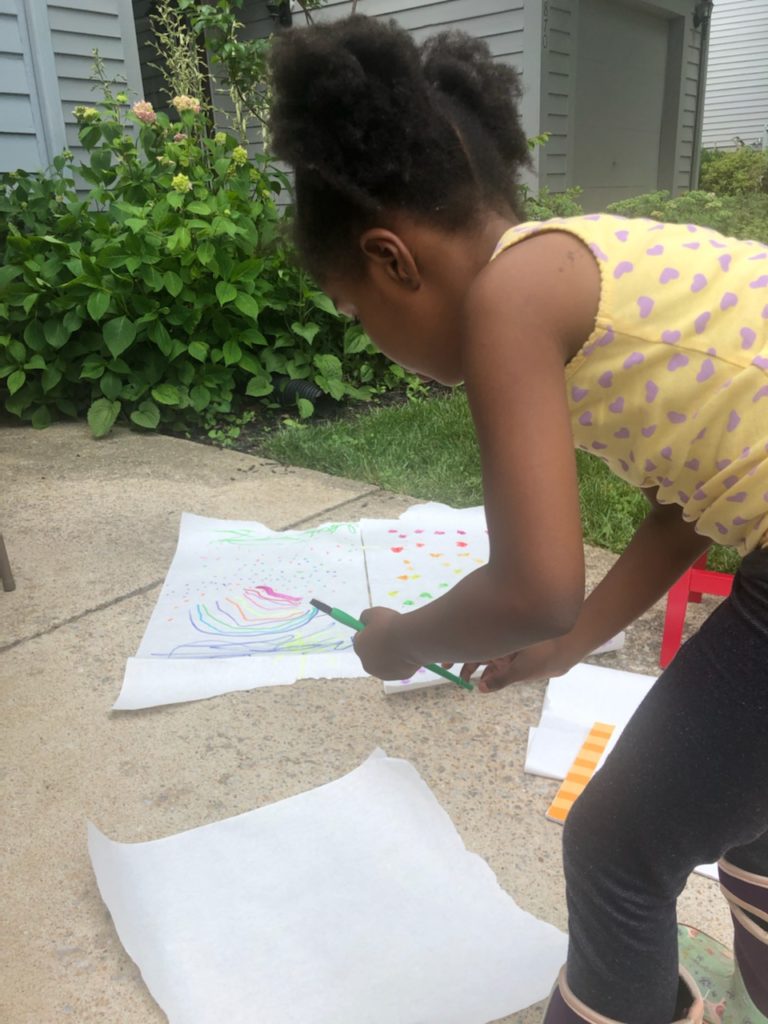
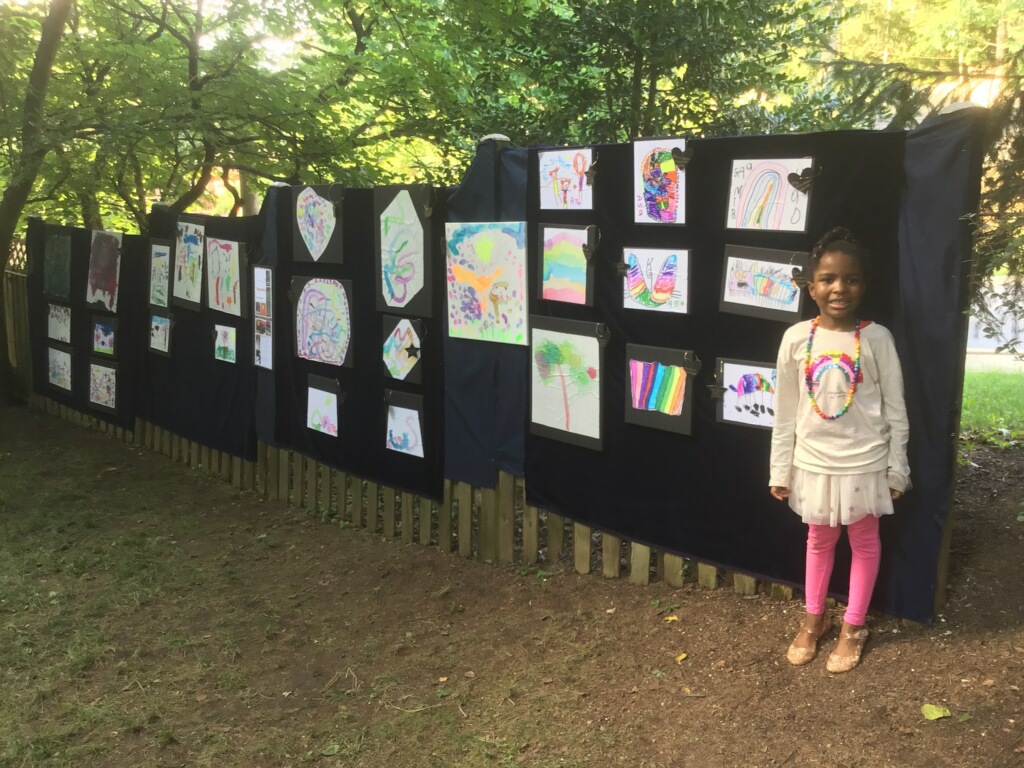
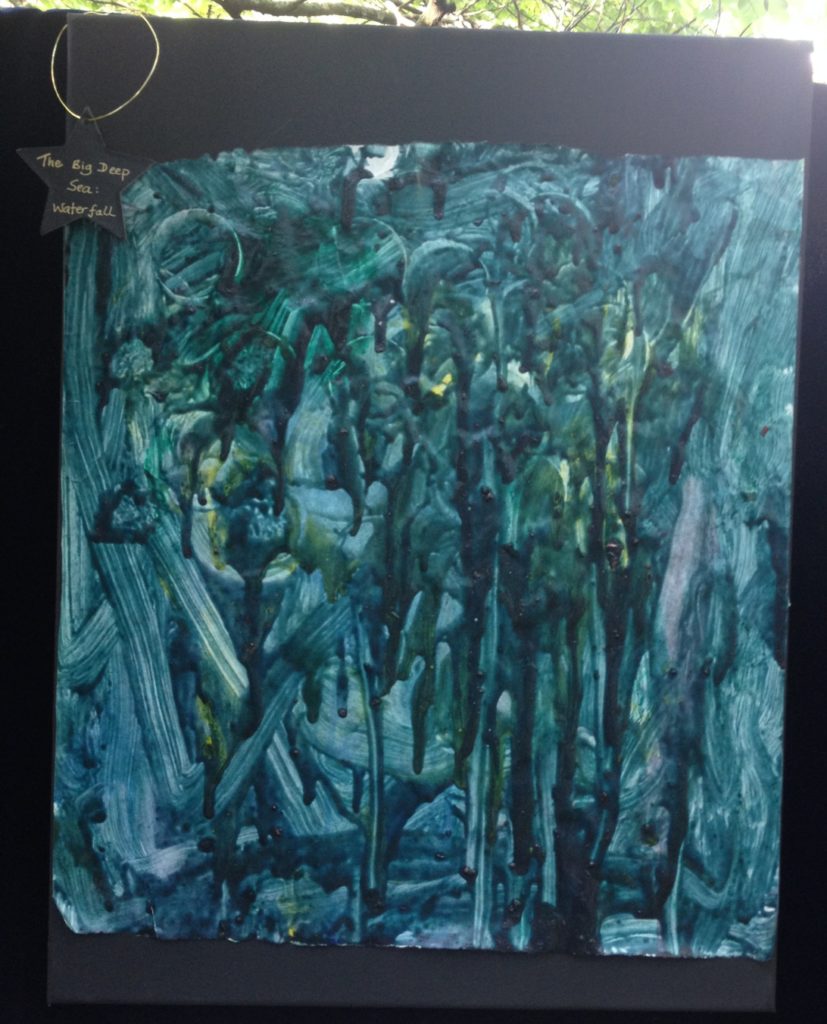
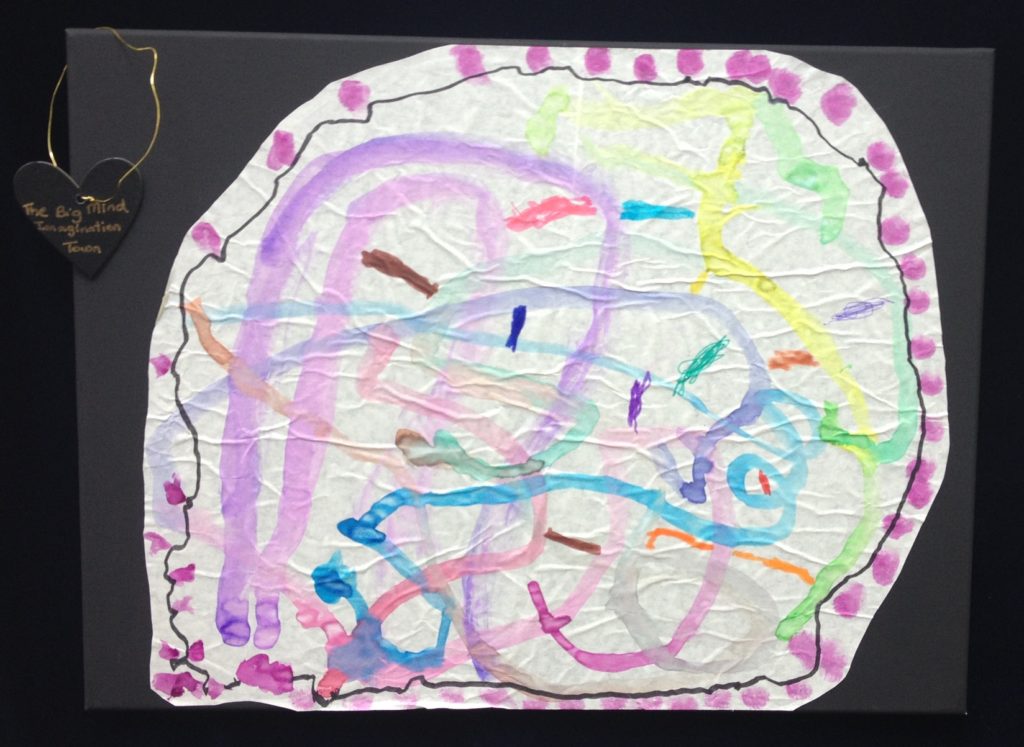
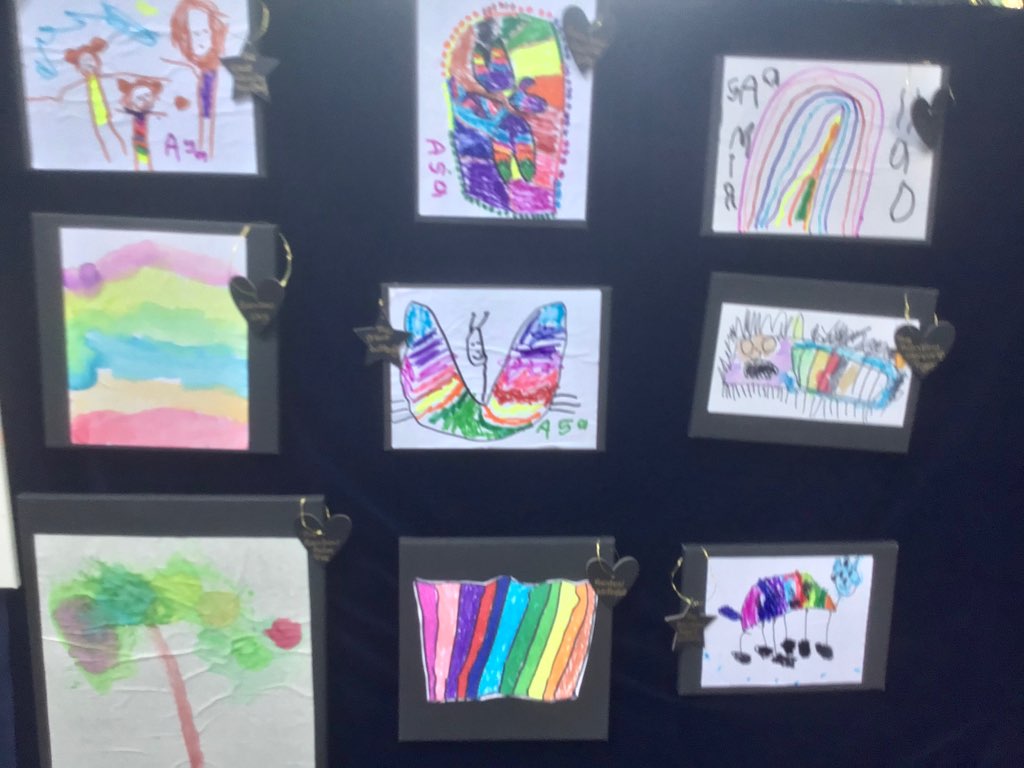
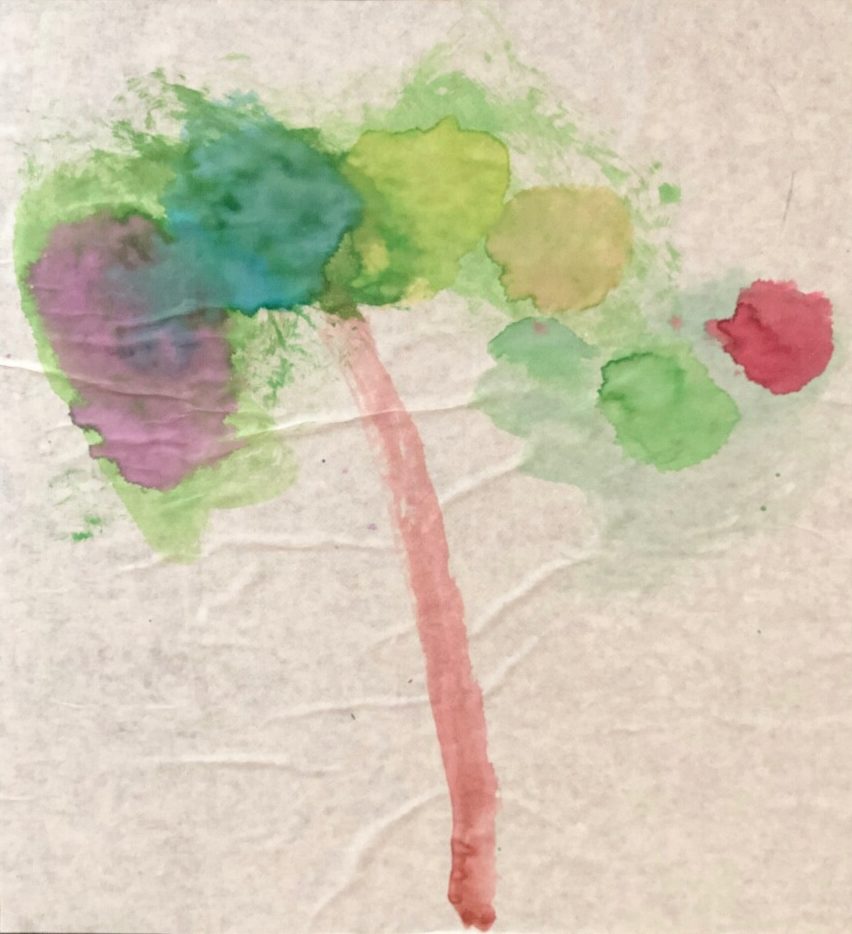
Kurt Schmidt, Fitzwilliam, New Hampshire
Sheltering in my home with my wife since March
Journal entry September 11
Our country feels as unsafe today as it did nineteen years ago on September 11, 2001.
Although dismayed at watching the tragedy of 9/11 alone at home that day, I didn’t feel the anxiety that permeated the voices of the TV reporters as they described the terrorist attack on the World Trade Center. Perhaps I’d lived too many years with my own demons to be frightened of the anonymous jihadists. It was with a calm voice that I described the course of events to my son when he arrived on the school bus and allowed him to see replays of the events on TV.
I wanted to assure him that God would keep him safe after we watched disturbing TV images of Islamic terrorists crashing planes into the World Trade Center in New York City. But I had no clue how God and terrorists fit together.
“Why did they do it?” he asked.
“I don’t know.”
“If they exploded a nuclear bomb in Boston, would it reach this far?”
“I don’t know, but I don’t think they have a nuclear bomb.”
“Why did those people jump off the top of the World Trade Center?”
On watching a TV commentary about the threat from chemical and biological weapons, he asked, “Do we need gas masks?”
I said there was no need to worry about things we couldn’t control. “Don’t worry. We’re going to be all right.”
“Why do the terrorists hate America?”
I felt then like the Englishman in the old movie Zorba the Greek, when Zorba asks him in a moment of agony, “Why does anybody die?” The Englishman says, “I don’t know.” Zorba says, “What’s the use of all your damn books if they don’t tell you that?” The Englishman says, “They tell me about the agony of men who can’t answer questions like that.”
Today I write about the agony of being attacked by another enemy — a pandemic that is ubiquitous.
Suzanne Iuppa, Aberdyfi, Snowdonia National Park, North Wales
Alone since March 23rd, I had not seen any family since December 25th
Journal entry August 31
The sand is very fine, a light creamy yellow, cool and a perfect dampness a few inches underneath, for building sandcastles. He brings his spade up, full of angel-fines, and puts it into his bright orange bucket. I am digging a hole with my hands big enough for him to stand in.
I show him how to level the top when it is full, with his spade. He shows me how to tip the bucket over — tap tap tap. It’s delightful to see the castle turrets, real in the air. And to knock them right over! To stand in a tunnel and let Grandma cover your feet, shins and knees; then to break the mold.
He has done this before. Perhaps once?
We decide it’s best for him not to wear his nappy into the ocean. It’s the warmest seawater temperature of the year. He shows a good respect, wanting to hold our hands to run into the waves. He watches the wet sand accept his feet and close over his ankles, with the real power to petrify. Then he runs across the breakers, shrieking. He knows to fling himself down in the magic strip where the surf is just coming in, and feel his whole body halfway between two elements. Above us, clear blue sky and it feels like last day of summer, but everyone is so aware of it. We are stealing it back for one day.
On a wide, wild Cardigan Bay beach, usually littered with a host of stranded jellyfish
— not a single one.
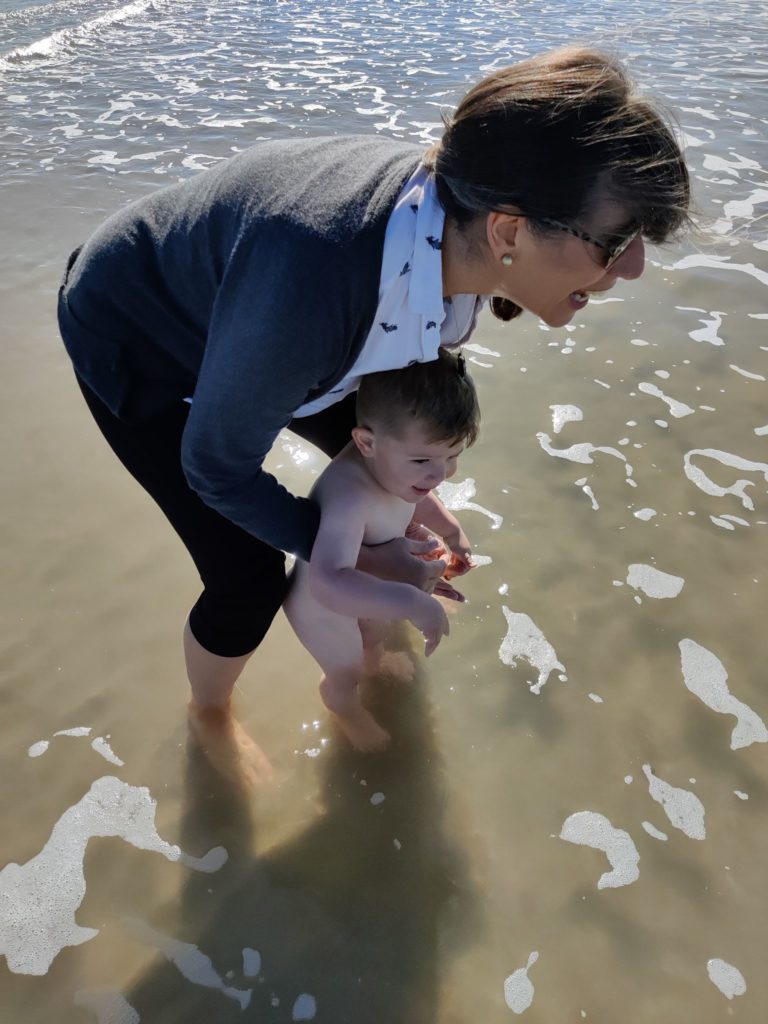
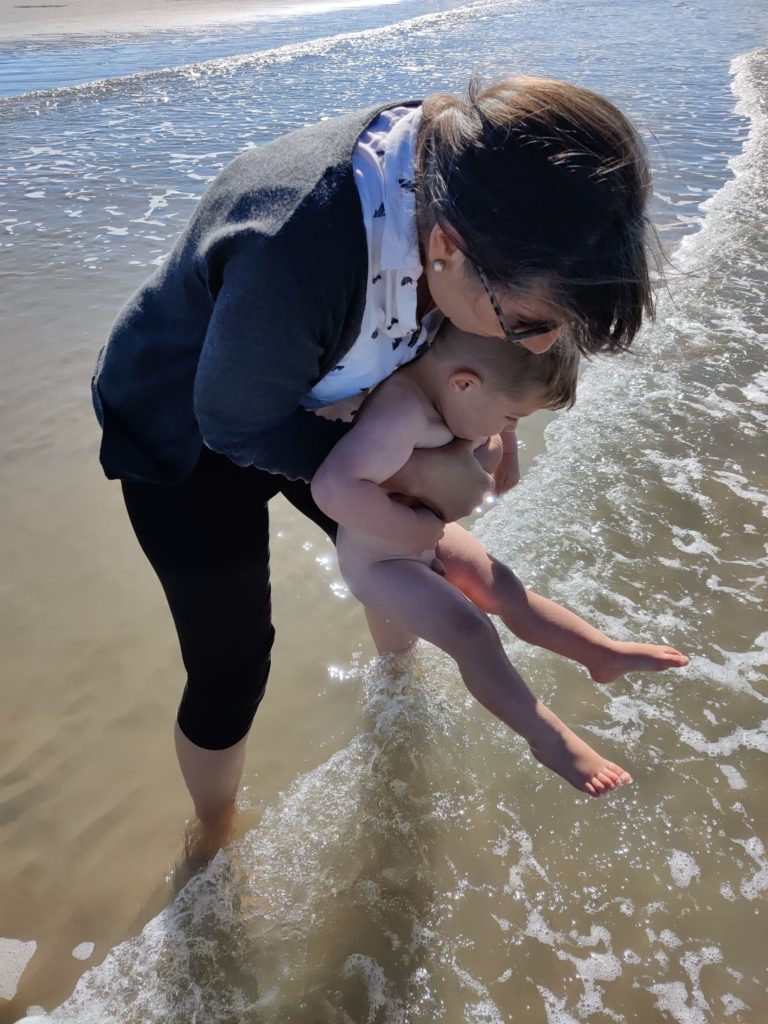
Katy Stanton, Westminster, Maryland
Journal entry September 9
Today is the second day of # Scholar Strike. Difficult to strike from my teaching responsibilities but I keep reminding myself that my abstinence from labor for these 48 hours is making a point — that I stand in solidarity with others for racial justice and against systemic racism in all its ugly forms. To focus, I rest in The Fire Next Time by James Baldwin, listen to the interviews of Isabel Wilkerson.
My college teaching until March was a joyful expression of what matters a great deal to me. I could live and learn with young people, so vibrant with their tattoos and neon hair and pronouns. I felt an adrenalin rush walking across campus, a place to explore creative ideas and indulge in deep thinking.
Then Covid hit, and I was told to prepare for online teaching in one week. My fun, part-time two-day-a-week gig turned into a 24/7 anxiety attack in front of the computer screen. No one seemed able to read instructions that took me hours to compose. Everyone had questions in my email Inbox. Students were in different time zones. Some who had loved class disappeared into cyberspace. The learning curve has been steep. Last Monday I set up a discussion forum for classwork, but students couldn’t access it. Those attending remotely wrote sarcastic comments in the chat and never turned on their cameras to show their faces.
I do not feel like I am teaching, merely surviving the pandemic and hoping to help my students do the same. I dream of a future where I will not worry when a student coughs or be afraid to read a thesis statement over someone’s shoulder.
For today, I am with my colleagues and students, on strike for racial justice, dreaming we will soon wake up to a better world.
David Etheridge, Phnom Penh, Cambodia
Journal entry July 28
Last night’s gecko droppings are on the desk—she eats dengue-infected mosquitoes, so fair trade . . . freaks me once a day darting out from under the bed. She doesn’t move quickly up the wall; she moves erratically.
*
Listen to old Zeppelin tracks and weep—the tunes take me back, take me don’t know where and I ache for lost time. How did I get from Kashmir to here?
*
For a Saturday there are fewer people out although all the street hawkers are there and BBK market is fully open. Most wear masks except Westerners. I don’t notice, so barge into the pharmacy, but on the way out I see that people wait outside to go in one at a time. Try to keep at least a meter distance, two if possible, but others don’t observe that protocol.
Temperature check at AEON Maxvalu Express, then a westerner is too close and I say, “Step back . . . please.”
“Oiy, I stand wherever.”
I don’t know where the line is between fear of Covid and careful of Covid. I’m a wear-a-mask-all-the-time guy. There are too many “que sera, sera,” insha’allah, “if it’s God’s will . . .”, and “I don’t believe it” folks wandering around. I’m not afraid of Covid . . . I’m afraid of people. And it finally happens—at Thai Huot I’m temperature checked and set off the alarm, 38C (100.4F). She stops me and I panic. “Where to buy food? Who doesn’t temp check?” And she holds the gun under the ceiling AC draft for a few moments, then checks me again and I’m okay. I shop here; she checks my temp. We know each other.
Sue Fagalde Lick, South Beach, Oregon
Sheltering in place for 6 months
Journal entry September 3
The weirdness gets old. I saw my ophthalmologist, Dr. Haines, yesterday. He pronounced my eyes “perfect.” At 68, that’s a relief. He did not say anything about the embarrassing moment when he came into the examining room and found me crawling on the floor looking for my hearing aid—which fell off as I was adjusting my COVID mask.
COVID protocol included calling from my car when I arrived, just like at the dentist’s and the veterinarian’s office. “Jeremy” told me they had a seat available in the waiting room. Half the tan chairs were blocked off. Exactly one masked gray-haired person sat in each section. Jeremy took my temperature (97.7) and handed me a pandemic questionnaire: had I been sick? did I know anyone with COVID? had I traveled anywhere?
After the assistants called two old ladies in, Jeremy scurried out with wipes to sanitize the chairs where they had sat.
When my turn came, the assistant led me past the inner waiting room where people usually wait and talk to each other while their pupils dilate. The chairs were shoved against the wall, the TV off.
The exam was quick, tense as I leaned my chin on the machine and Dr. Haines stared into my eyes. Usually he keeps up a constant chatter, but not this time. “Perfect,” he said. “Congratulations.” He offered an elbow bump, and I left, squinting in my dark glasses as I walked out into the blinding sun.
Rich Bates, Columbus, Ohio
Journal entry September 4
We are bored. I am growing weary of my own company. We are getting punchy. We are regressing to infantile behavior. Yesterday, Sharon complained of my not clearing the almond butter wad off the shared spoon I handed her to dip her own dollop of apple-wedge-smeared-nutty-delight so I chased her around the kitchen waving it wildly as if to smear on her smock! She screamed; I giggled. I am deranged! Sanity is becoming a casualty of this isolation.
I try journaling (ala Cameron, Way of the Artist and Progoff the Jungian) and grow numb with stream of consciousness idiocy. I try meditating without my Zen sanga and nap sitting upright. I read insightful tomes explaining the causes for the rise and devastation of this demagogue and nod off after 10 minutes.
I watch the birds flutter at the feeders and am mesmerized into catatonia. I am learning to distinguish the variety of bird calls of each species, but wonder at the shrunken life of a 15X20 foot condo patio vs. an 8 acre farmstead in the midst of thousands of acres of open farm ground and the half globe of an endless sky stretching to an endless horizon. But memory serves and I return to tiny but explosive things—a goldfinch watching me as he plucks a kernel from the feeder, chops it in half, letting the tailing fall while he tongues the remainder down his throat. A song sparrow splashes in the mini bird bath and then serenades me from the crab apple overhanging our fence.
The telescope collapses to the microscope but life still pulses. Maybe.
Patricia McTiernan, Arlington, Massachusetts
Journal entry March 22
I’m two weeks out from turning 60, which this year seems like crossing a chasm. The coronavirus is more lethal in “older people,” which is now defined as those over 60. (One study I read about tonight has “older people” as those over 50.) I also read
something about ventilators—that they will give them to people with labored breathing, and that the average adult takes 12 to 20 breaths per minute. I timed myself, and I took only 9 breaths for that one minute as I sat in my reading chair, fairly relaxed. Does that mean I’ll be in better shape should I get the virus or worse shape? Has 30 years of swimming several days per week strengthened my lung capacity? Or does the fact that I take an immune suppressant for an autoimmune disease mean I’m doomed? Does the fact that I don’t have children and grandchildren make me ineligible for a ventilator, should I need one? Or does my age work in my favor there, given I’m on the younger side of “old age”?
I know I need to stop reading. I need to make a schedule. I need to do so many
things. Life is going to change so drastically. I’m retiring, and the world should be my oyster—and I cannot leave the neighborhood.
When the sun shines, it’s like a beckoning to go outdoors, but then I remember: it’s
dangerous outdoors. Stay 6 feet away from everyone. Don’t breathe.
Susan Milord, Rome, Italy
Journal entry, March – August
I couldn’t see my Italian sweetheart for two and a half months. He works in IT for the Ministry of Health, definitely an essential worker. When we were finally permitted to see one another, I was nervous: what might he introduce from the outside world? “I don’t think you have to worry,” he laughed. “I work in what is probably the most rigorously disinfected building in the entire country.”
I occasionally teach conversational English. Two students switched to Skype lessons; a third, a dear neighbor who’s a lawyer, had just started working with me to prepare for an interview in English. We continued meeting in my home, taking all necessary precautions. We were, however, definitely breaking the rules. “If we’re caught, at least I have a lawyer to defend me,” I told him.
I feel for the many businesses impacted by the lack of tourism, but on my rare visits downtown it’s so delightful to see families enjoying all sorts of spaces that are usually packed with tourists. For a time, at least, Rome belongs to us, the people who live here.
These last two months I’ve managed to go out nearly every day. Mostly it’s to take a brisk morning walk, stopping at the outdoor market on my way home. Sometimes it’s to run an errand. Whenever I leave home, I have my mask on. In fact, most people wear masks when they’re in public. We’ve learned to smile with our eyes.
Lori Drawl, Cortland, Ohio
Journal entry August 15
I find it ironic that the pandemic hit in 2020, a numerically symbolic reminder that hindsight is 20/20.
I often find myself recollecting my deceased Grandma Helen’s painful tales of the plague from a century-ago. She was nine years old when the Spanish flu struck her family in the Appalachian foothills of Belmont County, Ohio. It was January 16, 1918, when her mother succumbed to complications from the flu just nine days after giving birth to baby Flora. Two days later, her maternal grandfather also died. Within the next year, her Uncle David died.
As the oldest child in the family, Grandma Helen found herself in the position of surrogate mother to her five younger siblings. Unfortunately, Flora died in August from the likely preventable ailment of “diarrhea”; however a child being raised solely by her nine-year-old sister probably didn’t stand much of a chance. Her father resorted to alcohol to cope and became an abusive tyrant.
A microscopic germ wreaked havoc on this family leaving emotional scars and lifestyle coping mechanisms that even affected future generations. Grandma Helen became a bit of a germ-a-phobe, sometimes bordering on hypochondria. As a child, I recall her over-protective nature and hypervigilance to exposure to any contagion, no matter how minor.
Grandma’s memories provide 20/20 hindsight to a cautionary tale. With clear vision, I don’t complain when asked to wear a mask, wash my hands, and socially distance. The consequences were very real in 1918 . . . and are again in 2020.
I decided to try to paint portraits while self-isolating. These are two of my grandchildren who live in Las Vegas (Liam & Bryce).
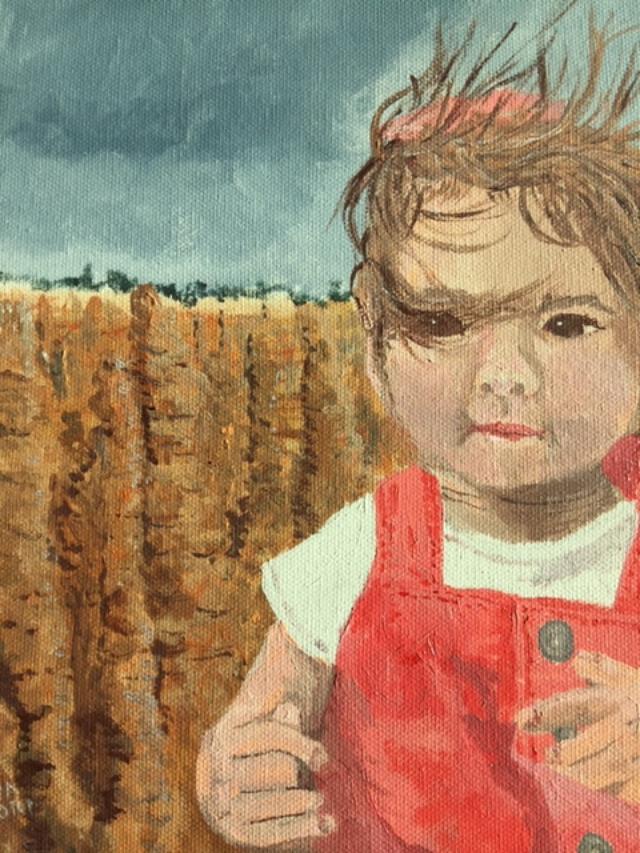
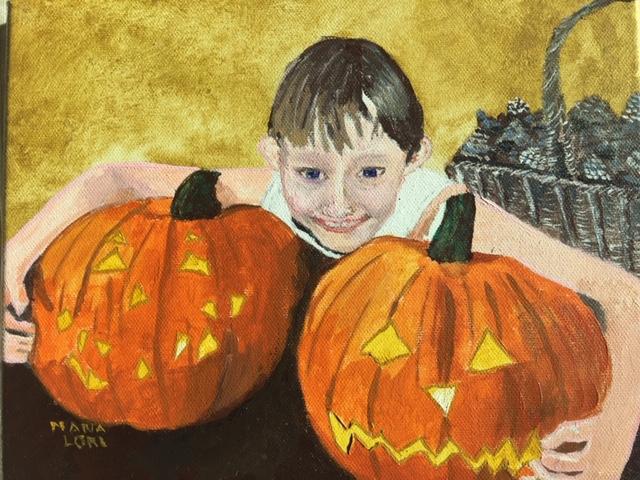
Diane Kendig, Canton, Ohio
Journal entry April 17
I have kept a diary for 60 years, since I was 10. We had gone to visit former students in Tennessee in March, returned home the 14th and have been sheltering in place ever since. I have created a “centering” ceremony for myself where first thing in the morning, I read a poem and respond to it.
Reading Lesley Wheeler’s poem “Energize”:
. . . how, lord
did I get to Boston
I drove theoretically . . .”
(from The State She’s In 2020)
. . . where she gets her mother out of the hospital, sets her up in an apartment, I think, how, lord, have I gotten back to Canton? Theoretically I flew in four times to get Dad into an apartment—and then I moved here.
And now the fallout of the Corona virus for me today is relief that Dad is not here for it. The first year without Dad, and for once, I am glad he did not have to live, not through this. If I had managed to bring him home, it would have been nursing beyond me, as I’m the world’s worst nurse. If my family had talked me into leaving him there, he would be medicated into submission by now, and I would be outside his window, sobbing.
And for me and my husband, home alone together, having survived in adulthood the deaths of one sibling, four parents, and a beloved single aunt and having been, each of us, the one lone family member there for each of those who died, we remain ready for whatever comes.
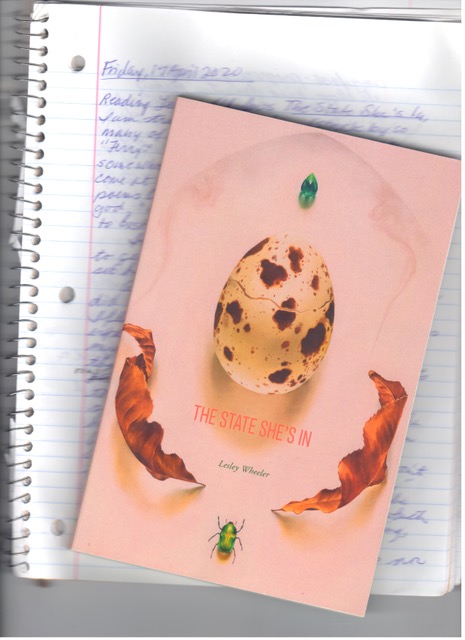
Marilyn Palasky, Summerlin, Nevada
Sheltering in place since March 17
Journal entry July 18
It’s 116 degrees on the thermometer outside the kitchen window, says Tom my resident ventilation expert. Really, he has certificates on his wall from his coal mine bossing days in Southern Illinois. When he says the AC can’t keep up, no more stove cooking or baking, I take note. The peaches are ripe; what to do when it’s too hot to cook?
It’s 126 degrees today in Death Valley just a little East of us . . . I think about the peaches which might be cooking themselves in the garage. Tom’s asleep at 9pm; before dawn is the coolest time of day for golf. I finished my re-write at 11ish after mentally romancing those peaches all day . . . reminiscing about the girlhood backdoor bushel of peaches left for my mom and us girls to can-em-all. Dare I make a pie?
July 19, 2020
My mom’s Audubon bird clock hooted midnight. I set the blanching pot on to boil, put the bowl of ice-cube water next to it, set the stove to 375 degrees—Ta Da—personal peach processing set to begin! Sweetheart, this is the essence of pleasure . . . to hold a Summer warm fuzzy fruit, plunk it into roil boil float, fork it into freezing cold water, slide its thin skin off with both hands. Then, place the whole slippery roundness in one hand while I halve it with the little knife in the other. The best part is slicing through the halved roundness in your palm: 8Xs half, 1X length. Zup. Pie!
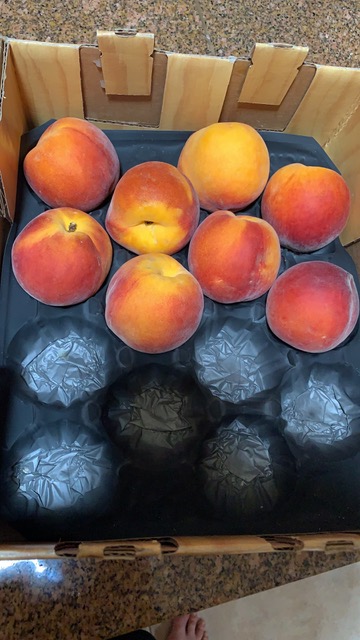
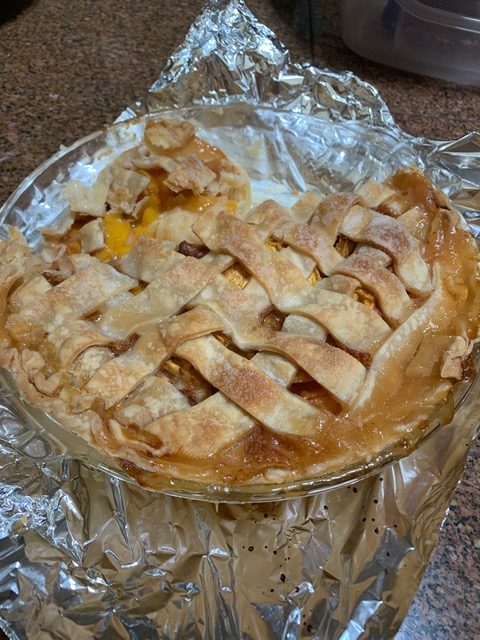
David Etheridge, Phnom Penh, Cambodia
February
[Prime Minister] Hun Sen says that he’d rather have Cambodians infected with the virus than anger the Chinese by evacuating students from Wuhan — “We will keep them there, so sorrow and happiness in any circumstance can be shared.”
Sreymom says, “What leader doesn’t look after his people?”
March
In BKK 1, [Phnom Penh community] Cambodian laborers and Chinese capital work through the night to build glass tower gardens like Shanghai . . . and you see a head-shaven barefoot monk in a saffron robe wearing a black face mask waiting for a tuk-tuk under a streetlamp . . . and in that flickering yellow light . . . he could be an extra in a zombie apocalypse movie . . . and you joke about him but he believes in something . . . and you don’t know what to believe these days . . . so you believe in nothing . . . And it’s like that.
April
Watched The Salzburg Connection, 1972 movie, and binged on 10 episodes of Gracepoint (aka Broadchurch ITV series) with Vanessa yesterday. Today it’ll be The Fall.
May
After Anyza’s illegal crossing into Thailand, she zooms into class from just over the border at Aranyaprathet.
“Thank you so much teacher for your good advice. Especially for your kindness when we have a mistake.”
Anyza’s pregnant and working in her shop. She asks about prepositions of place. She unmutes her zoom camera phone which is on the floor tilted up, and she’s in shorts and crop top, leaning in and out of the camera, and suddenly I’m a voyeur.
June
Monks are expert at cremating skinny Cambodians, but not so effective with thick-boned Europeans . . . your $500 goes only so far. On the third day you’ll receive your spouse’s ashes in a box and a Lucky Market bag with charred anklebone pieces. As part of the new entering-the-country Covid protocol, the Ministry of Health charges tourists for testing, quarantine, and $1500 for cremation if necessary, so no messy bits or plastic bags.
Julia Spring, Manhattan, New York
Three and a half months of somewhat lessening quarantine
Journal entry, July 31
There are tiny ants in the bathroom eleven stories up, and we have an onslaught of water bugs like never before. The pandemic is pushing against the air conditioning at the windows, and my sister-in law has gone downhill in every way since she entered rehab for a broken hip at the start of March and got trapped there by the quarantine. The Times has an article about how the City is now subtropical; the piece of ginger I stuck in dirt months ago sends out a shoot, proving the point.
I’m not really interested in dystopia but I have a sudden image of decay: Manhattan taken over by roaches, ants, reptiles; population decimated by Covid, TB, malaria. Kudzu, mangrove, other trees and creeping plants, cover the collapsed skyscrapers until all that’s left is gently rolling tropical jungle on my island, shrunken by rising waters.
Sue Abare-Gritter, Truth or Consequences, New Mexico
Journal entry, August 4
Retired. 25 miles from the nearest small town. Stay at home doesn’t impact one much under these conditions. Oh, the occasional trip for needed groceries and doctoring. Masks, yeah, in the car, in the truck, in the house and hand sanitizer too. Otherwise, oblivious to it all except for the intrusive news.
Last friend visit in March. No family in the state or even a nearby state. Phone calls vital. Anniversary today. Normal celebration includes going to dinner. Nothing in New Mexico has dine-in.
Ok, a bit of a lark and whimsy mixed, drive 120 miles to El Paso; stay in car, have our favorite steak dinner delivered curbside. Drive home, finish cooking on grill, celebrate.
Quarantine for two weeks because we left the state? Nah, never stepped on Texas soil. That should count for something.
Birthday in a few days. Found patio dining at a Las Cruces fav. Today’s temps, 100 plus, no end in sight. Sigh. Reservation made.
Adapt.
David Rock, Rexburg, Indiana
Journal entry, March 27
When this is all over, I wonder if we will have learned anything. I have certainly given more thought to people whose jobs have disappeared altogether or have become less secure. Come to find out, there are a lot of people who depend on face-to-face interaction for their livelihood. I have found it inconvenient having to learn how to conduct my face-to-face courses via teleconferencing and having to create electronic versions of exams I would normally just print out and hand to the students. But I’ll bet it’s a lot harder to figure out how to give haircuts remotely. Do you think we will have suffered enough, individually and as a society, to be permanently changed—hopefully in positive ways—by this experience? I used to laugh about my grandmother’s extreme frugality. I suppose it’s because she lived through the Great Depression, but she wouldn’t waste anything: when she came to the end of a box of cereal, she would pour the crumbs into the new box. My mother used to save bread crusts in a can in the cupboard to use later as a meat extender in the meatloaf. She would also save bacon grease in a jar to cook with. That all seems pretty funny, but now I have learned that I can wipe out the microwave, wipe the salami grease off of my fingers, wipe out the cat’s water bowl, and blow my nose—all with a single one-third size paper towel.
Mary Fontaine, Dahab, Egypt
Journal entry August 3
For the last three years, I’ve been living in Dahab, a Bedouin town on the southeast coast of the Sinai Peninsula. Here, there are no masks, no lock down, no physical distancing, no information. The coronavirus must be here somewhere, but officials aren’t talking, and people go about their lives as usual. It’s like we’re not in the world. In Cairo and major Egyptian cities, 10 hours from where I am by car, 90,000 people are infected, so I fear it’s just a matter of time. One day everyone here might just drop dead.
I read and watch the US news in despair, deeply depressed by the devastation there. So far, one friend has died, and another has been very sick for two months. I’m worried about my daughter in CA and my sister in SC, but flights home are infrequent, so I couldn’t get there even if it were safe to travel. I’ll have to continue to watch this disaster film from afar, fearing for family, friends, and people throughout the country and fervently hoping the election will remove the incompetent and seemingly uncaring government responsible for the widespread suffering.
David Kopelke, Queensland, Australia
Journal entry August 5
The main resurgence of COVID-19 is in Melbourne. This is about 30 hours by road from us and two states away. Despite what Trump has said, Australia is not “devastated” by COVID-19. Yes, there has been a 500% increase in infections; but Australia was recording only a couple of cases a day and we are recording now over 500 a day. So, I guess it is accurate to say that we have had a 500% increase. However, when compared to the US, this is still not a lot. We are currently recording about 11 deaths a day.
Unfortunately, some Australians are getting very tired of the whole thing and we are starting to get more and more people not taking the issue seriously. Victoria, the worst affected state, has around 800 cases in lockdown yet the police found over 300 were not in quarantine. This is been why there has been such a jump in the number of COVID-19 cases. Our governments are taking the matter seriously with lockdowns and border closures put in place.
My state had three people go to Victoria, party, then lie on returning to Queensland. They all caught COVID-19 while in Victoria. They are now facing AUD20,000 fine and up to 5 years in jail. Unfortunately, many of those who are breaking quarantine have missed out on government financial support. They are lowly paid and if they don’t work, they have no money to buy food so they go to work even though they are sick just so that they can feed their family.
This week, the government introduced paid pandemic leave to address people working while sick.
Although only a small group, there are some who are critical of the steps that the federal and state governments are taking. The mostly right-wing media gives high-profile to those who like to attack the rules such as having to wear masks or stay in quarantine. These people use scripts direct from the US claiming Magna Carta and other ridiculous legal bases for not having to follow the law. They haven’t even bothered to change the measurements to metric when arguing and use American language.
I loved my time in the US. You are so fortunate to have such a beautiful country (and green, it is so tiring everything brown and dead) and I found the people lovely. This was despite knowing that so many were carrying guns and would be just as happy to shoot you as say hello.
Dian Seidel, Chevy Chase, Maryland
Recently returned from Pathumthani, Thailand
Journal entry March 1–August 1
March 1: My husband and I are eager to return home after a stint teaching together in Pathumthani, Thailand. After restocking the pantry and sorting through mail, we rush to visit family, then arrange get-togethers with friends.
Two weeks later, we are caught up in the pandemic. Only essential businesses are open. Our dates with friends become phone calls. In public, people maintain “social distance.” No one hugs or shakes hands. Instead, some Americans adopt something like the Thai wai greeting, palms joined at the chest, head bowed. Thailand issues similar stay-at-home orders. Schools close around the world.
In summer, the coronavirus rages like wildfire across America. It’s unclear whether students will return to class in fall. But Thai schools re-open on July 1. We see photos of our kindergartners. Their school uniforms now include masks and face shields. Only two students sit at tables meant for six, but every child is back in class.
The first case of coronavirus detected outside China was in Thailand, but the epidemic is not out of control there. Scientists don’t yet understand why. Maybe the widespread use of masks, maybe the tradition of the wai, keeps germs from spreading. Or maybe it is just good karma. In America, normal activities are suspended. We spend every day together and rarely leave home. We have time to spare. Time to remember Pathumthani.
Ellen Reichman, Kirkland, Washington
Sheltering in place for 151 days
Journal entry April 15
Maya Angelou—“Hope and fear cannot occupy the same space. Invite one to stay.”
I choose hope. I must say though, it doesn’t seem very hopeful right now. I am one of the fortunate ones. I’m not alone. Jim and I have each other. And our dog. But we are of age. We do have underlying health issues. So, we remain in our cottage. Except for walks. The store. That’s it.
Last night I dreamt I saw my son and grandkids. They were behind a sheer curtain. I ran to open the curtain, and when I did, they were gone.
When will I ever see them? Here I am in Seattle. There they are in Washington DC. Will it be safe to fly? I don’t even see my daughter who lives close by. Distance.
At 71, my days are precious. Kind of like dog years. Each day is like 7. And, for my grandsons, 5 and 8—each day is also like 7. As they grow. And change.
My older grandson wrote us a letter. In the mail. He said he wished he could transport himself to our house. I framed the letter. My heart is cracked wide open.
But I still have hope.
Johan Fremling, Uppsala, Sweden
In Sweden we have had a little different approach than many other countries.
Our instructions are that people over 65/70 years of age should keep away from other people. We all have to be aware and keep distance from our fellow citizens.
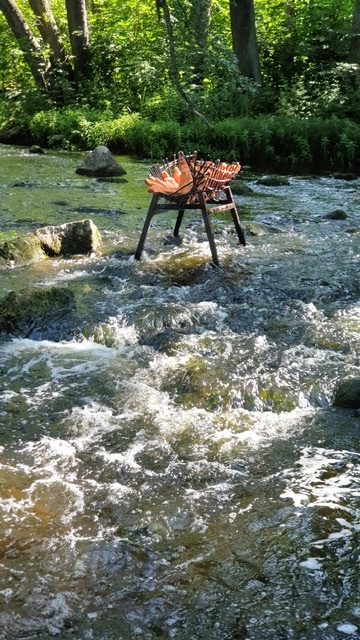

A crazy world. A lost ship. A ship without control. A ship with no captain. A ship crowded with the fools in charge of the world for the moment, Trump, Putin, Orbán . . . A ship without contact with the ground, the water. A ship with no engine or sail, no steering wheel, no direction. A leaky ship that not yet has reached open water, so we still have time to change the direction. Yes we can!
Barbara Kivowitz, San Francisco, California
Sheltering in place since March 15
Journal entry July 27
I want to be twenty-five again. Not that this was a great time. I was confused. I had no clue that I was beautiful and intelligent. On a good day, I thought I was nonexistent.
I want that freedom to doubt that things weren’t likely to get better. Now I know they’re not. I want that young skin and black tar hair. I want more time.
I want the Beatles to get back together. I want to live in Laurel Canyon and be the only one Joni will really be friends with. I want to be Van’s brown-eyed girl.
I want to still be precocious. I want to be discovered. I don’t want to wait any more for the night watch to find my decaying body.
I want to eat everything and not gain weight. I want to leap over mountains and crack my head on the sky. I want both to fly and to be invisible. But if I had to choose, I’d choose invisibility. I already know it so well.
I want to go back and hug my dogs again. And follow them to the end times.
I want the parents I never had. And I want to tell the ones I did have that I get it, now, I really do. Thank you.
Thank you to every molecule and vapor and gene sequence that makes me yearn to start over again. Because that means that in this life, I really did learn something.
Julie Gardner, Bainbridge Island, Washington
Journal entry August 1
Dear John,
Today, a teaspoon jammed the garbage disposal. No power. I felt underneath for a reset button. Couldn’t find one. Unplugged it. Tried again. No power. Enough already! My mind raced. Should I get a new one or get rid of it? Either way, I’d need a plumber. Who? How long will I have to wait?
I always think of you at midafternoon coffee time, the way you started that ritual for us on your first day of hastened “retirement” due to the side effects from chemotherapy. As I sat sipping, something told me to find the reset button. I put on my glasses, got up, turned on the light, found the red reset, pushed it, then flipped the switch. Power restored. Thank you. Perhaps loving nearness is always here—if I pause and take time for it, for you.
I often need to hit the reset button. I’m guessing I’m not the only one. A few weeks ago, I sat on a curb with a mask on, far from the people at the Farmer’s Market. I enjoyed the music and memories of being with you, family and friends during your last Saturdays. I wrote and recommitted to life and love.
Resetting my life without you hasn’t been easy. I’m doing okay. I have a small pride each time I conquer things I leaned on you for, and I miss having someone to do life with. Coffee with you reminds me, I’m alone. And not.
Judith Krummeck, Baltimore, Maryland;
ex-Cape Town, South Africa
Essential worker since March 18, WBJC broadcaster
Facebook journaling
3/18
Radio, apparently, is “essential” work—who knew? Certainly not me, until I was exempt from the governor’s stay-at-home order.
4/18
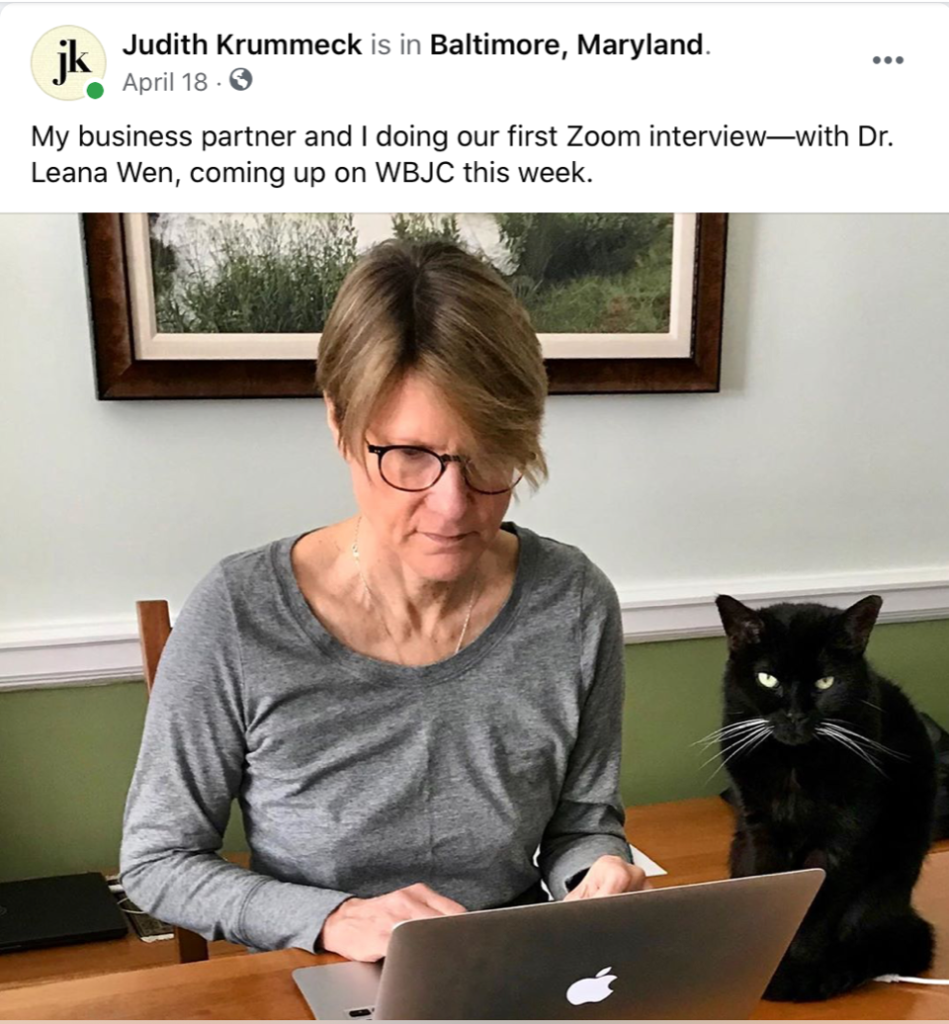
4/26
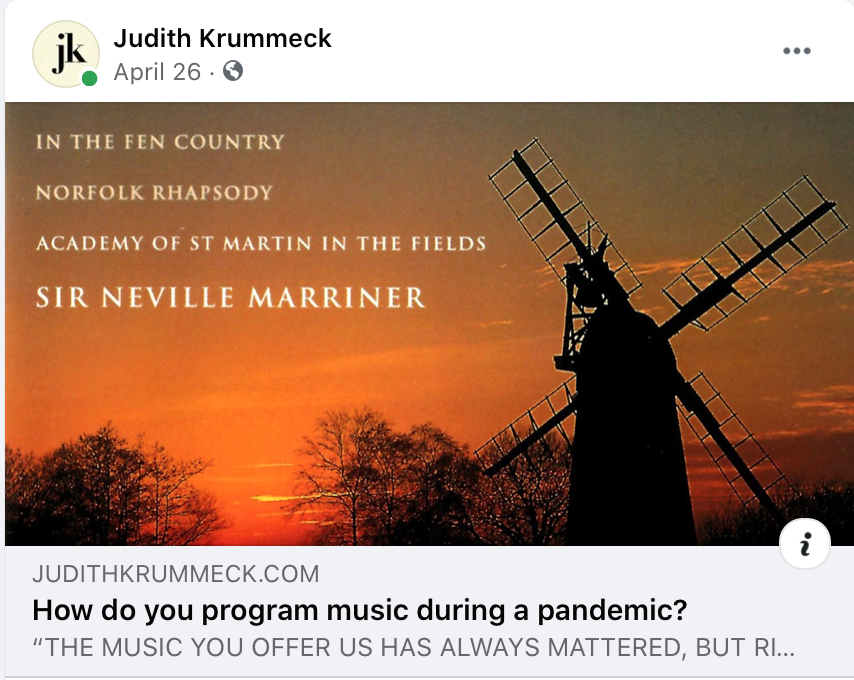
“. . . Whether consciously or unconsciously, our music choices reflect not only who we are, but also the times in which we collectively live . . .”
4/29
When you pop out of a door unexpectedly with the lower half of your face obliterated by a mask and the surprised passerby says, “Hello, lovely!” you can only think, “Bless his heart.”
6/14
I’ve accepted the challenge to list 7 books that I love—and I’ll make it audiobooks from my commute during the past year #Librofm
1. The Ninth Hour — Alice McDermott
2. Circe — Madeline Miller
3. Testaments — Margaret Atwood
4. The Dutch House — Ann Patchett
— And, in the time of Corona —
5. Mythos: The Greek Myths Reimagined — Stephen Fry’s singular take on mythology is an escape from the frightening reality of the pandemic
6. The Other Bennet Sister — Janice Hadlow’s alternative ending for Mary gives me hope
7. The Long Petal of the Sea — As they try, too soon, to end the stay-at-home, Isabel Allende takes me inside the chaos of Spain’s civil war and Chile’s military junta
7/14
I’m luckier than most. I get home feeling like a germ bomb—and spend the next twenty minutes washing my hands and mask, and cleaning my glasses and iPhone—but at least my life hasn’t blurred into a shapeless timetable of forgotten Zoom days.
Nicoletta LaMarca Sacco, Roscoe, New York
Journal entry July 22
Our adult son, diagnosed with autism at 2, now 22, is sheltering with us. In self-quarantine, after so many years struggling, it’s a strange new respite.
There have been advantages to the quarantine.
“Mom, I just wanted to say I enjoy talking to you while I’ve been here with you and dad.”
Be careful what you wish for, as our son articulating this was a shock. My mouth might have stayed open for a couple of beats.
“Mom, while I’ve been here with you, I’ve been wondering what my chemical cocktail does. I don’t want to be robbed of my dignity anymore, so I asked the psychiatrist. Just throwing meds at me like spaghetti at a wall isn’t effective.”
I could have fallen off my chair hearing Sonny’s self-advocacy. A first.
“After all, there is no cure for autism.”
He has a photographic memory, and can be tortured by repetitive thoughts playing like a tape, he says, looping over and over. He explained exactly why he found the overall approach to be a sham.
I’ve never felt more proud of him. Bravo for standing up for yourself, explaining your needs to the doctor, and grabbing the autonomy you deserve. You grabbed what’s yours. Bravo.
Sarah Merrow, Baltimore, Maryland
Journal entry July 16
Our Baltimore rowhouse has been comfortable for sheltering at home; the connected houses on this block are several rooms deep, but only 16 feet wide. All have covered front porches separated by sturdy railings, so physical distancing is easy to accomplish without awkwardness or apology.
During our enforced isolation I’ve been learning to play the ukulele, and last week decided to get a little fresh air and play on the front porch. I quietly strummed and hummed, thinking I was alone. But after finishing a tune, my neighbor Jim popped his head around the corner of his rocking chair and said “that was lovely, thank you.” A few minutes later a young woman two houses down called out “I enjoyed that. I could play the bongos with you!” She introduced herself, then clarified that she didn’t actually own a bongo drum, but that she would buy one in order to play with me on the porch. We had a good laugh over that. She continued, “and this is my friend, Noelle. She is too shy to say hello, but she is learning to play the kalimba!” “That’s a thumb harp, right?” I asked. “Yes, it is!” came the answer, and together we realized that with Jim’s sweet singing voice, a ukulele, bongos, a kalimba, and maybe a glass of wine, we had the promising beginnings of a pandemic porch band.
Darwin Curtis, Potomac, Maryland
Journal entry, sometime in April
There is much talk today about the negative effects of isolation; about the human need for companionship. About the third day of my time in solitary, I began wondering how I might counter that negative effect of isolation. My first initiative was to try talking to myself. But I found myself quickly numbed by boredom. At the end of my second attempt, I realized I had gone sound asleep for half an hour.
I ran through a mental list of creatures who might keep me company, all of which bellowed or barked or snarled or bit. Then I hit the gerbil. Referring to Google, I read that “gerbils are very social animals who need the company of their own kind in order to be happy.” I wasn’t up for a morose gerbil and I certainly wasn’t ready for mingling with a pride of gerbils, even jolly ones.
On the same page, Google offers the thought that “Hamsters definitely can be friendly and enjoy the companionship of their owners.” I knew hamsters to be good listeners, which is unusual among vertebrates. But loquacious? Would I want to acquire a maybe binge-eating hamster without much to say? Or which mumbled? And Google adds: “There are hamsters who . . . make it clear that they prefer to be on their own.” I had second thoughts.
As my isolation deepened, I remembered that when I was a little kid, my Aunt Mary Claire had given me two goldfish in a small bowl. In my mind’s eye I could see them belly up and floating. But that was an idea: fish. Well, there was the question of common interests. Fish do seem to enjoy eating fish which are smaller than they are. I, too, enjoy eating fish which are smaller than I am. Beyond that, I could not identify significant areas of rapport. And what does one do with the fish when it’s time to clean the aquarium? Fish? No.
A couple of weeks further into solitary, I reopened the subject after asking myself, “Who was that furry old gink with the white beard I just glimpsed?” Maybe, I thought, he’d like to chat. Then I remembered that, at the beginning of my auto-incarceration, I persuaded myself there was no reason to shave. I had just passed a mirror. That furry old gink was me.
Rim Chon, New York City, New York
Sheltering in place for 70 days
Journal entry May 20
It’s been tough being culinary challenged and quarantined at home alone. Trying to figure out what to eat, breakfast, lunch, and dinner every single day is exhausting.
I’ve rediscovered cottage cheese. It’s delicious and one big spoonful does the trick for a quick hunger fix. I’ve had baked potato as dinner more than I’ve had in the last decade. Instant ramen used to be a treat. Now it feels depressing.
And grocery shopping for food? Forget about it. During my tri-weekly grocery trip, I come home with random items that don’t add up to anything, like a bunch of scallions because I saw an Instagram post about re-growing scallions in a glass of water using the chopped down roots. Now it’s a race against time to eat the bunch before they wilt in addition to the fast re-growing new scallions. I put scallions on everything I eat. Scrambled eggs, fried rice, even on my spaghetti. Bought one avocado, which was carefully monitored for four days. After checking the internet and several texts with my chef sister, it was turned into an avocado toast, topped with scallions.
A triumphant culinary day.
Debby Kaspari, Norman, Oklahoma
Sheltering in place since early March
Journal entry July 7
I’m keeping track of my pandemic experiences with a series of “Quarantine Pantry”
paintings. They depict whatever it is I’m hoarding or craving or obsessing over, and
they’re rendered in soft pastels and presented as formal still lifes, side-lit on a blue
cloth with a black background.
The series includes bottles from my craft cocktail obsession, a package of ramen
(our pantry is stacked with cases of it), chocolate bars and sweet potatoes, canned
garbanzo beans to commemorate the week I discovered aquafaba’s magical
meringue-like properties, a bag of flour that for a while was worth its weight in gold
on Amazon, and 5 tomatoes and cucumbers from a victory garden we compulsively
planted across every inch of our small yard. And, of course, the leading index of
COVID-19 anxiety: toilet paper.

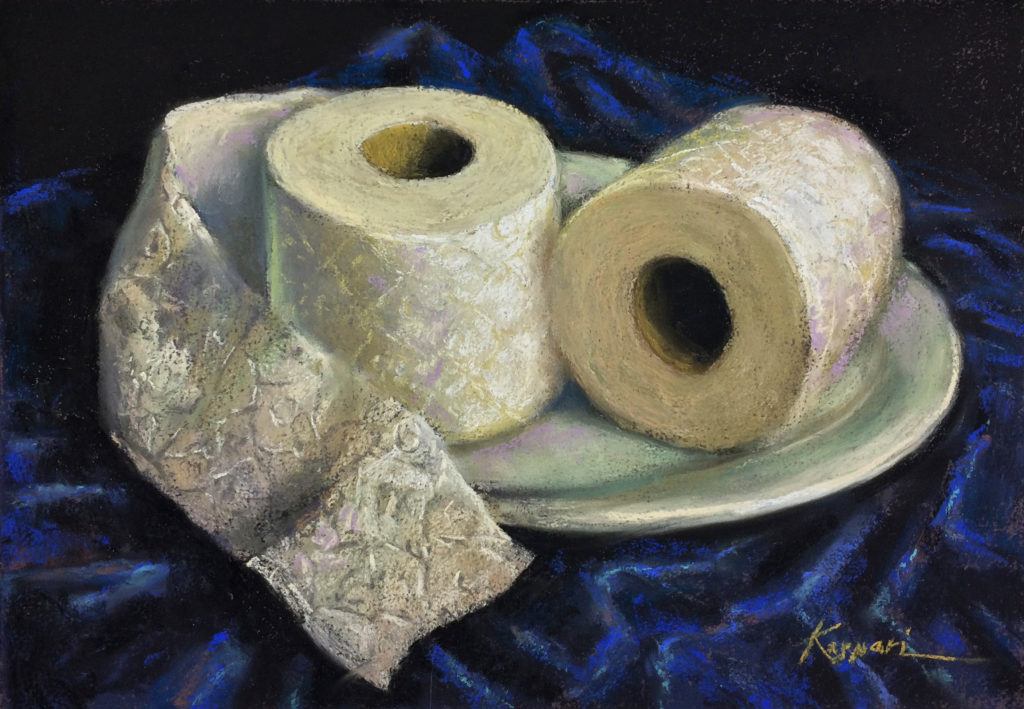
Julie Nelson, Iowa City, Iowa
Sheltering in place since March 13
Journal entry July 13
Woke up dreaming. We were in a bakery. No, it was a restaurant, a close space, completely packed with people bumping into each other, could not get away. Did not have a mask. A horrible image in the dream of dead faces in the garbage cans, waking with a start. All day, memories came to me. A moment, a person, some small happiness from long ago. Mom in the gardens by the Cathedral wearing her kerchief. Swimming out to picnic rocks. Walking in a blizzard in Burlington, laughing so hard we could not see. Riding bikes in Rock Creek Park. The morning I drove to work down Connecticut Avenue on 9/11, me singing with radio on, windows down, the radio host that September morning changing our lives forever with the announcement of the Twin Towers as our lives are changing now. Riding the double decker bus in NYC in 2012, on the upper deck, the city streaming by as we coasted past the Flat Iron building, Macys, all over Manhattan Island until without realizing where we were the bus stopped by the church near to the Twin Towers, turned into a memorial, and though we hadn’t meant to we got off at the stop. Dust coating the air of the chapel, still. Wept at photos in the museum, all the people we lost then, (are losing now). Saw name of a college friend who died in the South Tower that day, etched in marble. How I never knew.
Dick Klenk, Westerville, Ohio
Sheltering in place since March 15
Journal entry July 12
My grandson Aidan has played baseball tournaments the last 5 consecutive weeks starting June 11th. All have been in Central Ohio, mostly within an hour’s driving time. Games have been on varying starting days, as early as Tuesday of a week, and going into Sunday, depending on their success. They have won 1 tournament and played in the championship in 2 others.
Of their 27 games, I think I have seen 24 or 25. It has been a wonderful change from “house arrest”!!! Our craziest traveling was driving from Lakeside, where we were staying for a while, to Chillicothe—about three hours and 45 minutes. Games do not draw crowds of any size, primarily the same cast of characters—parents, grandparents, & occasional unwilling siblings.
Social distancing—mostly
Masks—sometimes
Outdoors—yes
Hot—for sure.
All in all—WONDERFUL!!!!
As one of our friends said recently, “you guys have had a lot of dashboard time since mid-June.”
Ken Felt, Phoenix, Arizona
Sheltering in place since March 13
Journal entry June 24
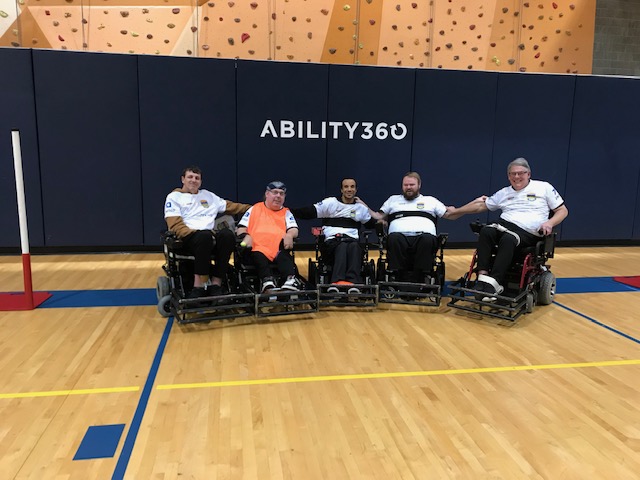
I should be in Ft. Wayne, Indiana, now at the National Power Wheelchair Soccer tournament playing for United power wheelchair soccer team.
But that tournament and all the soccer practices since March have been cancelled because of Covid-19. This was the first time in my life that I ever participated in any kind of organized sports team. At 71, I joined this soccer team and although I am its oldest player and certainly not the best, I found myself incredulously the most physically fit. Most are quadriplegics, have muscular dystrophy and need to be lifted into the soccer chairs. I don’t. Yet.
I raised the most money to get the team there and now here we are. Landlocked.
United had a slim chance of winning anything. But this would have been my first national tournament. My Indiana Phi Delta Theta fraternity brothers were planning on being there. So were my grandchildren, my daughter, son-in-law, niece and sister.
Today, instead of being in the thick of tournament fever, I spent the morning washing poop out of our little dog’s long matted hair. He and I have missed our grooming. Maybe I can keep growing my hair and wear it in a ponytail for next year’s tournament.
Eric Steiner, San Francisco, California
Day 102
Journal entry July 1
In my former incarnation Mondays came much too soon, too frequently. Vacations were never quite long enough. So many books, so little time. Be careful what you wish for.
Now Mondays are indistinguishable from any of the other days. Vacations consist of leafing through old travel diaries. Books are piled higgeldy piggeldy, mostly unfinished. If I get desperate there’s always War and Peace.
I’m required to stay at home. But life isn’t bad. My apartment is bright and cheery and I’ve hunkered down in worse places. The people in my building slip notes under my door offering to run errands, do shopping and just be there if needed. Maybe it takes a crisis like to restore a sense of community. I hope it lasts long after coronavirus is gone.
I do watercolors, crossword puzzles. I move tchotzkes and pictures. What I do is not socially redeeming or morally uplifting, but neither were the things I did prior to this New Normal.
Earlier I had a video visit with my doctor. Couldn’t do that when the Black Death was the Pandemic du Jour. A triumph for technology, but just a little bit frustrating for both of us.
As Adam may have said to Eve way back in the Garden of Eden, “Eve, we’re living in interesting times.”
Paul Rousseau, Mt. Pleasant, South Carolina
Sheltering in place since mid-March
Journal entry June 30
I don’t know her whereabouts, the last fourteen years obscured by distance, physical and emotional. Nevertheless, I text her each year on her birthday and on the anniversary of her mother’s death—the fourteen obscured years—with no response. Still, I squint at the pixeled screen and hope. Give her time I’m told, “She’ll come around.” So I’ve waited. However, the pandemic has added urgency. I’m seventy; I may not have the time.
Dorothy Rossi, Louisville, Colorado
Sheltering in place since mid-March
Journal entry June 30
In the backyard a robin glides gracefully on his path. My reaction is to ponder about life’s mysteries, meaning and purpose. There is a nest nearby. What this means for the robin, I do not know. For humans we await new life with dreams, anxieties, hopes and fears. Not known for living in the moment, our world of present, past and future frequently collide.
The robin builds his nest, takes care of his young, and travels within his range. This bird awakens hope in my scarred soul no matter what is happening in my world.
Molly Jones-Quinn, Rockville, Maryland
Sheltering in place since March 14
Journal entry July 1
Welcome to Ingleside at Rock Creek, where the Covid 19 lockdown has given us unusual opportunities to travel . . . on Zoom. With the prospect of the forced cancellation of our semi-annual Spring Poetry Reading, we poets had to find a way to salvage it. We oldsters weren’t exactly sure how to use Zoom, but an enterprising staff member quickly figured it out. And for those residents who were not active computer users we found it was possible for them to call in and participate on the telephone.
One of our most prolific poets had recently died. The opening poem (Our Friends Have Passed Away) gave way to a man’s deep voice reciting two of Tom’s favorites: Psalms and My Furniture. We imagined him joining us from heaven! That was the longest trip we imagined, but several of our residents who had been traveling when the lockdown was announced, joined in from places as far away as northern Michigan and the Hudson Valley in New York state. Our attention ranged from the sublime (Fourteen Ways of Knowing God) to the ridiculous, a meditation on Weeds. After assuring ourselves that we are The Very Model of Social Distancing, we Zoomed off to our Zumba class . . .
Fiona Jones, Dunfermline, Scotland
Lockdown beginning to ease after 3 months
Journal entry July 2
Family conversations in lockdown be like: “So where did you go for your Covid walk today?”
(Covid Walk, noun: The single daily outdoor walk from home, as permitted by UK government during COVID19 lockdown.)
“I went up the hill northwards—and guess what I saw! A tree like a city: everything lives in it.”
So from then on the tree has a name: the City Tree. A metropolis of busy thriving life within its roots and trunk and asymmetric branches. A tree that’s been treeing for centuries, long enough to stand there treeing the rest of the trees how to tree.
We’ve seen more trees in Lockdown than in the twenty years we’ve lived here. Birch trees, white-barked, light-foliaged, airy. Oak trees, slow-growing, late-leafing, in attitude more fighter than dancer. Horse chestnuts unfolding bat-wing leaves and blossoming like candles. Beech trees, so thick-canopied there’s little but mosses and mast underneath, yet full of holes and niches and food-chains of crawling life. The City Tree is a beech.
Trees are comforting presences: old but not garrulous; alive but never demanding. You can heal, you can dream, you can think under trees, and envision the World After Lockdown Ends—what it should be like. I think we should fly less, buy less stuff, spend less time travelling, more time walking outdoors. I think we would live longer, breathe better that way.
The trees told me this, and they ought to be right. They’ve lived long enough to tell us how it’s done.
Martha Strom, Brooklyn, New York
Sheltering in place since March 16
Journal entry June 26
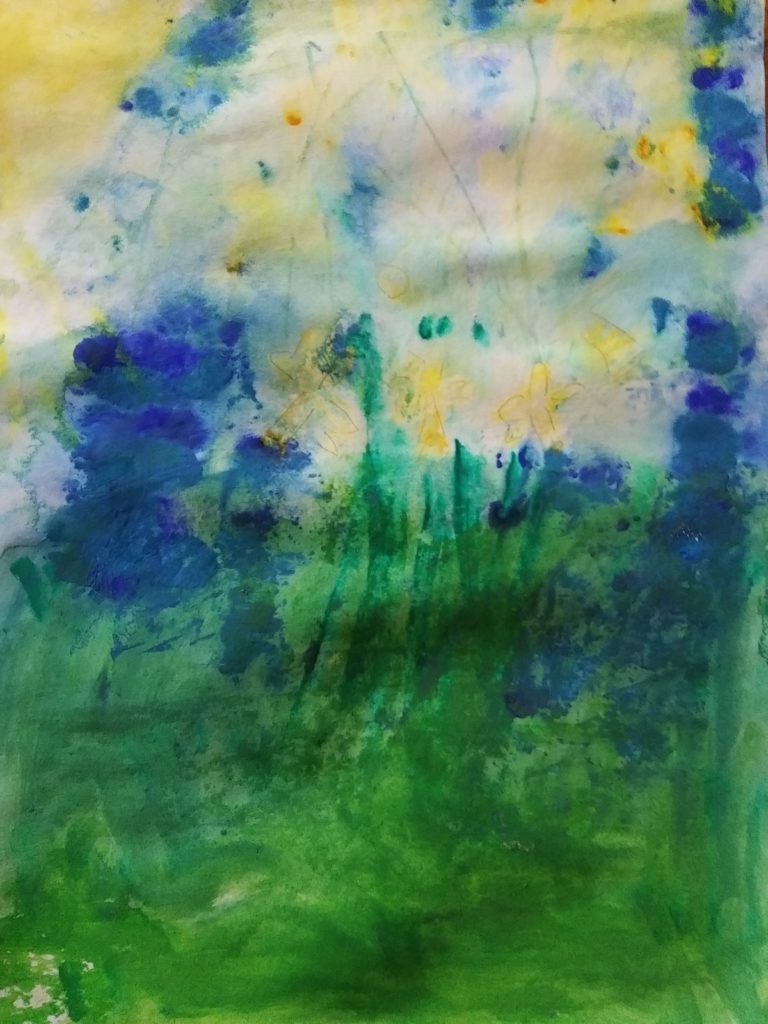
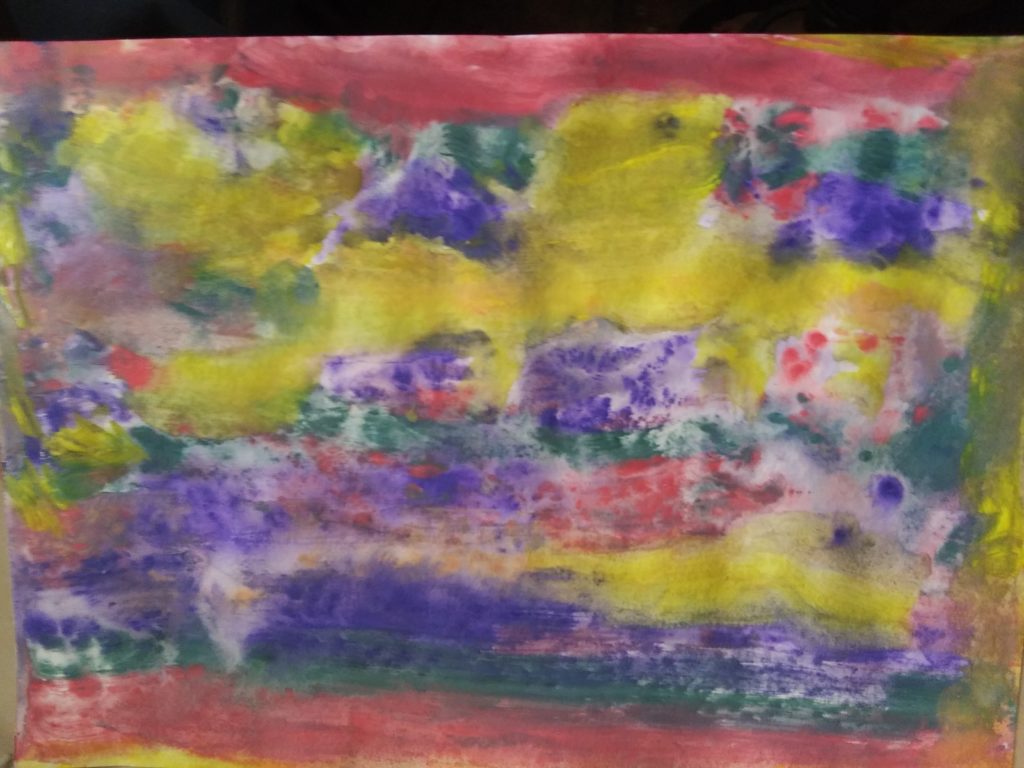
I have been keeping a journal as I always do; however, my artwork feels more like it has been done on the wings of incarceration. In other words, I have felt glad for the way this pandemic has forced me to turn inward.
Susan Felt, Phoenix, Arizona
Sheltering in place since March 13
Journal entry June 17
Amanda and Michael and the kids are back home. We all survived.
When Michael called in April to “explore” the possibility of coming to Phoenix to escape Chicago during this global pandemic, our tepid “of-course-we-would-love-to-see-our-grandchildren” response revealed the conflict that rumbled beneath.
First, there was the 28-hour straight through drive he was suggesting. Our seven-year-old grandson has rheumatic heart disease. He’s as high on the vulnerability list for Covid-19 as his wheelchair-bound 71-year-old grandfather. We’d been isolated in our home since early March.
Then what about those public bathrooms? Roadside “nature” stops. Eating? Car trouble? Falling asleep at the wheel come hour 18? Quarantining for two weeks once you get here?
Our daughter. Our son-in-law. Our grandchildren. We live for our visits with them.
But this time, it was hardly, we can’t wait to see you.
He painted a compelling picture. When will we ever have this opportunity? The Chicago cousins can be with their Phoenix cousins. We can have Papa Ken and Nanasus’s school with our grandchildren. Our family can be together. Take walks. Watch Netflix. Bond. Do puzzles. Play charades.
Catch the coronavirus. Fall apart.
Such was the need to seek sunshine, a swimming pool and an outdoors where their children could play without fear of navigating crowds of unmasked Chicagoans, that they came. They spent a night in a hotel, thus eliminating the possibility of falling asleep at the wheel. Handled food and nature responsibly. Quarantined for two weeks. And stayed an extra week.
They are back home putting together a trampoline to keep the kids active until parks and the lakefront are reopened. Michael was right. When would we ever have this time again?
Karen Webber, Baltimore, Maryland
Sheltering in place since mid February
Journal entry June 20
This morning, I do know why the cage bird can’t sing.
Singing is outlawed in this time.
As a cantor, I remain silent.
With the screen door ajar, motorcycles, trucks and a car backfire mingle with Mozart. I re-read this poem. It provides another meaning. I am a singer. I am partially defined by the notes I intone. In this time, it is dangerous to sing. I am told droplets like tiny crowns flung from my throat land on the bat mitzvah girl’s bangs, her father’s cheek, the rabbi’s ear. I haven’t done an in person bat mitzvah in 6 months. Singing loudly is worse than cantare dolcemente. But, for our safety, we must simply mouth the words.
I imagine from my balcony, in the green space below, I see masked singers, 6 ft apart sporting sky blue masks. How terrifying that singing can hurt other people. I can sing at the top of my lungs to birds in trees, especially red cardinals. And if I were a bird, I would carry away my grey hair swatches and weave them into a nest. I have been grey for awhile. But now, I wake up each morning feeling a decade older.
I venture from my apartment, for necessities only; short walk, short drives, dinner in boxes.
So, until they craft a vaccine here I sit, cage door swung open with me unmoving.
Meryl Baer, Ventnor, New Jersey
Sheltering in place since March 23
Journal entry May 14

The big event in my life this holiday weekend is the opening of my Little Free Library, a ‘take a book, return a book’ free book exchange. The library has been ready for weeks, but I was reluctant to open because of the pandemic. I decided to delay, but felt now might be the time to open. I placed two small bottles of hand sanitizer inside. No announcement or advertising. I will place a picture on my Facebook page and eventually mention it on the Nextdoor app. I can’t wait to see the interest the library generates.
Karen Leathean, Northern Territory, Australia
Journal entry March 24
A trip to Casuarina Shopping Centre showed me closed and boarded up food court spaces. Usually busy, a place for some retired groups to enjoy a coffee and interaction. Now tables are collected together and wrapped in acres of calico cloth. I wonder if a local fabric shop gleefully sold yards of this fabric. A few outlets still offer take-away only. Seniors who met in these places—where are they now?
Security appears to be a growth profession. Wandering around giving people a warning to purchase essentials and move on. Despite Northern Territory virus cases only resultant from overseas arrivals, and as yet without community spread. Perhaps these high-visibility vest wearers just enjoy the power?
Every time I buy something, I ask, ‘are you happy to take cash?’ expecting to be told, ‘no, cards only.’
Extent and randomness of empty shelves continues to startle. Paper towels, empty as if manufactures all agreed to limit production. Eggs, my daughter suggested, might be scarce due to long distances they must be transported. We are more than 3,000k from the closest egg farm.
The new normal of staff members offering hand sanitiser and trolley wipes is clearly visible as are floor markings declaring how far apart supermarket patrons must stand.
I am disappointed to note long queues snaking from the Centrelink (Unemployment office) despite early tropical heat. But vanishing jobs is one reason I can afford time to travel to Darwin.
Linda Shapiro, Scarsdale, New York
Sheltering in place since March 24
Journal entry May 4
The UPS driver pulled into my driveway. I was outside. The driver sat checking his list. I waved to him. For some reason, I drew a heart in the air and mouthed thank you. He stepped out and bowed to me, put his hand over his heart and smiled. He put the Amazon box down for me to pick up. I wanted to cry thinking he’s so exposed, handling all those packages I don’t touch for a day or two. There he sits in that open-air truck, up against much more than the weather, bringing us everything we need.
Orman Day, Laurel, Maryland
Sheltering in place since March 15
Journal entry June 15
Not long after questioning whether a friendly poltergeist had hidden her hearing aid in a candy bowl, Mom was jarred by more paranormal activity in her locked-down rooms. For her 101st birthday on May 28, Mom received a bouquet of flowers and gas-filled “Happy Birthday” balloons. After a few weeks, the flowers wilted and dropped their petals and were whisked away by the facility’s cleaning lady.
Drooping somewhat, the three multi-colored balloons remained huddled together in a corner of the front room. Then, defying scientific explanation, one of the balloons floated into Mom’s bedroom.
“I have framed photos of family members on top of my dresser,” Mom told me during our daily phone conversation. “It floated down and stopped in front of different people to look at them . . . like they knew each other.”
She returned the balloon to the front room, but later, the balloon wandered back to the bedroom and landed on her pillow. Creeped out, Mom feared the balloon wouldn’t let her sleep, so she anchored it to the teddy bear in the front room.
On Saturday, ever-cheerful Melody rolled a serving cart into Mom’s front room to deliver punch and cookies. It was Melody’s birthday—so Mom, who had to restrain herself from giving the aide a great big hug—presented the errant balloon to her. Giggling, Melody tied it to her cart. Relieved to be rid of the mischief-maker, Mom smiled and waved as the balloon bobbed out the door.
Marc Frazier, Chicago, Illinois
Sheltering in place since March 16
Journal entry April 30
I want to read a long, old-fashioned letter. Or write one. I want the old ways. In any form. I cross Lombard Avenue heading toward Buzz Cafe for a to-go latte. Everything is to-go now. We can’t pause for long, except within the confines of our own walls that grow closer daily. That kind of claustrophobia. I note the boarded-up 7-11, another economic casualty. A squirrel dashes up an old oak. I walk around Barrie Park. Yellow tape surrounds the playground. A slight mist begins.
A group of soccer players kick a ball around the field. They are not supposed to be there. The parks are closed. Do I turn them in? It seems we are always monitoring others’ behavior. Asking whose rights come first. In Catholic grade school we were taught to respect our elders. So many are being rolled out on gurneys these days from nursing homes. No more than 10 spaced-apart mourners can attend the service. In Italy they say the younger generation is now virtually without grandparents. After my three times around the park, I head back home, not just where the heart is but everything. I want that feeling of longing to be back in the warm nest of my home after a trip away instead of hunkering down in it as my place to shelter. What I need is someone to blame.
Marianne Lonsdale, Oakland, California
Sheltering in place since March 17
Journal entry May 8
Just wrapped up the daily “watercooler” zoom meetup with my work group. The fifteen of us are spread out in California, Colorado and North Carolina. Rhonda, our boss, does a remarkable job of keeping the group connected. We know each other better than before this mess started. Rhonda leads us in an origami exercise. I suck at origami and lose interest after about the third fold, but I like being part of the gang. We’ve made birds, a dog, a cat, flowers, a cup, a box and much more.
What I do like is the daily doodles. After origami, we doodle. We write the date on a
piece of paper or in a sketch book. Sometimes we write out the words, like May First, sometimes just numbers, 05 01. And then we doodle, adding scribbles, flowers, robots, houses. We draw for about 5 minutes and then we hold our creations up to the screen and chortle in delight at each other. I’ve been a secret sketcher for years, too embarrassed to share, but I’m eager to hold up my doodle which usually looks like the work of an unruly kindergartener.

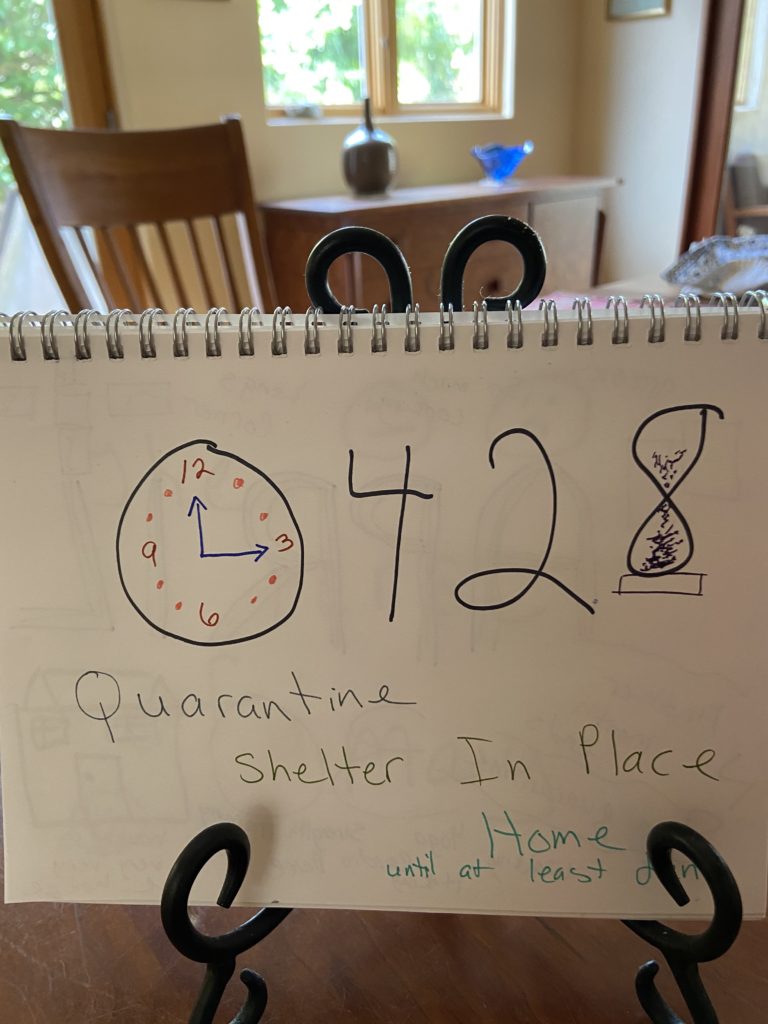
Martha Henry, Cambridge, Massachusetts
Sheltering in place since March 23
Journal entry May 26
After the long weekend, I had no idea what day it was until I looked at my phone. Had to drop car off by 7:30. Got there at 8:00. Pandemic makes for easy parking.
Walked home along the river. Morning fog just burning off. Not too many people. Not even tempted to yell at runners not wearing masks.
Herring, or whatever those small fish are, swimming in a frenzy at the edge of the brown river. Splashing, occasional fins breaking the surface. Must be spawning or something to do with sex.
This weekend, picnicking lovers back in the parks. COVID cases down, at least for the moment.
For better or worse, everything loosening up. Geese families along the bike path. Goslings growing fast. Their numbers already thinned from crossing the four-lane road. The few solo rowers seem the most free of all of us. No masks. Width of river to themselves.
Garage called as I crossed the Elliot Bridge. Radiator leak worse. Either replace for $500 or wait for smoky breakdown on some random highway. So glad I didn’t donate Civic last year. How would I have carried a week’s worth of groceries? “Fix it,” I tell the guy. I too want to keep moving.
Stephen Kingsnorth, Wrexham, Wales, UK
Sheltering in place since March 17
Journal entry April 28
Today is Tuesday; my weekly marker, recycling collection, woke me. My routine as yesterday, echo of 6 weeks’ advised Parkinson’s self-isolation. Rain prevented D asking me to take a walk; unless limbs are very sore, it is easier to consent. I pretend control. Such victories are pyrrhic, consequences costly. My self-assertions are petty; I become the child I claim not to be. Since lockdown, we have slept in separate rooms; creeping alone under the insomnia duvet in the early hours causes less tension. I changed TV channels, hearing her bed creak. By the time D descends, I have washed yesterday’s dishes, managed to sneak the almost-drained into the cupboards. I have sorted pills, fed the aquarium, and waited; to take breakfast alone is unwise. She called me to sort my salad lunch and cooked the usual delicious healthy vegetarian dinner. My visits to the gym have ended, my weight increasing. I dread the question. She has baked lemon cakes for the neighbors, kept one for us. They are good, but calorific; she is unsettled if I decline. She spent the day making face-masks. Her skill is undeniable: I was called to take a photograph. My hours passed writing poetry; most is poor. Yet when frequent rejections arrive, I sink. Despite the late-night anti-depressant, I grow morose. My drifting hope is that in the morning I will remember to maintain my sadness. Usually leg pain shifts recall. Tomorrow will repeat today, without recycling. Will I remember it must be Wednesday?
Orman Day, Laurel, Maryland
Sheltering in place since March 15
Journal entry June 5
Several days ago in yet another loud-volume transcontinental conversation, my 101-year-old mother complained to me that she was without the use of both hearing aids. One aid went kaput because she wore it into the shower. The other one she couldn’t find after taking it off to yak for an hour on the phone. Without success, the facility sent numerous staff members to search high and low for the lost aid, which Mom was convinced had tumbled into the unreachable bowels of her couch.
Finally my sister Laurel was able to get the water-damaged aid repaired. Because she’s been steadily losing her sight, Mom couldn’t look for the lost aid on her own and figured she’d resume the search when the lockdown ends. Then, just after midnight today, she woke up hankering for a sweet and fumbled her way to a bowl filled with butterscotch candies. Smacking her lips, she reached into the bowl . . . and pulled up her hearing aid. This morning she phoned and asked, “Ormie, do you think my room is haunted?”
Jyoti Minocha, Vienna, Virginia
Sheltering in place since March 14
Journal entry May 8
I call my mother and my sister who are in lockdown in New Delhi, India. They haven’t seen the sun for weeks. They are in a containment zone and are not allowed to walk on the road outside their street without official permission. My mother, who is 94 and bedridden, says bless you, child, I’m doing well. When are you coming? These calls leave me despondent, so I try to space them out.
In the afternoons we sit on the deck and watch the sun slant towards the west. The rules of sunset are immutable, like the rules of the virus, I think. The sun will never change course in the middle of setting and decide to go east instead. The thought calms me.
Cardinals and bluebirds hop between the branches of our tree line and I watch them in fascination, as if I’m seeing them for the first time. And maybe I am. I never knew that the evening shadows in our yard rode on the cries of so many birds.
This is the world of natural laws, where there is honesty and transparency and predictability.
The virus is part of this natural world and that thought, when it comes, is surprisingly soothing.
The evening hour on our deck is the most rejuvenating time of my day.
Cindy Cramer, Gig Harbor, Washington
Sheltering in place since March 16
Journal entry May 8
My 15-year-old calls out from the darkness of his bedroom. “I think this is one of those things we’re always going to remember,” he says. “Like people who lived through the Great Depression. And we’ll wish we didn’t live through it, but we’ll always remember this time.” I pause, wondering how to respond. “I think you’re right,” I finally say. The only other thing I can compare it to is 9/11, but that was quick, the clear lines of our grief laid out in a matter of hours.
I wonder what my boys will remember of this time. I hope they remember the board games we played in the evenings. The family walks along the trail near our house. The luau we had in the living room, wearing aloha shirts and cheap leis bought online, because our long-planned Spring Break trip to Hawaii had evaporated. The oldest one driving the family car in the YMCA parking lot, practicing even though there might not be any Drivers Ed this summer.
I hope they look back and count missing school as their biggest loss. I worry about their grandparents and their aunt. I hope their losses are normal teenage losses, and not holes in their family. For now, I hope they sleep well at night. Leave the worry to me. I’m older. I can take it.
Lisa Rigge, Bay Area, California
Sheltering in place since March 17
I have been compiling a series of self-portrait contour drawings expressive of my inner state of being. These black ink drawings shaded in with pencil are based on self-portraits and teachings by Elizabeth Layton. I work with my dreams and the dreams of others a lot, especially since COVID19, when many dreams have taken a dark and anxious turn.

Dream Journal entry April 13th
I sit at a table with 2 unknown men. There’s a glass on the table, half full with a dark liquid. Beside the drink is a book I’ve written and published, an accomplishment I am proud of. I know that if I drink this drink, I will die. But, I’m not afraid of dying. One man picks up the drink and takes the sip. He hands it to the man next to him, who sips it as well. This man hands it to me. I, too, take the glass and drink the rest of the liquid. I wake up before I die.
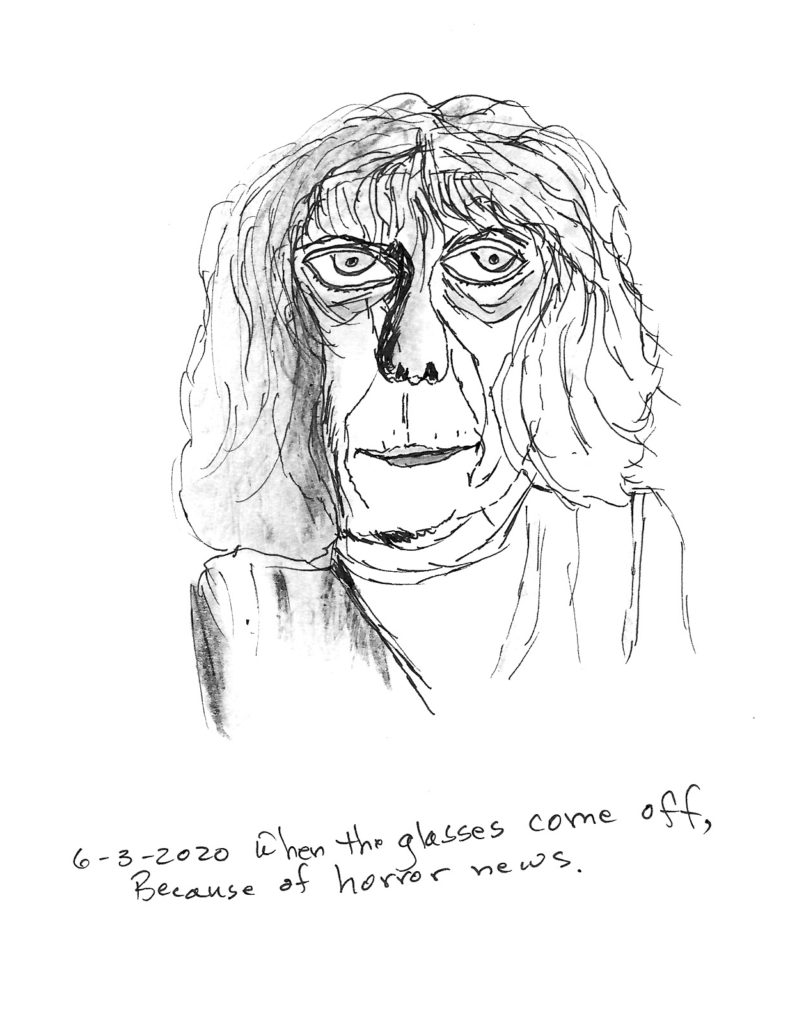
Amie McGraham, Scottsdale, Arizona
Journal entries March 11-15
March 11
3 airports, 2 airplanes, 2 nursing homes, this tiny state with more pine trees than
people, a skeevy Best Western, another fucking hospital and I have lost. An. Entire. Day. Something pushing me from motel to the long wooded driveway up to the hospital. Patches of snow. Yellow-gray sun slowly dropping. A meditation room. Blue stained glass and peace elusive. Mom asks me: “Is my daughter coming?”
March 12
Brunswick-Bath Best Western “Plus.” Unclear what qualifies that superlative.
Not their bitter coffee. “Everyone looks for pots,” says the breakfast area server.
“It’s not in pots.” Continues wiping down the table, spray bottle of disinfectant
hooked to her belt loop.
“I’m glad you’re cleaning the surfaces,” a white haired woman remarks. “I was going to attend an . . . event in Portland Saturday but I’ve decided against it.”
No one comments. What would you say? That’s too bad? Sorry to hear? Good idea?
Meanwhile, a questionable president addressed his flock in a stilted feel-good speech last night. No one feels good about this.
March 13
Of course. I’m in dementia hell, hotel hell, virus hell. Exited hospital hell,
Mom back at the Vicarage, so there’s that.
Blood transfusion? No. Palliative Care? No. Hospice visits? Again, NO. Mom is . . . changing. She looks chalky. Translucent. Doing that weird hand thing,
moving her bony fingers through the air as if directing an orchestra.
March 15
6:39 am. Can’t get out of bed. I —
Mom’s place on lockdown. Dad’s place quarantined, 2 positive cases.
Dotty LeMieux, Marin County, California
I’m a lawyer and a political consultant and am sheltering in my office
Journal entry May 10
Why is it the old people who are expendable?
Lived long enough Grandpa, time to die. Or just go play golf. Grandma, go play canasta with all the other old biddies. You ruined our planet now get off it. When the ethicists decide who’s to live and who’s to die, they don’t look at accumulated wisdom, years of service, present abilities to work, they look at who has the most (actuarial) years to live. That guy in the MAGA hat or that old lady whose roots have grown out? And the Lt. Governor of Texas says “There are more important things than living.” This is what happens when we treat older people like dependents, call us “seniors” like we’re in high school, only with no graduation but death. Whatever happened to “60 is the new 40?”
And shopping for food. You get to go early with all the other Seniors.
Gee thanks, but no, I’m not trundling off to the market at 6 am to hang with a bunch of other old people who, as everybody knows, are the most vulnerable. Why do you think it sweeps through nursing homes? I’ll wait until the young and fit go shopping. Protect myself among them. So think about what this really is. Ageism. It’s the one ism facing each and every one of us.
Naomi Karp, Washington, DC
Sheltering in place since March 13
Journal entry April 16
My dad’s mishpachah was wonderful. Zayde chanted every syllable at Brooklyn Passover seders. Bubbe made kreplach soup and had soft skin. But they were dime-a-dozen Eastern Europeans from the shtetl.
Mom had the more exotic if frightening tale. A teenaged refugee from Nazi Germany, she escaped because Aunt Eugenie married a State Department guy. They’d lived through Kristallnacht, Grandpa’s Dachau stay, and losing the family distillery, “Borato.”
Now that they’re scattered, an electronic thread sews my maternal side together. The first email had the unlikely tagline “Seasons Greetings?” Cousin Frank in Germany, 90, wonders how Die Familie is surviving this viral nightmare. “Though the civilization-whitewash of us humans is rather thin, let’s all hope that things will improve and that the world might be just a little bit better.”
Through the miracle of “Reply All,” letters ping-pong around the globe. A cousin in Providence shares joy: a new grandson born, named for his grandpa who survived Hitler. Another explains Die Familie’s Argentina branch. The Third Reich brought them south. Later some moved to Israel, Brazil, Mexico, and even Deutschland. Who knew?
Greg splits time between England and China, but is social distancing in the Nevada desert. We’re a modern Diaspora.
Emails still fly around our pandemic planet, sparked by a rabbi’s exhortation: “Every embrace that we avoid must become a verbal expression of warmth and concern.” I feel the heat of the family hug.
Jeanne Cook, Northfield, Vermont
Sheltering in place since early February due to an auto-immune disease
Journal entry April 30
Yesterday the sun was high at one o’clock. My friend Jane came to visit and we walked in my garden, six feet apart, looking for new growth. I could see tiny leaves of thyme in the clay pot. I saw, intensely, blue miniature flowers I never saw in my garden before. They must have come here on the wind. Green shoots on the rose bush and lilac. Magnolia buds about to burst. The strange thing is, I’m losing my vision, fast. I can’t read books anymore, or recipes, or medicine bottles. But yesterday there were those blossoms and new growth. And I could see it! Hard to explain—how if the sun is high and the light is just exactly right, no shadows, no reflections, high contrast, sometimes I can see beautiful detail.
Today is dark and rainy and the world distorted and blurred. There are holes in this text as I type it on my huge screen. But for one hour yesterday, there was clarity and those blue blossoms, tiny and vivid, are imprinted on my thought. I will carry them with me out of the darkness of the pandemic. Thank you for coming, my friend.
Sarah Barnett, Rehoboth Beach, Delaware
Sheltering in place since March 14
Journal entry April 6
Half of me prepares to die; the other half pretends to live. The first half writes “just-in-case” instructions. I list financial accounts with beneficiaries, passwords for the computer and confidential files.
What else? Who will deal with my stuff—notebooks, photos dating back to the 1930s, my mother’s jewelry? What about items I treasure that no one else will care about—one aunt’s china, another’s knick-knacks, anything my deceased daughter ever touched? It won’t matter, I tell myself. It’s not like I’ll be watching.
My other half remains strangely calm, at peace, almost happy to have no obligations, no place to go. No decisions about what to wear. No worries about leaving my dog Blue for longer than usual. No concerns about driving at night. My days are filled with the inconsequential. What to have for lunch, which pair of yoga pants to wear, which direction to take to walk around the neighborhood, which TV series to watch.
The half that foresees a future decrees that I use this time to decide where/how to live these last 10.5 years assigned to me by the life expectancy tables, approximately 5.9 of them without Blue.
Shannon Pool, Cottage Grove, Oregon
Sheltering in place since March 14
Journal entry June 1
My now suspended job is up north to Eugene about 25 miles.

Luci Huhn, Union Pier, Michigan
Sheltering in place since March 15
Journal entry May 2
We have a stone dog at the end of our driveway. Dalmatian. Puppy. Cement. Painted white with black dots. Years old, worn and chipped. Paws broken off, so it’s nestled in the hostas. Wears a bandana, color coded for the season. I look out and see a little girl sitting with the stone dog. She’s probably only three or so, just a little larger than the pup. Sometimes sitting with her arm around it, sometimes laying over it, sometimes hugging it, sometimes standing next to it with her hand on its head. Doing a number on the hostas, but it’s early in the season, I tell myself, they’ll recover.
Has someone left her here? I see her parents a bit down the road, carrying her orange scooter, though it’s a tiny scooter, looks only ornamental, and she’s too young to ride it. They have relinquished her to the dog. The dog is her sanctuary. The dog is her playground, I realize. There are no playgrounds now, they are not safe to touch or to breathe in, but this pup is hers. I go through the front door and half-way down the drive. Not close. Her parents tell me she loves the pup, she won’t leave it. In the spirit of all that we are giving up, all that we are handing over, every day, I tell her the pup doesn’t have a name, ask would she like to name it. She tells me it’s a boy, his name is Dots.
MaryAnn Moenck, Rural Western Wisconsin
At home with my husband since March 11 except for grocery runs and care packages dropped off at Mom’s assisted living in Maplewood, Minnesota. I last hugged my 95-year-old mother on March 5.
Journal entries May 10 to May 17
May 10
Mothers Day. Did nothing. It sucked.
May 11 – May 12
Crabby Mom. Helicopter at 4:30 a.m. Failed video connect. She is giving up. I am disheartened. Cause of death: Abundance of caution.
May 13
I ordered an oversimplified tablet for Mom that will give us video chats. It’s a glimmer . . . Waiting on rain to plant our garden. The dirt is hard and dry.
May 14
We planted the vegetable garden today. After weeks of poor quality lettuce in the store plus Covid concerns, I am looking forward most to fresh salads this summer. The lettuce row looks colorful, bright, and mouth-watering.
May 15
First mowing of the season, and perfect weather. I am appropriately tired now at bedtime. Curbside supper from WaterShed while the rest of Wisconsin goes crazy with the Wisconsin Supreme Court opening the state abruptly. Supreme, my ass. Idiots!
May 16
Ran the new tablet to Mom’s. Saw her through glass. She had a bad day, even told me the 8-inch tablet was too heavy to lift. I drank more wine than necessary after that.
May 17
Triumph. “I love this thing!” Mom said, during our first video chat. She is just inside of capable with the new tablet. Online Scrabble with Mike and Ginny. They kicked our butts. Inch and a half of rain, badly needed. Good day. Goodnight.
Julia Justo, New York City, New York
Journal entry May 19
NY Subway Driver, part of my photographic project about the effects of the pandemic on New York City, seeks to recognize and honor essential workers that put their lives at risk to make sure our community continues to function.
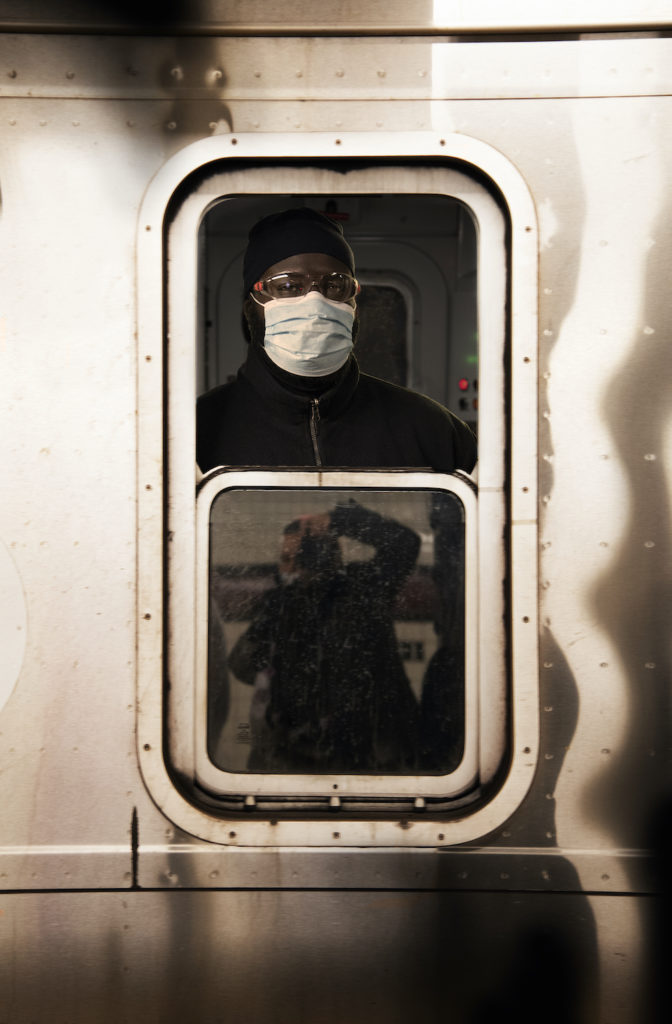
Stephen Young, Providence, Rhode Island
I work as a driver for Meals-on-Wheels and volunteer at my local food bank
Journal entry May 18
The daffodils outside Susan’s senior citizen trailer have tongues, her little dog barks an alert, and Susan answers the door promptly. I play-act fright at the furious barking and from behind my mask I say, “I’d hate to see what that dog might do to me.”
She laughs and says, “Oh yeah I’m sure.”
I hand the meal over and ask, “How are you?”
She says, “More chemo Friday, maybe another operation next month, if this virus doesn’t doesn’t kill me first.”
I say, “Sorry, that sounds difficult.”
She says, “I’m tired.”
I can see that she is, and a hollow feeling whistles through me. I suppose it’s a small kindness to listen and let her hurt land somewhere, even though it isn’t much, I know. I wonder who else is a witness beyond her little dog and myself. Then I’m gone to my next delivery.
Orman Day, Laurel, Maryland
Sheltering in place since March 15
Journal entries May 7 and May 28
May 7
A phone conversation with Mom, who’s 101 this month and locked down in her room in an assisted living facility in California.
Me (shouting): “Hello, Mom, what have you been up to?”
Mom: “What have YOU been up to?”
Me (shouting): “Not too much!”
Mom: “What?”
Me (yelling): “Not too much! Are you doing anything exciting today?
Mom: “I’m going to change the battery on my hearing aid.”
Me (yelling): “Don’t break it again.”
Mom: “How’s the weather back there?”
Me (hard of hearing myself): “What?”
Mom (shouting): “How’s the weather back there?”
Me (shrieking): “I don’t know. I haven’t looked out the window yet!”
May 28
When my mom, Flora MacKay, turned 100 last year in West Covina, CA,
my three sisters and I hosted two parties that drew a total of about 500 guests.
This May 28, Mom was temporarily let out of her room at the assisted living facility where she’s been locked down since mid-March so she could watch friends waving greetings and riding past in decorated cars.
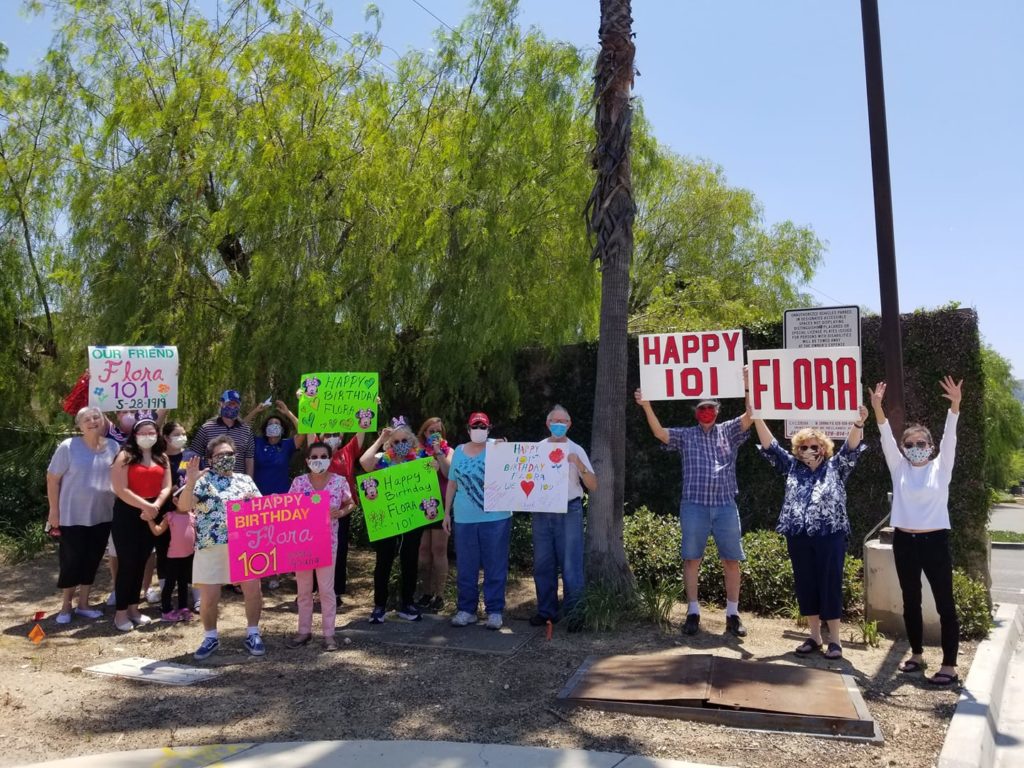
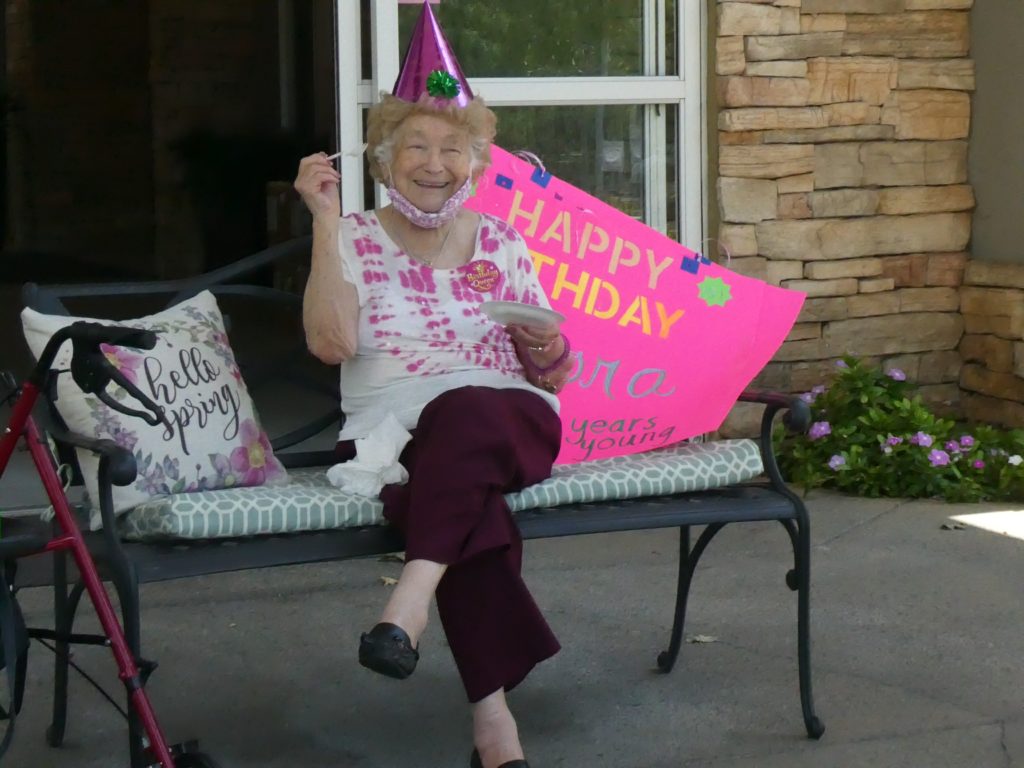
Kamyar Amin, Hindås, Sweden
Art entry March 28
Covid-19 did not affect my daily life in Sweden the way it did the rest of the world. But I always felt this strong disorder and chaos. This series was my interpretation after watching the news one day. I used pastel and beads and I used cardboard because I wanted to be able to peel it off.
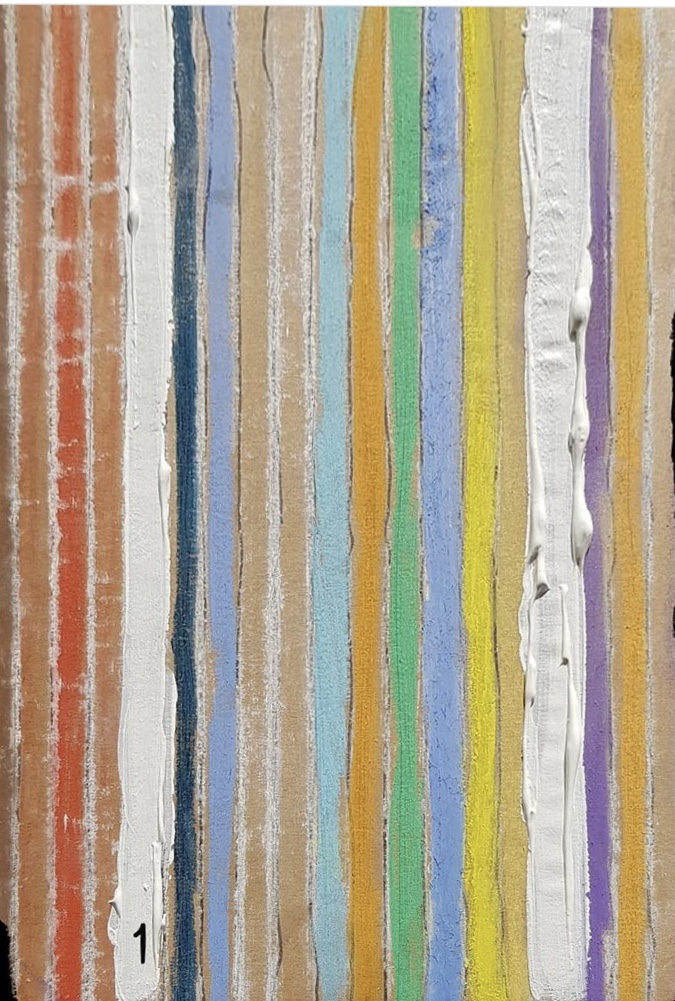
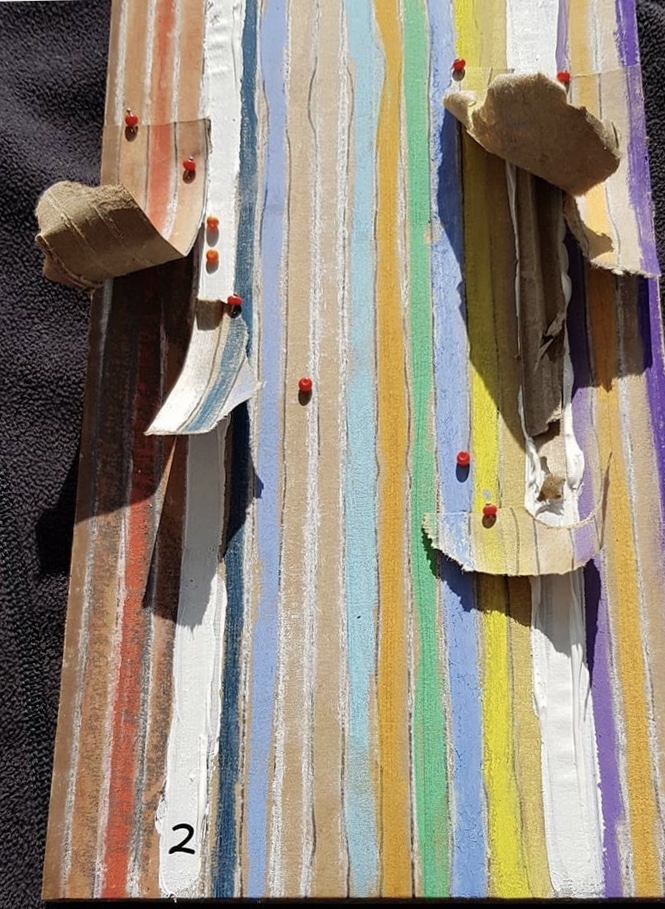
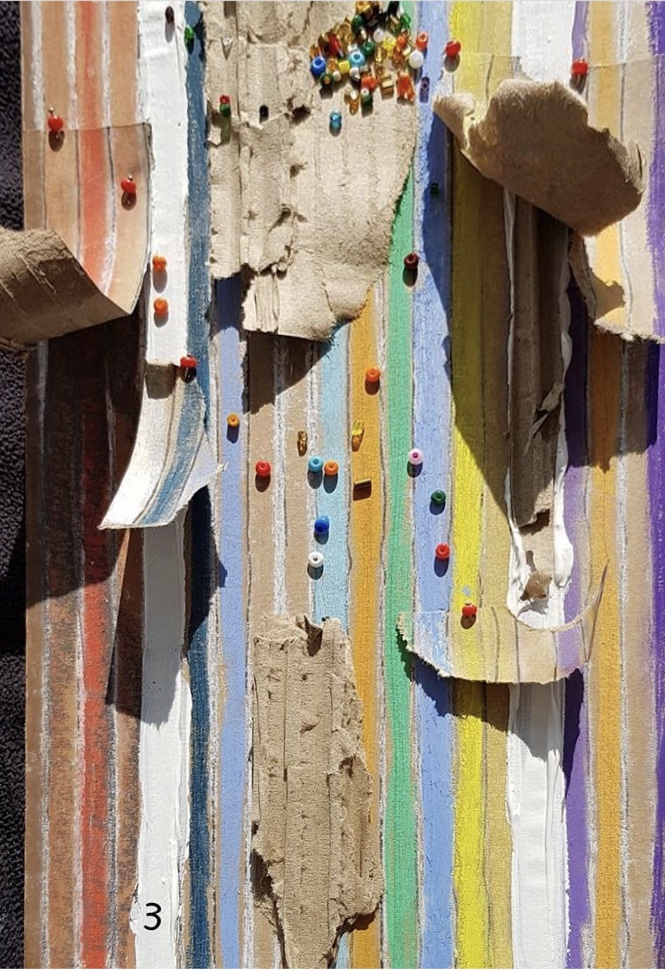
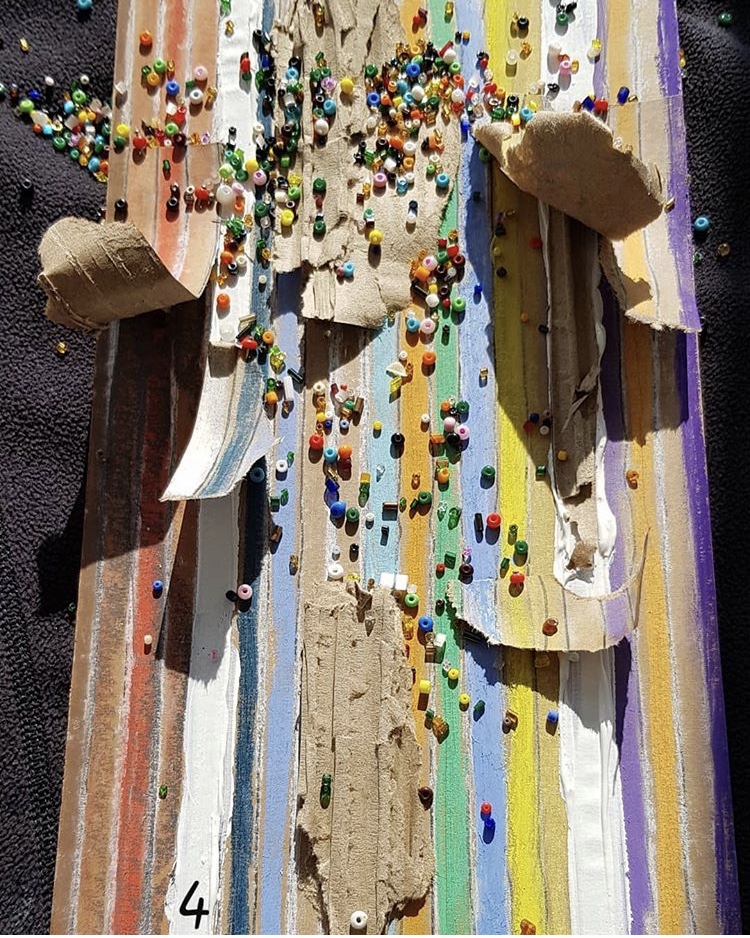
Kathleen M. Churchill, St. Germain-en-Laye, France
Sheltering in place since March 14
Journal entries March 17 – April 4
March 17
H. arrives today. We seal the hallway to his room, ceiling to floor, using duct tape and thick plastic trash bags. I’m not sure how long he’ll be quarantined in there (M. just popped her head in to say two weeks).
March 22
Seven days tomorrow since we’ve left the house. All week, police have been stopping pedestrians and motorists asking to see permission slips we are meant to carry with us. Yesterday, in balmy spring sunshine they were megaphone shouting “rentrez chez vous!” Go home!
March 25
We sneak into the forest for walks. Beneath budding trees, as far as you can see, small white flowers sheltering in dark greenery make a floral carpet, paths winding through, as if in a fairytale.
March 26
People who have never run, jog down the empty street—they look not yet defeated.
H. doesn’t leave his room. M. calls to him through the plastic. Sometimes he answers, sometimes he doesn’t. We put out food. Much of our days are spent worrying about our sons.
March 28
Evening cocktails in the garden. H. climbed out his bedroom window and sat in a chair under the blossoming chestnut tree while we huddled by the house, talking with him over the phone.
March 31
Lapis blue skies. Last night strong winds blew open windows, dislodged shutters banging from their locks.
April 4
From my bedroom I can hear the train going to and from Paris. I wonder who, if anyone, still rides it.
Merry Benezra, Nova Scotia, Canada
Sheltering in place with my cat Kali under our Provincial State of Emergency since March 22
Journal entry May 11
I dreamed of thirst, was thirsty overnight but too deeply asleep to do anything about it. A newspaper article about pandemic drinking mentions the problem of alcohol as a sleep disruptor, but I am finding it the very opposite. It is like wading into the Ouse with rocks sewn into one’s sweater pockets—effective. But it occurred to me to give some thought to my liver, or kidneys, or whatever organ has the difficult job of cleaning out the toxins. So I will make an effort to drink only one spritzer and refill with San Pellegrino.
Yesterday I went upstairs to slip an apple cobbler recipe under Adele’s door. There was an ambulance in front of our building, and EMTs in full pandemic gear. It turned out that Winnie had fallen, yet when she left on the stretcher she seemed in marvelously good spirits. The excitement brought Clarissa out into the hallway, masked; she reported brightly that she has lung cancer, but that it is on, not inside, her lung, and it is shrinking. Adele came out and we triangulated at two meters apart to chat, each one holding her corner.
It was cold and drizzly and I too stayed indoors all day, in a funk and not even doing the 10-loonie apartment jog. Some of the trees are generating ragged green buds. Soon, or within a week or two, they should come into full leaf. Rain, here, is the magician that pulls summer out of its hat. I cannot wait.
Eric Forsbergh, Reston, Virginia
Sheltering as much as possible since March 20 while providing dental services for emergencies only
Journal entry April 15
As a dentist, I am in a high-risk category, because I work literally in the patient’s mouth. Our office is open for emergencies only. If someone has an oral abscess, we need to treat them so they don’t overburden the emergency room.
We take all precautions available to us, including personal protective equipment, but the N95 masks are on back order, and we have none of them. We take temperatures, and ask if patients have fever or cough.
I worry about the healthy carriers of COVID19, who are shedding the virus. Also, there will be patients shedding virus who are not yet sick. My face has to be 18 inches from the patient’s mouth. Using the drill, there is an aerosol mist which spreads to a five-foot radius from the mouth. Contaminated with virus or not, it settles all over me and my assistant. Our necks are exposed, as are the backs of our heads.
My wife and I have discussed this. I’m 69. My good health is my best protection, but, honestly, I expect to get the virus. We can’t get near our two children, each married, and each with a baby under six months. Including their spouses, I ache to hug all six of them.
I struggle with the chance of infecting my wife, and have offered to live in the basement. But she’s decided we’re in this together.
Evelyn Block, Redondo Beach, California
Sheltering in place since mid-March
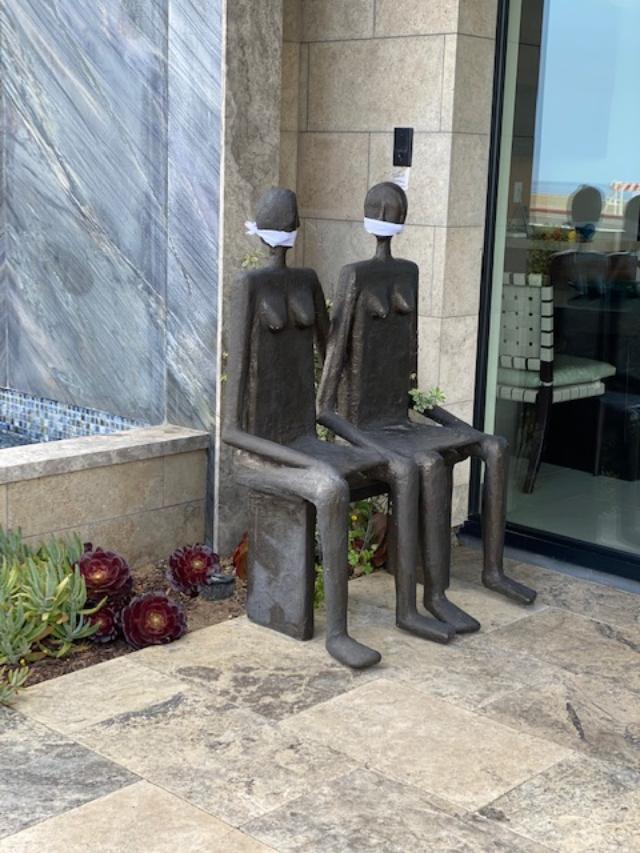
As a retiree, I am unable to go out during the pandemic to help others. I tied masks onto this statue of seated ladies as my reminder to folks to wear masks and stay safe. They’ve become a huge attraction as people walk past and remember to wear their masks. I call them Ladies in Waiting.
Donald Guadagni, Beijing, China, Chaoyang District
Sheltering in place since January 23
Journal entry April 13
Today I found myself staring at the ground outside my house building, having come outside to ride my bike to the store to buy food and get a little exercise. Much to my surprise there was a green glob of sputum freshly spat onto the ground near but not into a drainage grating. This was a somber reminder to me that the quarantine was not as effective as the local government had hoped for. Since February, more and more people were maskless outside the community. I took a photo of the sputum and when I come back from shopping, I will send the photo and location to Beijing CDC IDC. We might get locked down, but I would rather report it and be wrong than not report and be really wrong.
Margot Fedoruk, Gabriola Island, British Columbia, off of Vancouver Island
Journal entry April 28
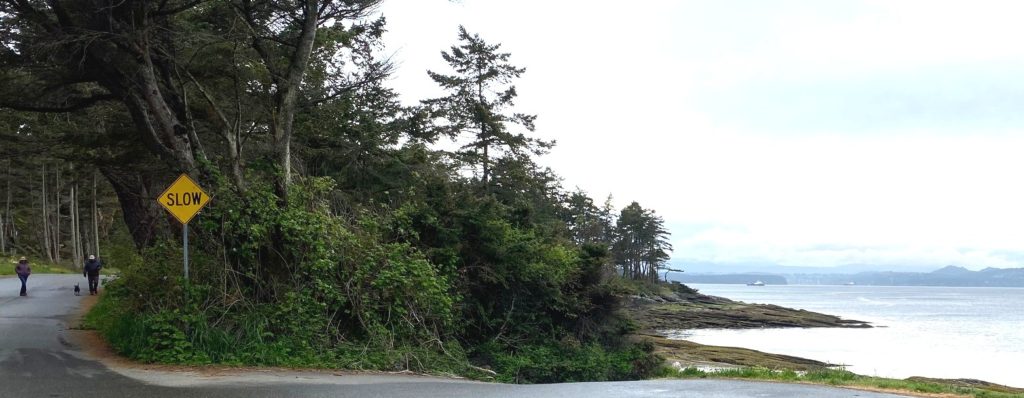
April 28
My daughter grips the steering wheel as she drives me the 15 kilometres around Gabriola Island. This is our daily ritual. She left home at 18 before getting her driver’s license and now, at 24, since moving back home because of losing her job, she finally has the time to practice. Today the roads are fairly empty except for the odd deer grazing in the ditch or a lone cyclist zipping by. At first, Hailey couldn’t drive with the radio on because it distracted her. Today we listen to the French station and we agree they have wonderful songs, soulful and mysterious. We usually end our daily drive by heading to a place islanders call Berry Point. We park and walk along the road, past eagles and sea lions with their flippers out of the water to regulate their temperature. Sometimes if there are too many people we decide to head home. Later Hailey will cook elaborate meals for us until it’s time to watch Jeopardy at 7:30.
Yesterday, I drove myself to Berry Point and cried, worrying about how I am going to find work during a pandemic or what the future holds. Still, I want to remain grateful for this serendipitous time with my daughter.
Samantha Coomber, Ho Chi Minh City, Vietnam
Under official lockdown from April 1 to April 23
Journal entries April 1 and April 10


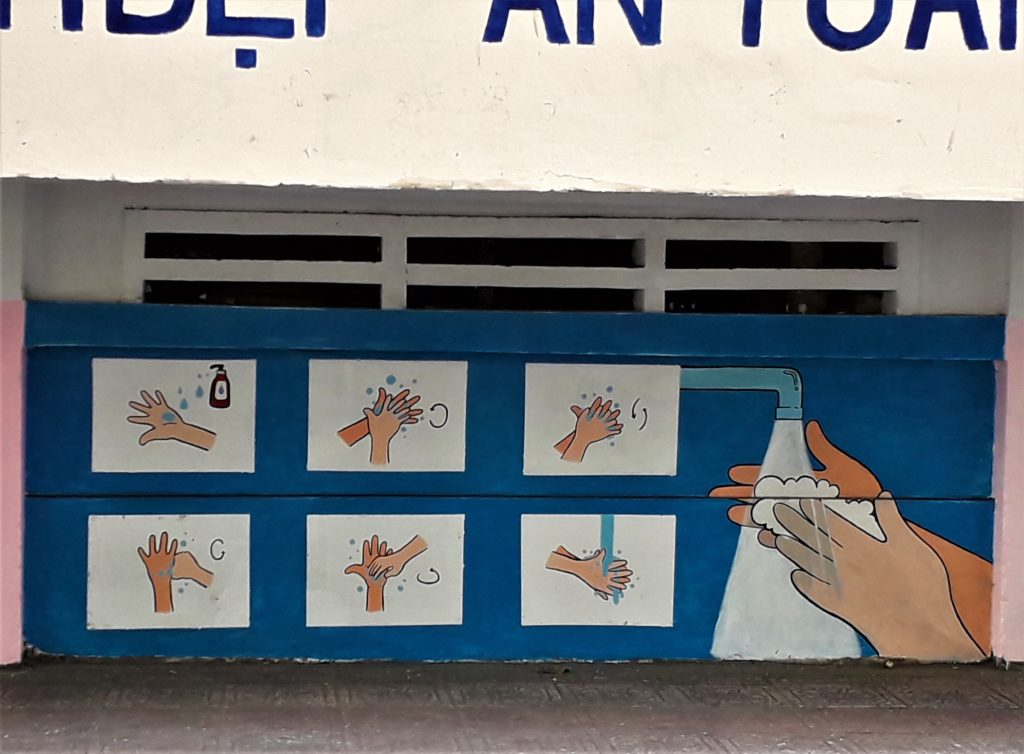
April 1
Despite no official COVID-19 deaths, the Vietnamese government announces a two-week nationwide lockdown campaign starting today, pre-empting any potential outbreaks. All non-essential businesses and services shut down, gatherings of two-plus people are banned and everyone is urged to stay at home. As Vietnam’s borders have already closed—no one can fly in or out—I feel more isolated than ever.
The evening before, like many Saigonese, I dash to the supermarket for a siege mentality stock-up. But like elsewhere, things are calm and well organized and there are mounds of supplies. Almost having a meltdown in the long check-out queues, locals shoot me empathetic glances over their mandatory face masks.
My annual leave also begins today. With no office camaraderie and living alone, I don’t talk to anyone for days, sometimes just the apartment security guard (who doesn’t speak any English). I can still venture out, albeit HCMC’s once vibrant street-life is now eerily silent and shuttered. And I can exercise; my neighbourhood canal running track is bustling with joggers—no social distancing here.
April 10
My last day of work and the department is shutting down, effects of the global pandemic. We hold a subdued farewell lunch in the office before my Vietnamese colleagues rush back to the countryside. There are no taxis; overladen with my desk clear-outs, I lurch home on a motorbike variety.
Vivienne Vermes, Paris, France
In lockdown since March 17
Journal entry April 15
I live in the centre of Paris, in the heart of Montparnasse. This is normally one of the noisiest, most raucous parts of Paris. Now, the only sound I hear is a pigeon cooing.
Walking down to the crossroads between the Boulevard Raspail and the Boulevard du Montparnasse, I talk to the ghosts of Hemingway, Picasso, Beckett, Scott Fitzgerald. I stand in front of their cafés, the Rotonde, the Dôme and the Select, and wonder if they could ever have imagined this crossroads silent, deserted, the café chairs their wicker backs stacked clumsily against the windows, like the beige scales of some unruly reptile.
Later, back in my flat, the spring daylight fades into dusk. I open the window. The dark, impassive façades of the buildings opposite look like so many empty faces.
Then I hear it. Faint at first. Someone out there is clapping. The applause grows. People are bashing saucepans, clashing together spoons, or lids, or colanders, and clapping and cheering and whistling. This cacophony goes beyond the quartier, I can hear it in waves across the city.
Then comes the peal of bells from Notre Dame, the first time in a year, since the terrible fire. The bells merge with the applause. Gratitude for the heroes. I think of John Donne: “No man is an island, entire of itself . . . therefore never send to know for whom the bell tolls. It tolls for thee.”
Kathy Bruce, Liverpool, England
Self-isolating with relatives since March 14
Art entry April 25
I am a US artist traveling in the UK, and on March 14 I suddenly found myself self-isolating with relatives in a suburb of Liverpool.
These collages, Unknown Despair and Invisible Boundaries, are about the isolation, fear and distancing we are all living with as the result of this pandemic.
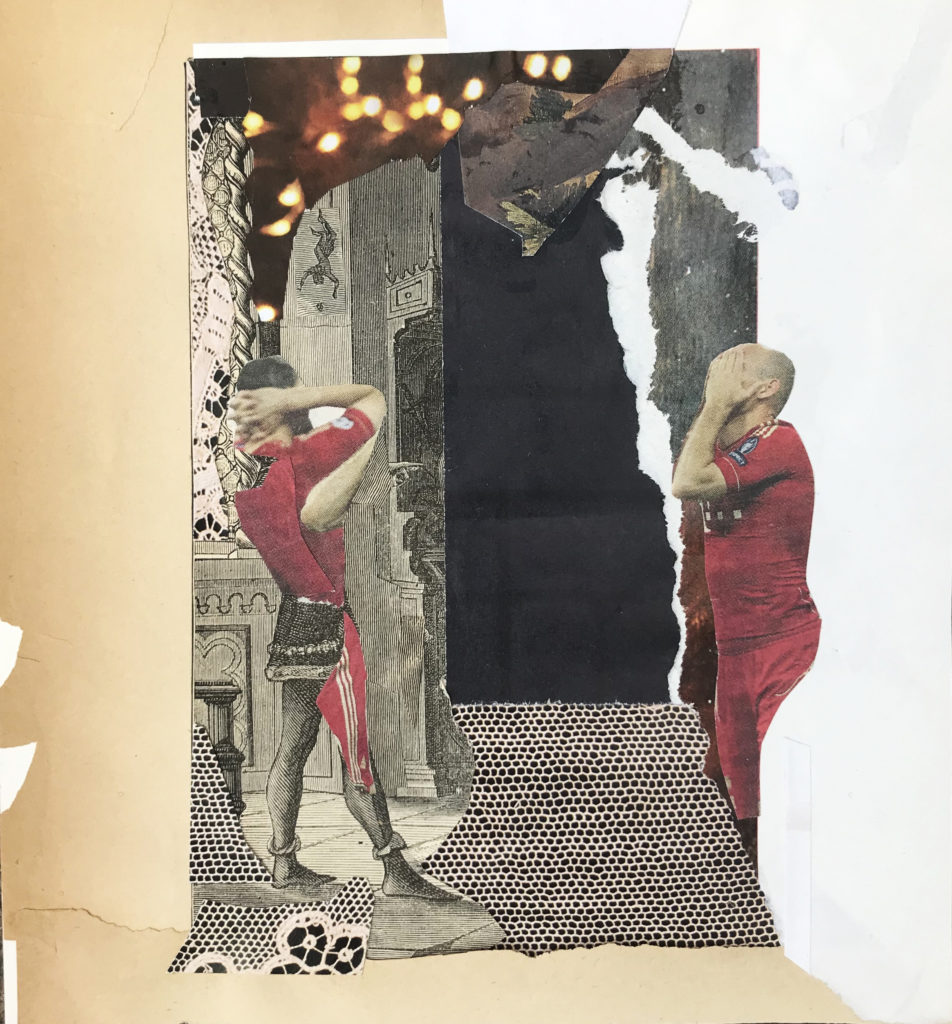
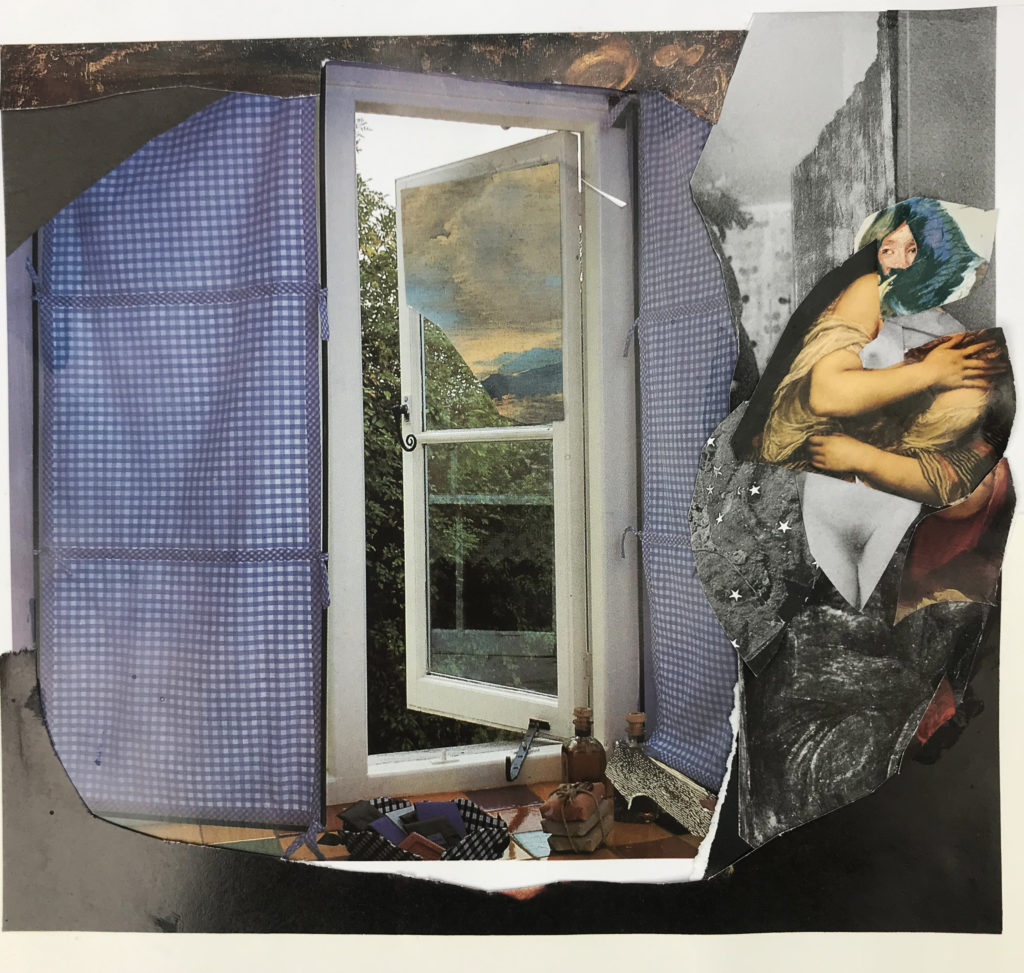
Virginia Brackett, Kansas City, Missouri
Sheltering in place since March 11
Journal entry April 15
In the middle of this stinking self-quarantine, in the middle of sacrifice of the normal, my mind betrays me. Images slide into my consciousness from time to time as I sit distracted, wanting to think about the day ahead, but instead thinking of my past. On a sunny afternoon—I’m about 9 years old—I walk into my best friend’s house. Her mother’s doing something with her younger sister. Her father sits facing the television. Momentarily sun blind, I try to identify the object beside his chair. It looked like a leg, but how could it be standing there on its own? I’m confused. I’d likely heard the term “prosthesis,” as in the 1950s veterans were still on the nation’s mind, but I’d never encountered one. I wait a moment—now I see the leg standing of its own will, as well as the shortened natural limb belonging to my friend’s father. Did she tell me he’d lost a leg to war? I don’t know. My parents’ generation knew sacrifice well—my own father was killed by a sniper in Korea when I was eight months old. Maybe I see that image on this day to remind me that what I suffer now, temporary separation from loved ones and social life—boredom, fear, restlessness—is hardly a sacrifice at all.
Judy Bolton-Fasman, Newton, Massachusetts
Sheltering in place since March 16
Journal entry April 30
With my 85-year-old mother a patient at a local nursing home, this New York Times headline haunts me: “‘They’re Death Pits’: Virus Claims at Least 7,000 Lives in U.S. Nursing Homes.” And now my mother has tested positive for the virus.
I see her twice a week via 30-minute Zoom calls. So far, she’s asymptomatic, but she is very confused. Why hasn’t she seen me in years, she’ll ask. The squares that her children and their families populate on the iPad screen disorient her. Where are we? Who is speaking? It’s both comforting and agitating for her to see our pixelated images floating from who knows where.
Each time we Zoom, a staff person, in full coronavirus attire, is by her side. (“We metaphorically, and physically, ‘suit up’ and battle COVID-19 for 24 hours a day,” said a recent dispatch from the home to families). Margo, a physical therapist now deployed to help coronavirus patients, guides my mother during the call. “This is your daughter, Judy,” she patiently points out. “Your granddaughter, Anna, is speaking to you.” My mother nods. Later on the telephone she will ask me to remind her of my sister’s name. “Carol,” I answer tearing up. “So many people in our family,” she says, bewildered.
Suze Pringle-Cohan, Sebastopol, California
Sheltering in place since March 15
Journal entry May 18
This time of Sheltering In Place has seen a huge shift in our 44-year marriage.
A few weeks ago, on a balmy night, we wandered outside and lay down on our chaise lounges just expecting a quick rest to digest. As we lay quietly, suddenly it was as if we had entered an aviary of birdsong. Neither of us spoke as we dropped deeper and deeper into this, being bathed in the song of dusk, the birds chirping and twittering returning to their nests for sleep, the soft breeze high in the tops of the redwoods, hummingbirds zinging by. Time seemed to stop and we didn’t speak as we went even deeper. It was as if we could feel the earth slowly turn and sensed all of humanity holding on. I have no idea how long we were there, but simultaneously we both sat up, looked at each other and sighed.
My husband is a pragmatist and not drawn to meditation or prayer, but the following evening, after supper, he looked at me and asked “Wanna go to birdsong tonight?” We both laughed so hard. We now call it Birdsong Bathing and go there often.
John D. Thompson, Pella, Iowa
Sheltering in place alone since Monday, March 16
Journal entry March 30
Finally, I found out what PPE means! I’ve been listening to Coronavirus reports since Leap Year Day. I bet I’ve heard “PPE” said a thousand times and then some but never could spread that acronym out: Personal Protective Equipment! Of course! “PPE” at 3 syllables is much shorter than “Personal Protective Equipment” at 9! It seems the Coronovirus syndrome has found its way to the world of acronyms. Just ask the CDC or WHO.
FYI, “ACH” is for “air changes per hour.” “ARI” abbreviates “acute respiratory infection.” “ASTM” unveils the “American Society for Testing and Materials” (now gone international).
Being “AC” myself (acronym challenged), I’m finding myself OOB (out of breath) to keep up with all these media airborne acronyms for Co-Vid . . . there’s another one. And, for God’s sakes, what does the “N” stand for in N95 masks? “N”obody has one . . . or “N”early 95 masks available at this time?
I vow to learn at least 1 new CVA (coronavirus acronym) per day, starting today. Let’s start with “HEPA” shall we? Any guesses! “HEPA” stands for “high efficiency particulate air.” Now, that sounds good to me . . . especially the “high efficiency” part. At first, I thought HEPA meant “Help Each Person Always.”
Speaking of HEPA, we are in a HEPA trouble if we don’t acquire quicker testing, combative antidotes, and a vaccine in the VNF (very near future).
Sousan Shafighi, Tehran, Iran
Sheltering in place since February 23
Journal entry May 11
Translated from Farsi by her daughter . . . “I tried to stay very truthful to her original. It’s more lyrical in Persian. It feels very plain in English.”
I had the strangest dream. I dreamed that it was morning and I woke up, there was nobody in the world but me, and all the wealth in the world belonged to me. Then I thought, Oh well, what should I wear now? Which jewelry and accessories should I put on? What kind of a car should I ride? Which house makes me happiest?
I had all the possessions one can ask or dream of. But there was not any sense of happiness, no feelings at all. Only a peculiar feeling of emptiness. There wasn’t anybody to share my happiness, or anything else for that matter. And all of a sudden I wanted to lose everything that I owned in my dream to be with someone else.
My dream showed me that together people are everything, and we’re nothing without each other. I didn’t feel this strong connection before Corona.
Uday Dhar, New York City
Sheltering at home for 2 months
Journal entry May 7
This time has allowed me to dig up old sketches and add color.
I started these drawings at the end of 2019, but have reworked and completed them in the past month in isolation at home.
As an immigrant to the United States, questions about belonging and pride that I feel for this country are always present. What I want to explore in my work is how can something that is familiar be transformed to create new readings. The drawings take the structure of the US flag as a foundation. New marks create a new structure. A whole that incorporates the parts. A way of thought that embraces diversity and difference.
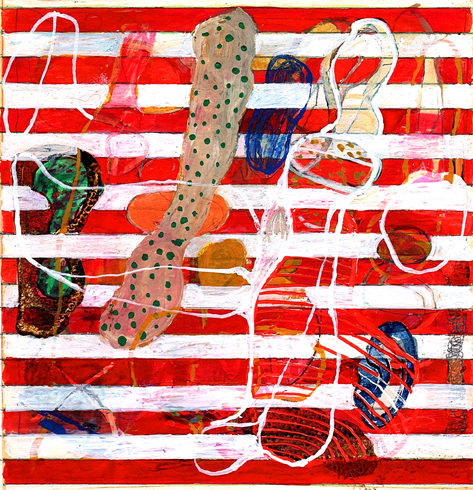
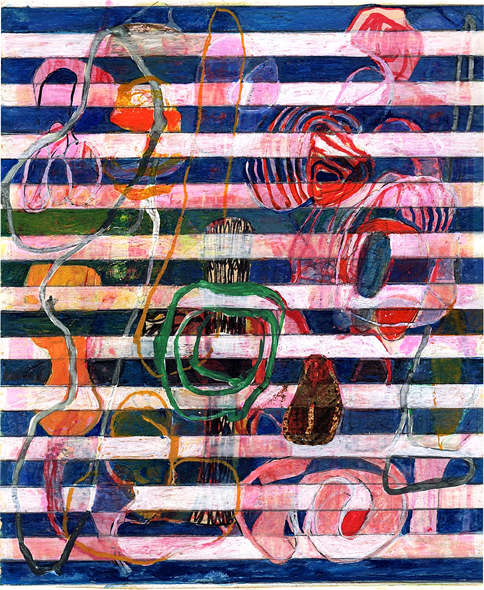
Mary Ellen Talley, Seattle, Washington
Sheltering in place since March 14
Journal entry April 8
When I opened up ZOOM for our language lesson and to read a story with Aubrey Kate, I asked her if she had a special online Kindergarten meeting with her class today, since she was wearing her sleeveless taffeta dress with the overlapping pastel circles. She answered, “No Grandma, I just wanted to dress up. It’s nothing serious.”
Kathleen Klassen, Ottawa, Ontario
I have been in relative isolation for many years as a result of a significant head injury and sheltering in place with two teenage boys since mid-March.
Journal entry March 23
I have seen memes suggesting that pandemics are no time to text your ex. (No time to shower, wash your hair or dress up in a ball gown either, but that hasn’t stopped anyone, amarite?) When it appeared things might be shutting down quickly a week and a half ago, I did just that—not the ball gown part, but pink boa and sparkly blue stilettos. And I called my ex. He was very grateful for my concern and as a result of the open dialogue I asked if he could help us out. (I was quite beside myself with thoughts of full-time single-parenting AND the zombie apocalypse. I can do one or the other—don’t think I could manage both.) With unexplained coughing in the house, I had to avoid grocery stores. I also thought I might look odd shopping in stilettos. He willingly agreed and delivered groceries the next day.
He texted a few days later to see if we “needed anything.” I wondered what kind of madness this was (we don’t talk or text) and then remembered it was pandemic days so anything was possible! Yes, we need things! We need so many things I can’t keep my head on straight—puffers and nose spray and a restart on life and most of all frozen pizza!
When he showed up again with bagsful of groceries, I was wearing my holey, unwashed sweats, a much more accurate depiction of my state.
Claudia Laroye, British Columbia, Canada
Self-isolating at home without a formal order
Journal entry March 23
Air Canada announces that its last cross-border flights to the United States will be March 31st, with a moratorium on flights for the month of April. I call Nicolas with this news so he’s aware of what his options now are. We both cry. It is so hard to have him so far away in New York City, in the American hot zone epicenter of the virus. But he’s going to stay with Layla. I tell him we can always ask Layla’s dad to drive him to the border where my brother Marco could pick him up. But it’s a bit of black humor.
This is so difficult and I’m fearful for him. I hope his youth, health and strength will be enough.
On the brighter side, cousin Sean invites us to participate in his squat challenge. Our age plus one each day. Nonna knocks it out of the park and does 80. It is a great idea to keep fit as our gym has been closed for almost two weeks and squats are easy to do at home. Though certainly not easy to do.
Victoria Lynn Smith, Superior, Wisconsin
Sheltering at home since March 18
Journal entry May 8
Only two daffodils bloomed, but the tulips showed great hope. Yesterday I counted nine tulip buds that were ready to burst open in red. This morning I walked to the back garden and found one red tulip with its petals fully opened to the sun. It caught my eye with its vibrant red. I looked at the other buds to see how close to blooming they were. Gone. All. Gone. Sheared off by some animal’s guillotine teeth. Probably some overly cute bunny. This has happened in past years, and this year we have lots and lots of bunnies in the neighborhood, so I wasn’t surprised to see my tulips decimated. What’s different is that I wanted to have a good, wailing cry. But I stuffed my tears because if I started, I wondered if I’d stop.
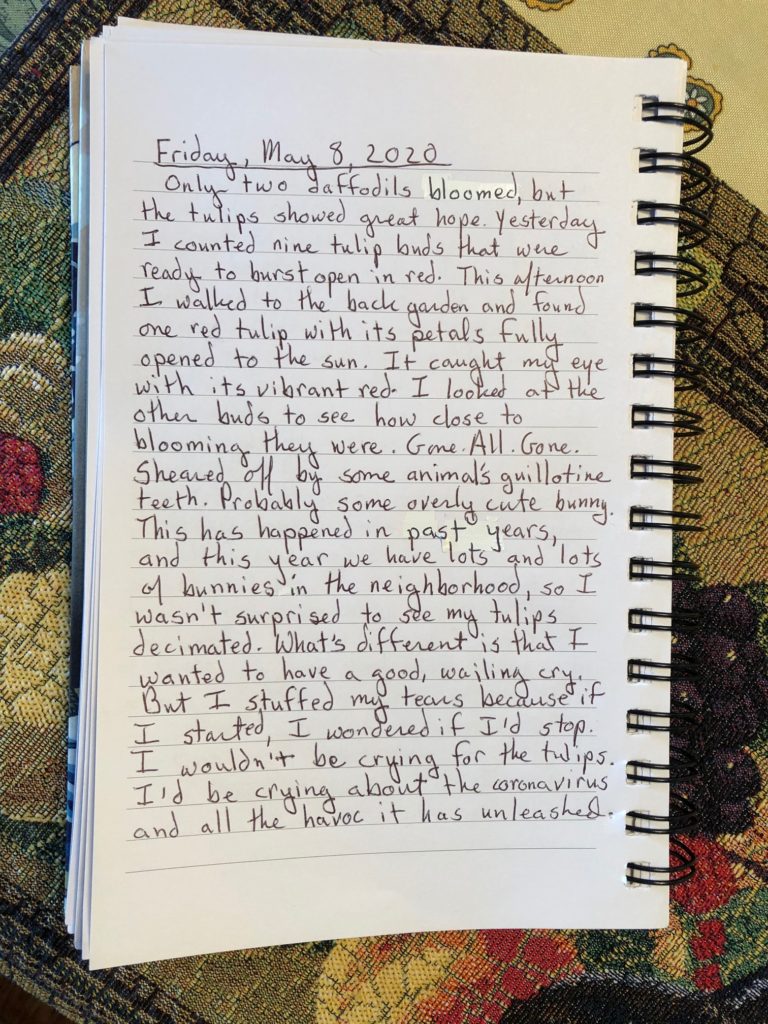
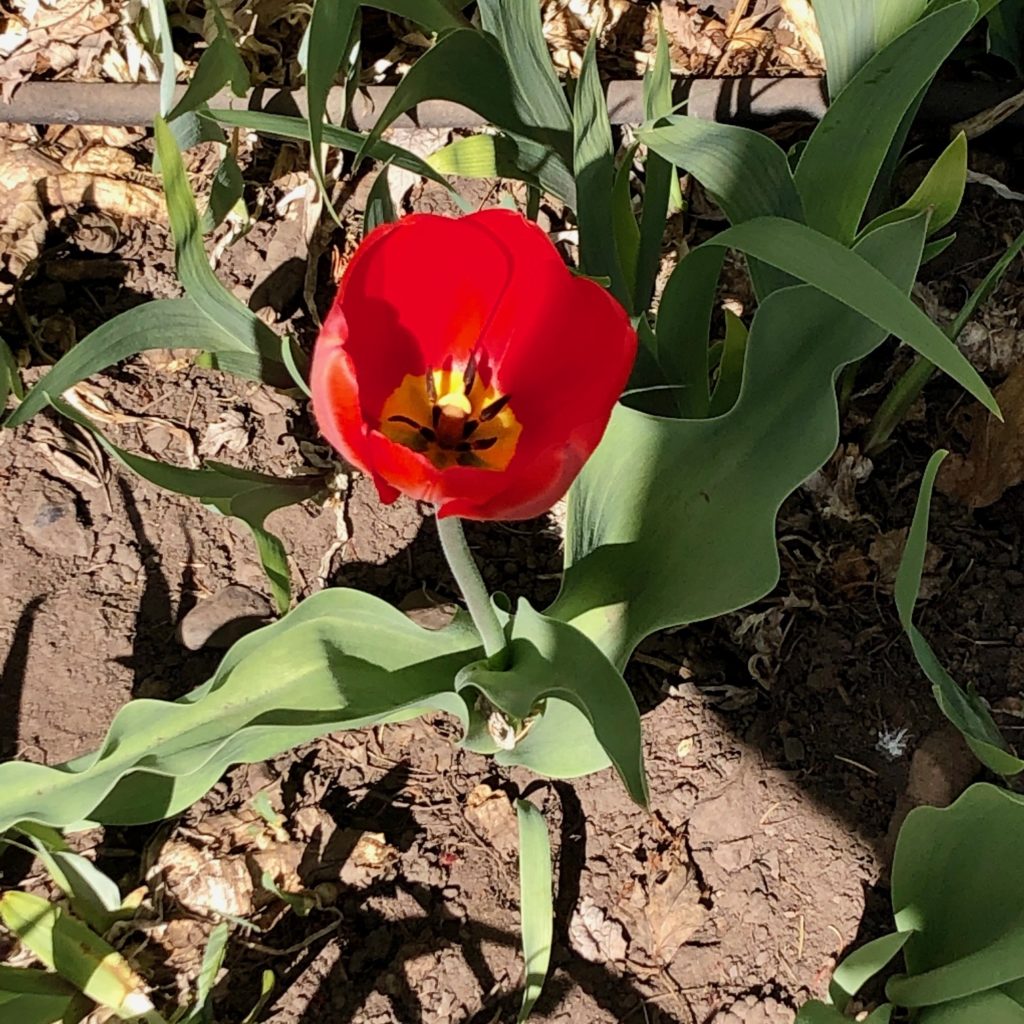
Adrienne Pilon, North Carolina
Sheltering in place long before the order, due to possible Covid-19 exposure
Journal entry April 21
The days roll on and it all feels like waiting.
Things have slowed down for us, all four together again in the house. We cook, we linger together in the evening when the forest green behind the house turns to black. We wait on the back deck for the foxes to emerge. They are beautiful, with their pencil bodies and brush tails, slipping like smoke through the fence, stealing figs off the tree before they can ripen. They are determined and brave and cavalier and cautious all at once and I admire this, and think, “be as a fox,” because I don’t always know how to be in this place where we have landed, this world, this pandemic. Or how to be for my family, my grown children with their interrupted lives. The foxes look up at us every so often, their masked faces not afraid, but careful. Not scared, but curious. We are still as we watch them. They will come out again the next evening and the next, and the next, I hope. So we wait. “Be as a fox,” I tell myself.
Charlie Becker, West Hollywood, California
Sheltering in place since March 14
Journal entry March 14
It’s strange how I feel like I’ve been through this before. I wonder if anyone else feels this way. Maybe that’s why I’m extra sad today. Back in 1982, when so many healthy gay young men started to pass away without warning, we all just held our breaths. Why was this happening to us? Doctors first named it “GRID”. Every minute we looked for symptoms that might haunt us, like purple skin lesions or horrible night sweats. We lived in fear of each other but needed each other more than ever. We went to Louise Hay meetings for love and support. Even when the HIV test was developed there was still no treatment. Who wanted to know he had a strange new virus if there was no therapy? I didn’t. I was afraid to have the test for years. My friends and I became celibate and avoided others who looked sick. Was it an epidemic or pandemic? I remember this went on for years until effective meds were created. But no vaccine has ever been developed. It sure sounds familiar to me today, all of this news about the coronavirus. But this time everyone is affected. We are all quarantined and living in fear. Will my experience make me stronger? Will there be a cure? A vaccine?
Veronica Scharf Garcia, Bergamo, Italy
Sheltering in place since February 28
Journal entry April 2020
We arrived in Italy when there were just 4 cases in the whole country, but very quickly our region Bergamo, became the epicenter of Europe. We are U.S. citizens who love Europe and are currently traveling in Europe for the last two years, living out of a suitcase.
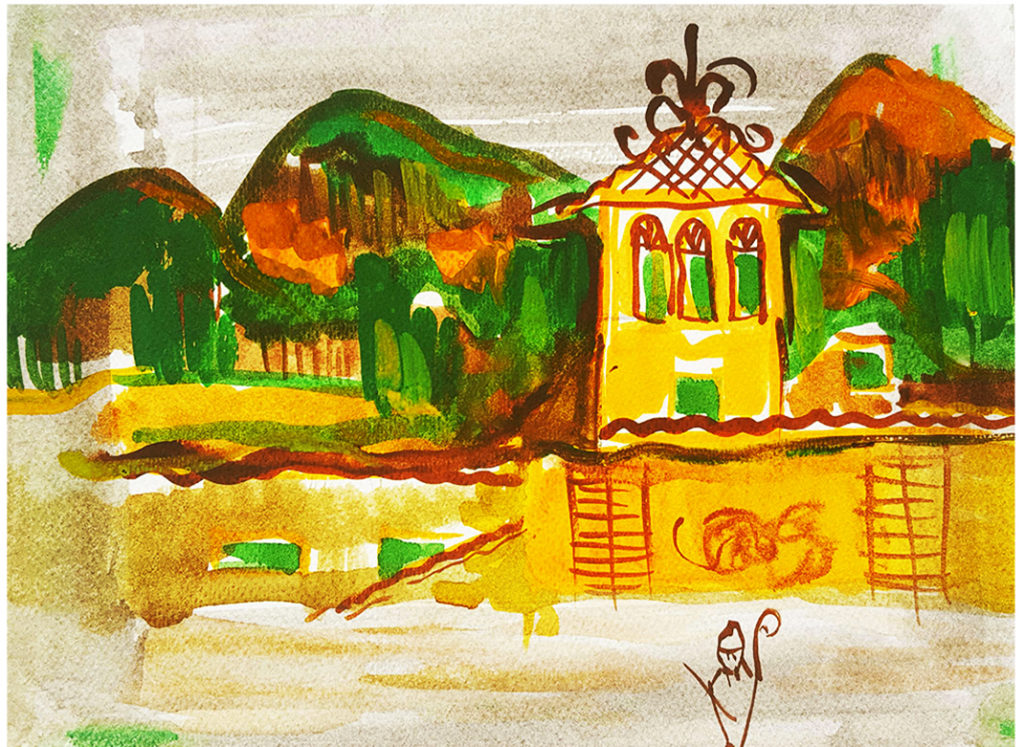
Lara O’Brien, Dublin, Ireland
Sheltering in place since March 15
Journal entry April 21
Time passes easily, carefree and relaxed . . . if you don’t think about death or finances.
Nature has her volume turned up so high, or is it that we humans have ours turned so low? Now that the golfers are gone, walking on the golf course in bare feet is a once in a lifetime luxury. There is a meme that shows Ireland in winter, summer and autumn, grey, dreary and rainy, and then Ireland in Covid and the sun is shining intensely.
We are all in lock-down and Mother Nature is running riot, naked and hot.
I try not to post pictures of the mountain and the cliffs, as the gorse is in full bloom along with the wild flowers, and looks much too beautiful, while just a few miles away the highrise apartments are caging people who can’t walk anywhere beautiful within their 2km limit, at all. I never looked at the beauty of Howth as inaccessible, only free for all, but now . . . well, I say my gratitudes in whispers.
Michael Romary, Ada, Ohio
Sheltering in place since March 7 with an immune system problem coupled with post polio
Journal entry April 21
When the pandemic started and Ohio began its shelter-in-place the PBS radio station out of Toledo played “The Star Spangled Banner” around midnight one evening. For the first time since the inauguration in ’17 I felt a sense of unity as a country, even a rallying of belonging. A couple of weeks later, as the count of those who were dying began to be tallied, they played the “On the Transmigration of Souls” by John Adams.
That is what it is. We are watching souls unknown to us at this time, watching them leave us. And some still don’t understand that self is made of many, not just the inside of the membrane of one’s skin.
Judith Beth Cohen, Weymouth, Massachusetts
Sheltering in place since March 15
Journal entry March 21
I regularly walk in the 17th century cemetery near my home. We’re cautioned to stay inside, especially people like myself—over seventy—and I rarely see more than one or two people here with their dogs. On a chilly day, I walk among the graves of New England colonial settlers and their descendants, four hundred years’ worth of bodies.
As I wandered past the familiar tombs I thought about another epidemic: “The Great Throat Distemper” of 1751. Though only about 100 died, that was nearly 10% of the entire town population. Those folks would have remembered that The Black Death had killed 1/3 of the European population in 1349, but do comparisons matter if it’s your loved one who is suffering?
The Great Throat Distemper caused a cough and throat so thick with mucus that breathing became difficult and many children choked to death. The Reverend Cotton, buried here, berated his parishioners for showing “no correction” despite their losses. By May 1752, the pandemic had subsided, but with so many deaths the colonists needed two new cemeteries. That throat distemper was diphtheria, unknown at the time and until 1923 there was no vaccine. Absent from here are the natives’ bodies. For thousands of years they’d lived on this land until more died of European diseases than from any epidemic.
Catherine Young, Richland County, Wisconsin
Sheltering in place since March 13
Journal entry April 21
Our last child is finishing her senior year of high school, and we spend each day on a tight online school schedule while we catch up on farm chores without distractions. My situation is quite different from people working in public. I’ve lived for decades with immune-compromising disability and only leave home with mask and protective behaviors—which, oddly, in the time of Covid19, everyone else is learning to do. I miss connecting with my rural neighbors who do not use the internet, and I long for ways to write with others online. I wish for everyone to use this time wisely to discover what we can do better.
When I see news of shouts and guns and threats from crowds incited overnight, wanting everything as it was—wanting answers—I cannot understand that they would let go these peaceful times, these blessed times, where skies clearly open to stars free of haze, and stars begin to see us most clearly. Maybe on this day, no plastic will be fashioned, no plastic destined for ocean. Maybe there will be no traffic jam.
Maybe we will take time, this pause, pregnant with spring.
Patrick Hansel, Minneapolis, Minnesota
Sheltering in place since March 29
Journal entry April 26
I’ve gone from putting on a mask to go outside to putting on a mask when I get up. I’ve gone from wearing gloves to the supermarket to wearing gloves to the bathroom. I’ve come in close contact with a confirmed case of COVID-19.
Lots of “C’s” Come. Close. Contact. Confirmed. Case. COVID.
Maybe I shouldn’t have gone on Monday to bring Communion to Charlie (more C’s). His last communion. I took precautions. Never took off my mask. Wore double gloves. When I got home, I took all my clothes off on the porch—except my underwear—put them in a bag. No one saw me, I think. I took a long shower.
Tuesday: Charlie died. Wednesday, his wife and children tested positive. Thursday: my doctor tells me to isolate at home for 14 days, keep contact with those in the house to a minimum.
I can’t kiss my wife. I can’t hug our daughter when she comes home from a night of restocking groceries. My beard itches from wearing a mask all the time. My hands are dry as toast. When I go to our only bathroom, I disinfect the hard surfaces, but I wonder: can coronavirus live on toilet paper?
I don’t have symptoms. I feel OK, but I really miss human contact. It’s been four days now, and I have ten more to go. If I had to grade myself on how well I’m doing, I’d give myself a C. That will have to do.
Lee Hammerschmidt, Oregon
Journal entry April 29

Orman Day, Laurel, Maryland
Sheltering in place since March 15
Journal entry April 30
My partner has a PhD in public health and in the beginning of the pandemic when she delivered the first of many dire prophecies that proved correct, I mocked her as Dr. Debbie the Doomsayer. Teasing being a two-way street, knowing I can’t get a haircut from the shuttered shop down the road, she now calls me Bozo the Clown.
A few days ago, I binge-watched “Naked and Afraid” episodes until midnight. Debbie ridicules my interest in the show, but if worse comes to worst, I can start a fire with a few sticks and a shoelace, set up a deadfall trap, and barbecue one of the squirrels who snatch seeds from our squirrel-proof bird feeder.
Debbie hasn’t allowed me to go any farther than the dumpster and the mailbox. I decided I needed the vitamin D of sunlight and the endorphins of exercise, so I stepped onto the patio and flung handfuls of deer corn toward the forest. At 74, my passing arm isn’t what it used to be.
My 100-year-old mom—a flaming extrovert—is still locked down in her room at an assisted living facility in California. She misses bus trips to the Indian casino and playing cards with her poker buddies. Her gambling urge was temporarily satisfied when residents sat apart outside their doors to play hallway bingo.
Xavier Queipo, Brussels, Belgium
Sheltering in place since March 16
Journal entry April 2
It was on that day the desert invaded the town, or the town became a desert. No people, no traffic, no places to hang around. Trapped in their own labyrinths of passions, thousands of people in their homes became Minotaurs dreaming about the end of this nightmare, dreaming of having something to celebrate, of finding the way out of the maze and coming into daylight.
As all of them, I am right here in my maze. I get entangled in dreams that contain other dreams. I stretch. How surprising it is to be alive!
Gills appear in my throat. Rows of scales emerge in my armpits. My pelvis is twisted as a glove. The central anus. Concealed and cold sexual organs. Thorns emerging from the back tear my flesh with the poison of paralysis. I move forward by leaps. Membranes between the legs. The sea’s fragrance floods my chest. Nostalgia for the seaweed, the coral reefs. For the waves and the tritons.
I am at sea. Thorny fins. Membranes between the feet. I advance diving. My heart beats differently. It is so difficult to live in a solid world! Everything is so strange!
The desert occupied the town and I am here in my maze, dreaming about the sea, unravelling the gelatin of the days.
Juliet Wilson, Edinburgh, Scotland
Sheltering in place since March 23
March 26: Shops and businesses in the centre of Edinburgh have been boarded up, expecting civil unrest any day now. Lots of people across the country opened their windows at 8 pm to applaud NHS staff. Surely it would be better for us as a country to pay them better and ensure they get the protective equipment they need?
March 27: I can entirely see the need for social distancing to defeat the virus, but it does feel ever more like some practice run for fascism.
April 1: The only April Fool’s joke this year was a soap company advertising a cabbage and compost scented soap to aid social distancing. Decided it’s finally time to embrace contactless payments as it offers a definite reduction in risk of infection from keypads. The way we need to think these days . . .



